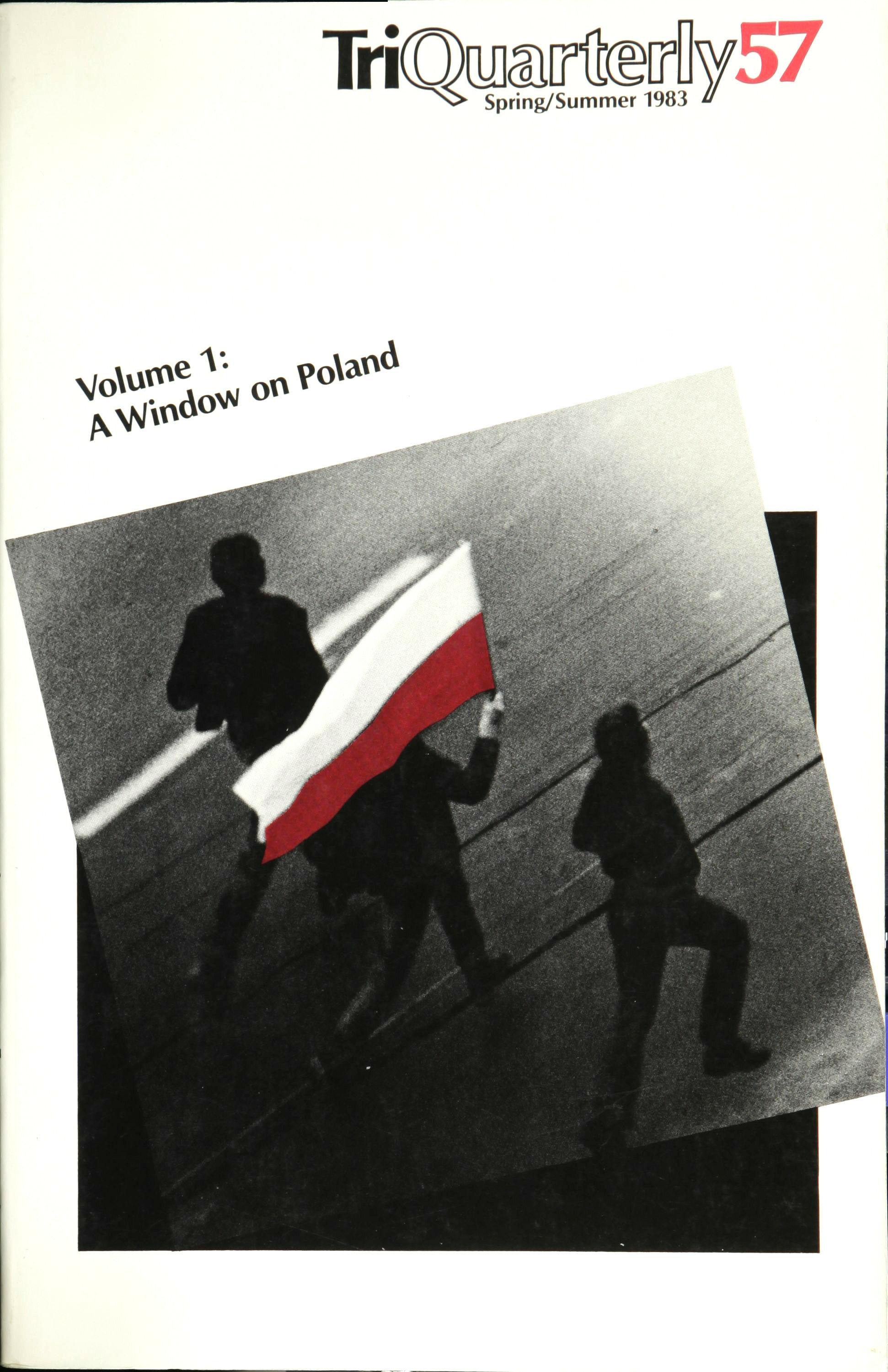

Volume 1 of 2 Volumes: A Window on Poland
Editor
Coeditors of this volume
Associate Editor
Managing Editor
Manuscripts Editor
Assistant Editor
Design Director
TriQuarterly Fellow
Editorial Assistants
Advisory Editors

Reginald Gibbons
Reginald Gibbons, Timothy Wiles
Bob Perlongo
Molly McQuade
Susan Hahn
Fred Shafer
Gini Kondziolka
Chris Olson
Will Johnson, Joe laRusso, Michael Lindsay, David Simpatico
Robert Alter, Michael Anania, Elliott Anderson, Terrence Des Pres, Gloria Emerson, Richard Ford, George Garrett, Gerald Graff, Francine du Plessix Gray, Michael S. Harper, David Hayman, Bill Henderson, Maxine Kumin, Elizabeth Pochoda, Michael Ryan
TRIQUARTERLY IS AN INTERNAnONAL JOURNAL OF ART. WRITING. AND CULTURAL INQUIRY PUBLISHED IN THE FALL. WINTER. AND SPRING AT NORTHWESTERN UNIVERSITY, EVANSTON. ILLINOIS 6020I.
Subscription rates: one year $14.00; two years $25.00; three years $35.00. Foreign subscriptions $3.00 per year additional. Life subscription $100.00, USA or foreign. Single copies usually $5.95. This issue: $3.95 each volume. Correspondence and subscriptions should be addressed to TriQ!.aarterly, NORTIlWESTERN UNIVERSITY, 1735 Benson Avenue, Evanston, lllinois 60201. The editors invite submissions of fiction, poetry, and literary essays. No manuscripts will be returned unless accompanied by a stamped, selfaddressed envelope. All manuscripts accepted for publication become the property of Tri�arterly. unless otherwise indicated. Copyright © 1983 by TriQuarterIy. All rights reserved. The views expressed in this magazine are to be attributed to the writers, not the editors or sponsors. Printed in the United States of America.
National distributor to retail trade: B. DeBoer, 113 East Central Street-Rear, Nutley, New Jersey 07110. Distributor for West Coast trade: Bookpeople, 2940 Seventh Street, Berkeley, California 94710. Midwest: Bookslinger, 330 East Ninth Street, St. Paul, Minnesota 55101 and Prairie News Agency, 2404 West Hirsch Street, Chicago, lllinois 60622.
Reprints of back issues of TriQ!.aarterly are available in full format from Kraus Reprint Company, Route 100, Millwood, New York 10546, and in microfilm from University Microfilms International, 300 North Zeeb Road, Ann Arbor, Michigan 48106. ISSN: 00413097.
A silence lesson Tymoteusz Karpowicz
Whenever a butterfly dosed its wings too violentlythere was a cry: silence please!
As soon as one feather of a startled bird touched a ray of lightthere was a cry: silence please!
This is how the elephant on a drum was taught to walk as soft as a whisper, and man on the earth
The trees began to stand up above the fields, not even whispering, the way being horrified will make hair stand on end
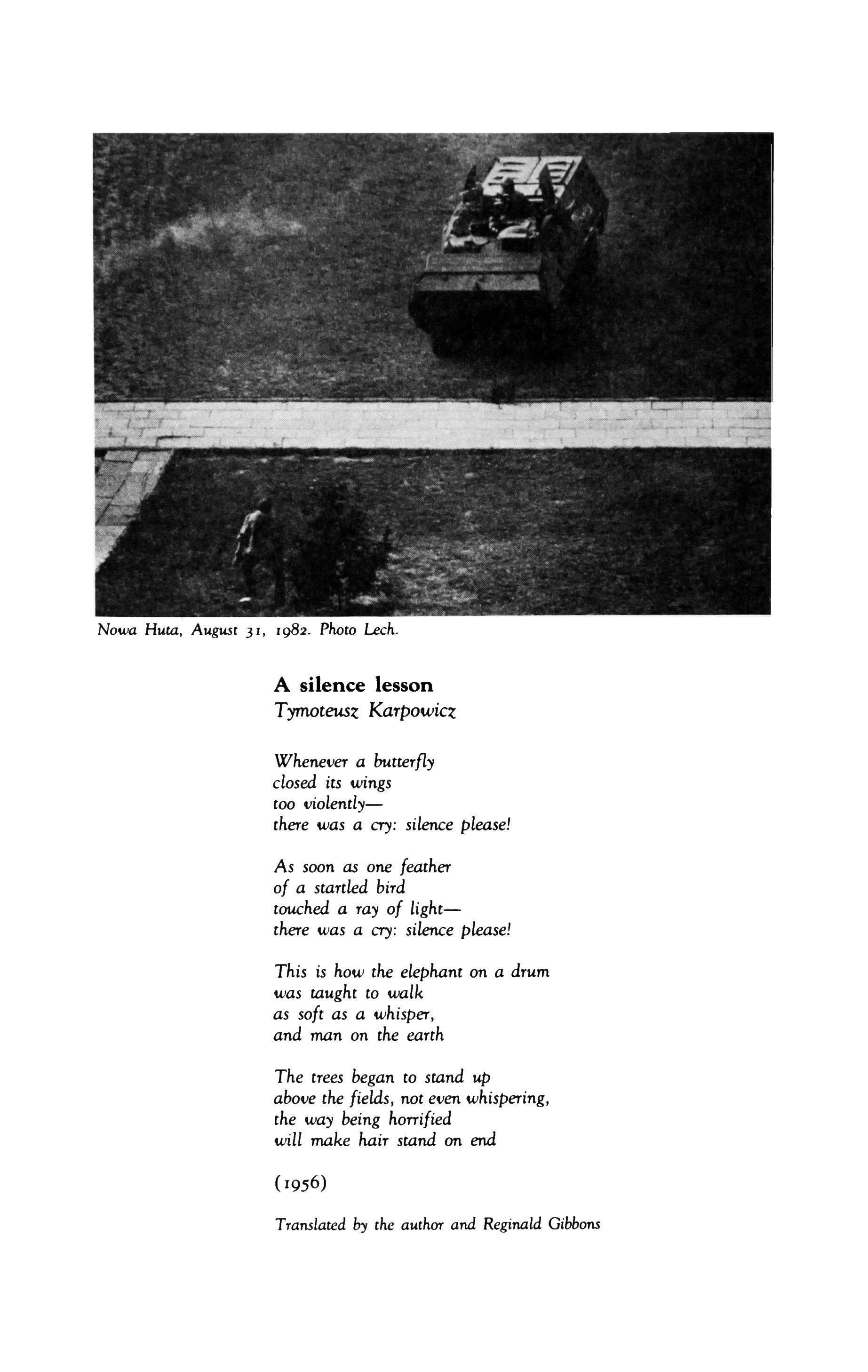
Translated by the author and Reginald Gibbons
Nowa Huta, August 31, 1982. Photo Lech.
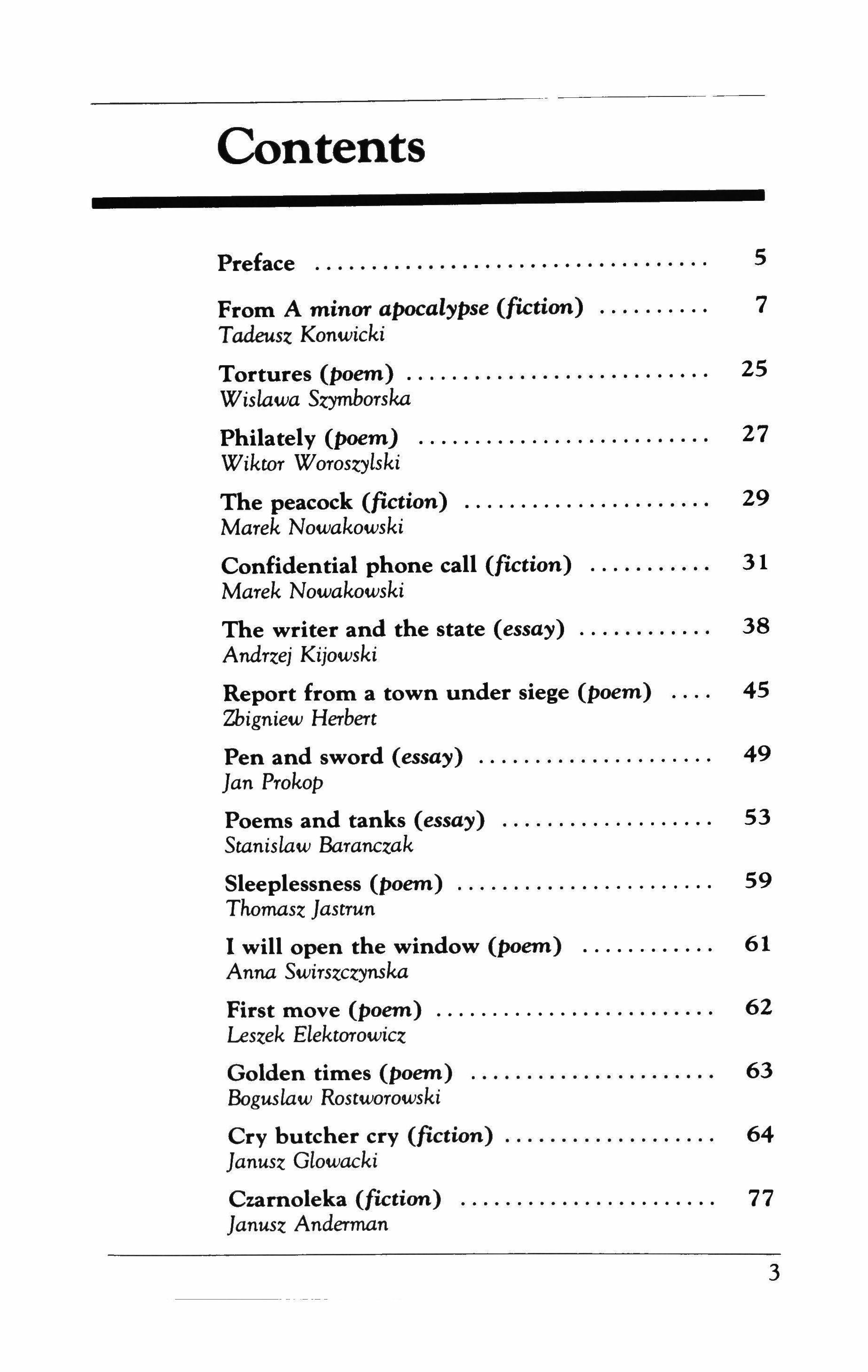
Contents Preface 5 From A minor apocalypse (fiction) Tadeusz Konwicki Tortures (poem) 25 Wislawa S:omborska Philately (poem) 27 Wiktor Woroszylski The peacock (fiction) 29 Marek Nowakowski 7 Confidential phone call (fiction) Marek Nowakowski The writer and the state (essay) 38 Andrzej Kijowski 31 Report from a town under siege (poem) 45 Zbigniew Herbert Pen and sword (essay) 49 Jan Prokop Poems and tanks (essay) Stanislaw Baranczak Sleeplessness (poem) 59 Thomasz Jastrun 53 I will open the window (poem) 61 Anna Swirszczynska First move (poem) 62 Leszek Elektorowicz Golden times (poem) 63 Boguslaw Rostworowski Cry butcher cry (fiction) 64 Janusz Glowacki Czarnoleka (fiction) 77 Janusz Anderman 3
Day of cloud and fog (fiction)
Janusz Anderman
Three poems from Diary of internment (Darlowko, 1982) 85
Wiktor Worosz.ylski
Five poems................................ 88
Stanislaw Baranczak
From A Warsaw diary: 1978-1981
Kazimierz Brandys
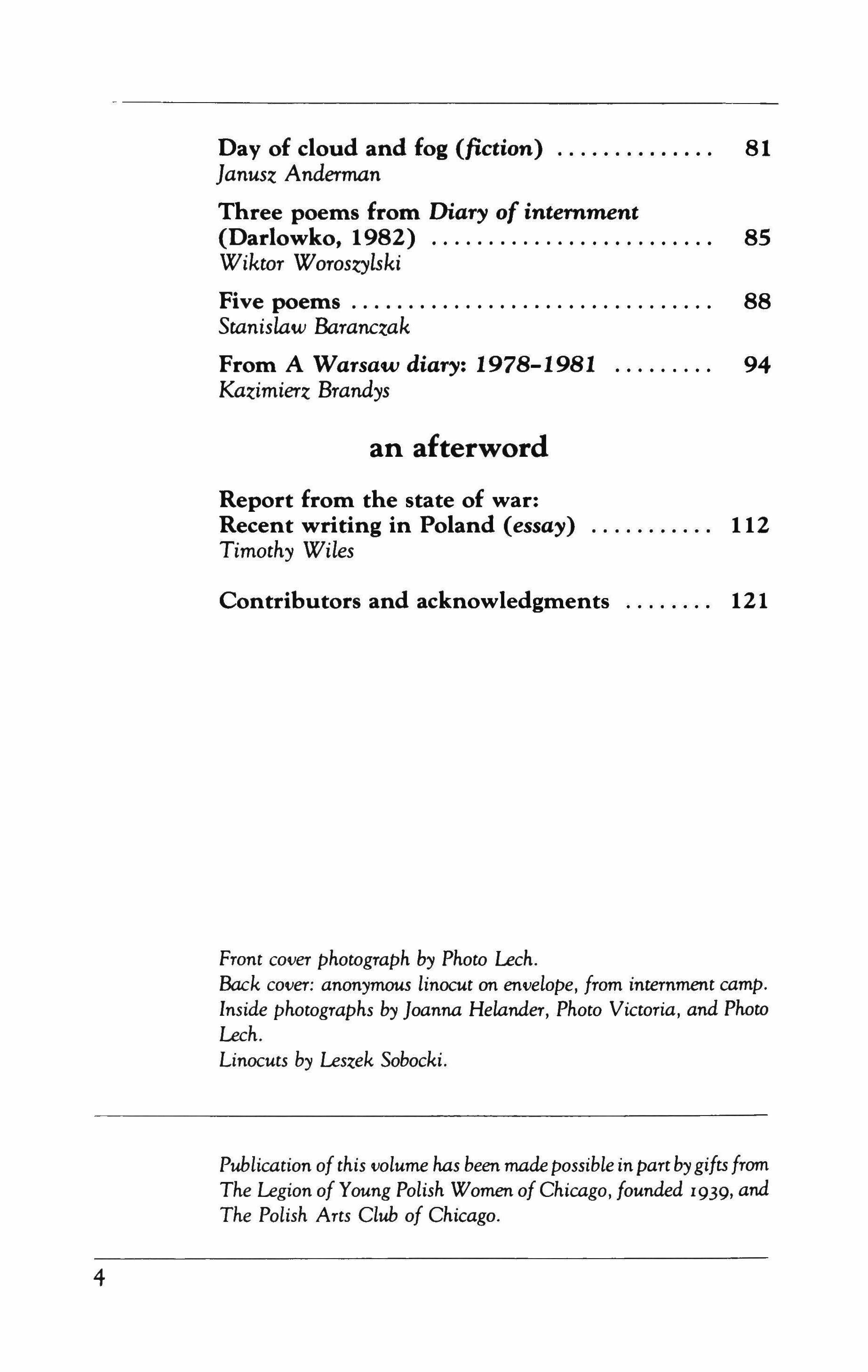
Report from the state of war: Recent writing in Poland (essay)
Timothy Wiles
Contributors and acknowledgments
Front cover photograph by Photo Lech.
Back cover: anonymous linocut on envelope, from internment camp. Inside photographs by Joanna Helander, Photo Victoria, and Photo Lech.
Linocuts by Leszek Sobocki.
Publication ofthis volume has been made possible in part bygiftsfrom The Legion ofYoung Polish Women ofChicago, founded 1939, and The Polish Arts Club of Chicago.
81
an afterword
94
112
121
4
Preface

This volume of TriQuarterly was assembled over the last six months. The work of two of the photographers, and many of the writings, came directly from Poland (the writings having been translated there). Some pieces came to TQ through Richard Lourie, translator of Konwicki and Brandvs, and through Joanna Clark. Timothy Wiles, coeditor, was the principal scout, critic of translations, bagman, and encouraging spirit for the entire volume, writing voluminous guiding letters from Poland, where he was teaching for the year, and making sure that everything found its way to TQ.
Each time a package arrived, usually via Germany or some other circuitous route, I experienced a peculiar thrill at finding it in my hands. The improbable circumstances that had put Polish writers in touch with an American literary magazine were again and again a surprise to me, and the very paper on which the works had been typed-already yellow, flimsy and frail-seemed to show how precarious an enterprise it is to write at all (in Poland or elsewhere) and to hope for readers. The many photos (only a few of which are published here) increased the sense of a privileged moment.
The effect was to make everything, no matter how literary, seem documentary, and to make everything that was simply documentary seem very literary. The ways in which one reads and judges literary works are always influenced mightily by the moment, the context, both experiential and literary; but this simple truth had not been demonstrated to me so forcefully before I began to compile this issue of TQ. It was difficult to make some of the decisions to exclude works. Some pieces were too historically or culturally bound to Poland to be very intelligible to American readers without lots of footnotes; some were too fragmentary. However, I still sense those excluded works, as if they were here by implication, and I wish it were
5
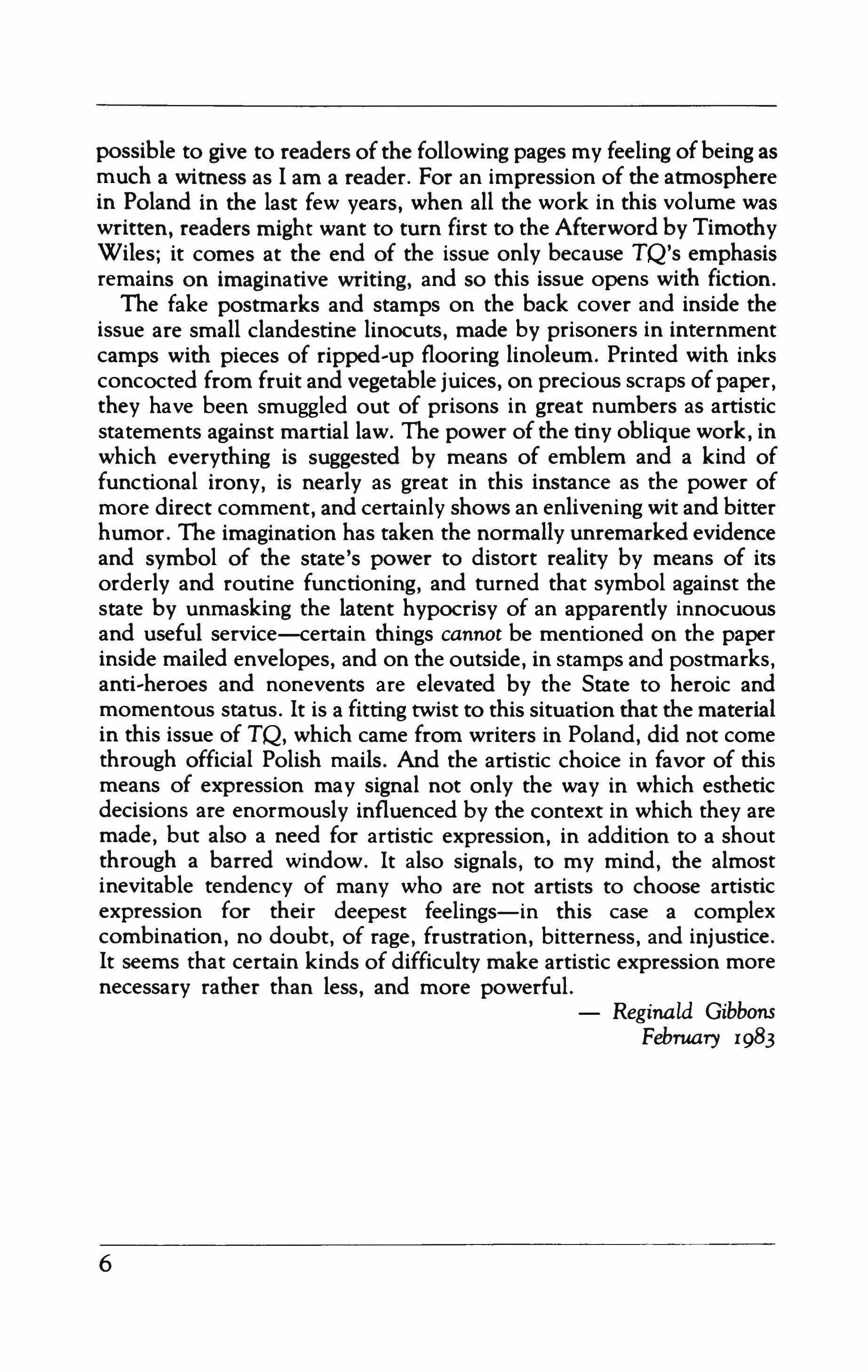
possible to give to readers ofthe following pages my feeling ofbeing as much a witness as I am a reader. For an impression of the atmosphere in Poland in the last few years, when all the work in this volume was written, readers might want to turn first to the Afterword by Timothy Wiles; it comes at the end of the issue only because TQ's emphasis remains on imaginative writing, and so this issue opens with fiction. The fake postmarks and stamps on the back cover and inside the issue are small clandestine linocuts, made by prisoners in internment camps with pieces of ripped-up flooring linoleum. Printed with inks concocted from fruit and vegetable juices, on precious scraps of paper, they have been smuggled out of prisons in great numbers as artistic statements against martial law. The power of the tiny oblique work, in which everything is suggested by means of emblem and a kind of functional irony, is nearly as great in this instance as the power of more direct comment, and certainly shows an enlivening wit and bitter humor. The imagination has taken the normally unremarked evidence and symbol of the state's power to distort reality by means of its orderly and routine functioning, and turned that symbol against the state by unmasking the latent hypocrisy of an apparently innocuous and useful service-certain things cannot be mentioned on the paper inside mailed envelopes, and on the outside, in stamps and postmarks, anti-heroes and nonevents are elevated by the State to heroic and momentous status. It is a fitting twist to this situation that the material in this issue of TQ, which came from writers in Poland, did not come through official Polish mails. And the artistic choice in favor of this means of expression may signal not only the way in which esthetic decisions are enormously influenced by the context in which they are made, but also a need for artistic expression, in addition to a shout through a barred window. It also signals, to my mind, the almost inevitable tendency of many who are not artists to choose artistic expression for their deepest feelings-in this case a complex combination, no doubt, of rage, frustration, bitterness, and injustice. It seems that certain kinds of difficulty make artistic expression more necessary rather than less, and more powerful.
Reginald Gibbons February I9B3
6
From A minor apocalypse
Tadeusz Konwicki
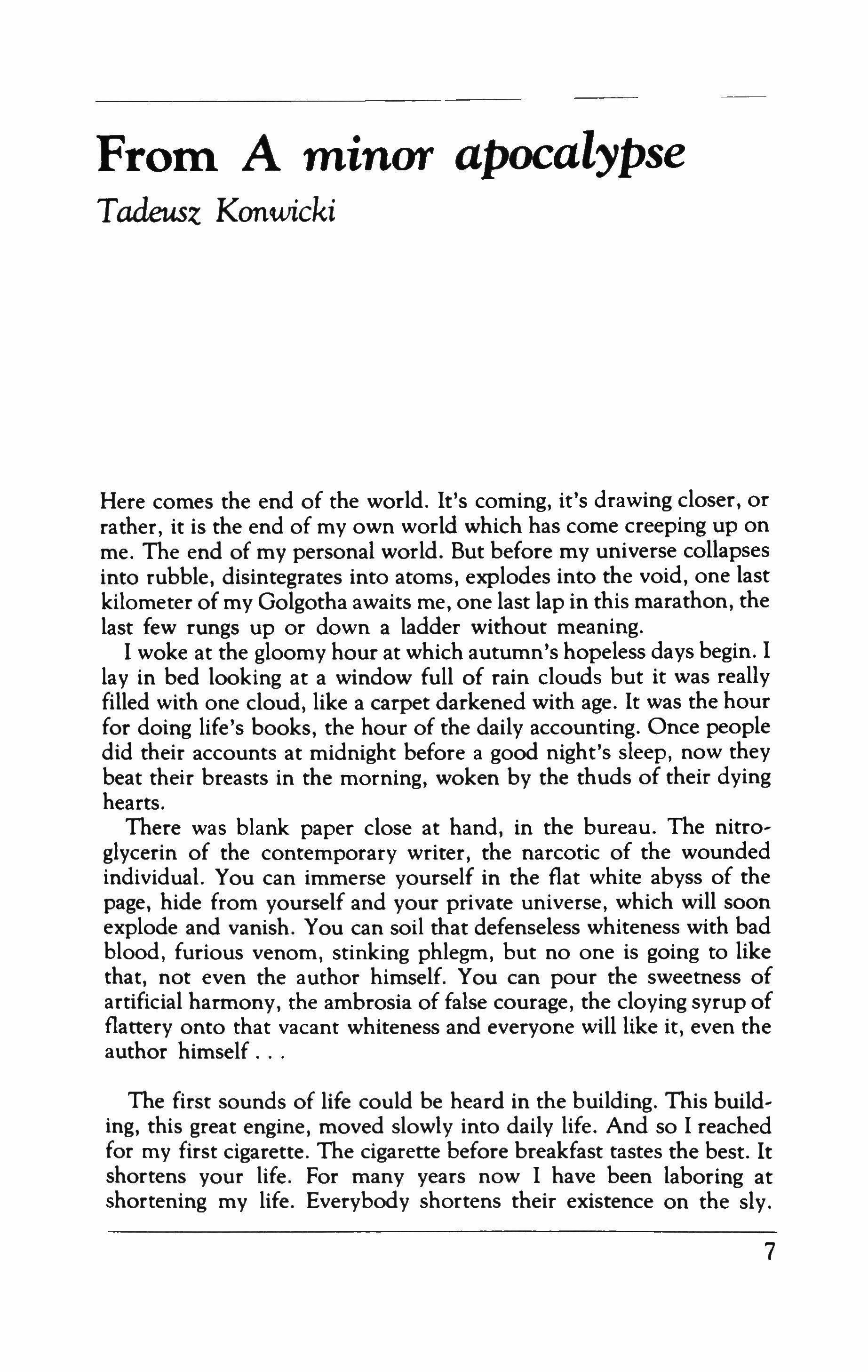
Here comes the end of the world. It's coming, it's drawing closer, or rather, it is the end of my own world which has come creeping up on me. The end of my personal world. But before my universe collapses into rubble, disintegrates into atoms, explodes into the void, one last kilometer of my Golgotha awaits me, one last lap in this marathon, the last few rungs up or down a ladder without meaning. I woke at the gloomy hour at which autumn's hopeless days begin. I lay in bed looking at a window full of rain clouds but it was really filled with one cloud, like a carpet darkened with age. It was the hour for doing life's books, the hour of the daily accounting. Once people did their accounts at midnight before a good night's sleep, now they beat their breasts in the morning, woken by the thuds of their dying hearts.
There was blank paper close at hand, in the bureau. The nitroglycerin of the contemporary writer, the narcotic of the wounded individual. You can immerse yourself in the flat white abyss of the page, hide from yourself and your private universe, which will soon explode and vanish. You can soil that defenseless whiteness with bad blood, furious venom, stinking phlegm, but no one is going to like that, not even the author himself. You can pour the sweetness of artificial harmony, the ambrosia of false courage, the cloying syrup of flattery onto that vacant whiteness and everyone will like it, even the author himself
The first sounds of life could be heard in the building. This building, this great engine, moved slowly into daily life. And so I reached for my first cigarette. The cigarette before breakfast tastes the best. It shortens your life. For many years now I have been laboring at shortening my life. Everybody shortens their existence on the sly.
7

There must be something to all that. Some higher command or perhaps a law of nature in this overpopulated world.
I like the misty dizziness in my head after a deep drag of bitter smoke. I would like to say some suitable farewell to the world. For ever since I was a child I have been departing from this life but I can't finish the job. I loiter at railway crossings, I walk by houses where roof tiles fall, I drink until I drop, I antagonize hooligans. And so I am approaching the finish line. I am in the final turn. I would like to say farewell to you somehow or another. I long to howl in an inhuman voice so that I am heard in the most distant corner of the planet and perhaps even in neighboring constellations or perhaps even in the residence of the Lord God. Is that vanity? Or a duty? Or an instinct which commands us castaways, us cosmic castaways, to shout through the ages into starry space?
We've become intimate with the universe. Every money-hungry poet, foolish humorist, and treacherous journalist wipes his mouth on the cosmos and so why can't I too hold my head up high to where rusted Sputniks and astronaut excrement, frozen bone-hard, go gliding past.
And so I would like to say farewell somehow. I dreamed of teeth all night. I dreamed I was holding a pile of teeth like kernels of corn in my hand. There was even a filling in one, a cheap Warsaw filling from the dental cooperative. To say something complete about myself. Not as a warning, not as knowledge, not even for amusement. Simply to say something which no one else could reveal. Because before falling asleep or perhaps in the first passing cloud of sleep, I begin to understand the meaning of existence, time, and the life beyond this one. I understand that mystery for a fraction of a second, through an instant of distant memories, a brief moment of consolation or fearful foreboding and then plunge immediately into the depths of my bad dreams. In one way or another everyone strains his blood-nourished brain to the breaking point trying to understand. But I'm getting close. I mean, at times I get close. And I would give everything I possess, down to the last scrap but, after all, I don't own anything and so I would be giving a lot of nothing, to see that mystery in all its simplicity, to see it once and then to forget it forever.
I am a biped born not far from the Vistula River of old stock and that means I inherited all its bipedal experience in my genes. I have seen war, that terrible frenzy of mammals murdering each other until they drop in exhaustion. I have observed the birth of life and its end in that act we call death. I have known all the brutality of my species and all its extraordinary angelicalness. I have traveled the thorny path of individual evolution known as fate. I am one of you. I am a perfect,
8
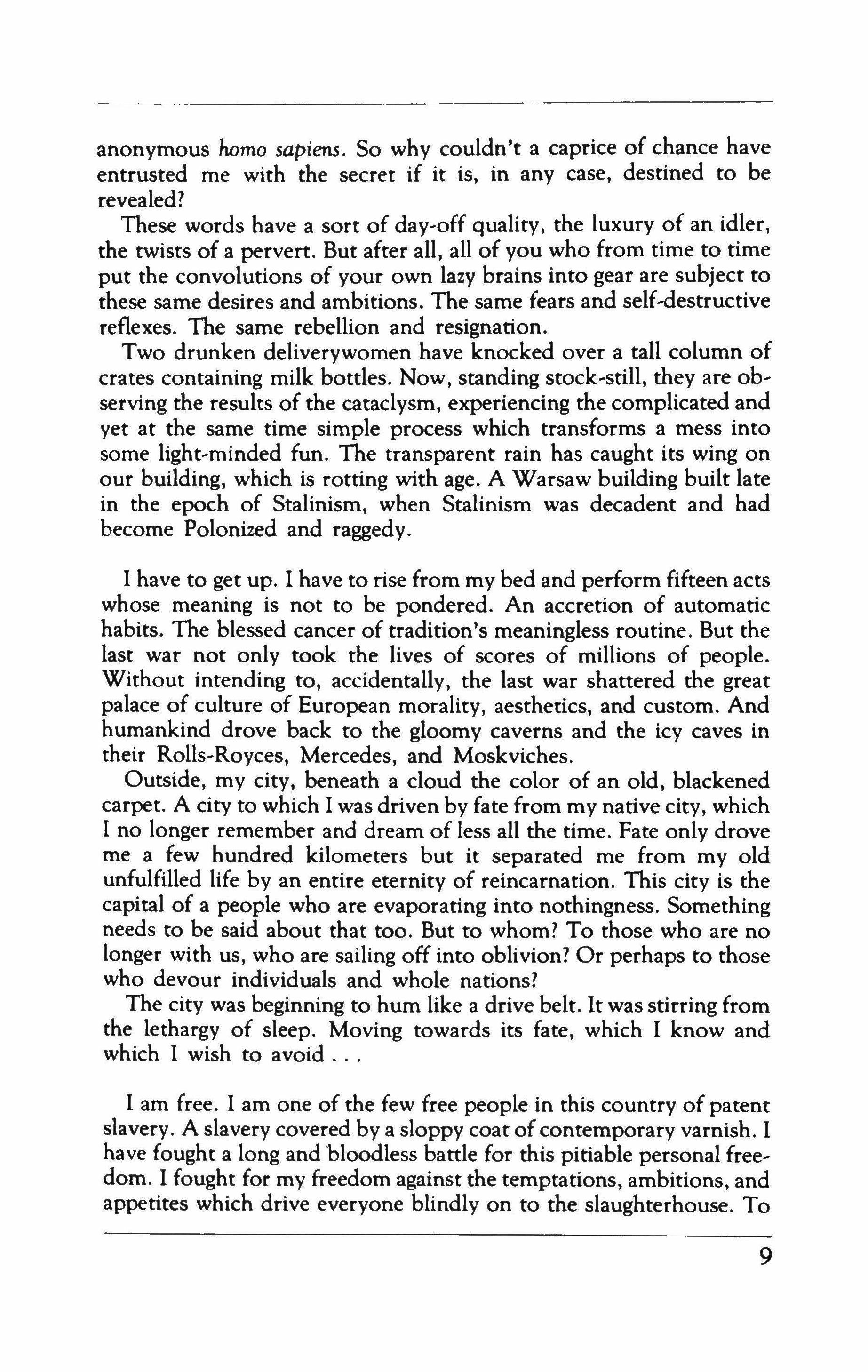
anonymous homo sapiens. So why couldn't a caprice of chance have entrusted me with the secret if it is, in any case, destined to be revealed?
These words have a sort of day-off quality, the luxury of an idler, the twists of a pervert. But after all, all of you who from time to time put the convolutions of your own lazy brains into gear are subject to these same desires and ambitions. The same fears and self-destructive reflexes. The same rebellion and resignation.
Two drunken deliverywomen have knocked over a tall column of crates containing milk bottles. Now, standing stock-still, they are observing the results of the cataclysm, experiencing the complicated and yet at the same time simple process which transforms a mess into some light-minded fun. The transparent rain has caught its wing on our building, which is rotting with age. A Warsaw building built late in the epoch of Stalinism, when Stalinism was decadent and had become Polonized and raggedy.
I have to get up. I have to rise from my bed and perform fifteen acts whose meaning is not to be pondered. An accretion of automatic habits. The blessed cancer of tradition's meaningless routine. But the last war not only took the lives of scores of millions of people. Without intending to, accidentally, the last war shattered the great palace of culture of European morality, aesthetics, and custom. And humankind drove back to the gloomy caverns and the icy caves in their Rolls-Rovces, Mercedes, and Moskviches.
Outside, my city, beneath a cloud the color of an old, blackened carpet. A city to which I was driven by fate from my native city, which I no longer remember and dream of less all the time. Fate only drove me a few hundred kilometers but it separated me from myoid unfulfilled life by an entire eternity of reincarnation. This city is the capital of a people who are evaporating into nothingness. Something needs to be said about that too. But to whom? To those who are no longer with us, who are sailing off into oblivion? Or perhaps to those who devour individuals and whole nations?
The city was beginning to hum like a drive belt. It was stirring from the lethargy of sleep. Moving towards its fate, which I know and which I wish to avoid
I am free. I am one of the few free people in this country of patent slavery. A slavery covered by a sloppy coat of contemporary varnish. I have fought a long and bloodless battle for this pitiable personal freedom. I fought for my freedom against the temptations, ambitions, and appetites which drive everyone blindly on to the slaughterhouse. To
9
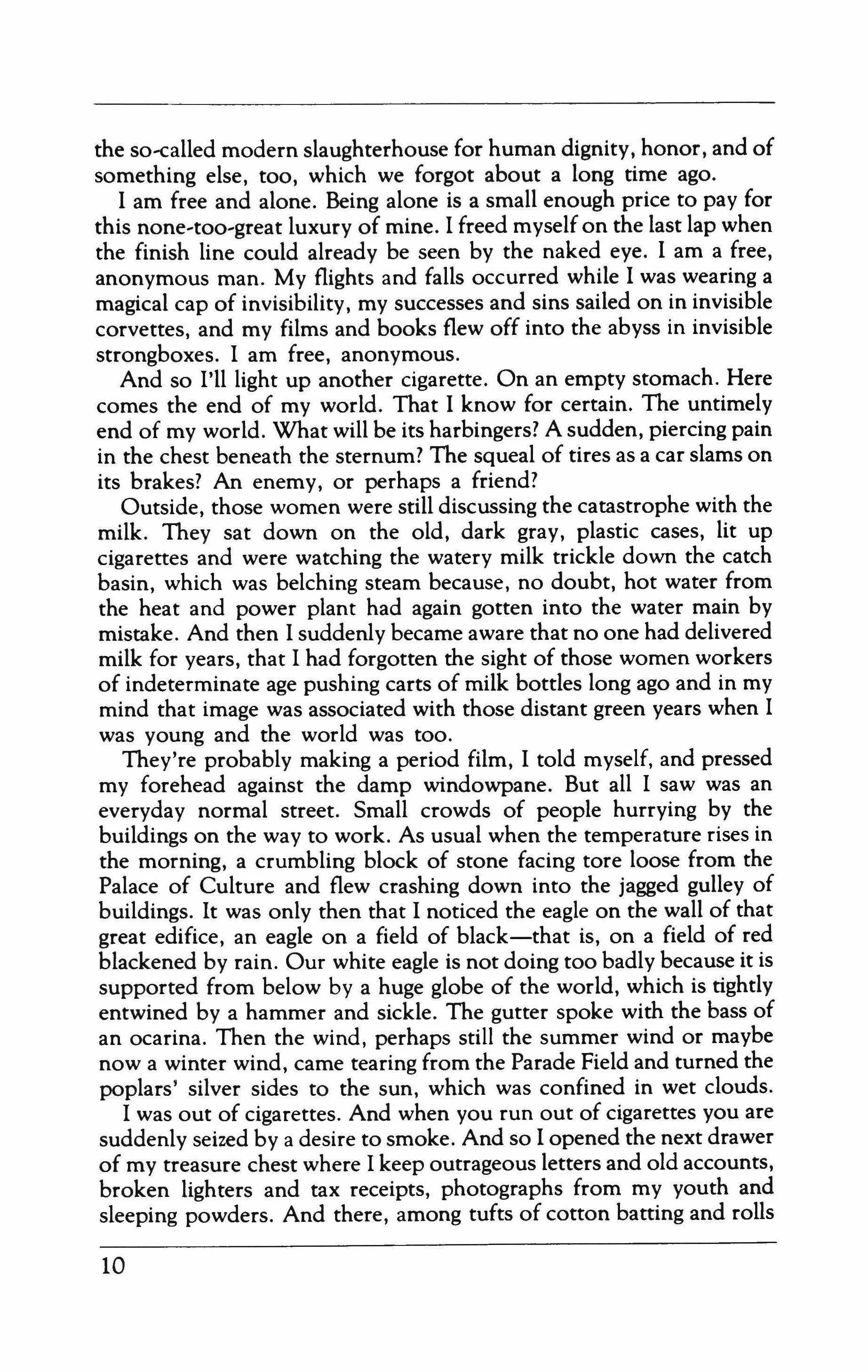
the so-called modern slaughterhouse for human dignity, honor, and of something else, too, which we forgot about a long time ago.
I am free and alone. Being alone is a small enough price to pay for this none-too-great luxury of mine. I freed myself on the last lap when the finish line could already be seen by the naked eye. I am a free, anonymous man. My flights and falls occurred while I was wearing a magical cap of invisibility, my successes and sins sailed on in invisible corvettes, and my films and books flew off into the abyss in invisible strongboxes. I am free, anonymous.
And so I'll light up another cigarette. On an empty stomach. Here comes the end of my world. That I know for certain. The untimely end of my world. What will be its harbingers? A sudden, piercing pain in the chest beneath the sternum? The squeal of tires as a car slams on its brakes? An enemy, or perhaps a friend?
Outside, those women were still discussing the catastrophe with the milk. They sat down on the old, dark gray, plastic cases, lit up cigarettes and were watching the watery milk trickle down the catch basin, which was belching steam because, no doubt, hot water from the heat and power plant had again gotten into the water main by mistake. And then I suddenly became aware that no one had delivered milk for years, that I had forgotten the sight of those women workers of indeterminate age pushing carts of milk bottles long ago and in my mind that image was associated with those distant green years when I was young and the world was too.
They're probably making a period film, I told myself, and pressed my forehead against the damp windowpane. But all I saw was an everyday normal street. Small crowds of people hurrying by the buildings on the way to work. As usual when the temperature rises in the morning, a crumbling block of stone facing tore loose from the Palace of Culture and flew crashing down into the jagged gulley of buildings. It was only then that I noticed the eagle on the wall of that great edifice, an eagle on a field of black-that is, on a field of red blackened by rain. Our white eagle is not doing too badly because it is supported from below by a huge globe of the world, which is tightly entwined by a hammer and sickle. The gutter spoke with the bass of an ocarina. Then the wind, perhaps still the summer wind or maybe now a winter wind, came tearing from the Parade Field and turned the poplars' silver sides to the sun, which was confined in wet clouds.
I was out of cigarettes. And when you run out of cigarettes you are suddenly seized by a desire to smoke. And so I opened the next drawer of my treasure chest where I keep outrageous letters and old accounts, broken lighters and tax receipts, photographs from my youth and sleeping powders. And there, among tufts of cotton batting and rolls
10

of bandages from the good old days when it was still worth my while to submit to operations, in those age-encrusted recesses I found a yellowed page from many years ago, a page like a cartouche on a monument or a gravestone, a page where I once began a piece of prose I have not finished yet. I began this work in that wonderful time around New Year's, right after New Year's Eve, with a nice hangover still throbbing healthy in my head. I began on New Year's Day because I had indulged in superstition and wanted to celebrate the new biological and astronomical cycle with some work. Later I realized that my own New Year's begins at the end of summer or the beginning of fall and so that is why I stopped writing and have not written a word since.
And so there was that page, once white, now yellow, for long months, seasons, years, never finished, never completed, with its faded motto which was to bless the wistful scenes, the exalted thoughts, the lovely descriptions of nature. I blew the dust from Warsaw's factories off that waxen corpse of my imagination and read the words, which were the credo of an old Polish magnate in the nineteenth century: "If Russia's interests permit, I would gladly turn my feelings to my original fatherland." What was it I had in mind then? Did I want to read that avowal every morning to my children before breakfast? Or did I intend to copy it out at Christmas to be sent to the magnates of science, literature, and film, my contemporaries? Or was I trying to win the favor of the censor for a piece that had come stillborn from an anemic inspiration?
The windows rattled painfully. Hysterical police sirens leapt from some side street. I glanced at the watch my friend Stanislaw D. had once brought me back from a trip to the Soviet Union. It was going on eight. I knew what that meant. Each day at that hour, an armored refrigerator truck carrying food supplies for the ministers and the Party Secretaries raced through the city escorted by police vans. The cavalcade of vehicles flashed past my building splashing the puddles of milk on the street. The archaic milk deliverers, let out of some old-age home for the day, ground out their butts on the muddy sidewalk, exchanging furtive goodbyes.
Suddenly the gong by my door rang. I froze by the window, not believing my ears, certain that device had not been working for years. But the elegant, xylophone-like sound was repeated, and more insistently this time. Pulling on an old robe, a present from my brother-in-law, Jan L., I moved guardedly toward the door. I opened the door. Hubert and Rvsio, both wearing their Sunday best, suits which reminded me of the carefree middle seventies, were standing at the top of the stairs.
11
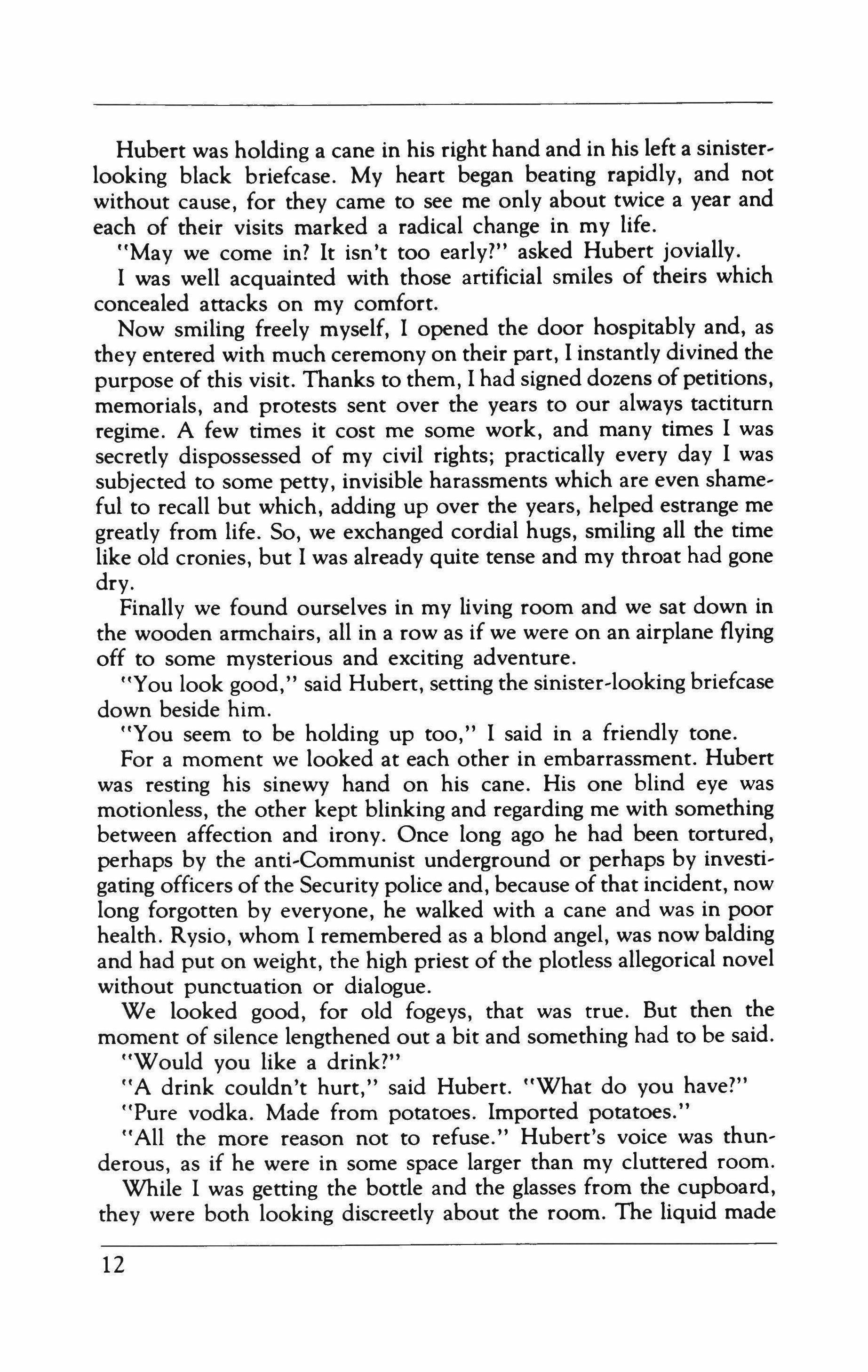
Hubert was holding a cane in his right hand and in his left a sinister, looking black briefcase. My heart began beating rapidly, and not without cause, for they came to see me only about twice a year and each of their visits marked a radical change in my life.
"May we come in? It isn't too early?" asked Hubert jovially. I was well acquainted with those artificial smiles of theirs which concealed attacks on my comfort.
Now smiling freely myself, I opened the door hospitably and, as they entered with much ceremony on their part, I instantly divined the purpose of this visit. Thanks to them, I had signed dozens of petitions, memorials, and protests sent over the years to our always tactiturn regime. A few times it cost me some work, and many times I was secretly dispossessed of my civil rights; practically every day I was subjected to some petty, invisible harassments which are even shame, ful to recall but which, adding up over the years, helped estrange me greatly from life. So, we exchanged cordial hugs, smiling all the time like old cronies, but I was already quite tense and my throat had gone dry.
Finally we found ourselves in my living room and we sat down in the wooden armchairs, all in a row as if we were on an airplane flying off to some mysterious and exciting adventure.
"You look good," said Hubert, setting the sinister-looking briefcase down beside him.
"You seem to be holding up too," I said in a friendly tone.
For a moment we looked at each other in embarrassment. Hubert was resting his sinewy hand on his cane. His one blind eye was motionless, the other kept blinking and regarding me with something between affection and irony. Once long ago he had been tortured, perhaps by the anti-Communist underground or perhaps by investigating officers of the Security police and, because of that incident, now long forgotten by everyone, he walked with a cane and was in poor health. Rvsio, whom I remembered as a blond angel, was now balding and had put on weight, the high priest of the plotless allegorical novel without punctuation or dialogue.
We looked good, for old fogeys, that was true. But then the moment of silence lengthened out a bit and something had to be said.
"Would you like a drink?"
"A drink couldn't hurt," said Hubert. "What do you have?"
"Pure vodka. Made from potatoes. Imported potatoes."
"All the more reason not to refuse." Hubert's voice was thunderous, as if he were in some space larger than my cluttered room. While I was getting the bottle and the glasses from the cupboard, they were both looking discreetly about the room. The liquid made
12
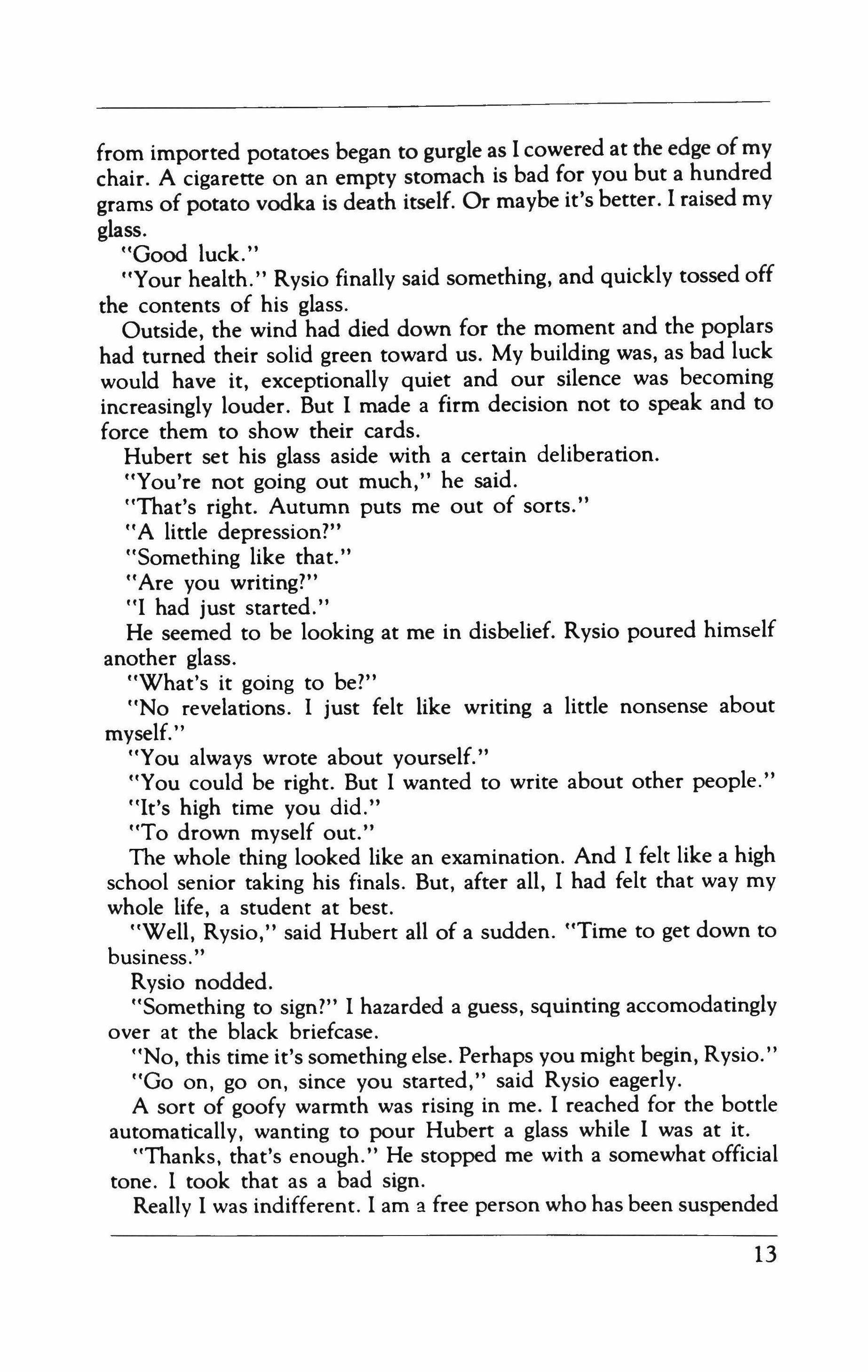
from imported potatoes began to gurgle as I cowered at the edge of my chair. A cigarette on an empty stomach is bad for you but a hundred grams of potato vodka is death itself. Or maybe it's better. I raised my glass.
"Good luck."
"Your health." Rysio finally said something, and quickly tossed off the contents of his glass.
Outside, the wind had died down for the moment and the poplars had turned their solid green toward us. My building was, as bad luck would have it, exceptionally quiet and our silence was becoming increasingly louder. But I made a firm decision not to speak and to force them to show their cards.
Hubert set his glass aside with a certain deliberation.
"You're not going out much," he said.
"That's right. Autumn puts me out of sorts."
"A little depression?"
"Something like that."
"Are you writing?"
"I had just started."
He seemed to be looking at me in disbelief. Rysio poured himself another glass.
"What's it going to be?"
"No revelations. I just felt like writing a little nonsense about myself."
"You always wrote about yourself."
"You could be right. But I wanted to write about other people."
"It's high time you did."
"To drown myself out."
The whole thing looked like an examination. And I felt like a high school senior taking his finals. But, after all, I had felt that way my whole life, a student at best.
"Well, Rysio," said Hubert all of a sudden. "Time to get down to business.
Rvsio nodded.
"Something to sign?" I hazarded a guess, squinting accomodatingly over at the black briefcase.
"No, this time it's something else. Perhaps you might begin, Rvsio."
"Go on, go on, since you started," said Rysio eagerly.
A sort of goofy warmth was rising in me. I reached for the bottle automatically, wanting to pour Hubert a glass while I was at it.
"Thanks, that's enough." He stopped me with a somewhat official tone. I took that as a bad sign.
Really I was indifferent. I am a free person who has been suspended
13
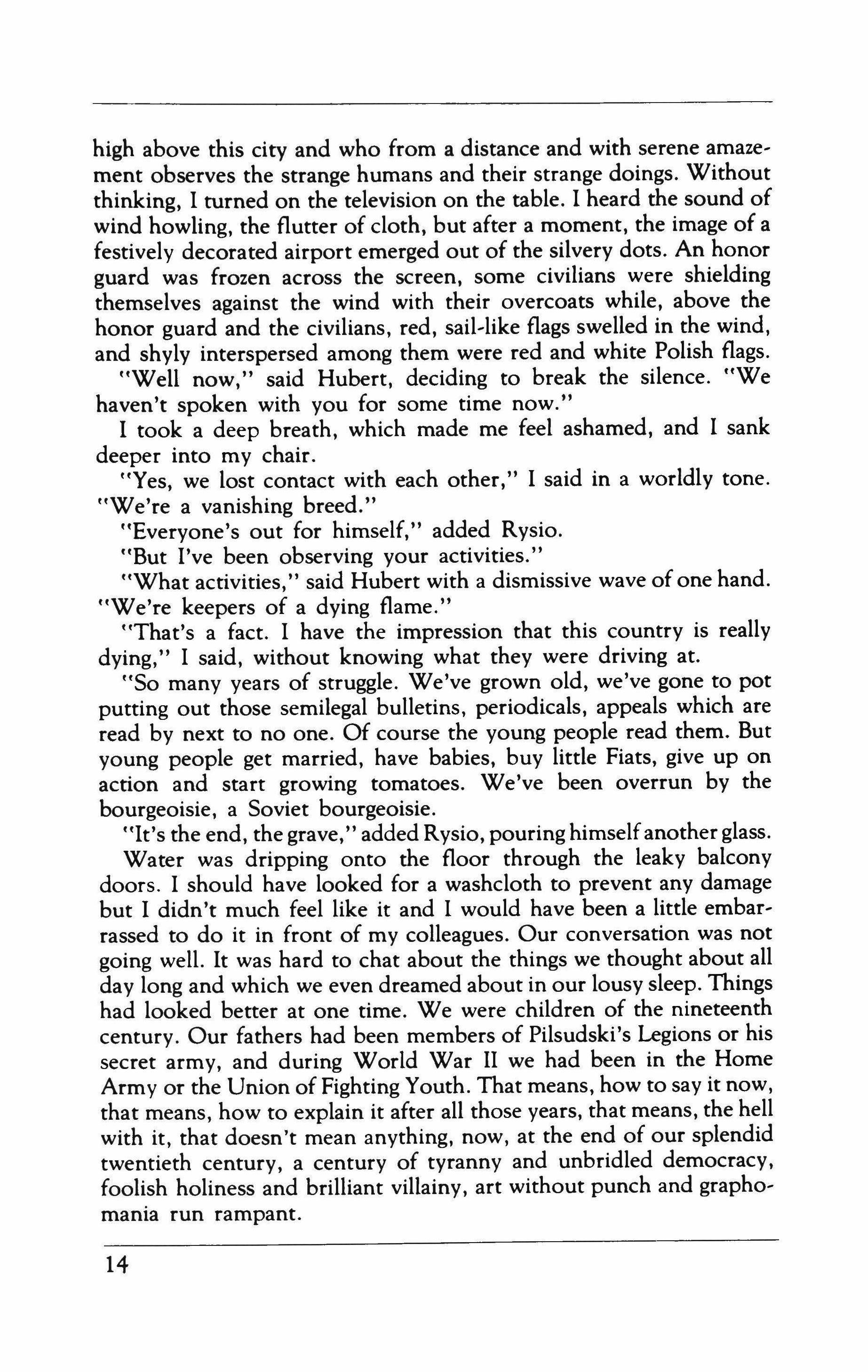
high above this city and who from a distance and with serene amazement observes the strange humans and their strange doings. Without thinking, I turned on the television on the table. I heard the sound of wind howling, the flutter of cloth, but after a moment, the image of a festively decorated airport emerged out of the silvery dots. An honor guard was frozen across the screen, some civilians were shielding themselves against the wind with their overcoats while, above the honor guard and the civilians, red, sail-like flags swelled in the wind, and shyly interspersed among them were red and white Polish flags.
"Well now," said Hubert, deciding to break the silence. "We haven't spoken with you for some time now."
I took a deep breath, which made me feel ashamed, and I sank deeper into my chair.
"Yes, we lost contact with each other," I said in a worldly tone. "We're a vanishing breed."
"Everyone's out for himself," added Rysio.
"But I've been observing your activities."
"What activities," said Hubert with a dismissive wave of one hand. "We're keepers of a dying flame."
"That's a fact. I have the impression that this country is really dying," I said, without knowing what they were driving at.
"So many years of struggle. We've grown old, we've gone to pot putting out those semilegal bulletins, periodicals, appeals which are read by next to no one. Of course the young people read them. But young people get married, have babies, buy little Fiats, give up on action and start growing tomatoes. We've been overrun by the bourgeoisie, a Soviet bourgeoisie.
"It's the end, the grave," added Rvsio, pouring himselfanother glass.
Water was dripping onto the floor through the leaky balcony doors. I should have looked for a washcloth to prevent any damage but I didn't much feel like it and I would have been a little embarrassed to do it in front of my colleagues. Our conversation was not going well. It was hard to chat about the things we thought about all day long and which we even dreamed about in our lousy sleep. Things had looked better at one time. We were children of the nineteenth century. Our fathers had been members of Pilsudski's Legions or his secret army, and during World War II we had been in the Home Army or the Union of Fighting Youth. That means, how to say it now, that means, how to explain it after all those years, that means, the hell with it, that doesn't mean anything, now, at the end of our splendid twentieth century, a century of tyranny and unbridled democracy, foolish holiness and brilliant villainy, art without punch and graphomania run rampant.
14
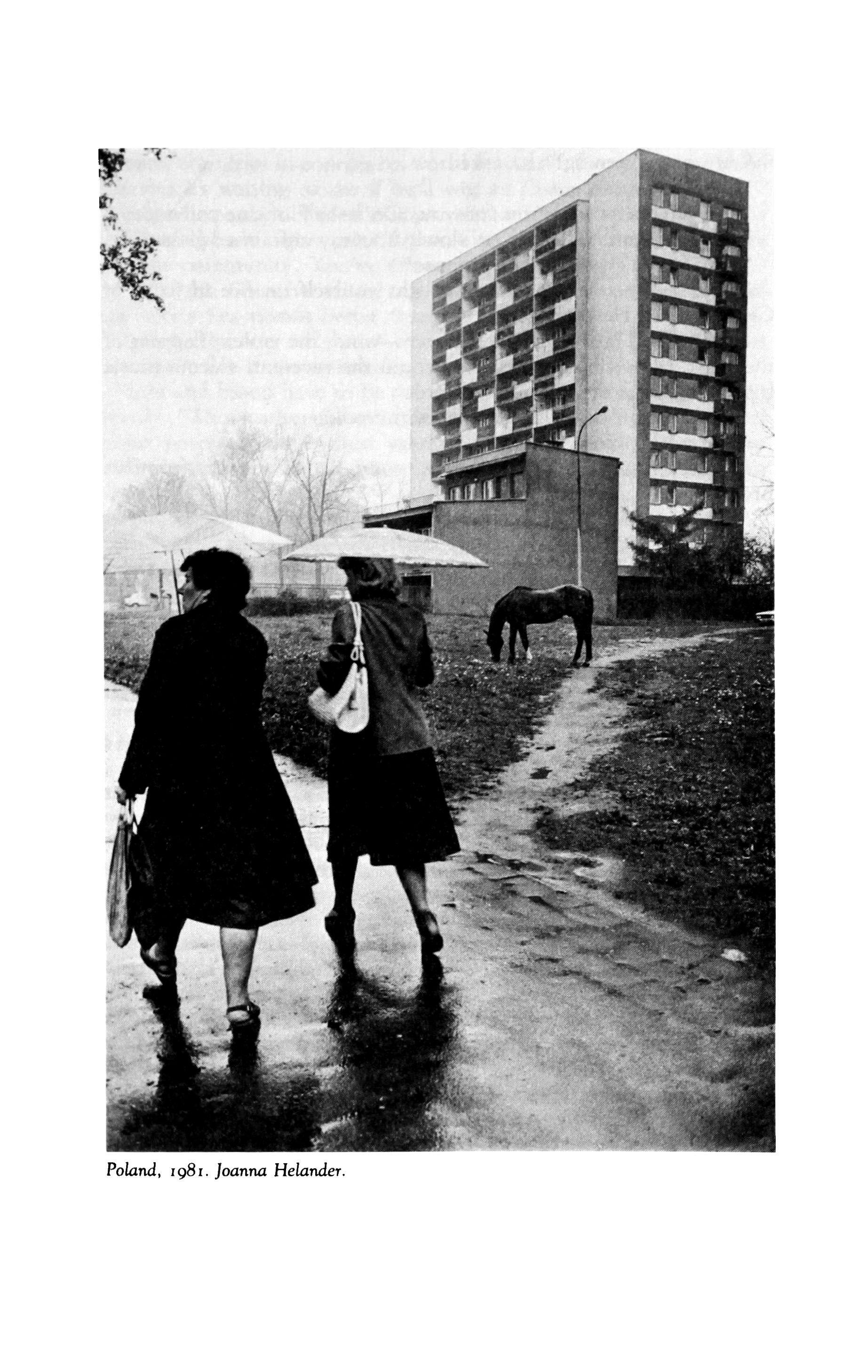
Y&I! �
Poland, 1981. Joanna Helander.
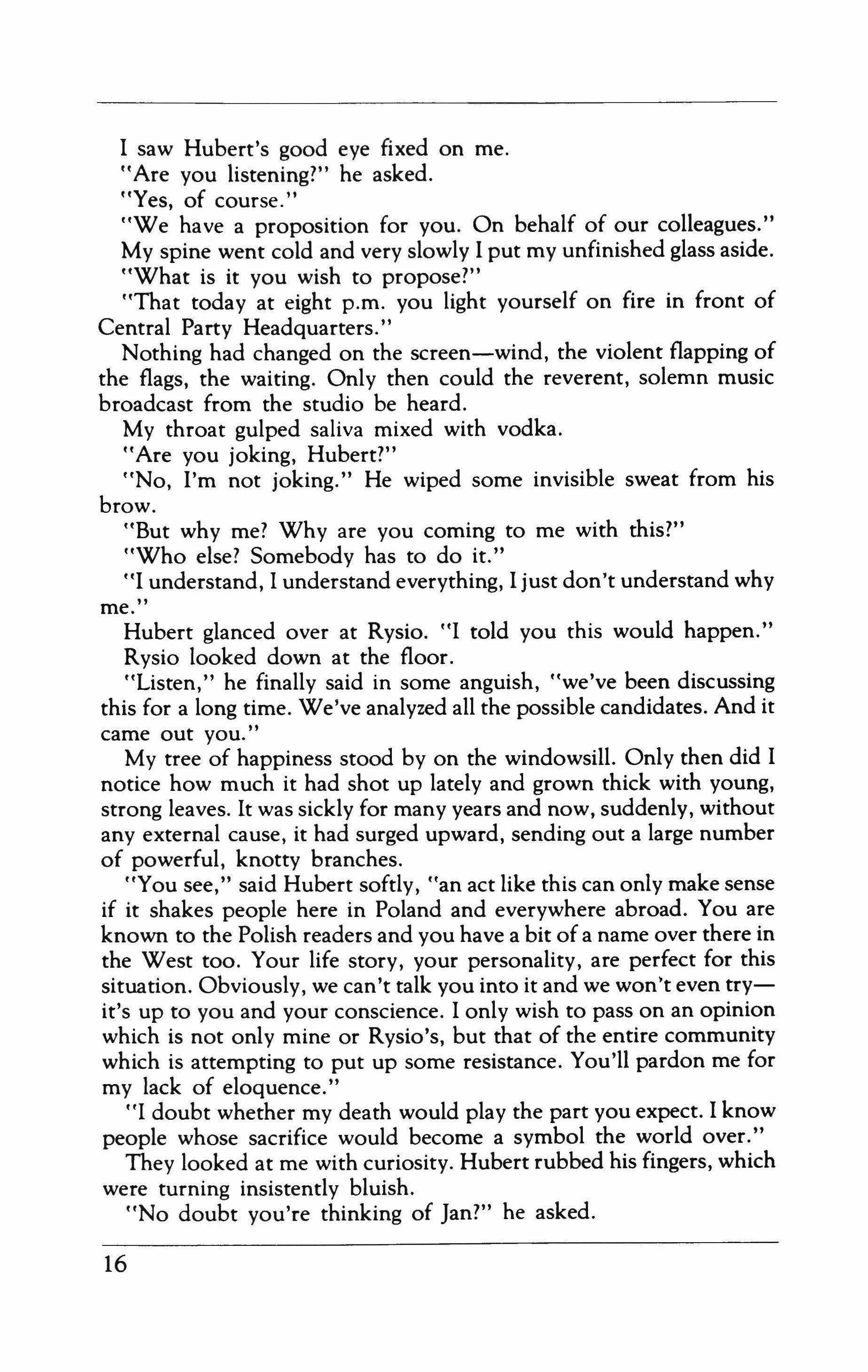
1 saw Hubert's good eye fixed on me.
"Are you listening?" he asked.
"Yes, of course."
"We have a proposition for you. On behalf of our colleagues."
My spine went cold and very slowly 1 put my unfinished glass aside.
"What is it you wish to propose?"
"That today at eight p.m. you light yourself on fire in front of Central Party Headquarters."
Nothing had changed on the screen-wind, the violent flapping of the flags, the waiting. Only then could the reverent, solemn music broadcast from the studio be heard.
My throat gulped saliva mixed with vodka.
"Are you joking, Hubert?"
"No, I'm not joking." He wiped some invisible sweat from his brow.
"But why me? Why are you coming to me with this?"
"Who else? Somebody has to do it."
"I understand, I understand everything, I just don't understand why me."
Hubert glanced over at Rysio. "I told you this would happen."
Rysio looked down at the floor.
"Listen," he finally said in some anguish, "we've been discussing this for a long time. We've analyzed all the possible candidates. And it came out you."
My tree of happiness stood by on the windowsill. Only then did I notice how much it had shot up lately and grown thick with young, strong leaves. It was sickly for many years and now, suddenly, without any external cause, it had surged upward, sending out a large number of powerful, knotty branches.
"You see," said Hubert softly, "an act like this can only make sense if it shakes people here in Poland and everywhere abroad. You are known to the Polish readers and you have a bit of a name over there in the West too. Your life story, your personality, are perfect for this situation. Obviously, we can't talk you into it and we won't even tryit's up to you and your conscience. I only wish to pass on an opinion which is not only mine or Rysio's, but that of the entire community which is attempting to put up some resistance. You'll pardon me for my lack of eloquence."
"I doubt whether my death would play the part you expect. I know people whose sacrifice would become a symbol the world over."
They looked at me with curiosity. Hubert rubbed his fingers, which were turning insistently bluish.
"No doubt you're thinking of Jan?" he asked.
16
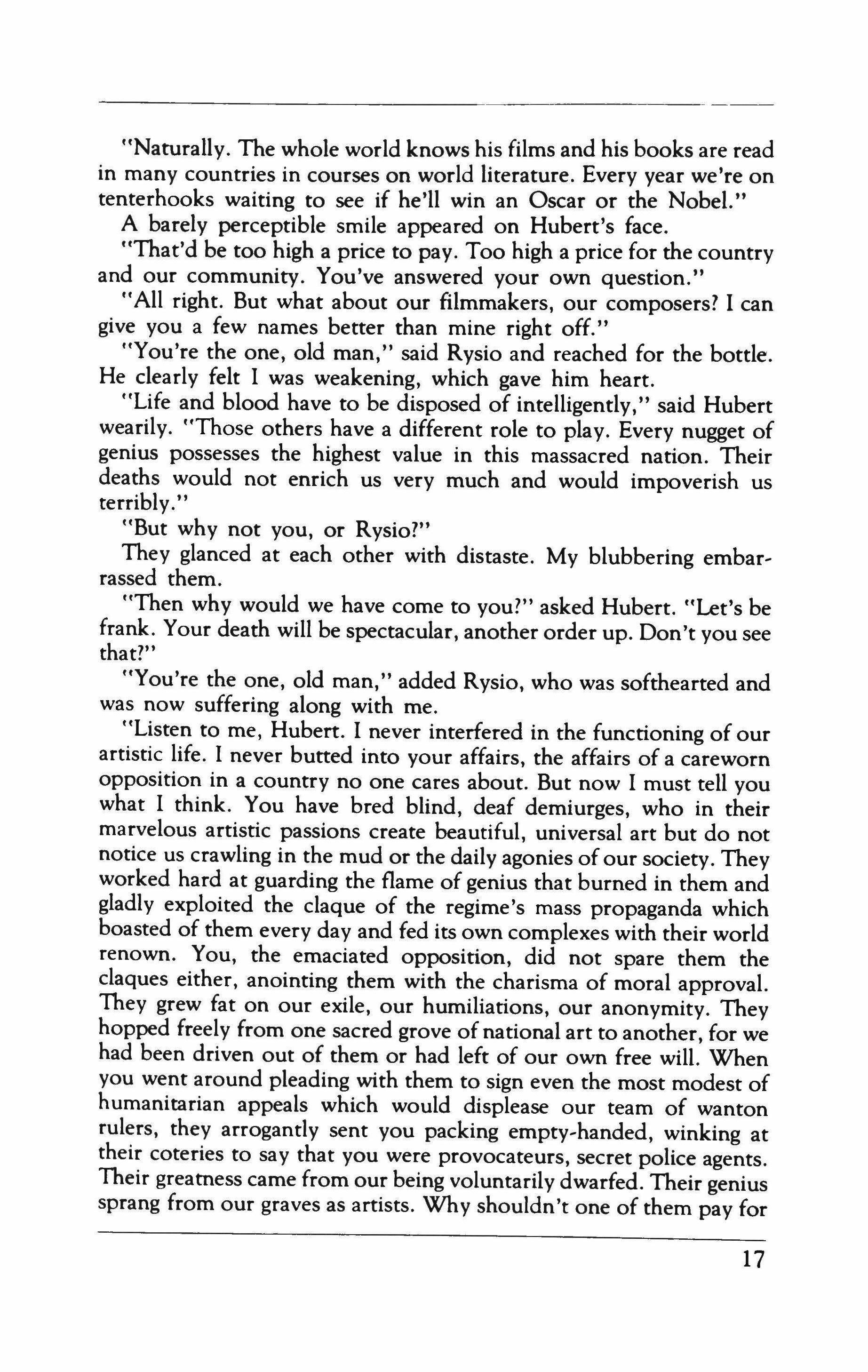
"Naturally. The whole world knows his films and his books are read in many countries in courses on world literature. Every year we're on tenterhooks waiting to see if he'll win an Oscar or the Nobel."
A barely perceptible smile appeared on Hubert's face.
"That'd be too high a price to pay. Too high a price for the country and our community. You've answered your own question."
"All right. But what about our filmmakers, our composers? I can give you a few names better than mine right off."
"You're the one, old man," said Rysio and reached for the bottle. He clearly felt I was weakening, which gave him heart.
"Life and blood have to be disposed of intelligently," said Hubert wearily. "Those others have a different role to play. Every nugget of genius possesses the highest value in this massacred nation. Their deaths would not enrich us very much and would impoverish us terribly."
"But why not you, or Rysio?"
They glanced at each other with distaste. My blubbering embarrassed them.
"Then why would we have come to you?" asked Hubert. "Let's be frank. Your death will be spectacular, another order up. Don't you see that?"
"You're the one, old man," added Rysio, who was softhearted and was now suffering along with me.
"Listen to me, Hubert. I never interfered in the functioning of our artistic life. I never butted into your affairs, the affairs of a careworn opposition in a country no one cares about. But now I must tell you what I think. You have bred blind, deaf demiurges, who in their marvelous artistic passions create beautiful, universal art but do not notice us crawling in the mud or the daily agonies of our society. They worked hard at guarding the flame of genius that burned in them and gladly exploited the claque of the regime's mass propaganda which boasted of them every day and fed its own complexes with their world renown. You, the emaciated opposition, did not spare them the claques either, anointing them with the charisma of moral approval. They grew fat on our exile, our humiliations, our anonymity. They hopped freely from one sacred grove of national art to another, for we had been driven out of them or had left of our own free will. When you went around pleading with them to sign even the most modest of humanitarian appeals which would displease our team of wanton rulers, they arrogantly sent you packing empty-handed, winking at their coteries to say that you were provocateurs, secret police agents. Their greatness came from our being voluntarily dwarfed. Their genius sprang from our graves as artists. Why shouldn't one of them pay for
17
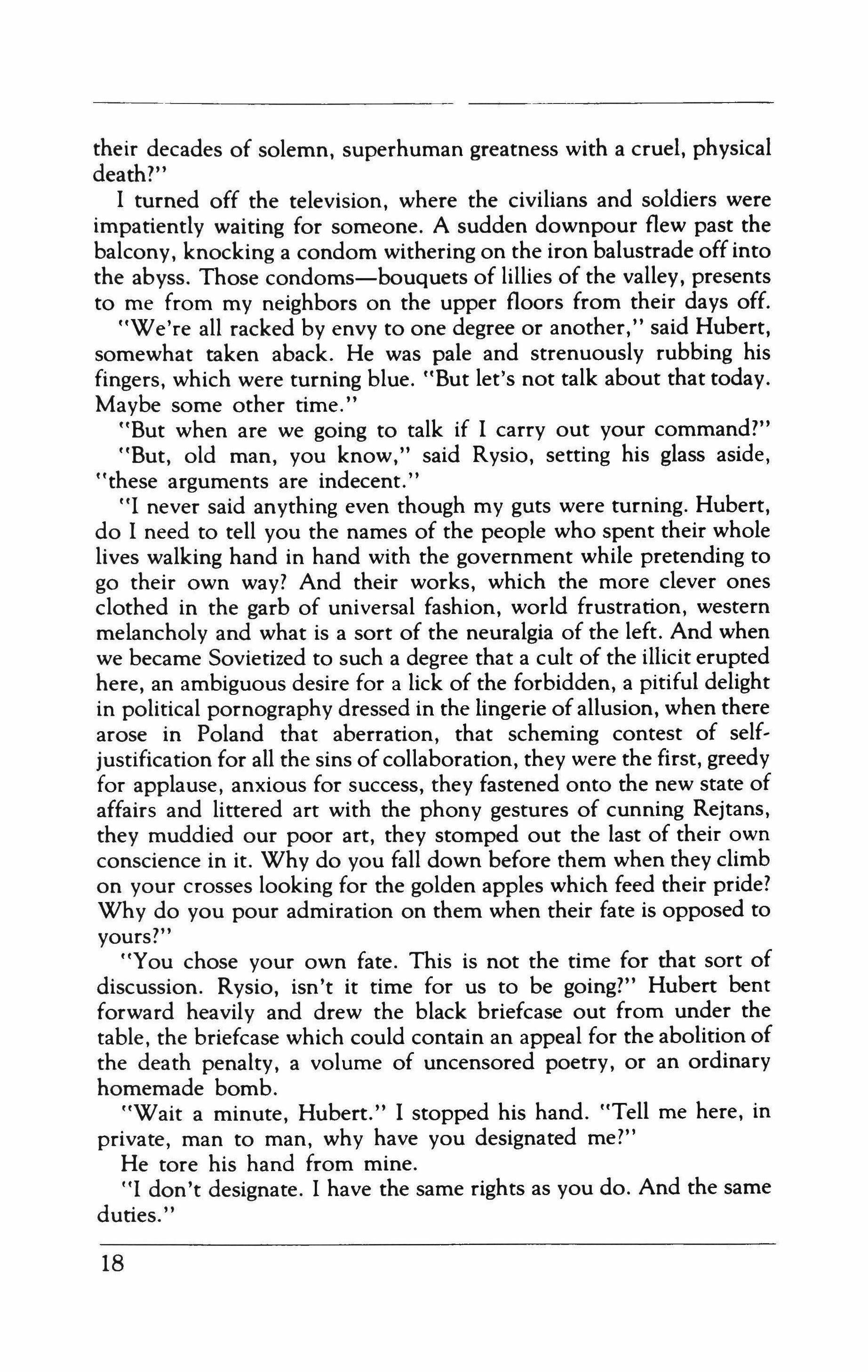
their decades of solemn, superhuman greatness with a cruel, physical death?"
I turned off the television, where the civilians and soldiers were impatiently waiting for someone. A sudden downpour flew past the balcony, knocking a condom withering on the iron balustrade off into the abyss. Those condoms-bouquets of lillies of the valley, presents to me from my neighbors on the upper floors from their days off.
"We're all racked by envy to one degree or another," said Hubert, somewhat taken aback. He was pale and strenuously rubbing his fingers, which were turning blue. "But let's not talk about that today. Maybe some other time."
"But when are we going to talk if I carry out your command?"
"But, old man, you know," said Rysio, setting his glass aside, "these arguments are indecent."
"I never said anything even though my guts were turning. Hubert, do I need to tell you the names of the people who spent their whole lives walking hand in hand with the government while pretending to go their own way? And their works, which the more clever ones clothed in the garb of universal fashion, world frustration, western melancholy and what is a sort of the neuralgia of the left. And when we became Sovietized to such a degree that a cult of the illicit erupted here, an ambiguous desire for a lick of the forbidden, a pitiful delight in political pornography dressed in the lingerie of allusion, when there arose in Poland that aberration, that scheming contest of selfjustification for all the sins of collaboration, they were the first, greedy for applause, anxious for success, they fastened onto the new state of affairs and littered art with the phony gestures of cunning Rejtans, they muddied our poor art, they stomped out the last of their own conscience in it. Why do you fall down before them when they climb on your crosses looking for the golden apples which feed their pride? Why do you pour admiration on them when their fate is opposed to yours?"
"You chose your own fate. This is not the time for that sort of discussion. Rvsio, isn't it time for us to be going?" Hubert bent forward heavily and drew the black briefcase out from under the table, the briefcase which could contain an appeal for the abolition of the death penalty, a volume of uncensored poetry, or an ordinary homemade bomb.
"Wait a minute, Hubert." I stopped his hand. "Tell me here, in private, man to man, why have you designated me?"
He tore his hand from mine.
"I don't designate. I have the same rights as you do. And the same duties.
18
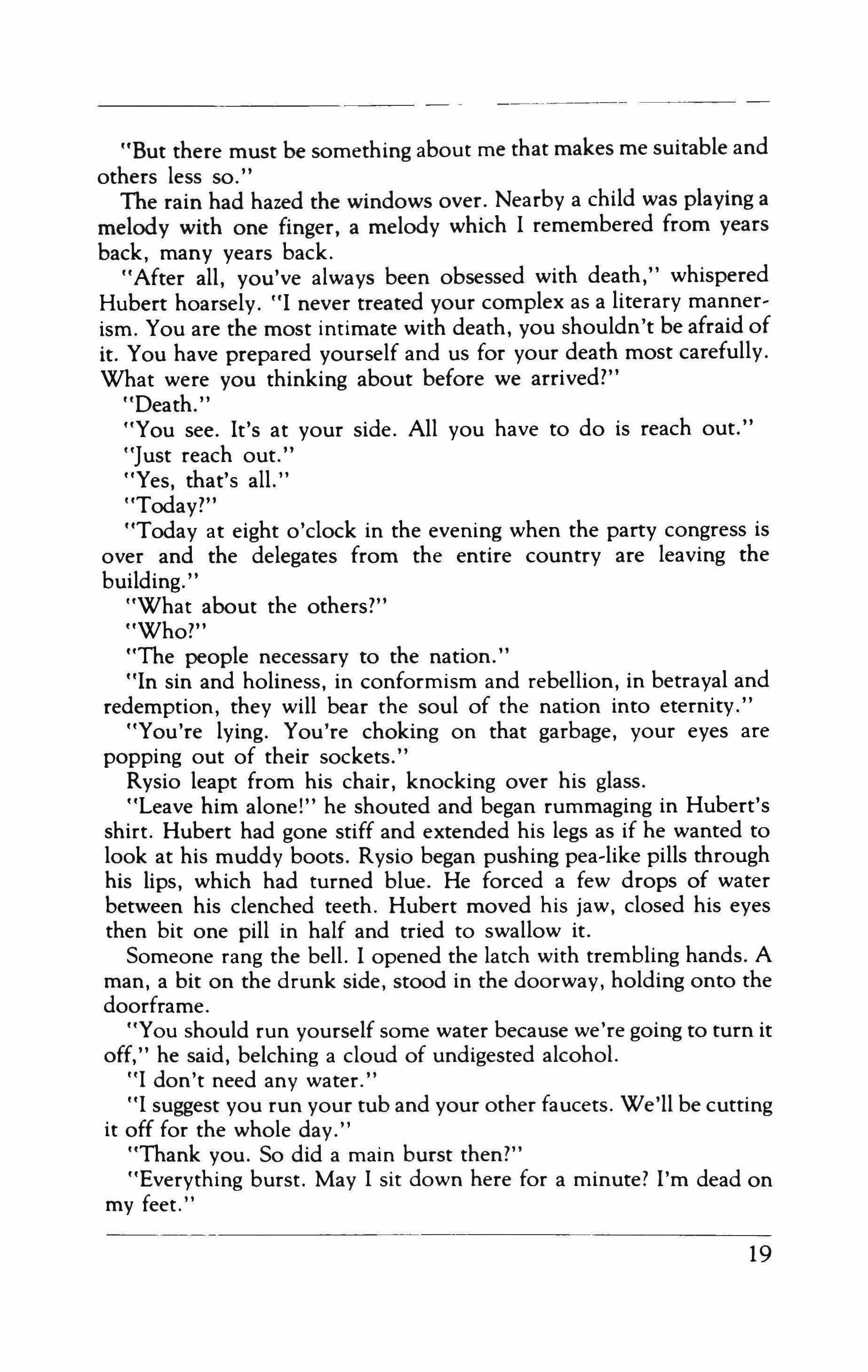
"But there must be something about me that makes me suitable and others less so."
The rain had hazed the windows over. Nearby a child was playing a melody with one finger, a melody which I remembered from years back, many years back.
"After all, you've always been obsessed with death," whispered Hubert hoarsely. "I never treated your complex as a literary manner' ism. You are the most intimate with death, you shouldn't be afraid of it. You have prepared yourself and us for your death most carefully. What were you thinking about before we arrived?"
"Death."
"You see. It's at your side. All you have to do is reach out."
"Just reach out."
"Yes, that's all."
"Today?"
"Today at eight o'clock in the evening when the party congress is over and the delegates from the entire country are leaving the building.
"What about the others?"
"Who?"
"The people necessary to the nation."
"In sin and holiness, in conformism and rebellion, in betrayal and redemption, they will bear the soul of the nation into eternity."
"You're lying. You're choking on that garbage, your eyes are popping out of their sockets."
Rvsio leapt from his chair, knocking over his glass.
"Leave him alone!" he shouted and began rummaging in Hubert's shirt. Hubert had gone stiff and extended his legs as if he wanted to look at his muddy boots. Rysio began pushing pea-like pills through his lips, which had turned blue. He forced a few drops of water between his clenched teeth. Hubert moved his jaw, closed his eyes then bit one pill in half and tried to swallow it.
Someone rang the bell. I opened the latch with trembling hands. A man, a bit on the drunk side, stood in the doorway, holding onto the doorframe.
"You should run yourself some water because we're going to turn it off," he said, belching a cloud of undigested alcohol.
"I don't need any water."
"I suggest you run your tub and your other faucets. We'll be cutting it off for the whole day."
"Thank you. So did a main burst then?"
"Everything burst. May I sit down here for a minute? I'm dead on my feet."
19

"I'm sorry but my friend isn't feeling well. I have to go fetch an ambulance.
"No one's feeling good these days. I won't bother you then. Stay well."
"The same to you."
He went off to knock on my neighbors' doors. I returned at a run down the hall. Now Hubert was sitting up straight in his chair. He smiled painfully to hide his sudden panic.
"Should I call a doctor?"
"No need to. I'm all right now. Where were we?"
A swath of sunlight moved across the rooftops of the city like a great kite. My friend the sparrow hopped onto one bar of the balustrade and was surprised that I did not greet him.
"Hubert, is there any sense to all this? Do you really believe there is?"
"Now you're asking?"
"Why have you been so unrelenting all your life? In all ways. Is it hormones or some higher force commanding you?"
"Leave him alone, he has to go horne." Rysio pushed me away.
"Isn't it a short way to the party building?"
"Not all deaths are the same, you see," said Hubert in a muffled voice. "We all need the elevated, the majestic, the holy. That is what you can offer us."
"For your sins, old man," added Rysio and attempted a smile. "You have plenty of yours, and ours, on your conscience."
"But they have just as many," I said in despair, affected by the hysteria of that foul autumn day.
"They're not here. You're all alone with God or, if you prefer, with your conscience."
"And where are they?"
"Far away on a small, unhappy planet."
"Hubert, what a stupid joke. Someone put you up to it."
"No, it's not a joke. You know that perfectly well yourself. You've been waiting for us for years. Be honest for once and admit you were waiting."
He looked at me for a long moment with his one good eye and then began searching for his briefcase, which he had kicked under the table during his attack.
"Hubert, answer me-do you believe this is necessary?"
He walked heavily over to me, put his arms around me, and kissed both my cheeks with his cold lips.
"Be at number sixty-three Vistula Street at eleven. Halina and Nadezhda will be waiting for you there. They're in engineering."
20
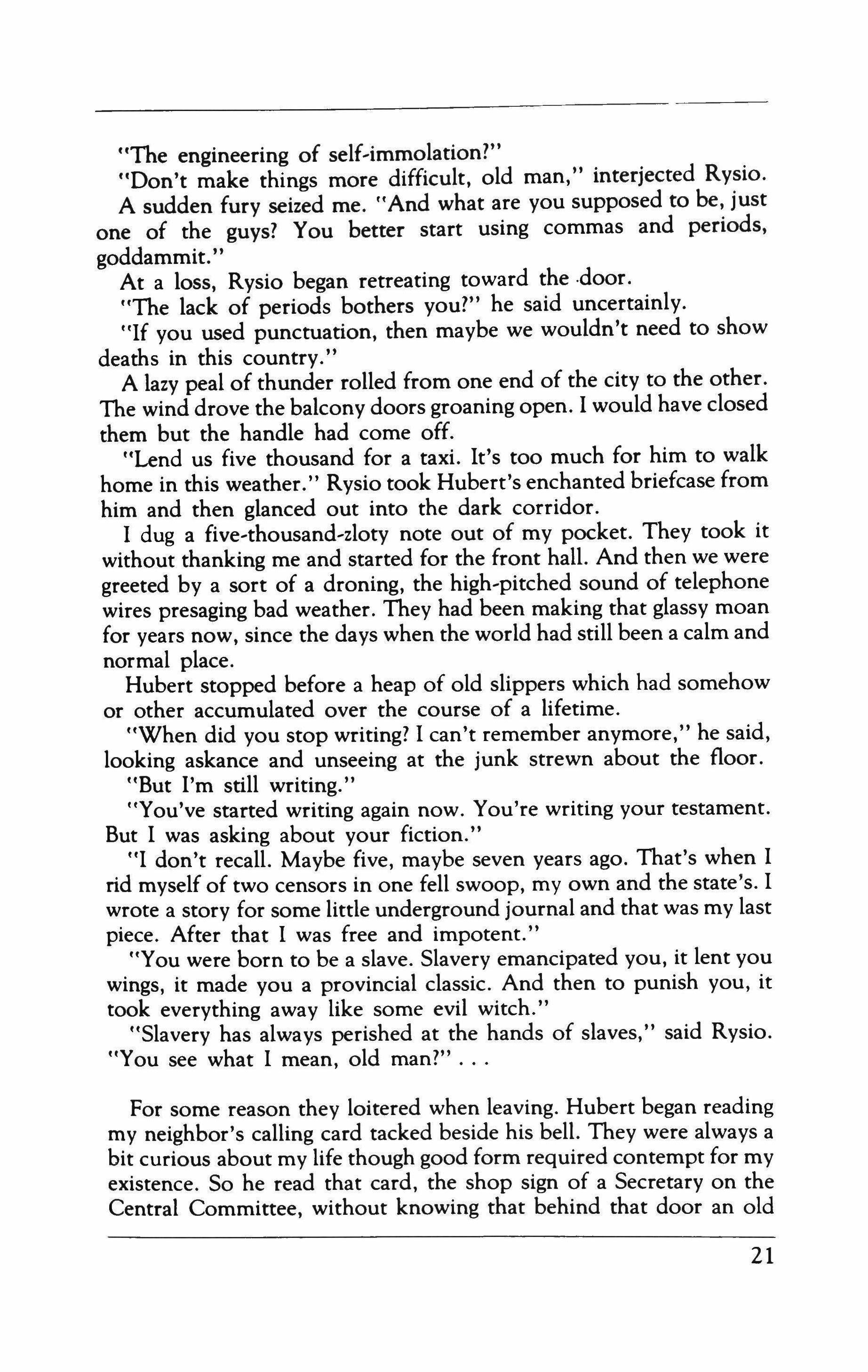
"The engineering of self-imrnolationl"
"Don't make things more difficult, old man," interjected Rvsio.
A sudden fury seized me. "And what are you supposed to be, just one of the guys? You better start using commas and periods, goddammit. "
At a loss, Rysio began retreating toward the .door.
"The lack of periods bothers you?" he said uncertainly.
"If you used punctuation, then maybe we wouldn't need to show deaths in this country."
A lazy peal of thunder rolled from one end of the city to the other. The wind drove the balcony doors groaning open. I would have closed them but the handle had come off.
"Lend us five thousand for a taxi. It's too much for him to walk home in this weather." Rvsio took Hubert's enchanted briefcase from him and then glanced out into the dark corridor.
I dug a five-thousand-zloty note out of my pocket. They took it without thanking me and started for the front hall. And then we were greeted by a sort of a droning, the high-pitched sound of telephone wires presaging bad weather. They had been making that glassy moan for years now, since the days when the world had still been a calm and normal place.
Hubert stopped before a heap of old slippers which had somehow or other accumulated over the course of a lifetime.
"When did you stop writing? I can't remember anymore," he said, looking askance and unseeing at the junk strewn about the floor.
"But I'm still writing."
"You've started writing again now. You're writing your testament. But I was asking about your fiction."
"I don't recall. Maybe five, maybe seven years ago. That's when I rid myself of two censors in one fell swoop, my own and the state's. I wrote a story for some little underground journal and that was my last piece. After that I was free and impotent."
"You were born to be a slave. Slavery emancipated you, it lent you wings, it made you a provincial classic. And then to punish you, it took everything away like some evil witch."
"Slavery has always perished at the hands of slaves," said Rvsio. "You see what I mean, old man?"
For some reason they loitered when leaving. Hubert began reading my neighbor's calling card tacked beside his bell. They were always a bit curious about my life though good form required contempt for my existence. So he read that card, the shop sign of a Secretary on the Central Committee, without knowing that behind that door an old
21

pensioner had been dying for ten years, had been trying to die day after day but with no success. From above, drops of dirty water dripped from the steps and the edges of the stairs. Our janitor, or as he is to be called these days, the building superintendent, an incorrigible lunatic, was washing the landing. He had already been on television and been written up in the papers and still on he went washing our stairs, the only building superintendent in the country still doing it.
"Don't punk out, old man," said Rysio.
"I have to think it over."
"They're expecting you at eleven, Halina and Nadezhda," added Hubert.
"And if I don't do it?"
"Then you'll go on living the way you've lived till now."
They began down the stairs, supporting each other like two saints, like Cyril and Methodius. And naturally I remembered Rvsio from those years long ago when we both were young. I remember one mad drunken night on some farm near Warsaw, the two of us sleeping side by side on a bed of straw. At that time Rysio was something between a critic and a filmologist. There was a drunken girl lying between us, a girl I never saw again. We were both lying semiconscious on my green poncho which I had obligingly spread out for us. The girl was moaning in her deep, drunken sleep. Rysio was fooling around with her, panting hoarsely with sudden desire and so she turned her back to him. Then she was facing me and I could feel her damp, sleepy breath on my cheek. Rysio did not give up; unconscious but hard at work, he was fumbling at her, tearing at her clothes, slipping under her inert body, breathing wildly. And then, when I was already falling into a delirious fever, Rysio clearly achieved his end, for he suddenly began moaning and pulling himself free on the frantic hay. Unaware of his ecstasies, she breathed her light, calm breath on me. It was only in the morning when, hungover, we were all collecting ourselves on that rustic bed, that I struggled into my raincoat and automatically put my hand in the pocket and to my horror discovered that in the darkness of the night, my pocket had been the victim of Rysio's passion, that he had made love to my pocket with a fierce and youthful love, perhaps even the first of his life.
Now Rvsio wrote unpunctuated, amorphous prose, played adjutant to Hubert, and was a venerable figure in the literary world. I returned to my room to watch them through the window. Just then, by some miracle, an empty taxi happened by, but they missed it and walked off with dignity toward Nowy Swiat. I was curious if they were being followed. But no car pulled away from the curb and no one came running out from the half shadows of any neighboring building.
22

At one point Hubert had hanged himself in his wardrobe; he had been mercilessly baited during one campaign, for at that time, toward the end of the sixties, the regime still had strength enough for cruel spectacles and sinister campaigns. So, Hubert hanged himself, but of course it was the first time he had ever done it and he didn't have the knack yet. The rod broke, the wardrobe turned over, and Hubert survived. Yes, he survived so that years later he could bring me my death sentence.
There was another peal of thunder in the low, cramped sky. I went to the bathroom to wash up. The pipes began gurgling something awful, they hiccupped, but what was left of the water came out. I washed mechanically, wondering if it were right to wash and dress, considering what was in store for me. But, after all, one should take death like communion, neatly dressed and with reverence. But did I have to die? Was someone going to force me off a bridge or douse me with gasoline? The decision was mine, wasn't it? I could die with honor or go on living dishonorably.
The gong resounded again. I thought that Rysio and Hubert had forgotten something or were returning to call off the sentence. Dripping with the little water there was, I ran to the door. An old man with a large, leather bag was sitting on the steps.
"Are you here to see me?" I asked.
"Yes, I am. I've been instructed to turn off the gas."
"But you've already turned it off three times this year."
"What do I know, first they tell me turn it off, then they tell me turn it on. They don't know what they're doing. Every day a house blows up, so to make it look like something's being done about it, they tell me to turn off the gas. It's a lucky thing your apartment's still here because I've got the numbers here of places which are gone." He showed me a dirty slip of paper.
"Well, then why don't you turn off the electricity while you're at it? It doesn't matter to me."
"It doesn't matter to you," said the old man with a sly smirk, and he sprang nimbly into the bathroom. "But it matters to me. I've only got authority for the gas."
And indeed, in a fraction of a second, he had turned the valve, had taken apart the grate on the heater and was already sitting on the edge of the bathtub, lighting up a cigarette that was coming unglued.
"It's nice to take a warm bath, if only to wash your butt, you'll pardon the expression," discoursed the old man, glancing about the bathroom. "But what can you do, orders are orders. Maybe you should have a little talk with the manager, you know what I mean. Speak to his hand."
-
23
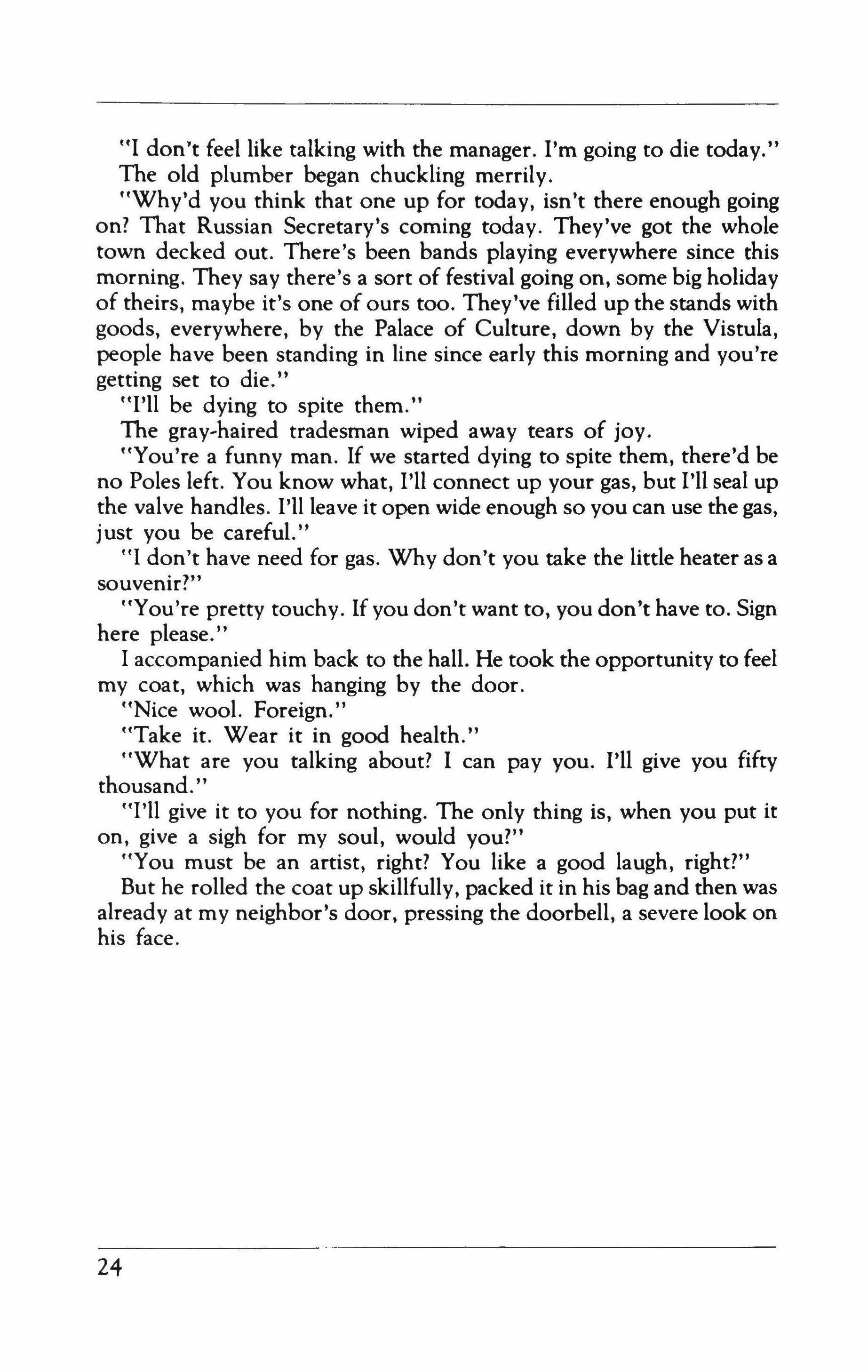
"I don't feel like talking with the manager. I'm going to die today."
The old plumber began chuckling merrily.
"Why'd you think that one up for today, isn't there enough going on? That Russian Secretary's coming today. They've got the whole town decked out. There's been bands playing everywhere since this morning. They say there's a sort of festival going on, some big holiday of theirs, maybe it's one of ours too. They've filled up the stands with goods, everywhere, by the Palace of Culture, down by the Vistula, people have been standing in line since early this morning and you're getting set to die."
"I'll be dying to spite them."
The gray-haired tradesman wiped away tears of joy.
"You're a funny man. If we started dying to spite them, there'd be no Poles left. You know what, I'll connect up your gas, but I'll seal up the valve handles. I'll leave it open wide enough so you can use the gas, just you be careful."
"I don't have need for gas. Why don't you take the little heater as a souvenir?"
"You're pretty touchy. If you don't want to, you don't have to. Sign here please."
I accompanied him back to the hall. He took the opportunity to feel my coat, which was hanging by the door.
"Nice wool. Foreign."
"Take it. Wear it in good health."
"What are you talking about? I can pay you. I'll give you fifty thousand.
"I'll give it to you for nothing. The only thing is, when you put it on, give a sigh for my soul, would you?"
"You must be an artist, right? You like a good laugh, right?"
But he rolled the coat up skillfully, packed it in his bag and then was already at my neighbor's door, pressing the doorbell, a severe look on his face.
24
Tortures
Wislawa Szymborska
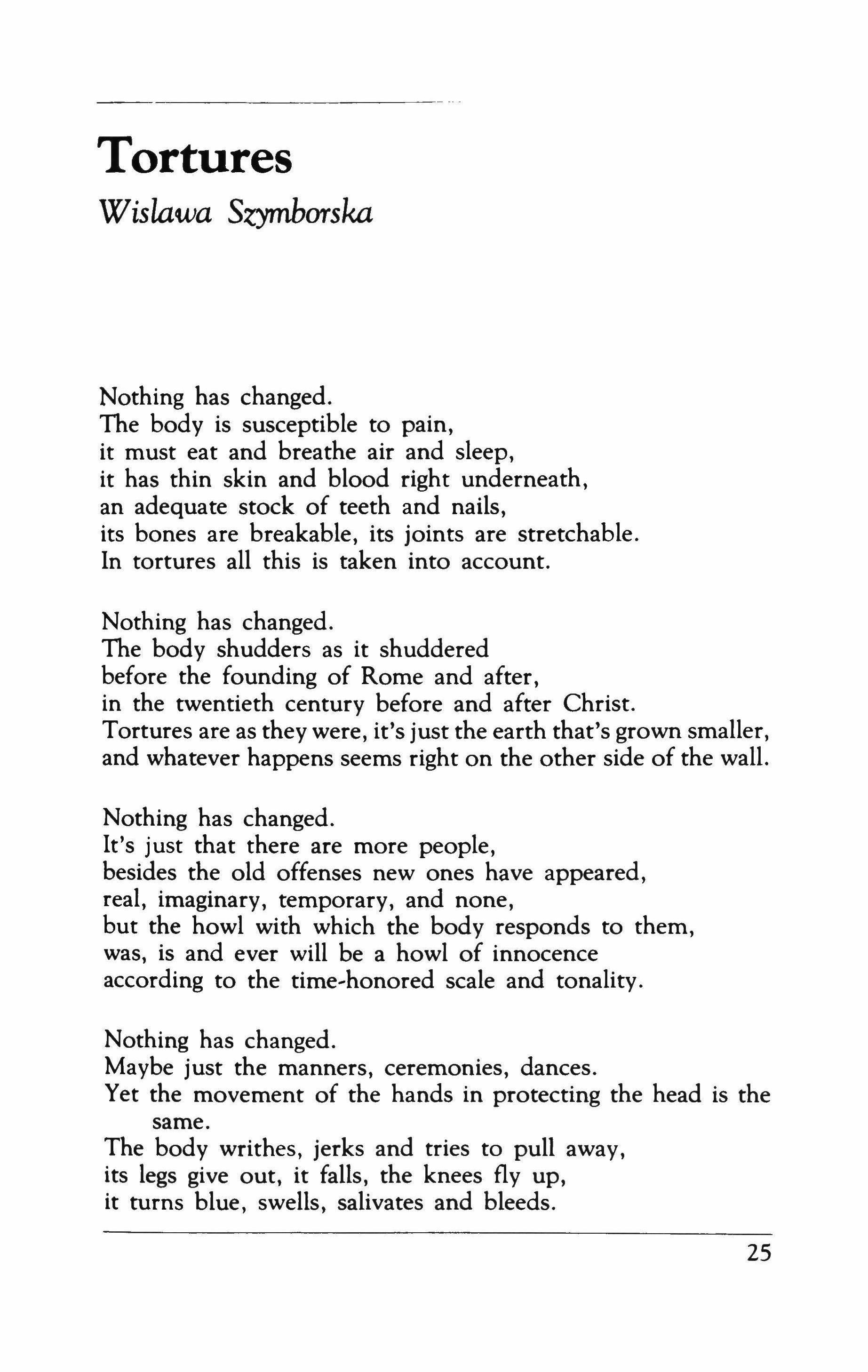
Nothing has changed.
The body is susceptible to pain, it must eat and breathe air and sleep, it has thin skin and blood right underneath, an adequate stock of teeth and nails, its bones are breakable, its joints are stretchable. In tortures all this is taken into account.
Nothing has changed.
The body shudders as it shuddered before the founding of Rome and after, in the twentieth century before and after Christ. Tortures are as they were, it's just the earth that's grown smaller, and whatever happens seems right on the other side of the wall.
Nothing has changed.
It's just that there are more people, besides the old offenses new ones have appeared, real, imaginary, temporary, and none, but the howl with which the body responds to them, was, is and ever will be a howl of innocence according to the time-honored scale and tonality.
Nothing has changed.
Maybe just the manners, ceremonies, dances. Yet the movement of the hands in protecting the head is the same.
The body writhes, jerks and tries to pull away, its legs give out, it falls, the knees fly up, it turns blue, swells, salivates and bleeds.
25
Nothing has changed. Except for the course of boundaries, the line of forests, coasts, deserts and glaciers. Amid these landscapes traipses the soul, disappears, comes back, draws nearer, moves away, alien to itself, elusive, at times certain, at others uncertain of its own existence, while the body is and is and is and has no place of its own.

Translated by Magnus ]. Krynski and Robert A. Maguire
26
Drawing by Wojtek Wolynski, smuggled from Ostrow internment camp.
Philately
Wiktor Woroszylski
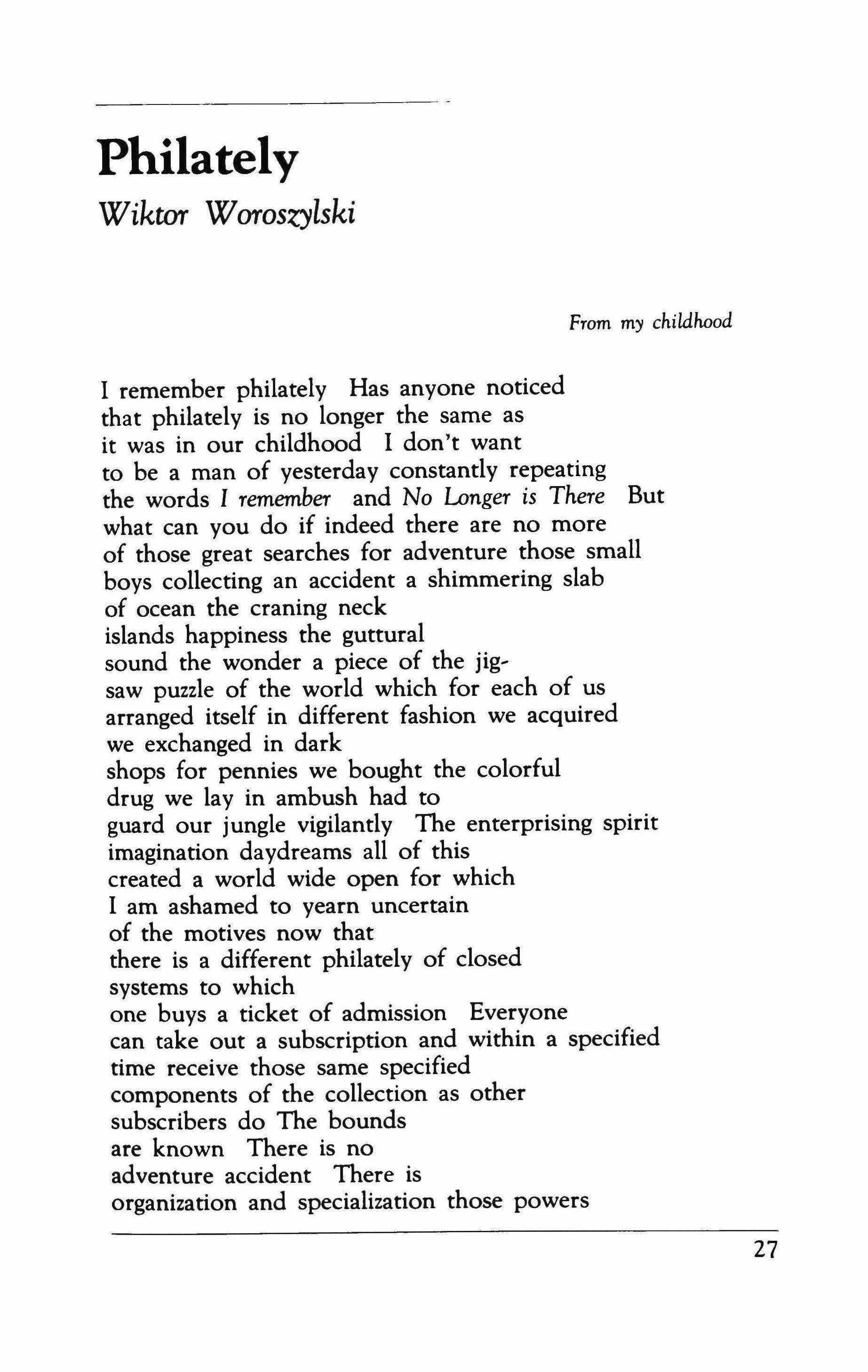
From my childhood
I remember philately Has anyone noticed that philately is no longer the same as it was in our childhood I don't want to be a man of yesterday constantly repeating the words I remember and No Longer is There But what can you do if indeed there are no more of those great searches for adventure those small boys collecting an accident a shimmering slab of ocean the craning neck islands happiness the guttural sound the wonder a piece of the jigsaw puzzle of the world which for each of us arranged itself in different fashion we acquired we exchanged in dark shops for pennies we bought the colorful drug we lay in ambush had to guard our jungle vigilantly The enterprising spirit imagination daydreams all of this created a world wide open for which I am ashamed to yearn uncertain of the motives now that there is a different philately of closed systems to which one buys a ticket of admission Everyone can take out a subscription and within a specified time receive those same specified components of the collection as other subscribers do The bounds are known There is no adventure accident There is organization and specialization those powers
27
of today's world That is total philately Perhaps it confers other satisfactions Of belonging of symmetry of completeness of inclusion among the customers of the philatelic industry of the certainty of receiving the same as others in the chosen area of pasting a surface in a standard way I can't object to that since that's the way things are I can only say that we were concerned with something quite dissimilar that is no more and never will be again
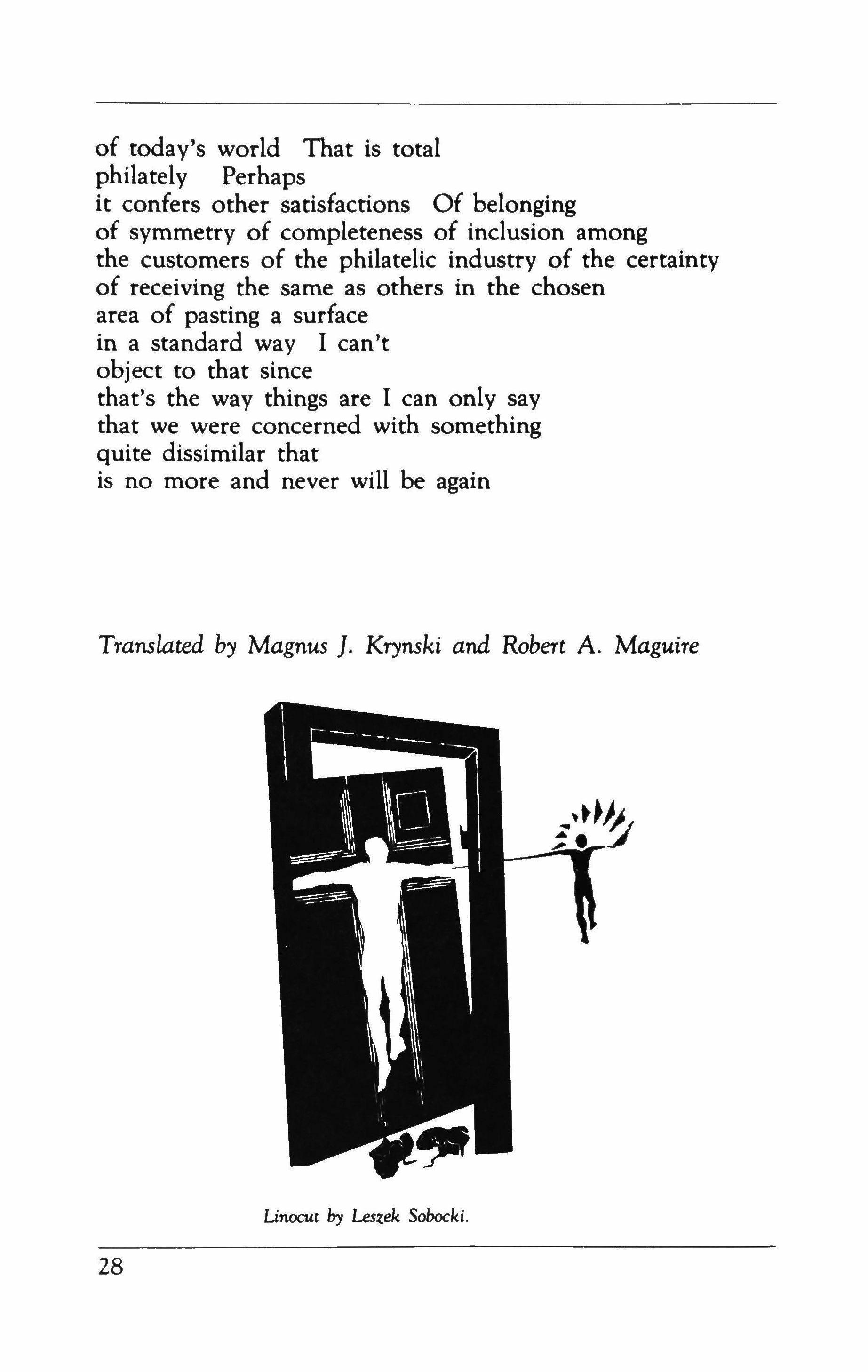 Translated
Translated
by
Magnus ]. Krynski and Robert A. Maguire
28
Linocut by Lestek Sobocki.
The peacock
Marek Nowakowski

The railroad station was half-empty. Cashiers sat idly in the few open ticket offices. The handful of travelers was scattered upon benches and alongside walls. They sat sleeping or just gaping ahead. The TV flickered with changing pictures. Some kids were gathered in front of the screen. Silence reigned. A lifeless station. That is the impression it gave. No sign of nervous rushing, elbowing by the ticket offices, quarreling or inquiring about departing trains. Nowhere to be seen were the tramps of both sexes, drunken women of an age difficult to tell, and long-haired, cretinous men typical of station life. Perhaps a few of these figures were lurking in the station's darkest corners. Hounded and uncertain, expecting any moment to be discovered by the omnipresent eye.
Most of all silence struck the ear. So the hard knocking of hobnailed boots against stone slabs jerked up the heads of the few travelers present. The empty space of the station hall was being crossed by a police patrol. Five strapping, well-fed men. They looked around. They woke up a sleeping old man, and checked his documents.
The people soon lowered their heads. They avoided the keen eyes of the police. The patrol went towards the stairs leading to the platforms. Then a sudden din reverberated from the opposite end. It filled the quiet, empty space and drowned the footsteps of the patrol.
The people once again jerked up their heads. They stared in the other direction. In through the electric-eve door came a trunk on wheels. A huge yellow trunk with metal fittings, plastered with hotel and travel-bureau stickers in various languages. It moved on for several meters and stopped. It was followed by a black man. A marvelous tall black man in a white sheepskin coat. His hands glittered with the gold of signets and rings. Lazily walking up to the trunk, he pushed it forward with a strong thrust of his long leg. It sped along on its wheels. Rattling and grinding.
29
The patrol, which was just descending the first steps leading to the platforms, stopped dead. The policemen turned their heads. Their faces were concentrated, their gazes evil. Their hands rested on their machine guns.
The black man was now in the middle of the station hall. The trunk beside him. Once again he set it into motion with the energetic kick of a foot in a soft, shapely, high-heeled shoe. The parted flaps of his white sheepskin coat revealed a bright red sweater and black velvet pants. A peacock! He looked like the embodiment of exuberant, provocative freedom. A freedom impossible to tame.
The people gazed spellbound. Lights of trains, distant journeys That's what filled their eyes.
-Mommy! -whispered a little girl. -Look, a Negro! -she flung out her hand, delighted.
-Well, haven't you ever seen a Negro?! -the mother angrily pulled back her hand. She too avidly eyed that lofty colored figure.
 Translated by Boguslaw Rostworowski
Translated by Boguslaw Rostworowski
30
Confidential phone call
Marek Nowakowski

A low sky. Depressing weather. The Rio cafe closed. Where to go? You can't hang around for too long. They'll approach you and check your documents. And back home? The wailing of the old folk: "What are we in for! What are we in for!"
At a distance Blazej was clumsily trotting along. We watched indifferently. He was panting. Fatty-as we called him-was excited.
-You know what, boys! -he called. -They've been questioning the janitor!
We weren't particularly moved. Lots of people were being questioned. But Fatty'S inarticulate account began taking on interesting contours. They're looking for people from Solidarity. The names of Bujak and Janas were mentioned.
Blazej swore on all the saints of this materialistic world that he had seen some civilian showing the photographs to the super. The super had looked carefully, blinking his eyes.
-If I notice anything-he said-I'll report it to you, of course. The super was despicable, and he was sure to report. We didn't like him and he didn't like us either. He would get confused by our sophisticated statements and lose his self-assurance. We were standing in front of the closed Rio cafe and things were no longer the same as they had been a moment ago.
Blazej's story had reacted on our imaginations. Like the prick of a pin. Had some outsider been seen here recently? On the run? We hadn't noticed anyone like that. It was a peaceful white-collar-worker apartment complex. Medium-sized blocks arranged in quadrangles. But we couldn't help thinking about the matter. We had an infinite amount of free time. Flowing in a stream. They hadn't yet opened the schools. Some of us were very pessimistic about the future. They had done away with the Independent Students' Union, and were sure to harass some of us. Ugly times had come about. In the evenings, at
31
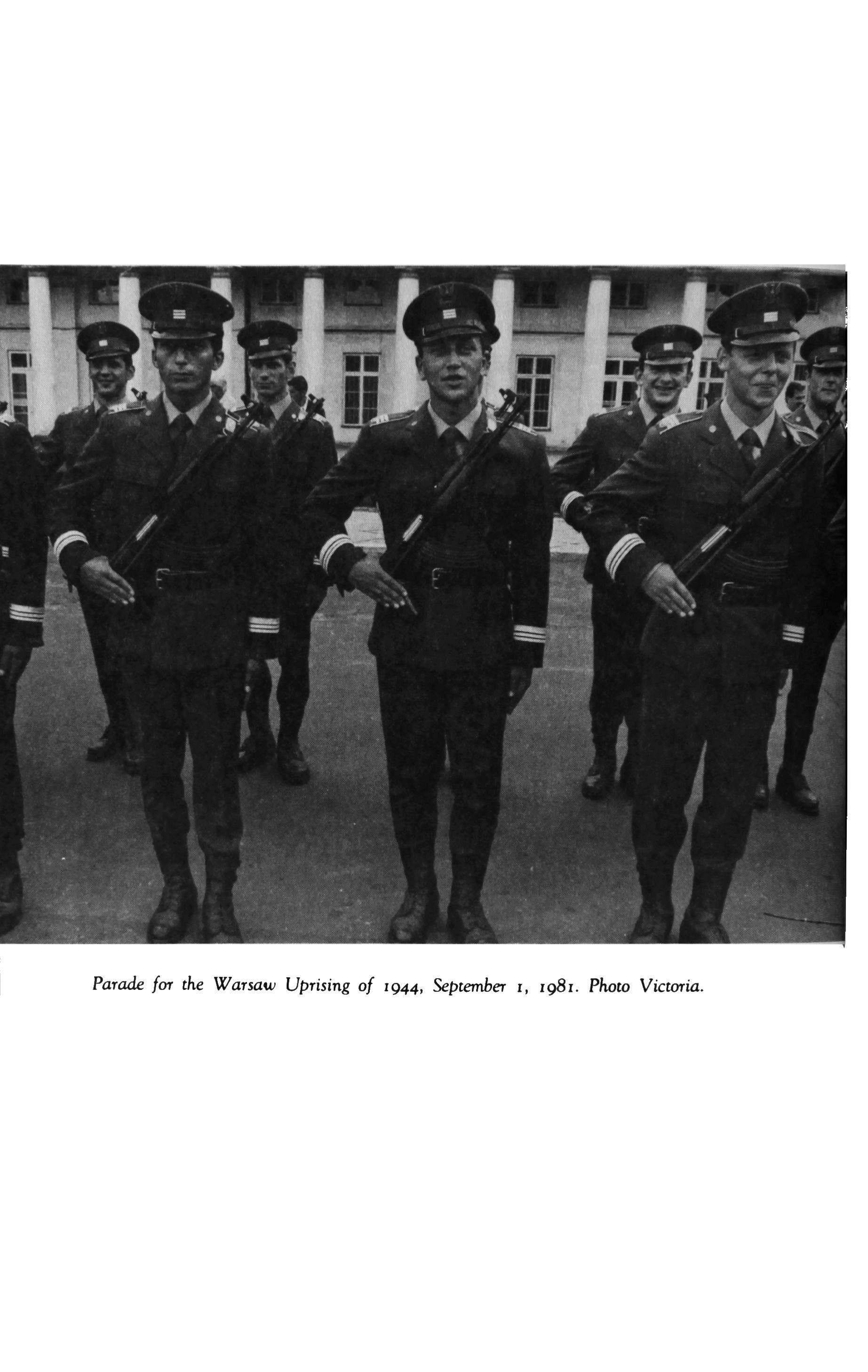 Parade far the Warsaw Uprising of 1944, September I, HXlI. Photo Victaria.
Parade far the Warsaw Uprising of 1944, September I, HXlI. Photo Victaria.

home, we gambled at guessing: what swine would we see in the silver window today? What vermin would deliver a eulogy extolling the state of war and the rosy future awaiting us? What rhetoric would he apply? Would he avoid the reefs, or would he stun us mercilessly? Would it be an oration full of hatred for the latter period? Or would we see someone disguised in the robes of a mentor with painful concern in his face? And so on. They picked those swine perfectly. A natural choice. A whole parade.
-A parade of swindlers-said Wladek.
And for decoration's sake they would throw in a few sclerotic old men who probably had no idea what was happening or what purpose their statements might serve. They were simply pathetic. As Wladek put it: "The grandfather myth has been shattered at last." This was in reference to his family tradition. His father was always telling him about his grandfather. Grandfather was the idol of Wladek's family. But coming back to the swine. Our evenings of masochistic viewing gave birth to an idea. Its author was Babyface, shy and full of erotic complexes, whom we called by that name because as an only child he had been brought up under hothouse conditions, so we often made fun of him.
Didn't one of those glorifiers ofthe state of war live at our complex? However, we hadn't seen him for a week. He's sure to avoid meeting people. Or possibly he's locked himself up in his study to create under the inspiration of the new times.
-He couldn't have got a new villa so quickly-somebody remarked.
He couldn't have got it so quickly. Such a pace is not yet catered to by our national possibilities.
Rysio Pisarski dispelled all doubts. He had seen him yesterday evening. On a walk with his dog. He had an Afghan called Koko.
We concentrated intensely on Babvface's idea. This was a leading swine. A writer by profession. He was the third one on the show. He had had a high rating. We remembered perfectly his television performance. Ordinarily, he was of no interest to us. Dumpy, and always walking with an executive briefcase. In winter he wore a sheepskin coat and a fox hat. He wrote novels which we hadn't read for a long time. We had already acquired a literary taste. We liked good literature and recently we had been delighted with The Tongue Set Free. However, not because of the acclaim caused by the Nobel Prize having been given to this original writer. Earlier on, Auto--da-Fe had been our private discovery. Therefore, in no way could we consider as literature the books by our neighbor from the complex, in which trash, slimy eroticism and simple brute force competed with a false and
33

preconceived picture of reality. In this picture truth was situated exclusively in our part of Europe, and supporting the East was an expression of heroic choice. The writer delicately envelops this East in a mystical mist of secrecy. He suggests outright that a third Rome is situated there, and that we are descended from that cradle. And, also, that humanism is solely our privilege. This in short was the recipe of his vision, philosophy of history and moralizing. This literature did not seem to us worthy of the least interest. It was a waste of time. For years, regardless of times and various upheavals, this writer's books were published in enormous editions. They were rampant everywhere from the bookshop windows to the apartments of the new intelligentsia, where they adorned the shelves of wall-to-wall furniture. He was an unchanging and unimpairable value. After all, we had been brought up in his shadow. For us he was a shadow. He robbed us of light. Pretty soon we became conscious of this, and we didn't drown in the slimy, licentious verbosity, profusely stuffed with descriptions of nature, fodder and horse's sweat, encrusted here and there with the pathos of God and fatherland. That's it! His measure of disgust was overflowing with patriotism and Catholicism. Recently on TV his mouth was full ofjingoistic platitudes. And over the years his face had taken on such a hypocritical look that he could well be used for frightening children as the wolf disguised as Little Red Riding Hood, barely controlling its appetite.
We unleashed our hate, and everyone added his little bit to the portrait of the neighborhood writer, as someone wittily called him. Day after day was burdened by the putrid grandiloquence of those like him, and we had no way of responding. We rubbed hands. Not from the cold however. But enlivened by a hunter's instinct. The hounds were not yet on the chase, but soon
The idea needed detailed planning. Arkadiusz saw to this. He had a cool, precise mind, and did not easily give in to emotions. Why is he studying Oriental philology? He's a born mathematician. Moreover, he has a private interest in Wittgenstein, and often embellishes his statements with the aphorisms of this philosopher. To be honest, he hasn't a match among us. It's just the gregarious instinct of apartmentcomplex life that keeps him among his own age-group.
-I've got it-Arkadiusz drawled. We were burning with curiosity. -Well-he continued-today we ought to ring the police headquarters and give the address where someone resembling Janas or Bujak is hiding out-. Everyone's eyes lit up. An avid silence reigned. We were tasting the morsel. -Let it be Bujak-decided Arkadiusz-. He's first-class bait and should do the trick.
Then we got down to action.
34

Tall Michael went off to reconnoiter. He was to check bearings. He came back delighted.
-He's at home writing-he declared. -I heard the typewriter. We decided for the afternoon. People come back from work. Winter dusk is early. While at the same time visibility is not bad. We wanted to have a show.
-Let's play at confidential telephone calls-. That's what Arkadiusz called the operation.
There was still the snag as to how the telephone informer was to introduce himself. "A well-wisher," or "an ideological informer"? "Ideological" sounds insolent and artificial. Who uses such adjectives these days? Only the papers. We opted for "well-wishing observer." Arkadiusz again asked to be heard.
-Too creative-he drawled. -"Well,wishing observer" sounds as if it were taken straight out of some thriller. We have to base it on living reality. To make the communique plausible. To put it briefly: let it be the super, that is "the director of physical plant." Only in this way will it sound natural and things will turn out according to expectations.
He convinced us. Logic and realism. We had no scruples regarding the super. Often the police would drive up to his place. You should see how he welcomes them! With what hospitality. They leave his home bloated with drink. And then there's the proverbial brother-inlaw. "My brother-in-law's gone to London." "My brother-in-law's in Sweden." A suspicious creature. He would sometimes drive up in his Zastawa car and honk for the super to come out. Super and family would rush out. We felt no scruples. Let it be the super phoning. Bolek decided to play the part. He had a hoarse, somewhat hurried voice. He did a rehearsal on the spot and impressed us. A real honest, to-god informer.
The time separating us from the fixed "zero" hour passed quick as a flash. Absent-mindedness, thoughts a long way away, and lunch at home. We hung around, looked over some books, and time was up! We chose the telephone booth by the supermarket. Bolek went inside. Arkadiusz stood by him like a director. We had left a lookout at the corner. We arranged a signal.
Opposite the third block on Cluster F there was a parallel block, and we took up positions there on the fourth floor in the staircase. We had a perfect view. We could see Bolek through the glass of the booth. He was lifting up the receiver. Now, turning the number on the dial. This is Arkadiusz's description of the event. We had no doubts as to the accuracy and faithfulness of the report.
-The duty officer, please! This is the director of physical plant
35
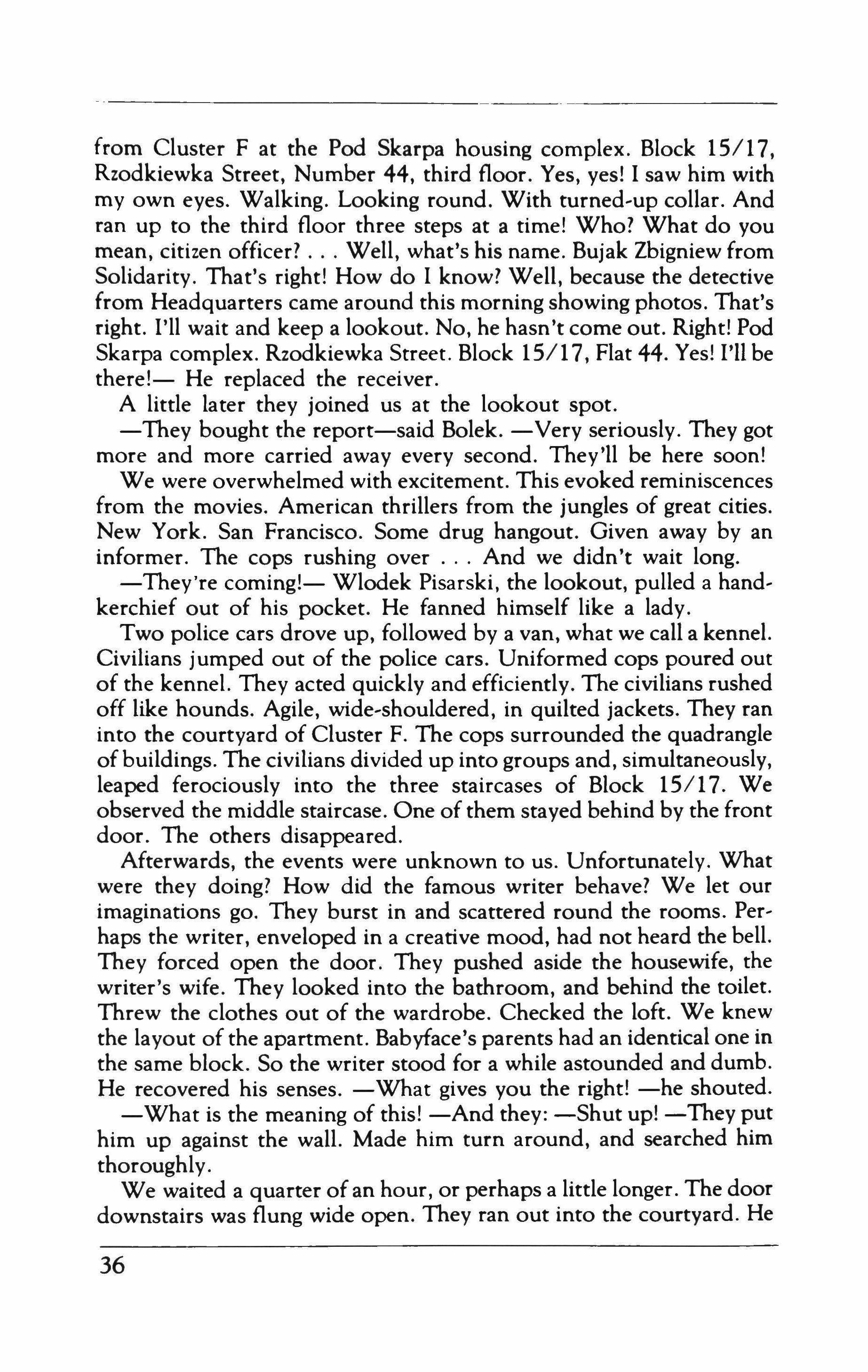
from Cluster F at the Pod Skarpa housing complex. Block 15/17, Rzodkiewka Street, Number 44, third floor. Yes, yes! I saw him with my own eyes. Walking. Looking round. With turned-up collar. And ran up to the third floor three steps at a time! Who? What do you mean, citizen officer? Well, what's his name. Bujak Zbigniew from Solidarity. That's right! How do I know? Well, because the detective from Headquarters came around this morning showing photos. That's right. I'll wait and keep a lookout. No, he hasn't come out. Right! Pod Skarpa complex. Rzodkiewka Street. Block 15/17, Flat 44. Yes! I'll be there!- He replaced the receiver.
A little later they joined us at the lookout spot.
- They bought the report-said Bolek. -Very seriously. They got more and more carried away every second. They'll be here soon!
We were overwhelmed with excitement. This evoked reminiscences from the movies. American thrillers from the jungles of great cities. New York. San Francisco. Some drug hangout. Given away by an informer. The cops rushing over And we didn't wait long.
-They're coming!- Wlodek Pisarski, the lookout, pulled a hand, kerchief out of his pocket. He fanned himself like a lady.
Two police cars drove up, followed by a van, what we call a kennel. Civilians jumped out of the police cars. Uniformed cops poured out of the kennel. They acted quickly and efficiently. The civilians rushed off like hounds. Agile, wide-shouldered, in quilted jackets. They ran into the courtyard of Cluster F. The cops surrounded the quadrangle ofbuildings. The civilians divided up into groups and, simultaneously, leaped ferociously into the three staircases of Block 15/17. We observed the middle staircase. One of them stayed behind by the front door. The others disappeared.
Afterwards, the events were unknown to us. Unfortunately. What were they doing? How did the famous writer behave? We let our imaginations go. They burst in and scattered round the rooms. Per' haps the writer, enveloped in a creative mood, had not heard the bell. They forced open the door. They pushed aside the housewife, the writer's wife. They looked into the bathroom, and behind the toilet. Threw the clothes out of the wardrobe. Checked the loft. We knew the layout of the apartment. Babyface's parents had an identical one in the same block. So the writer stood for a while astounded and dumb. He recovered his senses. -What gives you the right! -he shouted. - What is the meaning of this! -And they: -Shut up! -They put him up against the wall. Made him turn around, and searched him thoroughly.
We waited a quarter of an hour, or perhaps a little longer. The door downstairs was flung wide open. They ran out into the courtyard. He
36
was among them. Only wearing a suit. Two of them held him by the arms. He resisted. Dragged his legs. They pulled him along. We could no longer make out the expression on his face. Dusk was falling. Gapers were gathering in the courtyard. In the windows also. The super wasn't there yet. Maybe he had gone to see his darling brotherin-law. One up for us. Let the operetta carryon for as long as possible. The police cordon surrounding Cluster F stood still like a wall. A grim wall. Then a white Fiat drove up. Two plainclothes policemen got out. Moving their bulky bodies in a dignified manner.
- The chiefs-whispered Arkadiusz.
The civilians dragged the writer alongside. They let him go. The writer feverishly fumbled inside his jacket pockets. He brought out something. Showed it. The newcomers scrutinized it curiously. They also gave him a serious look. Suddenly there is a complete change of atmosphere. They shake hands sincerely with the writer. One after the other. They shake for a long time. The civilians move away to the back. They lower their heads. The writer now remains alone with the chiefs. Lively conversation. He gesticulates vehemently. The two nod in agreement. Once more sincere handshakes. They almost embrace. The end of the action. There is no Bujak. The police cars drive off. The kennel also. The car with the chiefs leaves last. They peer out of the Fiat's windows. Waving to the writer. Bye-bye! He was left all alone. We were fully satisfied. He didn't know how to go back. People were standing all around. That fat squat figure! He somehow shrank and lowered his head. He went back like a mongrel with its tail between its legs. Sneaking past. Ludicrously trotting along on short legs. Tripped up near the garbage on the path made slippery by the children. Just managed to keep balance. Hurried up with a doubled effort. Then disappeared up his staircase. Only now did the super turn up. Totally perplexed.
-What's up?! -he inquired urgently. -What's up?!
Translated by Boguslaw
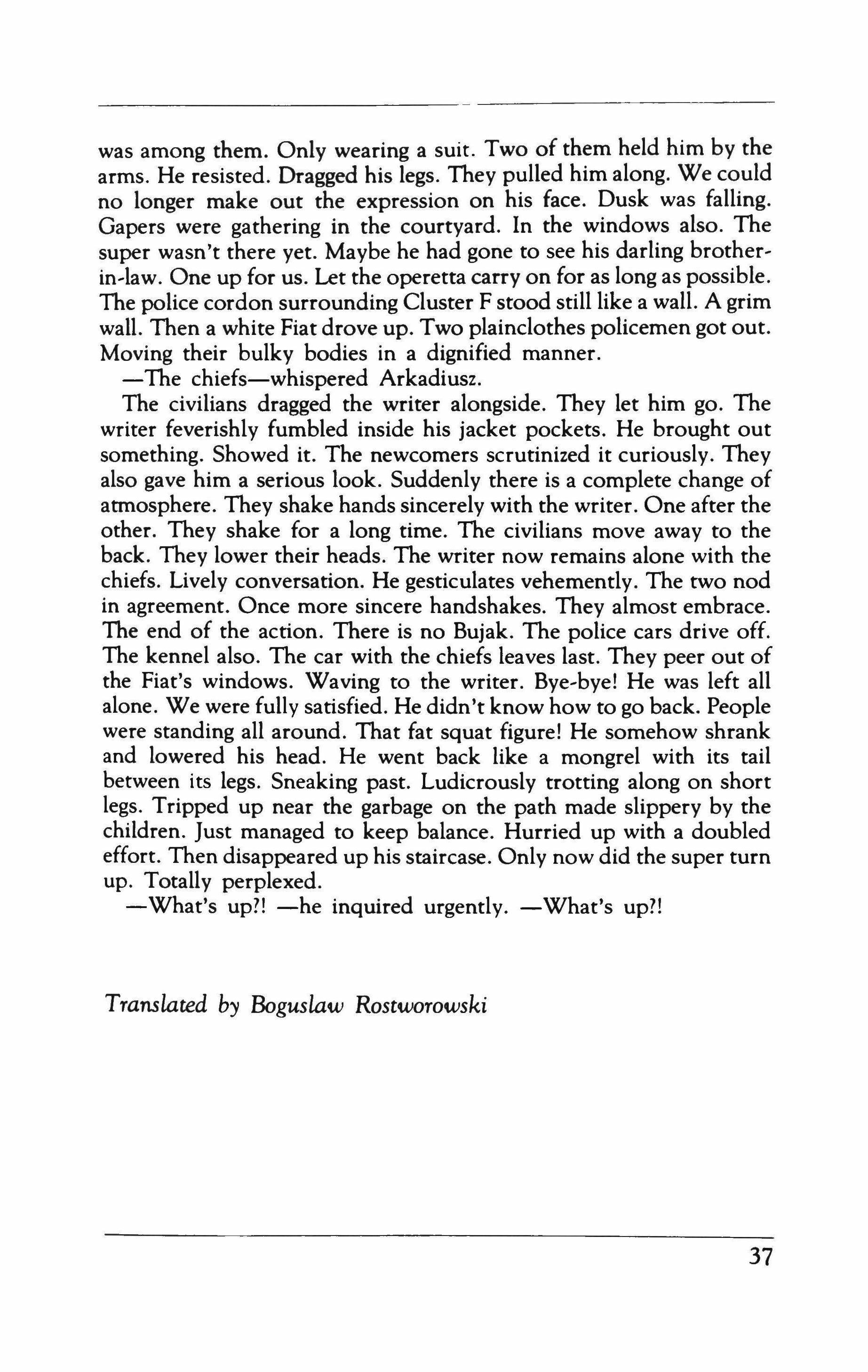 RostWOTOwski
RostWOTOwski
37
The writer and the state
Andrzej Kijowski

This is a speech delivered publicly during the first independent congress on culture and the arts in modern Poland, December 11-13, 1 <)8 I. The last day of thecongTess «'as canceled because of the declaration of martial law and the internment the previous night of most of the attending luminaries. In Poland, the speech has been published undergTound.
Whatever writers in People's Poland have to say about past successes, the fact is that the audience they have been addressing for the last thirty-five years is the State. Starting in 1945 with the first books brought out by the newly established Czytelnik publishing house, the State bought the writer's work in its entirety. Through its agencies (Czytelnik's cooperative status was a mere fiction) the State made itself responsible for the printing, sales and advertising of this work; through its journals, academic institutions and recommendations circulated to schools and libraries, the State ensured its success, its place in mass culture and in the history of literature (and here, encvclopedias, lexicons and anthologies had their own role to play).
Finally, with the help of prizes, decorations and other marks of approval, the State assigned to the work's author his place in society and determined whether he was to be great, excellent or only distinguished. Or indeed, whether he was to exist at all. In the early postwar years the State's interest in writers was very great since literature was the chief vehicle of propaganda. Later, as new techniques developed and the mass media (movies, television) better fulfilled propaganda needs, interest in literature gradually diminished-a process reflected in the decline of both the subsidies to literature and the caliber of the functionaries and methods used to keep it in line. It is a bureaucratic paradox that the final and most radical act in the takeover of literature by the State-granting writers old-age pensions-took place at a time when official interest in literature had become minimal. The fruits of legislative endeavor ripen slowly and drop from the bough at the most inappropriate moments.
To recap: whatever writers may claim both about their conflicts with the State as addressee, and the affection they succeeded in arousing among their readers (oh, those weary evenings on the lecture
38
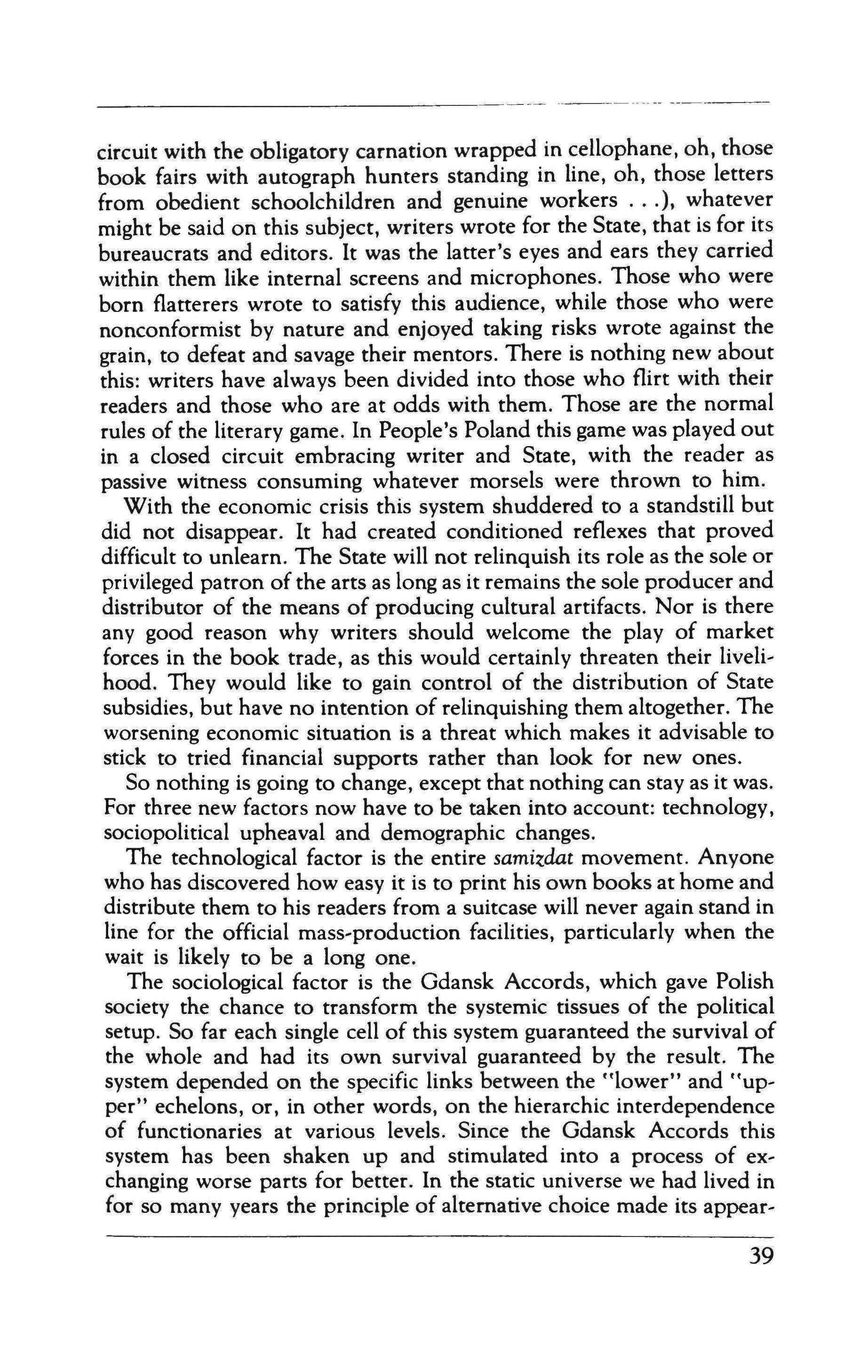
circuit with the obligatory carnation wrapped in cellophane, oh, those book fairs with autograph hunters standing in line, oh, those letters from obedient schoolchildren and genuine workers ), whatever might be said on this subject, writers wrote for the State, that is for its bureaucrats and editors. It was the latter's eyes and ears they carried within them like internal screens and microphones. Those who were born flatterers wrote to satisfy this audience, while those who were nonconformist by nature and enjoyed taking risks wrote against the grain, to defeat and savage their mentors. There is nothing new about this: writers have always been divided into those who flirt with their readers and those who are at odds with them. Those are the normal rules of the literary game. In People's Poland this game was played out in a closed circuit embracing writer and State, with the reader as passive witness consuming whatever morsels were thrown to him.
With the economic crisis this system shuddered to a standstill but did not disappear. It had created conditioned reflexes that proved difficult to unlearn. The State will not relinquish its role as the sole or privileged patron of the arts as long as it remains the sole producer and distributor of the means of producing cultural artifacts. Nor is there any good reason why writers should welcome the play of market forces in the book trade, as this would certainly threaten their livelihood. They would like to gain control of the distribution of State subsidies, but have no intention of relinquishing them altogether. The worsening economic situation is a threat which makes it advisable to stick to tried financial supports rather than look for new ones.
So nothing is going to change, except that nothing can stay as it was. For three new factors now have to be taken into account: technology, sociopolitical upheaval and demographic changes.
The technological factor is the entire samizdat movement. Anyone who has discovered how easy it is to print his own books at home and distribute them to his readers from a suitcase will never again stand in line for the official mass-production facilities, particularly when the wait is likely to be a long one.
The sociological factor is the Gdansk Accords, which gave Polish society the chance to transform the systemic tissues of the political setup. So far each single cell of this system guaranteed the survival of the whole and had its own survival guaranteed by the result. The system depended on the specific links between the "lower" and "upper" echelons, or, in other words, on the hierarchic interdependence of functionaries at various levels. Since the Gdansk Accords this system has been shaken up and stimulated into a process of exchanging worse parts for better. In the static universe we had lived in for so many years the principle of alternative choice made its appear-
39
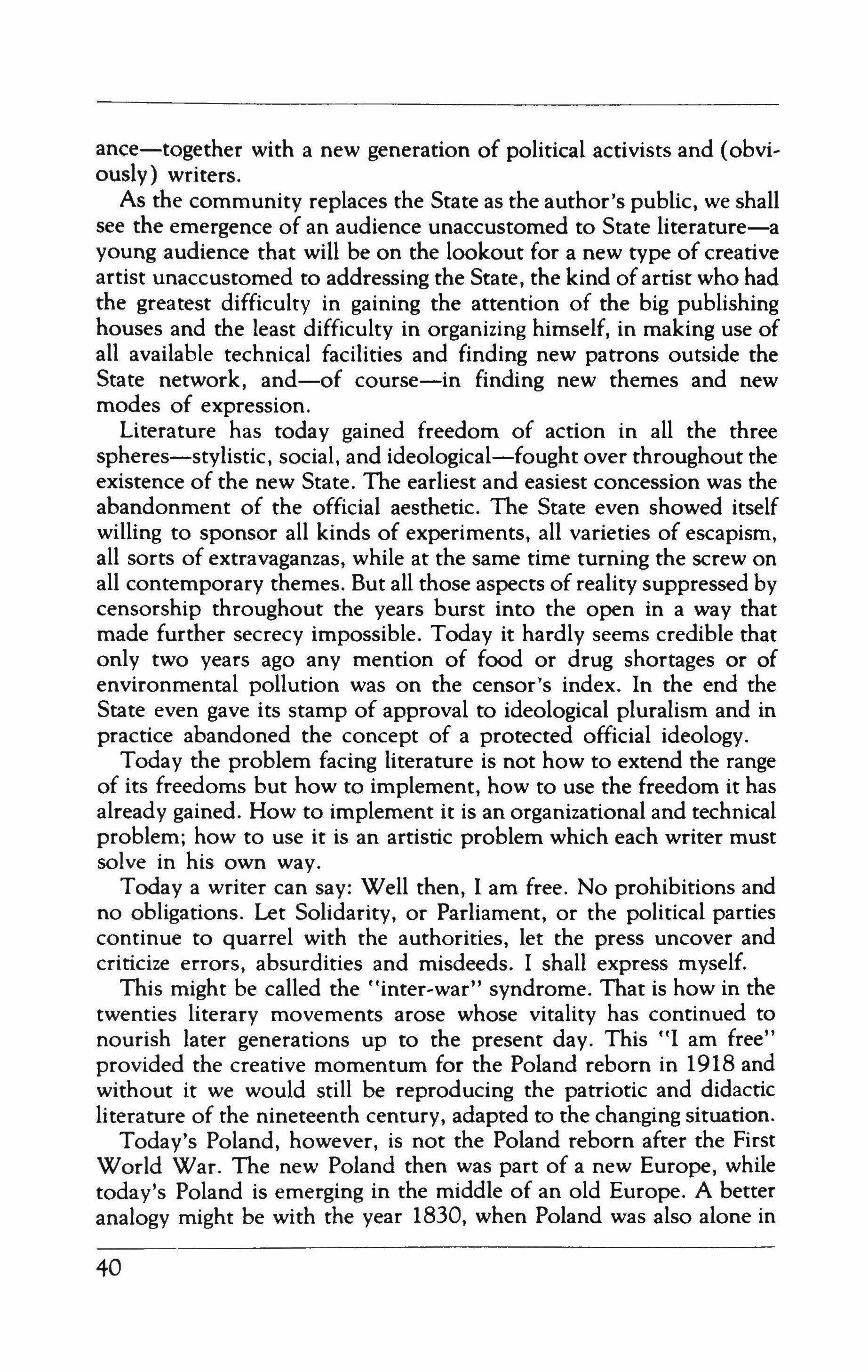
ance-together with a new generation of political activists and (obviously) writers.
As the community replaces the State as the author's public, we shall see the emergence of an audience unaccustomed to State literature-a young audience that will be on the lookout for a new type of creative artist unaccustomed to addressing the State, the kind of artist who had the greatest difficulty in gaining the attention of the big publishing houses and the least difficulty in organizing himself, in making use of all available technical facilities and finding new patrons outside the State network, and-of course-in finding new themes and new modes of expression.
Literature has today gained freedom of action in all the three spheres-stylistic, social, and ideological-fought over throughout the existence of the new State. The earliest and easiest concession was the abandonment of the official aesthetic. The State even showed itself willing to sponsor all kinds of experiments, all varieties of escapism, all sorts of extravaganzas, while at the same time turning the screw on all contemporary themes. But all those aspects of reality suppressed by censorship throughout the years burst into the open in a way that made further secrecy impossible. Today it hardly seems credible that only two years ago any mention of food or drug shortages or of environmental pollution was on the censor's index. In the end the State even gave its stamp of approval to ideological pluralism and in practice abandoned the concept of a protected official ideology.
Today the problem facing literature is not how to extend the range of its freedoms but how to implement, how to use the freedom it has already gained. How to implement it is an organizational and technical problem; how to use it is an artistic problem which each writer must solve in his own way.
Today a writer can say: Well then, I am free. No prohibitions and no obligations. Let Solidarity, or Parliament, or the political parties continue to quarrel with the authorities, let the press uncover and criticize errors, absurdities and misdeeds. I shall express myself. This might be called the "inter-war" syndrome. That is how in the twenties literary movements arose whose vitality has continued to nourish later generations up to the present day. This "I am free" provided the creative momentum for the Poland reborn in 1918 and without it we would still be reproducing the patriotic and didactic literature of the nineteenth century, adapted to the changing situation.
Today's Poland, however, is not the Poland reborn after the First World War. The new Poland then was part of a new Europe, while today's Poland is emerging in the middle of an old Europe. A better analogy might be with the year 1830, when Poland was also alone in
40
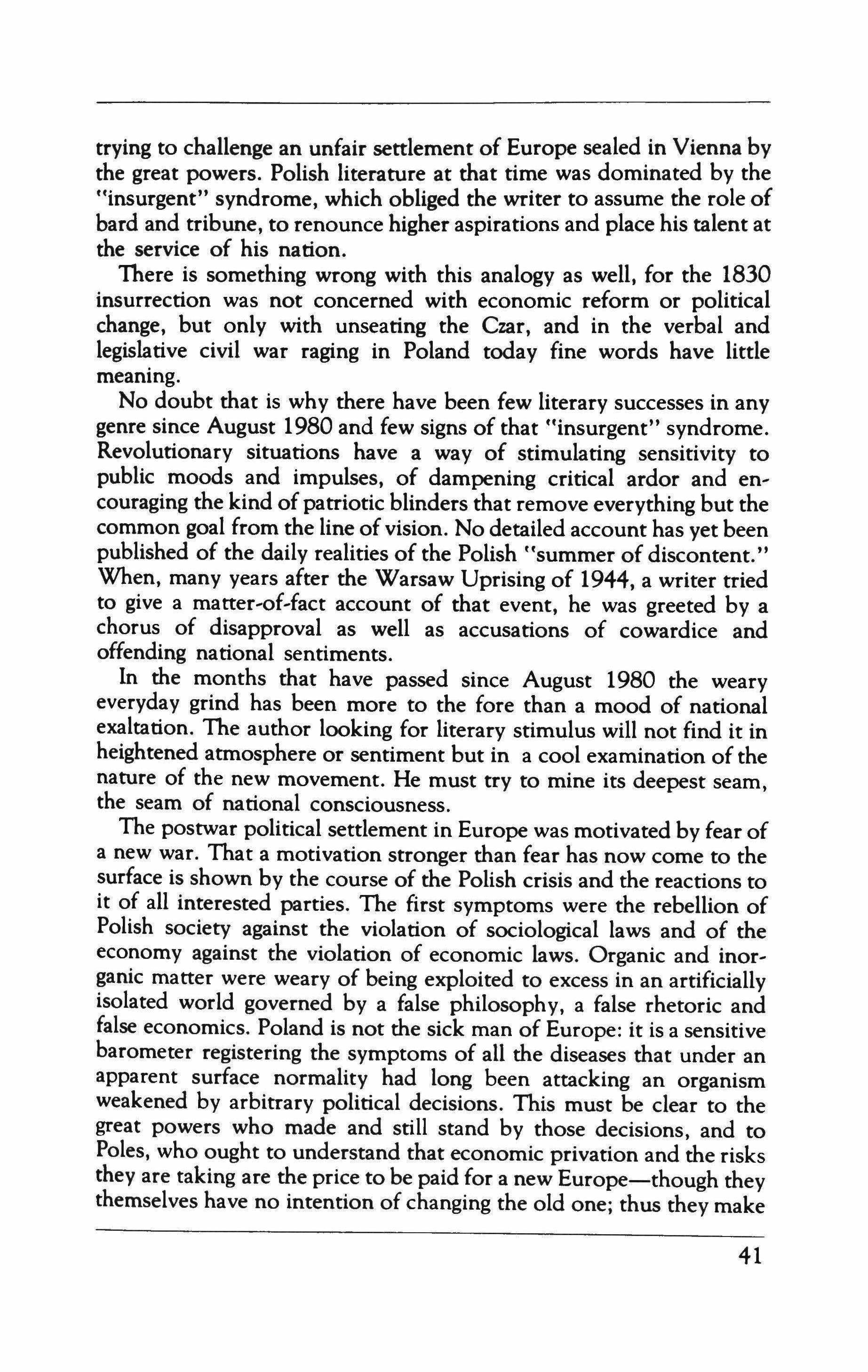
trying to challenge an unfair settlement of Europe sealed in Vienna by the great powers. Polish literature at that time was dominated by the "insurgent" syndrome, which obliged the writer to assume the role of bard and tribune, to renounce higher aspirations and place his talent at the service of his nation.
There is something wrong with this analogy as well, for the 1830 insurrection was not concerned with economic reform or political change, but only with unseating the Czar, and in the verbal and legislative civil war raging in Poland today fine words have little meaning.
No doubt that is why there have been few literary successes in any genre since August 1980 and few signs of that "insurgent" syndrome. Revolutionary situations have a way of stimulating sensitivity to public moods and impulses, of dampening critical ardor and en; couraging the kind of patriotic blinders that remove everything but the common goal from the line of vision. No detailed account has yet been published of the daily realities of the Polish "summer of discontent. II When, many years after the Warsaw Uprising of 1944, a writer tried to give a matter-of-fact account of that event, he was greeted by a chorus of disapproval as well as accusations of cowardice and offending national sentiments.
In the months that have passed since August 1980 the weary everyday grind has been more to the fore than a mood of national exaltation. The author looking for literary stimulus will not find it in heightened atmosphere or sentiment but in a cool examination of the nature of the new movement. He must try to mine its deepest seam, the seam of national consciousness.
The postwar political settlement in Europe was motivated by fear of a new war. That a motivation stronger than fear has now come to the surface is shown by the course of the Polish crisis and the reactions to it of all interested parties. The first symptoms were the rebellion of Polish society against the violation of sociological laws and of the economy against the violation of economic laws. Organic and inorganic matter were weary of being exploited to excess in an artificially isolated world governed by a false philosophy, a false rhetoric and false economics. Poland is not the sick man of Europe: it is a sensitive barometer registering the symptoms of all the diseases that under an apparent surface normality had long been attacking an organism weakened by arbitrary political decisions. This must be clear to the great powers who made and still stand by those decisions, and to Poles, who ought to understand that economic privation and the risks they are taking are the price to be paid for a new Europe-though they themselves have no intention of changing the old one; thus they make
41
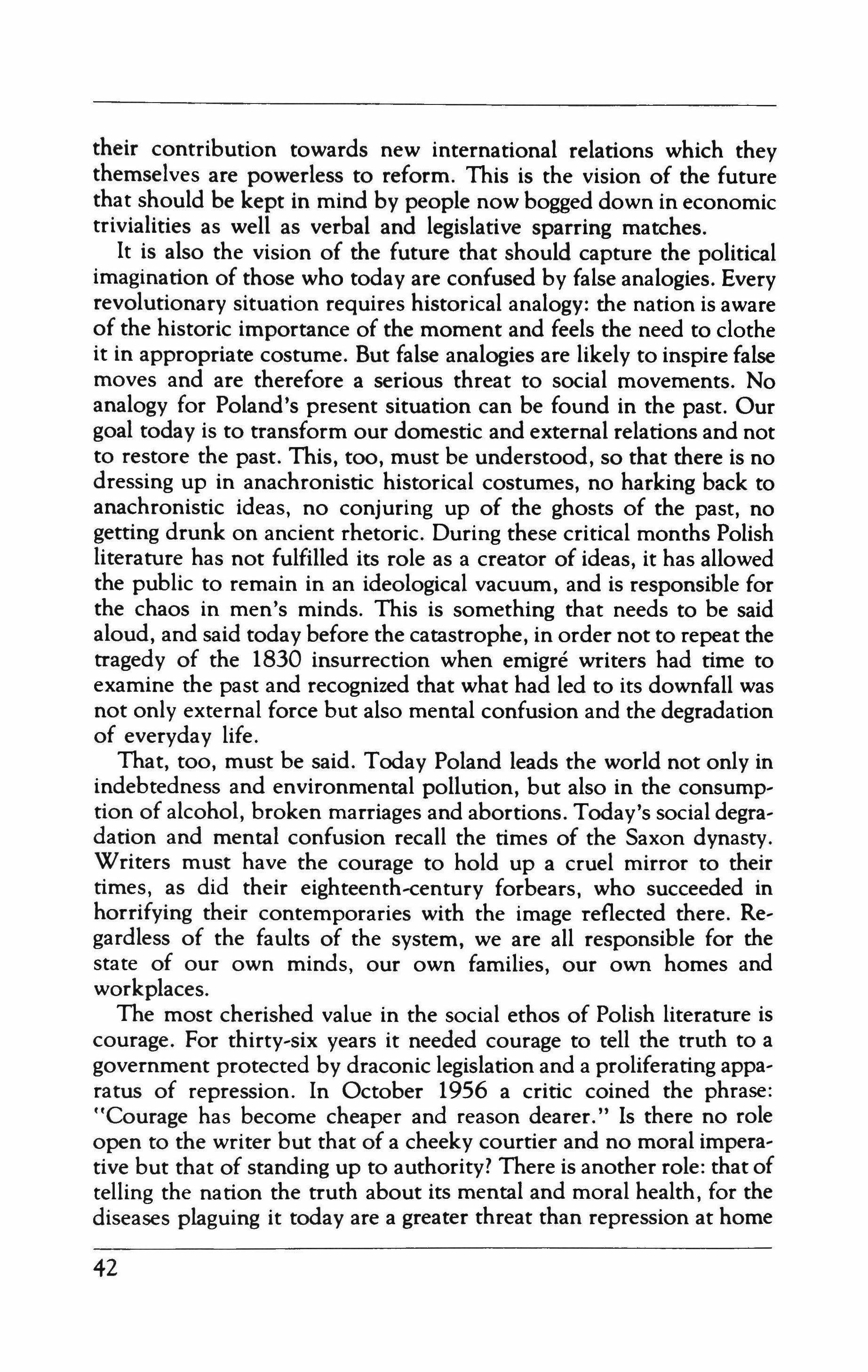
their contribution towards new international relations which they themselves are powerless to reform. This is the vision of the future that should be kept in mind by people now bogged down in economic trivialities as well as verbal and legislative sparring matches.
It is also the vision of the future that should capture the political imagination of those who today are confused by false analogies. Every revolutionary situation requires historical analogy: the nation is aware of the historic importance of the moment and feels the need to clothe it in appropriate costume. But false analogies are likely to inspire false moves and are therefore a serious threat to social movements. No analogy for Poland's present situation can be found in the past. Our goal today is to transform our domestic and external relations and not to restore the past. This, too, must be understood, so that there is no dressing up in anachronistic historical costumes, no harking back to anachronistic ideas, no conjuring up of the ghosts of the past, no getting drunk on ancient rhetoric. During these critical months Polish literature has not fulfilled its role as a creator of ideas, it has allowed the public to remain in an ideological vacuum, and is responsible for the chaos in men's minds. This is something that needs to be said aloud, and said today before the catastrophe, in order not to repeat the tragedy of the 1830 insurrection when emigre writers had time to examine the past and recognized that what had led to its downfall was not only external force but also mental confusion and the degradation of everyday life.
That, too, must be said. Today Poland leads the world not only in indebtedness and environmental pollution, but also in the consurnption of alcohol, broken marriages and abortions. Today's social degradation and mental confusion recall the times of the Saxon dynasty. Writers must have the courage to hold up a cruel mirror to their times, as did their eighteenth-century forbears, who succeeded in horrifying their contemporaries with the image reflected there. Regardless of the faults of the system, we are all responsible for the state of our own minds, our own families, our own homes and workplaces.
The most cherished value in the social ethos of Polish literature is courage. For thirty-six years it needed courage to tell the truth to a government protected by draconic legislation and a proliferating apparatus of repression. In October 1956 a critic coined the phrase: "Courage has become cheaper and reason dearer." Is there no role open to the writer but that of a cheeky courtier and no moral imperative but that of standing up to authority? There is another role: that of telling the nation the truth about its mental and moral health, for the diseases plaguing it today are a greater threat than repression at home
42
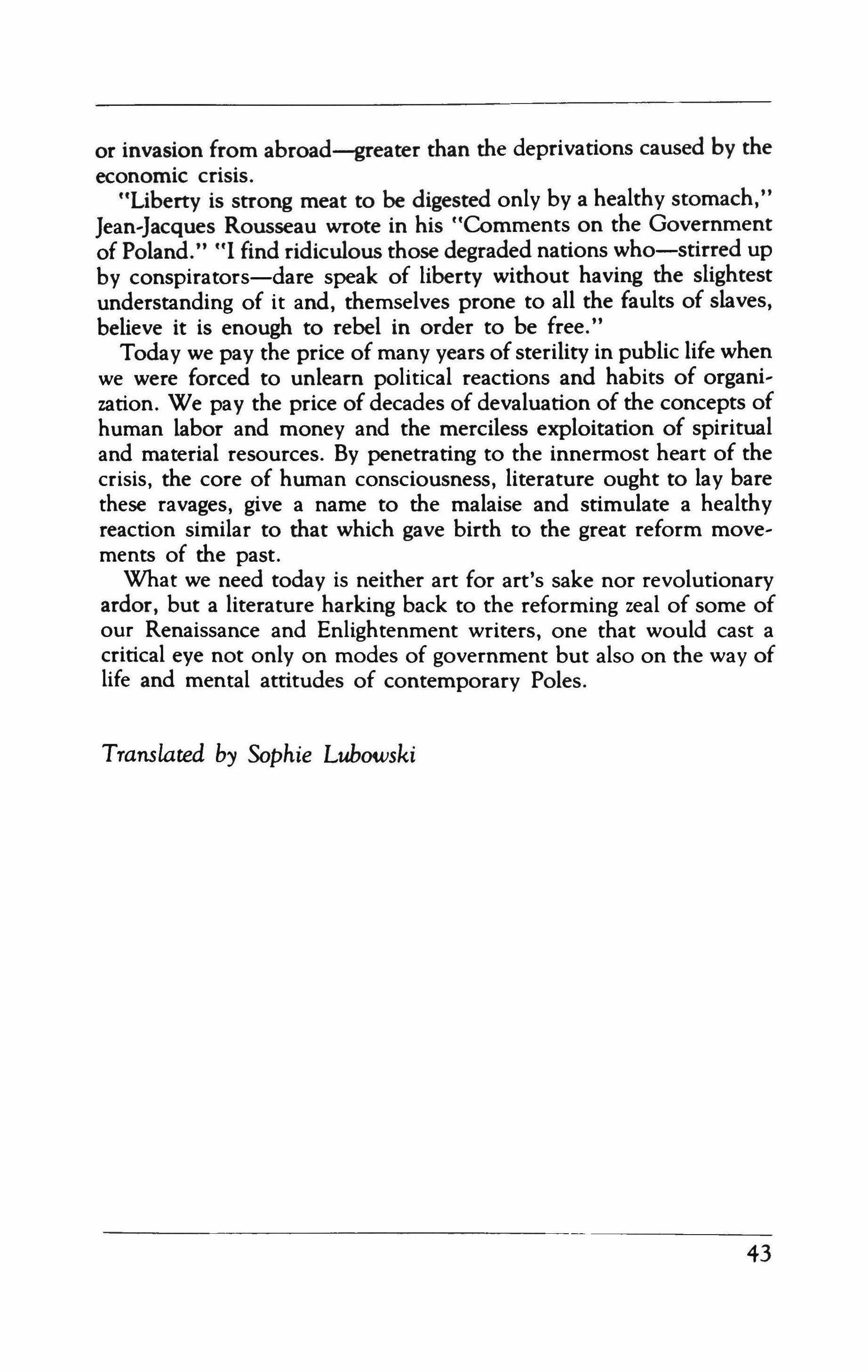
or invasion from abroad-greater than the deprivations caused by the economic crisis.
"Liberty is strong meat to be digested only by a healthy stomach," Jean-Jacques Rousseau wrote in his "Comments on the Government of Poland." "I find ridiculous those degraded nations who-stirred up by conspirators-dare speak of liberty without having the slightest understanding of it and, themselves prone to all the faults of slaves, believe it is enough to rebel in order to be free."
Today we pay the price of many years ofsterility in public life when we were forced to unlearn political reactions and habits of organization. We pay the price of decades of devaluation of the concepts of human labor and money and the merciless exploitation of spiritual and material resources. By penetrating to the innermost heart of the crisis, the core of human consciousness, literature ought to lay bare these ravages, give a name to the malaise and stimulate a healthy reaction similar to that which gave birth to the great reform movements of the past.
What we need today is neither art for art's sake nor revolutionary ardor, but a literature harking back to the reforming zeal of some of our Renaissance and Enlightenment writers, one that would cast a critical eye not only on modes of government but also on the way of life and mental attitudes of contemporary Poles.
Translated by Sophie Lubowski
43
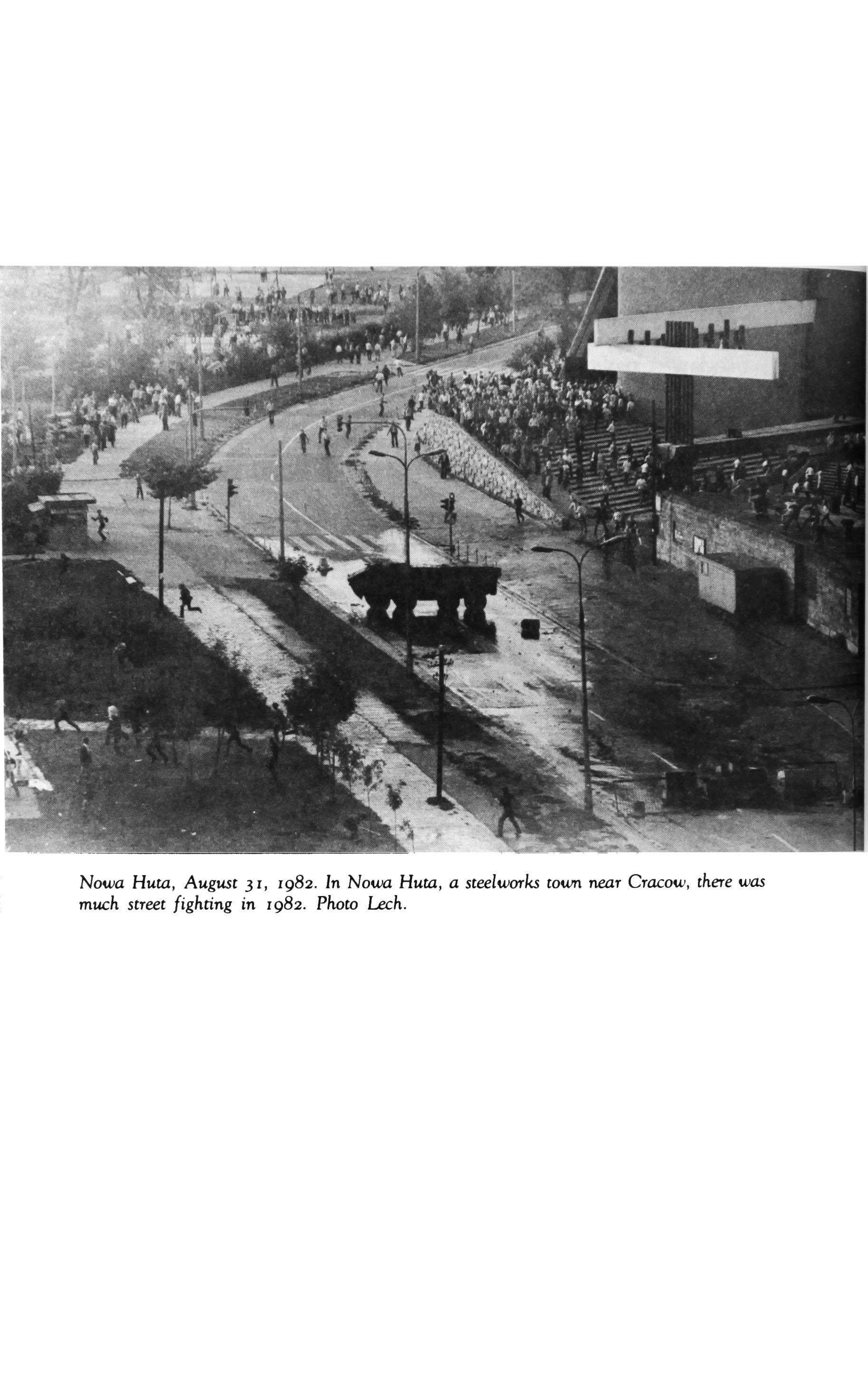 Nowa Huta, August 31, 1982. In Nowa Huta, a steelworks town near Cracow, there was much street fighting in 1982. Photo Lech.
Nowa Huta, August 31, 1982. In Nowa Huta, a steelworks town near Cracow, there was much street fighting in 1982. Photo Lech.
Report from. a town under siege
Zbigniew Herbert
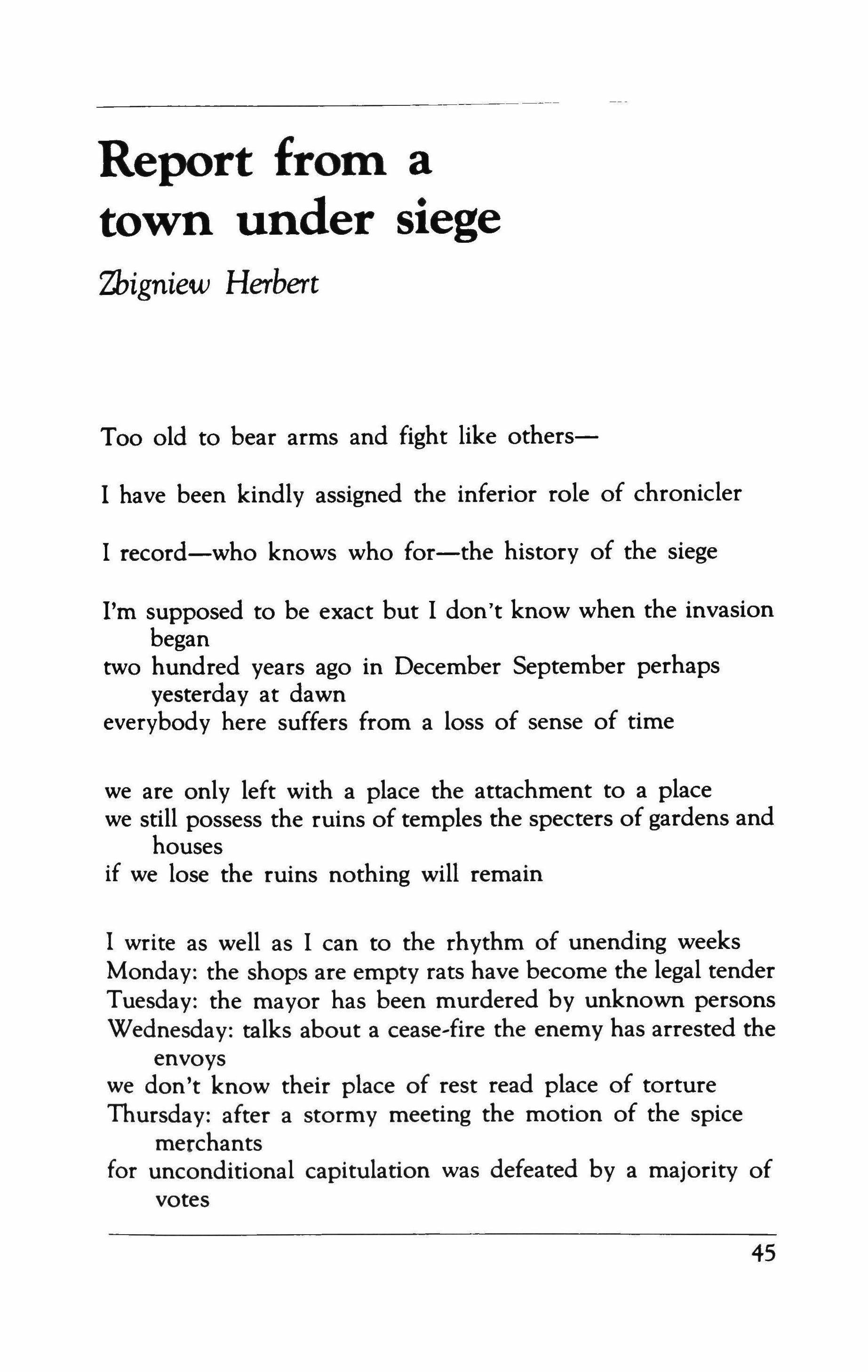
Too old to bear arms and fight like others-
I have been kindly assigned the inferior role of chronicler
I record-who knows who for-the history of the siege
I'm supposed to be exact but I don't know when the invasion began two hundred years ago in December September perhaps yesterday at dawn everybody here suffers from a loss of sense of time
we are only left with a place the attachment to a place we still possess the ruins of temples the specters of gardens and houses if we lose the ruins nothing will remain
I write as well as I can to the rhythm of unending weeks
Monday: the shops are empty rats have become the legal tender
Tuesday: the mayor has been murdered by unknown persons
Wednesday: talks about a cease-fire the enemy has arrested the envoys we don't know their place of rest read place of torture
Thursday: after a stormy meeting the motion of the spice merchants for unconditional capitulation was defeated by a majority of votes
45

thousand people attended this funeral of a twenty-two-year-old worker killed by a member of the
At the funeral of Bogdan Wlosik, Nowa Huta, October 20, 1982. Forty
Secret Police.
Photo Lech.

Friday: the beginning of the plague Saturday: N.N.* the steadfast defender committed suicide Sunday: there's no water we repelled the storm by the eastern gate called the Gate of the Covenant
I know this is all monotonous it won't move anybody I avoid commentaries I keep my emotions under control I record facts apparently they alone are prized on foreign markets but with some pride I would like to inform the world that thanks to war we have raised a new species of children our children don't like stories they play at killing in daydreams and at night they dream of soup bread and bones just like cats and dogs
in the evening I like to roam the borders of the Town along the boundaries of uncertain freedom I look down from above at the swarming armies their lights I listen to the noise ofdrums barbarian shrieks it is really incomprehensible that the Town is still defending itself
the siege continues for so long a time the enemies have to change they have nothing in common but the desire to annihilate us when some hordes depart others immediately appear Goths Tartars Swedes imperial legions Transfiguration regiments who's to count the colors of their banners change like forests on the horizon from delicate bird yellow in spring through green red to winter black
then in the evening freed of facts I can think about ancient distant matters for example about our allies overseas I know they heartily sympathize they send flour bags of good cheer oils and good advice they don't even know that their fathers betrayed us
*Latin, nomen nescio, used for an unknown person.
47
ours were their allies from the times of the second apocalypse sons are without guilt they deserve gratitude so we are grateful they haven't experienced a siege as long as eternity those touched by misfortune are always lonely the defenders of the Dalai Lama the Kurds the Afghan mountain people
now as I write these words the advocates of conciliation have gained an advantage over the die-hard party a normal wavering of feelings fate still hangs in the balance the cemeteries grow the number of defenders dwindles but the defense continues and will continue to the end and if the Town falls and one defender survives he will carry the Town inside himself along the roads of exile he will be the Town
we see the face of hunger the face of fear the face of death worst of all-the face of betrayal and only our dreams have not been humiliated
 Translated by Boguslaw Rostworowski
Translated by Boguslaw Rostworowski
48
Pen and sword
Jan Prokop

Is the fate of a writer in the Poland of today enviable? Not so long ago state patronage offered him its hamburgers in exchange for giving up something which is often regarded as the integral part of a writer's calling, that is, the questioning of the status quo. The discourse of literature is, after all, a particular sort of split speech, as if an author were crying with one half of his face, and ridiculing his own crying with the other half. The words of literature sing in two parts, indicating an object and running away from it, denoting and connoting. The sound of these parts constitutes the music of a work.
The authorities, however, cannot stand duality, vacillation, ambiguous giggles, though at certain times they were willing not to insist that writers concentrate entirely on praising the fluffy plumage of the emperor's helmet. So literary works were tolerated insofar as they agreed to remain within allotted reservations, without taking up the more and more frequent sociopolitical taboos. Of course writers do not have to write about these particular matters. It is a question of personal choice. One can write exclusively about Isolde's eyelashes. However, it really must be the author's free choice (i.e., he could have done that, but specially chose this), and not the result of a dirty compromise with State authorities. The very presence of the State delimiting my "freedom" locks me up in jail. Its reeking breath covers with soot the most delicate of love poems. Literature which accepts its presence without protest condemns itself to eternal damnation, for behind the most beautiful of its words there gapes through a black hole the absence of the free word; its corpse, like Banquo's ghost, ceaselessly frightens murderers and accomplices. And anyone who does not shout and condemn the violation is an accomplice.
Luckily, the authorities did not succeed in totally corrupting the literary milieu. But to some extent they managed to appease anger,
49

which is often the most effective literary fuel. Writing became a safe profession, a fairly lucrative way of producing neutral ballast for the mind, to prevent ideas of revolt and dissension from breeding there. It also attracted many mediocrities who would have had little chance of success in other fields. Then the unsubmissive individuals, who were potentially dangerous for the ruling system, foundered in the overpowering vagueness of sorts of privileges and sorts of repressions. And the whip was not really a whip, nor the carrot a carrot. From this kingdom of appearances, where the multiplicity of books was to replace the absence of true literature, we were thrown into a world of sharp contrasts, hard choices and dramatic decisions.
Today, with the establishment of two spheres-the official one, manipulated by the authorities, and the underground, independent one-words, depending on the sphere they function in, have either taken on exceptional, unprecedented credibility, or have utterly lost it. An unusual bond of faith has grown up between writer and reader, which results in his being accepted as an author of fully significant statements, or else his coming up against a wall of total disapproval as a troublesome source of noise-screeching, harmful to the ear, antispeech.
Writers of the free world, where culture functions on a market basis, is sold and bought, will find it difficult to understand the situation whereby statements are received without the shadow of a doubt. Therefore, announcements made by the independent sphere, due to the fact that it pays the price of persecution, that it does not have the backing of State patronage, do not have to justify themselves before the readers and cleanse themselves of suspect, hidden intentions (in the commercial world the open intention is value, the hidden one profit). For the reader they simply are what they are, accepted in good faith as statements written in good faith, like an extended open hand meeting the open hand of the reader.
But to what extent do the credible words accepted with an almost religious reverence by the reader owe their credibility to the message they carry? To what extent do they owe their inexhaustible credit to the fact they belong to the unmanipulated, independent sphere? Do they live on borrowed glory? As if by the very fact of rejecting the falsehood and fraud which gnaws at the tissues of discourse, the Truth of independent discourse were to be born? This is how the Middle Ages believed in truth resulting from the authority of the person expressing it, so that the authority of a given person, and not his statements, underwent scrutiny. Therefore, the credit of trust, extended to the unofficial sphere, which serves as an alternative to the hypocritical official sphere (the sphere of "bad will"), could lead to a
50
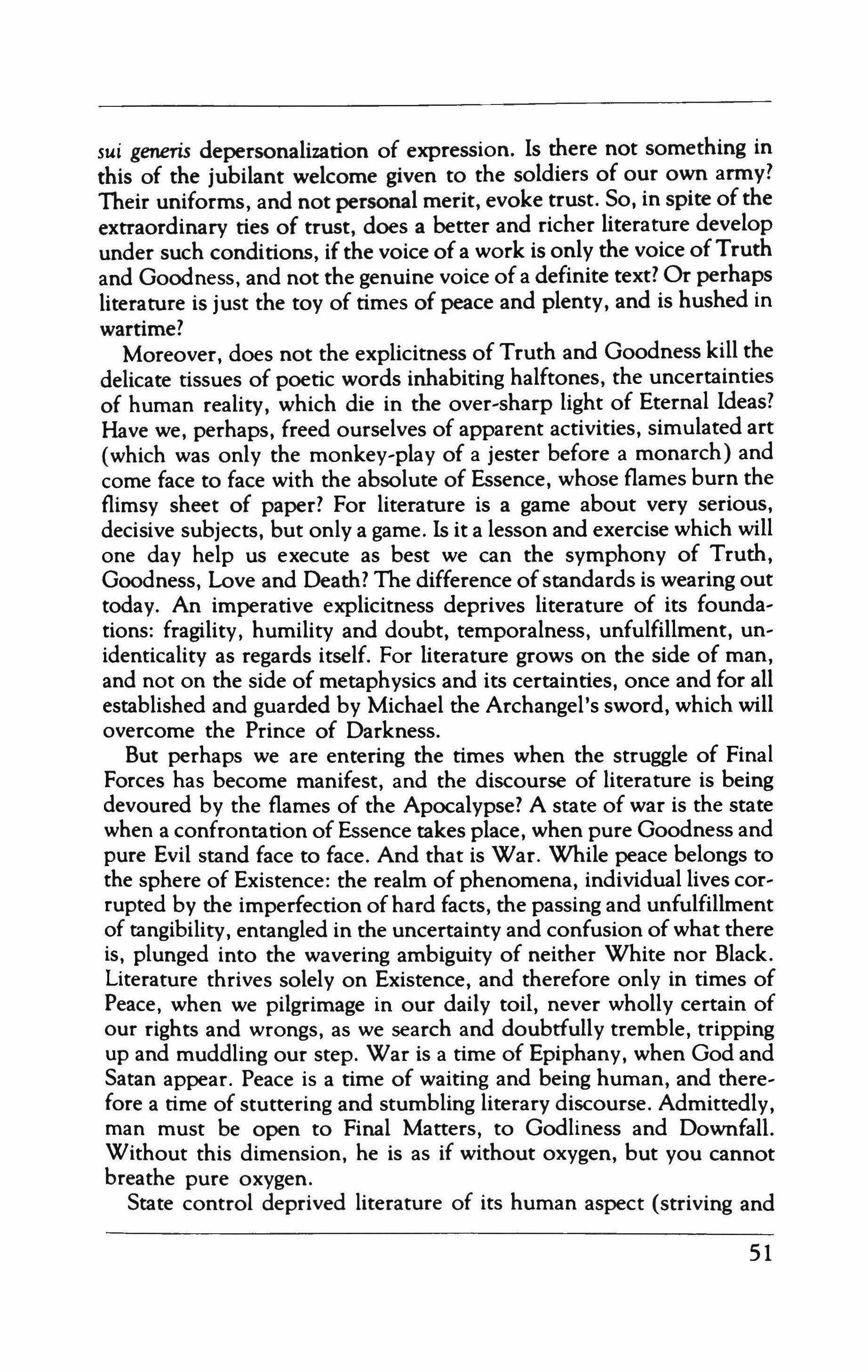
sui generis depersonalization of expression. Is there not something in this of the jubilant welcome given to the soldiers of our own army? Their uniforms, and not personal merit, evoke trust. So, in spite of the extraordinary ties of trust, does a better and richer literature develop under such conditions, if the voice of a work is only the voice ofTruth and Goodness, and not the genuine voice of a definite text? Or perhaps literature is just the toy of times of peace and plenty, and is hushed in wartime?
Moreover, does not the explicitness of Truth and Goodness kill the delicate tissues of poetic words inhabiting halftones, the uncertainties of human reality, which die in the over-sharp light of Eternal Ideas? Have we, perhaps, freed ourselves of apparent activities, simulated art (which was only the monkey-plav of a jester before a monarch) and come face to face with the absolute of Essence, whose flames burn the flimsy sheet of paper? For literature is a game about very serious, decisive subjects, but only a game. Is it a lesson and exercise which will one day help us execute as best we can the symphony of Truth, Goodness, Love and Death? The difference ofstandards is wearing out today. An imperative explicitness deprives literature of its foundations: fragility, humility and doubt, temporalness, unfulfillment, un� identicalitv as regards itself. For literature grows on the side of man, and not on the side of metaphysics and its certainties, once and for all established and guarded by Michael the Archangel's sword, which will overcome the Prince of Darkness.
But perhaps we are entering the times when the struggle of Final Forces has become manifest, and the discourse of literature is being devoured by the flames of the Apocalypse? A state of war is the state when a confrontation of Essence takes place, when pure Goodness and pure Evil stand face to face. And that is War. While peace belongs to the sphere of Existence: the realm of phenomena, individual lives corrupted by the imperfection ofhard facts, the passing and unfulfillment of tangibility, entangled in the uncertainty and confusion of what there is, plunged into the wavering ambiguity of neither White nor Black. Literature thrives solely on Existence, and therefore only in times of Peace, when we pilgrimage in our daily toil, never wholly certain of our rights and wrongs, as we search and doubtfully tremble, tripping up and muddling our step. War is a time of Epiphany, when God and Satan appear. Peace is a time of waiting and being human, and therefore a time of stuttering and stumbling literary discourse. Admittedly, man must be open to Final Matters, to Godliness and Downfall. Without this dimension, he is as if without oxygen, but you cannot breathe pure oxygen.
State control deprived literature of its human aspect (striving and
51
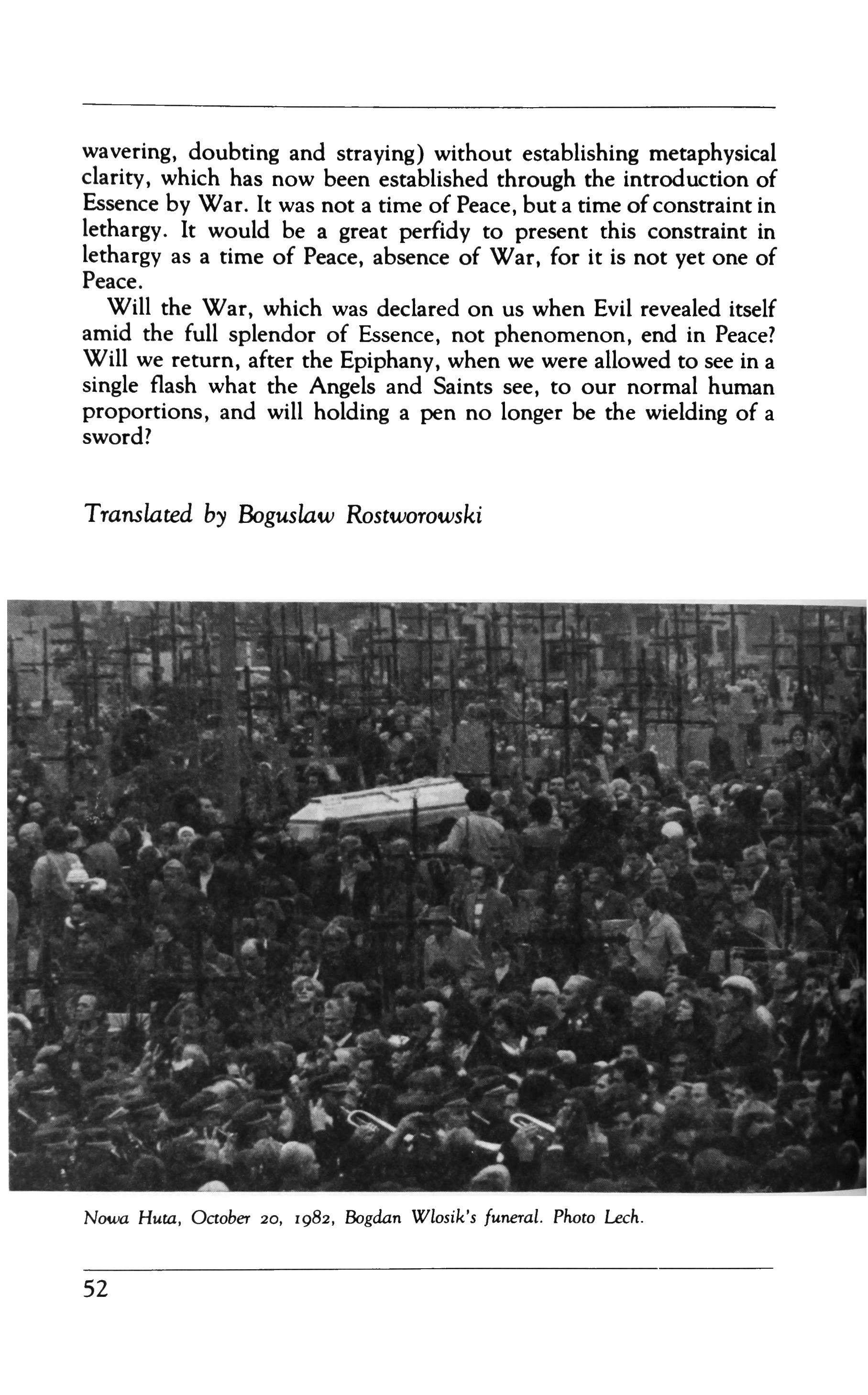
wavering, doubting and straying) without establishing metaphysical clarity, which has now been established through the introduction of Essence by War. It was not a time of Peace, but a time ofconstraint in lethargy. It would be a great perfidy to present this constraint in lethargy as a time of Peace, absence of War, for it is not yet one of Peace.
Will the War, which was declared on us when Evil revealed itself amid the full splendor of Essence, not phenomenon, end in Peace? Will we return, after the Epiphany, when we were allowed to see in a single flash what the Angels and Saints see, to our normal human proportions, and will holding a pen no longer be the wielding of a sword?
Translated by Boguslaw Rostworowski
52
Nowa Hura, October 20, 1982, Bogdan Wlosik's funeral. Photo tech.
Poems and tanks
Stanislaw Baranczak
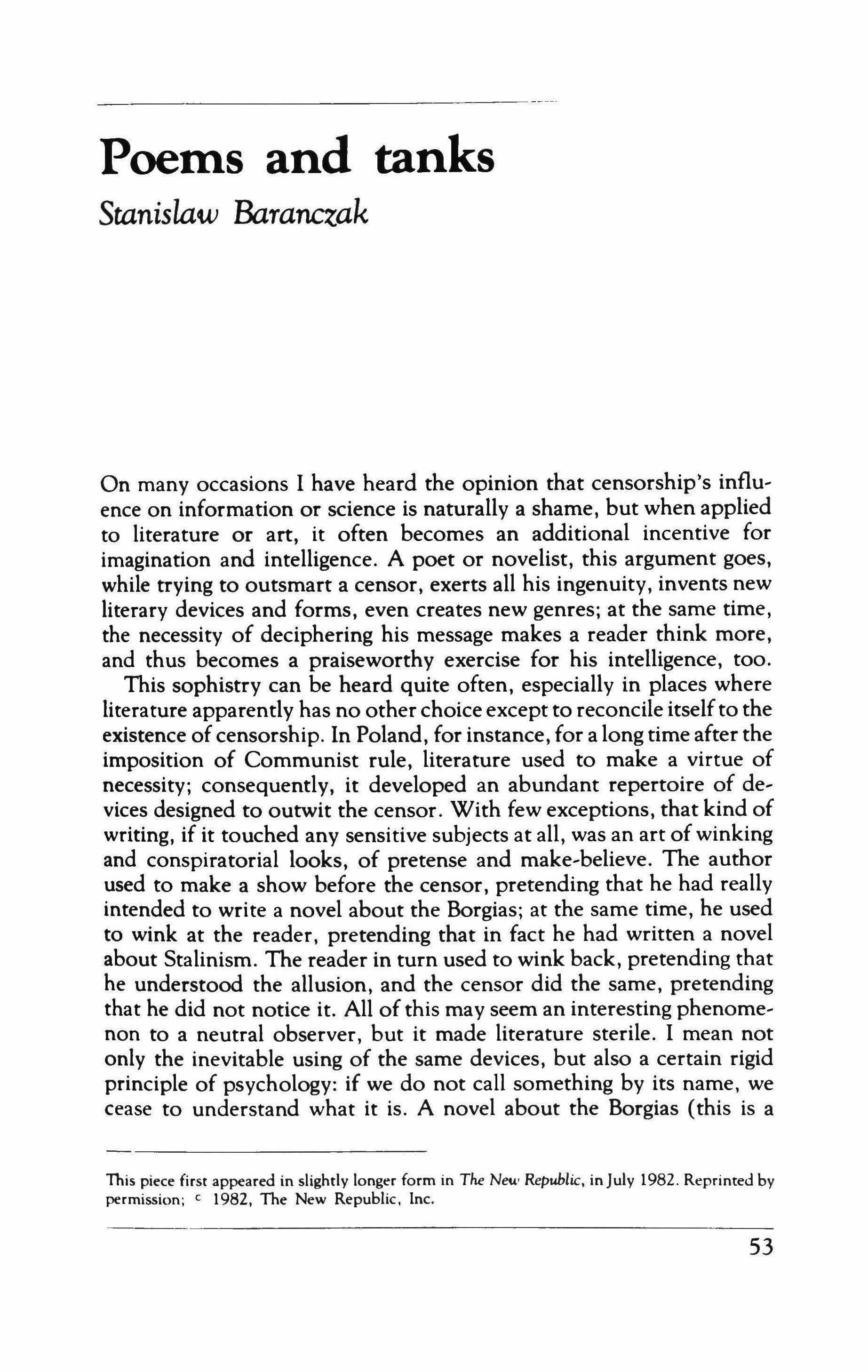
On many occasions I have heard the opinion that censorship's influence on information or science is naturally a shame, but when applied to literature or art, it often becomes an additional incentive for imagination and intelligence. A poet or novelist, this argument goes, while trying to outsmart a censor, exerts all his ingenuity, invents new literary devices and forms, even creates new genres; at the same time, the necessity of deciphering his message makes a reader think more, and thus becomes a praiseworthy exercise for his intelligence, too. This sophistry can be heard quite often, especially in places where literature apparently has no other choice except to reconcile itself to the existence of censorship. In Poland, for instance, for a long time after the imposition of Communist rule, literature used to make a virtue of necessity; consequently, it developed an abundant repertoire of devices designed to outwit the censor. With few exceptions, that kind of writing, if it touched any sensitive subjects at all, was an art of winking and conspiratorial looks, of pretense and make-believe. The author used to make a show before the censor, pretending that he had really intended to write a novel about the Borgias; at the same time, he used to wink at the reader, pretending that in fact he had written a novel about Stalinism. The reader in turn used to wink back, pretending that he understood the allusion, and the censor did the same, pretending that he did not notice it. All of this may seem an interesting phenornenon to a neutral observer, but it made literature sterile. I mean not only the inevitable using of the same devices, but also a certain rigid principle of psychology: if we do not call something by its name, we cease to understand what it is. A novel about the Borgias (this is a
This piece first appeared in slightly longer form in The Neu' Republic. inJuly 1982. Reprinted by permission; c 1982. The New Republic. Inc.
53
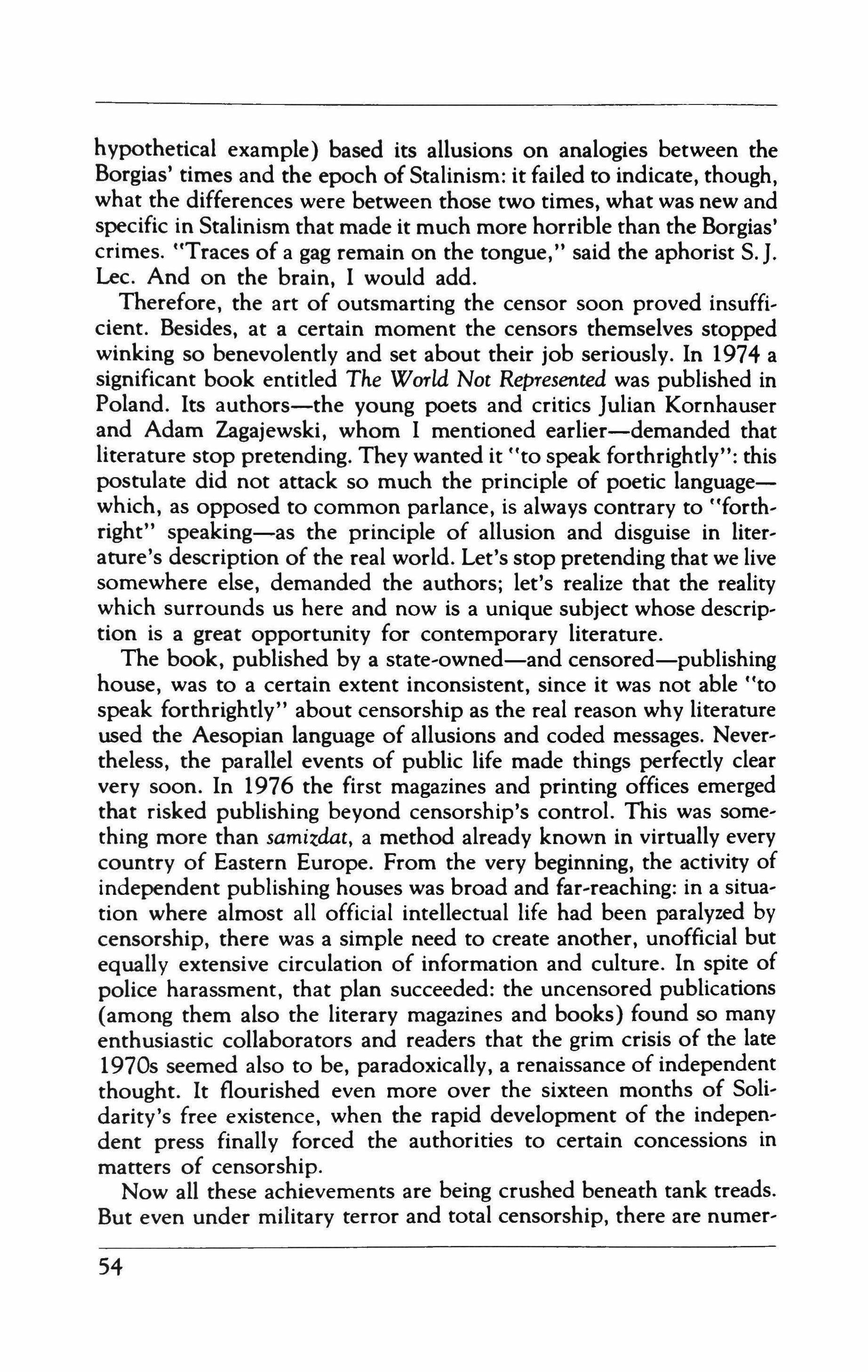
hypothetical example) based its allusions on analogies between the Borgias' times and the epoch of Stalinism: it failed to indicate, though, what the differences were between those two times, what was new and specific in Stalinism that made it much more horrible than the Borgias' crimes. "Traces of a gag remain on the tongue," said the aphorist S.J. Lee. And on the brain, I would add.
Therefore, the art of outsmarting the censor soon proved insufficient. Besides, at a certain moment the censors themselves stopped winking so benevolently and set about their job seriously. In 1974 a significant book entitled The World Not Represented was published in Poland. Its authors-the young poets and critics Julian Kornhauser and Adam Zagajewski, whom I mentioned earlier-demanded that literature stop pretending. They wanted it "to speak forthrightly": this postulate did not attack so much the principle of poetic languagewhich, as opposed to common parlance, is always contrary to "forth, right" speaking-as the principle of allusion and disguise in liter, ature's description of the real world. Let's stop pretending that we live somewhere else, demanded the authors; let's realize that the reality which surrounds us here and now is a unique subject whose description is a great opportunity for contemporary literature.
The book, published by a state-owned-s-and censored-publishing house, was to a certain extent inconsistent, since it was not able "to speak forthrightly" about censorship as the real reason why literature used the Aesopian language of allusions and coded messages. Never, theless, the parallel events of public life made things perfectly clear very soon. In 1976 the first magazines and printing offices emerged that risked publishing beyond censorship's control. This was some' thing more than samizdat, a method already known in virtually every country of Eastern Europe. From the very beginning, the activity of independent publishing houses was broad and far-reaching: in a situation where almost all official intellectual life had been paralyzed by censorship, there was a simple need to create another, unofficial but equally extensive circulation of information and culture. In spite of police harassment, that plan succeeded: the uncensored publications (among them also the literary magazines and books) found so many enthusiastic collaborators and readers that the grim crisis of the late 1970s seemed also to be, paradoxically, a renaissance of independent thought. It flourished even more over the sixteen months of Soli, darity's free existence, when the rapid development of the independent press finally forced the authorities to certain concessions in matters of censorship.
Now all these achievements are being crushed beneath tank treads. But even under military terror and total censorship, there are nurner-
54
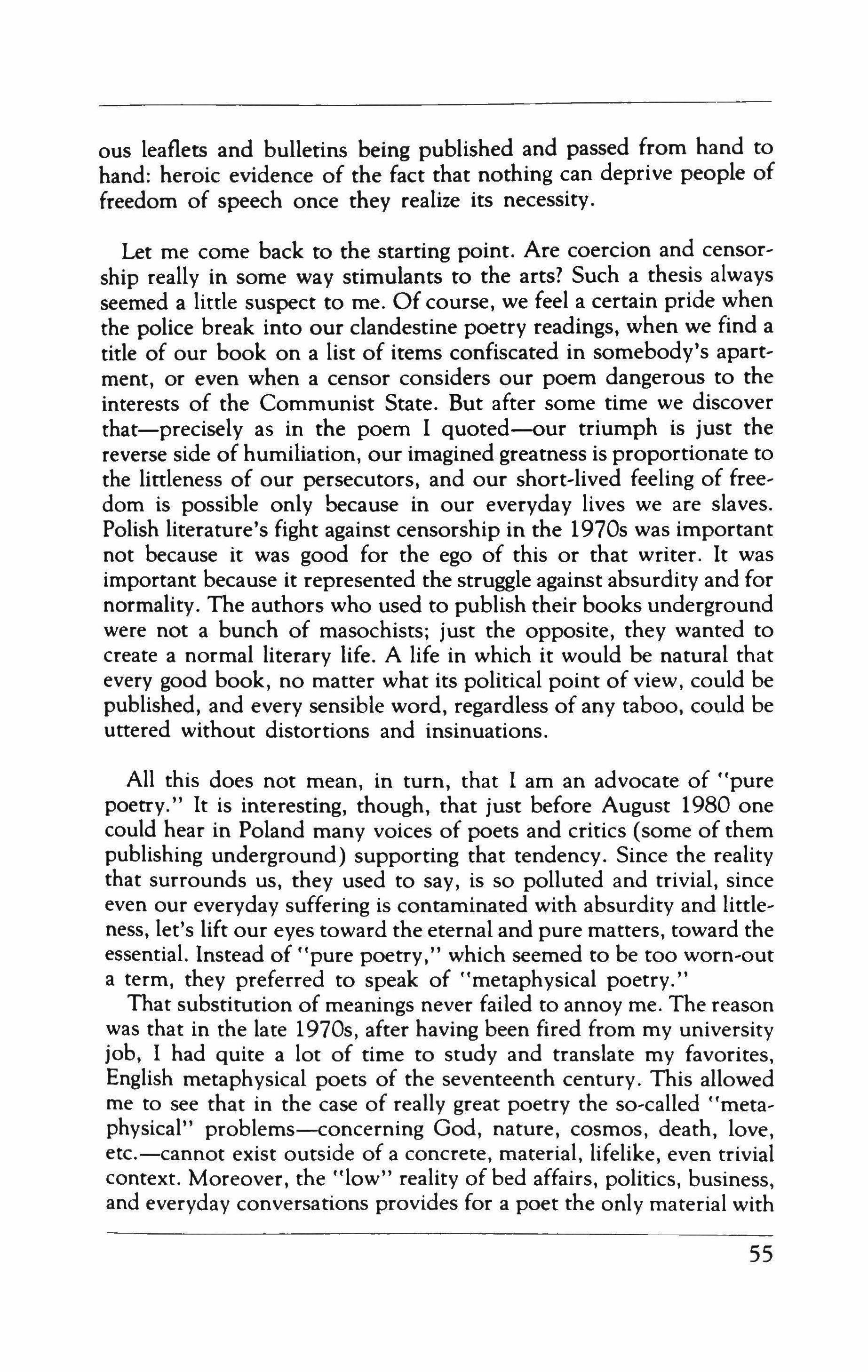
ous leaflets and bulletins being published and passed from hand to hand: heroic evidence of the fact that nothing can deprive people of freedom of speech once they realize its necessity.
Let me come back to the starting point. Are coercion and censorship really in some way stimulants to the arts? Such a thesis always seemed a little suspect to me. Of course, we feel a certain pride when the police break into our clandestine poetry readings, when we find a title of our book on a list of items confiscated in somebody's apartment, or even when a censor considers our poem dangerous to the interests of the Communist State. But after some time we discover that-precisely as in the poem I quoted-our triumph is just the reverse side of humiliation, our imagined greatness is proportionate to the littleness of our persecutors, and our short-lived feeling of freedom is possible only because in our everyday lives we are slaves. Polish literature's fight against censorship in the 1970s was important not because it was good for the ego of this or that writer. It was important because it represented the struggle against absurdity and for normality. The authors who used to publish their books underground were not a bunch of masochists; just the opposite, they wanted to create a normal literary life. A life in which it would be natural that every good book, no matter what its political point of view, could be published, and every sensible word, regardless of any taboo, could be uttered without distortions and insinuations.
All this does not mean, in turn, that I am an advocate of "pure poetry." It is interesting, though, that just before August 1980 one could hear in Poland many voices of poets and critics (some of them publishing underground) supporting that tendency. Since the reality that surrounds us, they used to say, is so polluted and trivial, since even our everyday suffering is contaminated with absurdity and littleness, let's lift our eyes toward the eternal and pure matters, toward the essential. Instead of "pure poetry," which seemed to be too worn-out a term, they preferred to speak of "metaphysical poetry." That substitution of meanings never failed to annoy me. The reason was that in the late 1970s, after having been fired from my university job, I had quite a lot of time to study and translate my favorites, English metaphysical poets of the seventeenth century. This allowed me to see that in the case of really great poetry the so-called "metaphysical" problems-concerning God, nature, cosmos, death, love, etc.-cannot exist outside of a concrete, material, lifelike, even trivial context. Moreover, the "low" reality of bed affairs, politics, business, and everyday conversations provides for a poet the only material with
55
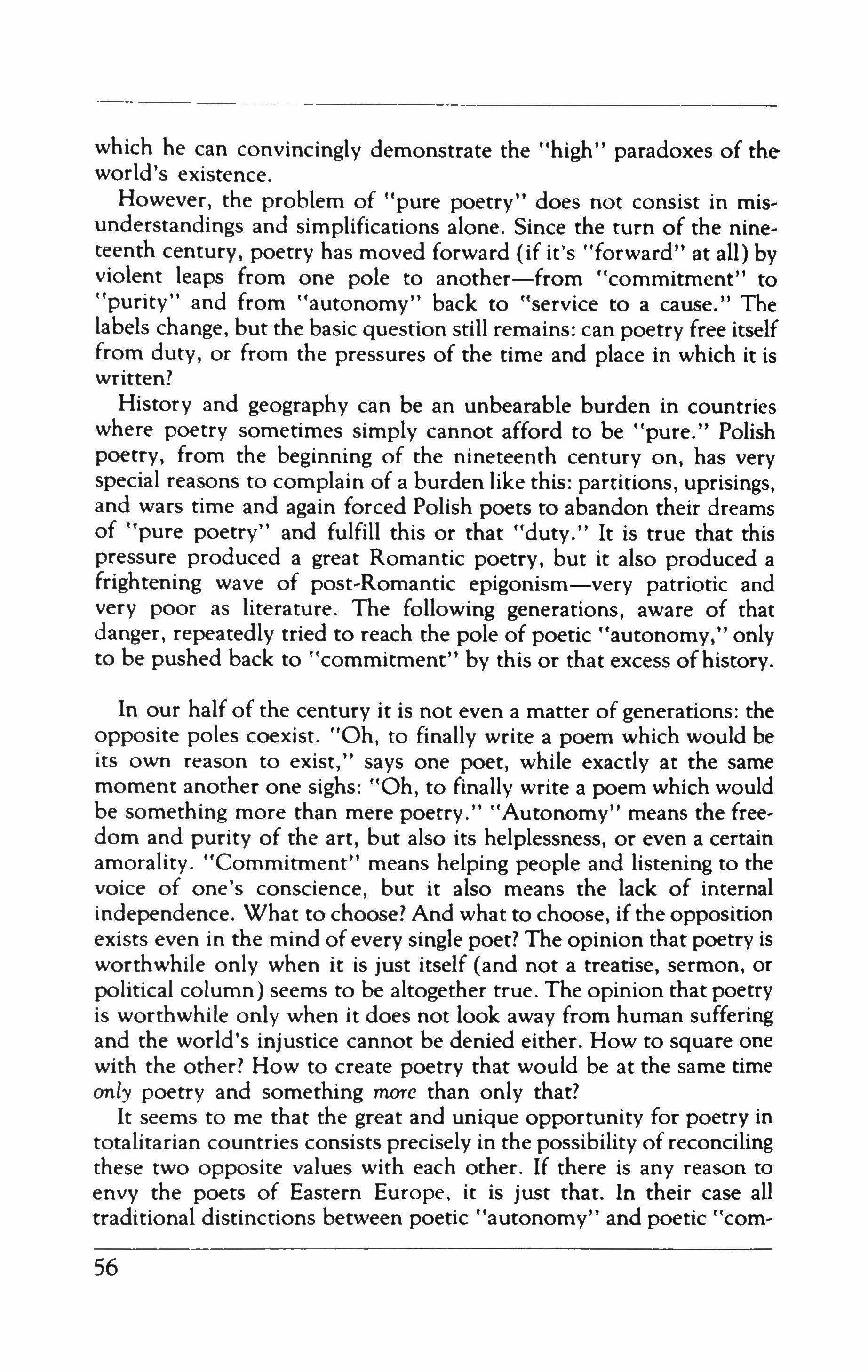
which he can convincingly demonstrate the "high" paradoxes of theworld's existence.
However, the problem of "pure poetry" does not consist in misunderstandings and simplifications alone. Since the turn of the nineteenth century, poetry has moved forward (if it's "forward" at all) by violent leaps from one pole to another-from "commitment" to "purity" and from "autonomy" back to "service to a cause." The labels change, but the basic question still remains: can poetry free itself from duty, or from the pressures of the time and place in which it is written?
History and geography can be an unbearable burden in countries where poetry sometimes simply cannot afford to be "pure." Polish poetry, from the beginning of the nineteenth century on, has very special reasons to complain of a burden like this: partitions, uprisings, and wars time and again forced Polish poets to abandon their dreams of "pure poetry" and fulfill this or that "duty." It is true that this pressure produced a great Romantic poetry, but it also produced a frightening wave of post-Romantic epigonism-very patriotic and very poor as literature. The following generations, aware of that danger, repeatedly tried to reach the pole of poetic "autonomy," only to be pushed back to "commitment" by this or that excess ofhistory.
In our half of the century it is not even a matter of generations: the opposite poles coexist. "Oh, to finally write a poem which would be its own reason to exist," says one poet, while exactly at the same moment another one sighs: "Oh, to finally write a poem which would be something more than mere poetry." "Autonomy" means the freedom and purity of the art, but also its helplessness, or even a certain amorality. "Commitment" means helping people and listening to the voice of one's conscience, but it also means the lack of internal independence. What to choose? And what to choose, if the opposition exists even in the mind of every single poet? The opinion that poetry is worthwhile only when it is just itself (and not a treatise, sermon, or political column) seems to be altogether true. The opinion that poetry is worthwhile only when it does not look away from human suffering and the world's injustice cannot be denied either. How to square one with the other? How to create poetry that would be at the same time only poetry and something more than only that?
It seems to me that the great and unique opportunity for poetry in totalitarian countries consists precisely in the possibility of reconciling these two opposite values with each other. If there is any reason to envy the poets of Eastern Europe. it is just that. In their case all traditional distinctions between poetic "autonomy" and poetic "com-
56
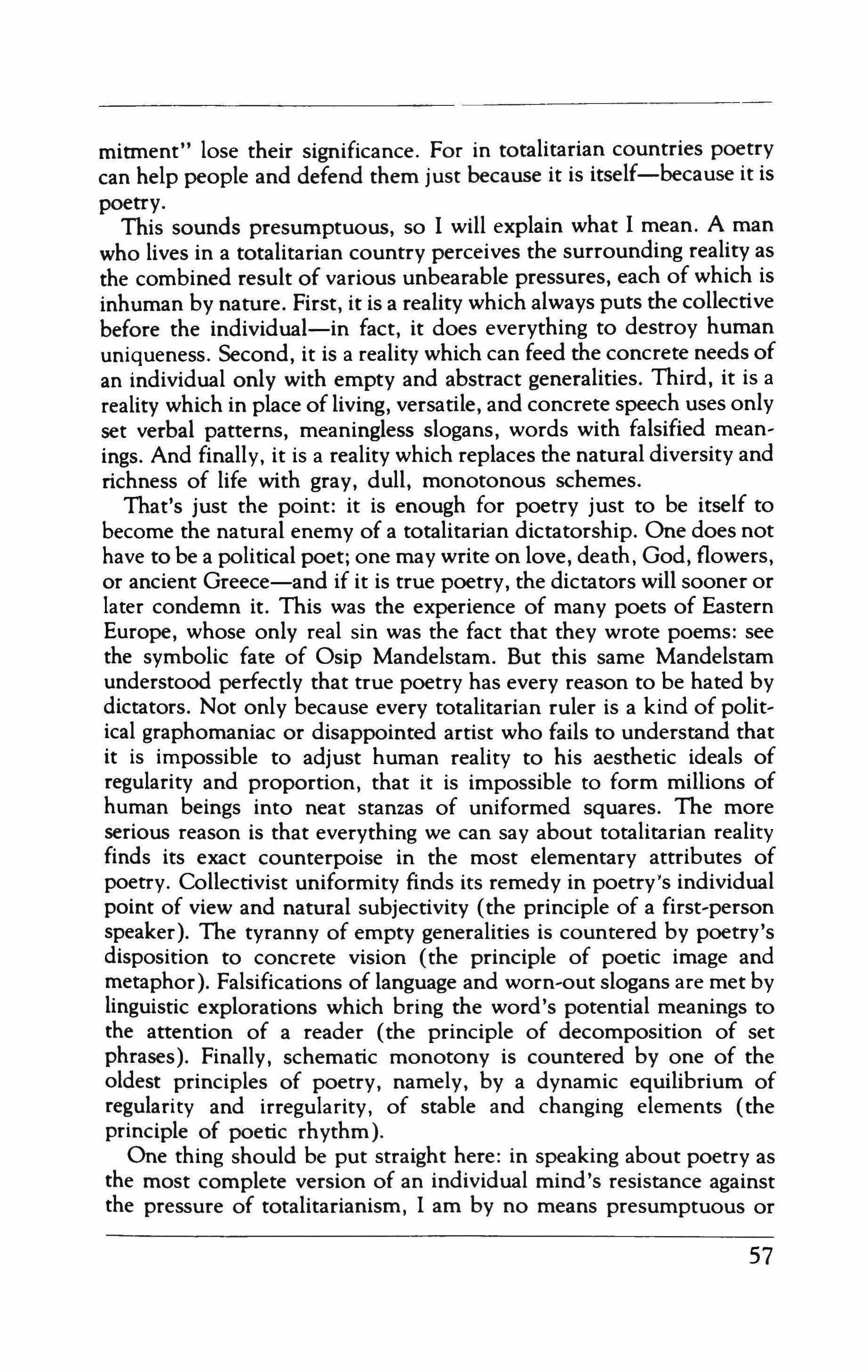
mitment" lose their significance. For in totalitarian countries poetry can help people and defend them just because it is itself-because it is poetry.
This sounds presumptuous, so I will explain what I mean. A man who lives in a totalitarian country perceives the surrounding reality as the combined result of various unbearable pressures, each of which is inhuman by nature. First, it is a reality which always puts the collective before the individual-in fact, it does everything to destroy human uniqueness. Second, it is a reality which can feed the concrete needs of an individual only with empty and abstract generalities. Third, it is a reality which in place of living, versatile, and concrete speech uses only set verbal patterns, meaningless slogans, words with falsified meanings. And finally, it is a reality which replaces the natural diversity and richness of life with gray, dull, monotonous schemes.
That's just the point: it is enough for poetry just to be itself to become the natural enemy of a totalitarian dictatorship. One does not have to be a political poet; one may write on love, death, God, flowers, or ancient Greece-and if it is true poetry, the dictators will sooner or later condemn it. This was the experience of many poets of Eastern Europe, whose only real sin was the fact that they wrote poems: see the symbolic fate of Osip Mandelstam. But this same Mandelstam understood perfectly that true poetry has every reason to be hated by dictators. Not only because every totalitarian ruler is a kind of political graphomaniac or disappointed artist who fails to understand that it is impossible to adjust human reality to his aesthetic ideals of regularity and proportion, that it is impossible to form millions of human beings into neat stanzas of uniformed squares. The more serious reason is that everything we can say about totalitarian reality finds its exact counterpoise in the most elementary attributes of poetry. Collectivist uniformity finds its remedy in poetry's individual point of view and natural subjectivity (the principle of a first-person speaker). The tyranny of empty generalities is countered by poetry's disposition to concrete vision (the principle of poetic image and metaphor). Falsifications of language and worn-out slogans are met by linguistic explorations which bring the word's potential meanings to the attention of a reader (the principle of decomposition of set phrases). Finally, schematic monotony is countered by one of the oldest principles of poetry, namely, by a dynamic equilibrium of regularity and irregularity, of stable and changing elements (the principle of poetic rhythm).
One thing should be put straight here: in speaking about poetry as the most complete version of an individual mind's resistance against the pressure of totalitarianism, I am by no means presumptuous or
57
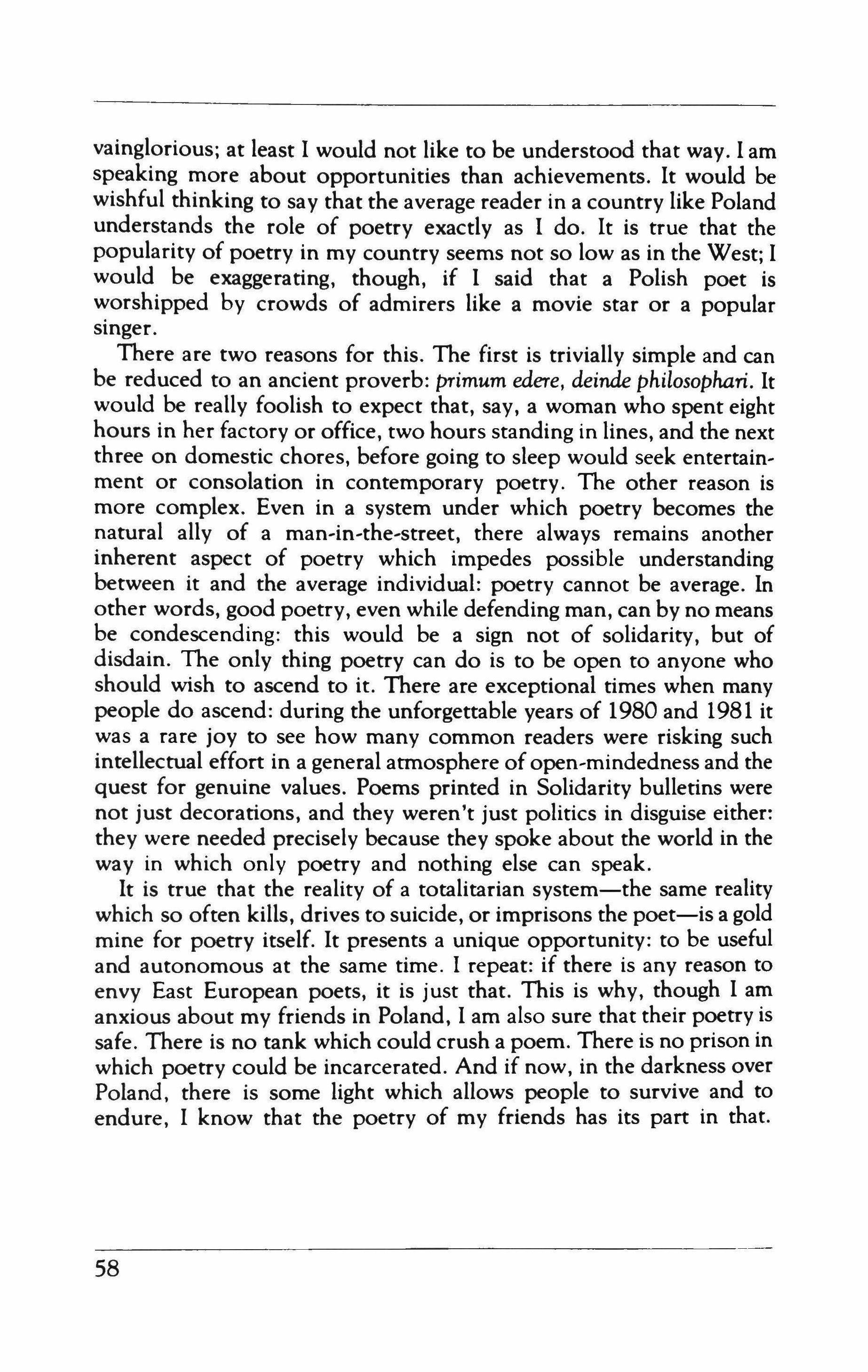
vainglorious; at least I would not like to be understood that way. I am speaking more about opportunities than achievements. It would be wishful thinking to say that the average reader in a country like Poland understands the role of poetry exactly as I do. It is true that the popularity of poetry in my country seems not so low as in the West; I would be exaggerating, though, if I said that a Polish poet is worshipped by crowds of admirers like a movie star or a popular singer.
There are two reasons for this. The first is trivially simple and can be reduced to an ancient proverb: primum edere, deinde philosophari. It would be really foolish to expect that, say, a woman who spent eight hours in her factory or office, two hours standing in lines, and the next three on domestic chores, before going to sleep would seek entertainment or consolation in contemporary poetry. The other reason is more complex. Even in a system under which poetry becomes the natural ally of a man-in-the-street, there always remains another inherent aspect of poetry which impedes possible understanding between it and the average individual: poetry cannot be average. In other words, good poetry, even while defending man, can by no means be condescending: this would be a sign not of solidarity, but of disdain. The only thing poetry can do is to be open to anyone who should wish to ascend to it. There are exceptional times when many people do ascend: during the unforgettable years of 1980 and 1981 it was a rare joy to see how many common readers were risking such intellectual effort in a general atmosphere of open-rnindedness and the quest for genuine values. Poems printed in Solidarity bulletins were not just decorations, and they weren't just politics in disguise either: they were needed precisely because they spoke about the world in the way in which only poetry and nothing else can speak.
It is true that the reality of a totalitarian system-the same reality which so often kills, drives to suicide, or imprisons the poet-is a gold mine for poetry itself. It presents a unique opportunity: to be useful and autonomous at the same time. I repeat: if there is any reason to envy East European poets, it is just that. This is why, though I am anxious about my friends in Poland, I am also sure that their poetry is safe. There is no tank which could crush a poem. There is no prison in which poetry could be incarcerated. And if now, in the darkness over Poland, there is some light which allows people to survive and to endure, I know that the poetry of my friends has its part in that.
58
Sleeplessness
Thomasz [astrur:
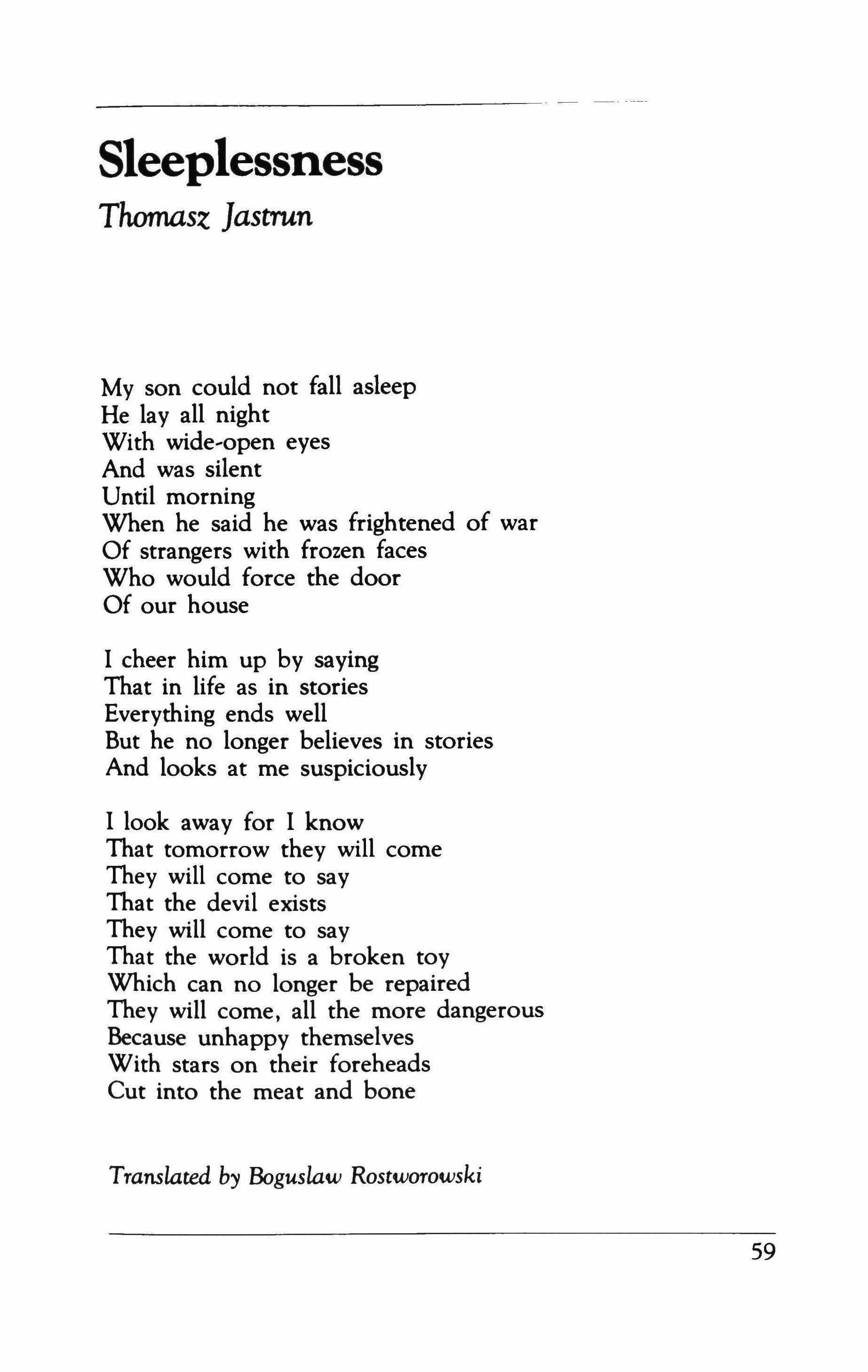
My son could not fall asleep
He lay all night
With wide-open eyes And was silent
Until morning
When he said he was frightened of war
Of strangers with frozen faces Who would force the door Of our house
I cheer him up by saying That in life as in stories
Everything ends well
But he no longer believes in stories And looks at me suspiciously
I look away for I know
That tomorrow they will come
They will come to say That the devil exists
They will come to say That the world is a broken toy
Which can no longer be repaired
They will come. all the more dangerous Because unhappy themselves
With stars on their foreheads
Cut into the meat and bone
Translated by Boguslaw Rostworowski
59
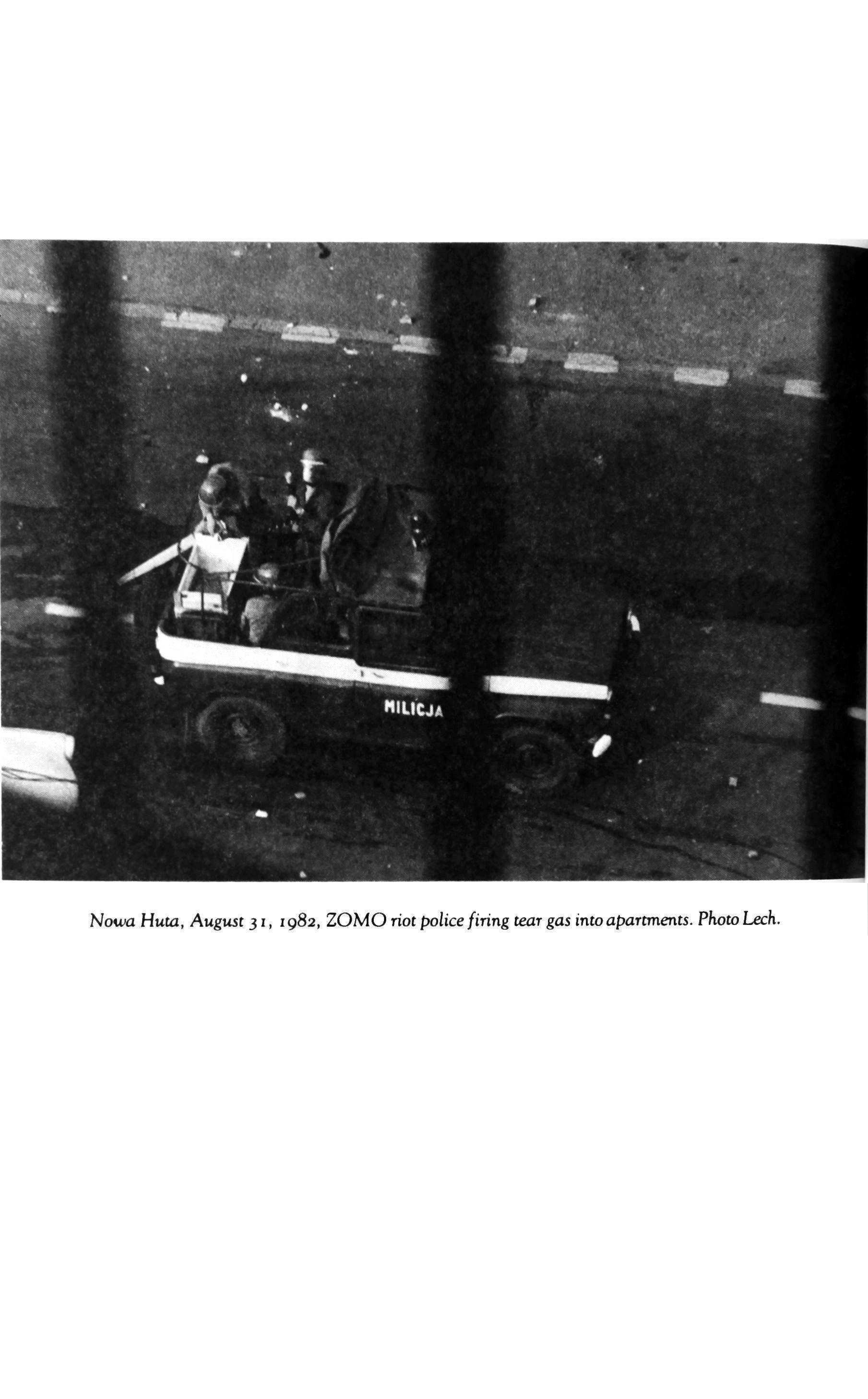 Nowa Huta, August 3 I, 1982, ZOMO riot policefiring tear gas into apartments. PhotoLech.
Nowa Huta, August 3 I, 1982, ZOMO riot policefiring tear gas into apartments. PhotoLech.
I will open the window
Anna Swirszczynska

Our embrace went on too long. We loved each other to the very marrow. I hear the grating of bones, I see our two skeletons.
Now I am waiting for you to leave, for the clatter of shoes to be extinguished on the stairs. Now it's quiet.
This night I will sleep alone on the sheets of purity.
Privacy is the first hygienic measure. Privacy will expand the walls of the room, I will open the window and in will come the broad, frosty air, healthy as a tragedy. In will come the thoughts of humankind and humankind's concerns, the misfortunes and the holiness of others. They will hold quiet and austere conversation.
Don't come around any more. I act like an animal very rarely.
Translated by Magnus]. Krynski and Robert A. Maguire
61
First move
Leszek Elektorowicz
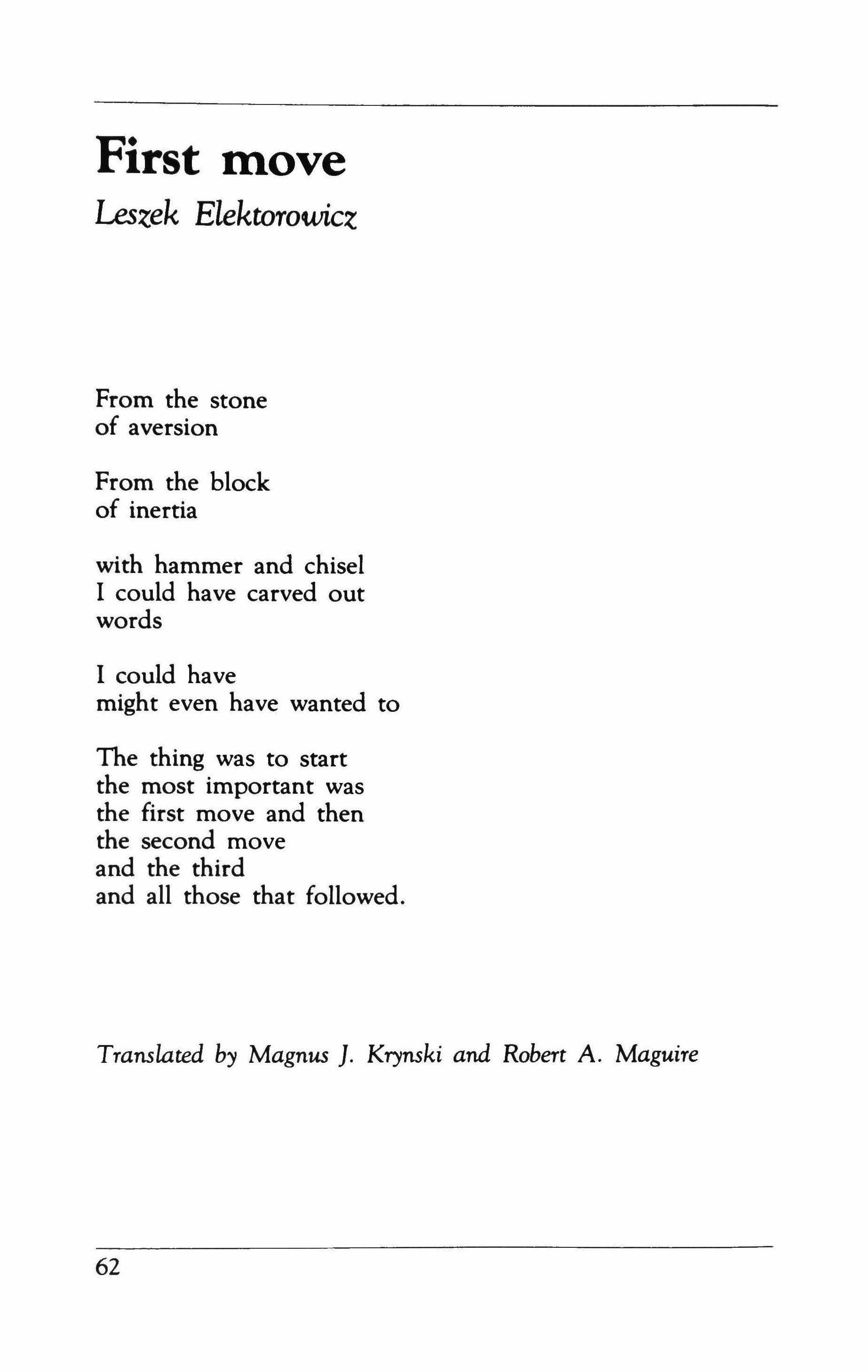
From the stone of aversion
From the block of inertia
with hammer and chisel I could have carved out words I could have might even have wanted to
The thing was to start the most important was the first move and then the second move and the third and all those that followed.
Translated
by
Magnus ]. Krynski and Robert A. Maguire
62
Golden tim.es
Boguslaw Rostworowski
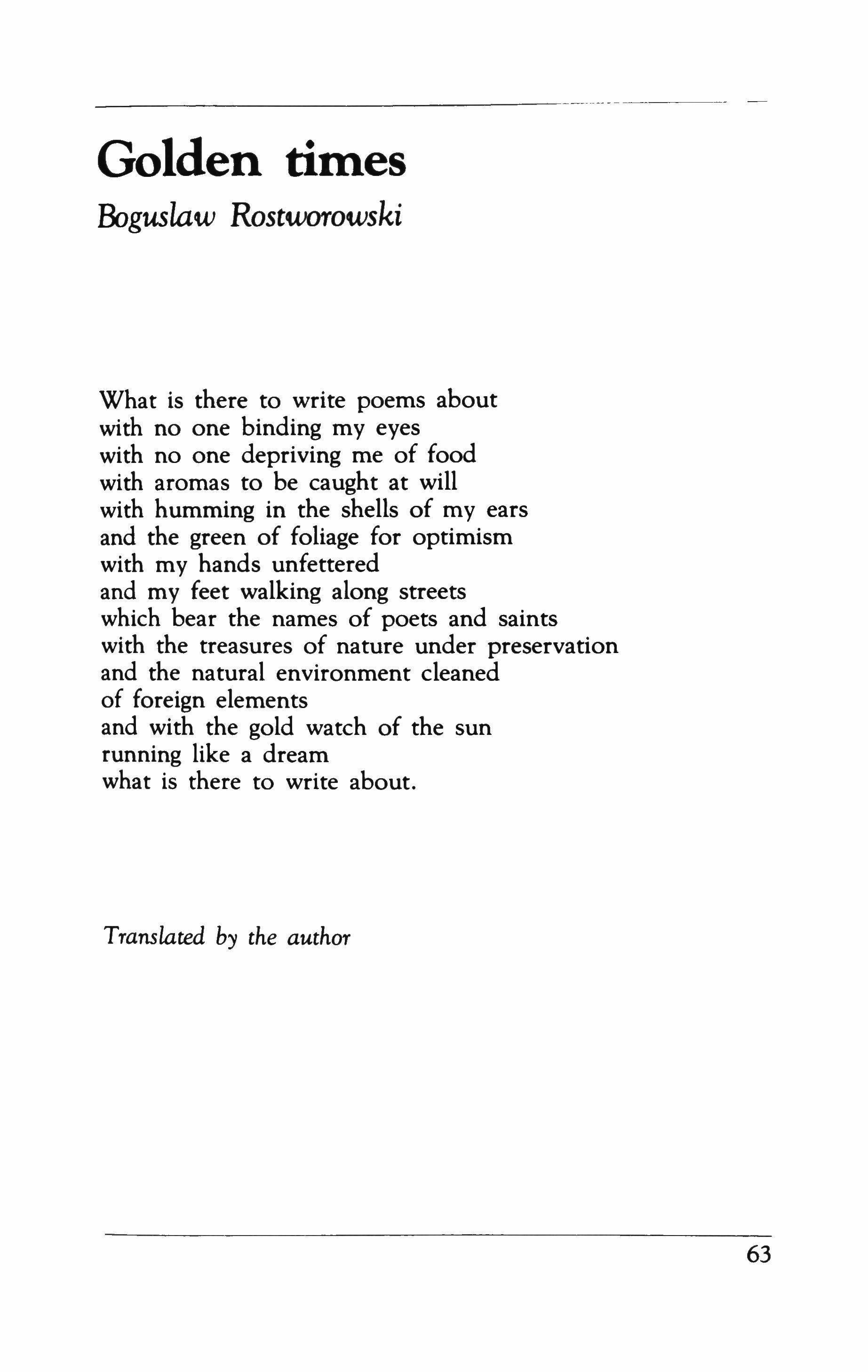
What is there to write poems about with no one binding my eyes with no one depriving me of food with aromas to be caught at will with humming in the shells of my ears and the green of foliage for optimism with my hands unfettered and my feet walking along streets which bear the names of poets and saints with the treasures of nature under preservation and the natural environment cleaned of foreign elements and with the gold watch of the sun running like a dream what is there to write about.
Translated by the author
63
Cry butcher cry
Janusz Glowacki
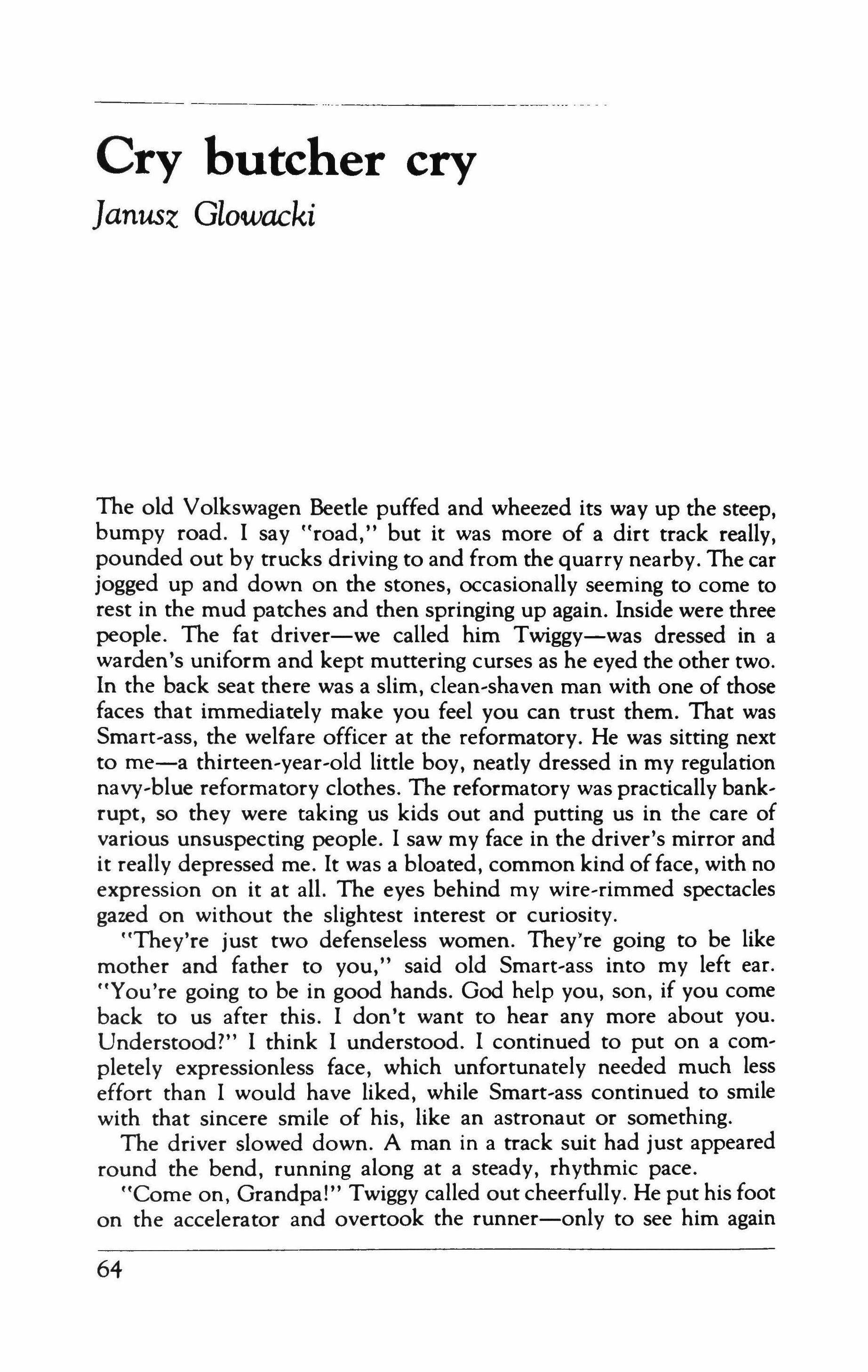
The old Volkswagen Beetle puffed and wheezed its way up the steep, bumpy road. I say "road," but it was more of a dirt track really, pounded out by trucks driving to and from the quarry nearby. The car jogged up and down on the stones, occasionally seeming to come to rest in the mud patches and then springing up again. Inside were three people. The fat driver-we called him Twiggy-was dressed in a warden's uniform and kept muttering curses as he eyed the other two. In the back seat there was a slim, clean-shaven man with one of those faces that immediately make you feel you can trust them. That was Smart-ass, the welfare officer at the reformatory. He was sitting next to me-a thirteen-year-old little boy, neatly dressed in my regulation navy-blue reformatory clothes. The reformatory was practically bankrupt, so they were taking us kids out and putting us in the care of various unsuspecting people. I saw my face in the driver's mirror and it really depressed me. It was a bloated, common kind offace, with no expression on it at all. The eyes behind my wire-rimmed spectacles gazed on without the slightest interest or curiosity.
"They're just two defenseless women. They're going to be like mother and father to you," said old Smart-ass into my left ear. "You're going to be in good hands. God help you, son, if you come back to us after this. I don't want to hear any more about you. Understood?" I think I understood. I continued to put on a completely expressionless face, which unfortunately needed much less effort than I would have liked, while Smart-ass continued to smile with that sincere smile of his, like an astronaut or something.
The driver slowed down. A man in a track suit had just appeared round the bend, running along at a steady, rhythmic pace.
"Come on, Grandpa!" Twiggy called out cheerfully. He put his foot on the accelerator and overtook the runner-only to see him again
64
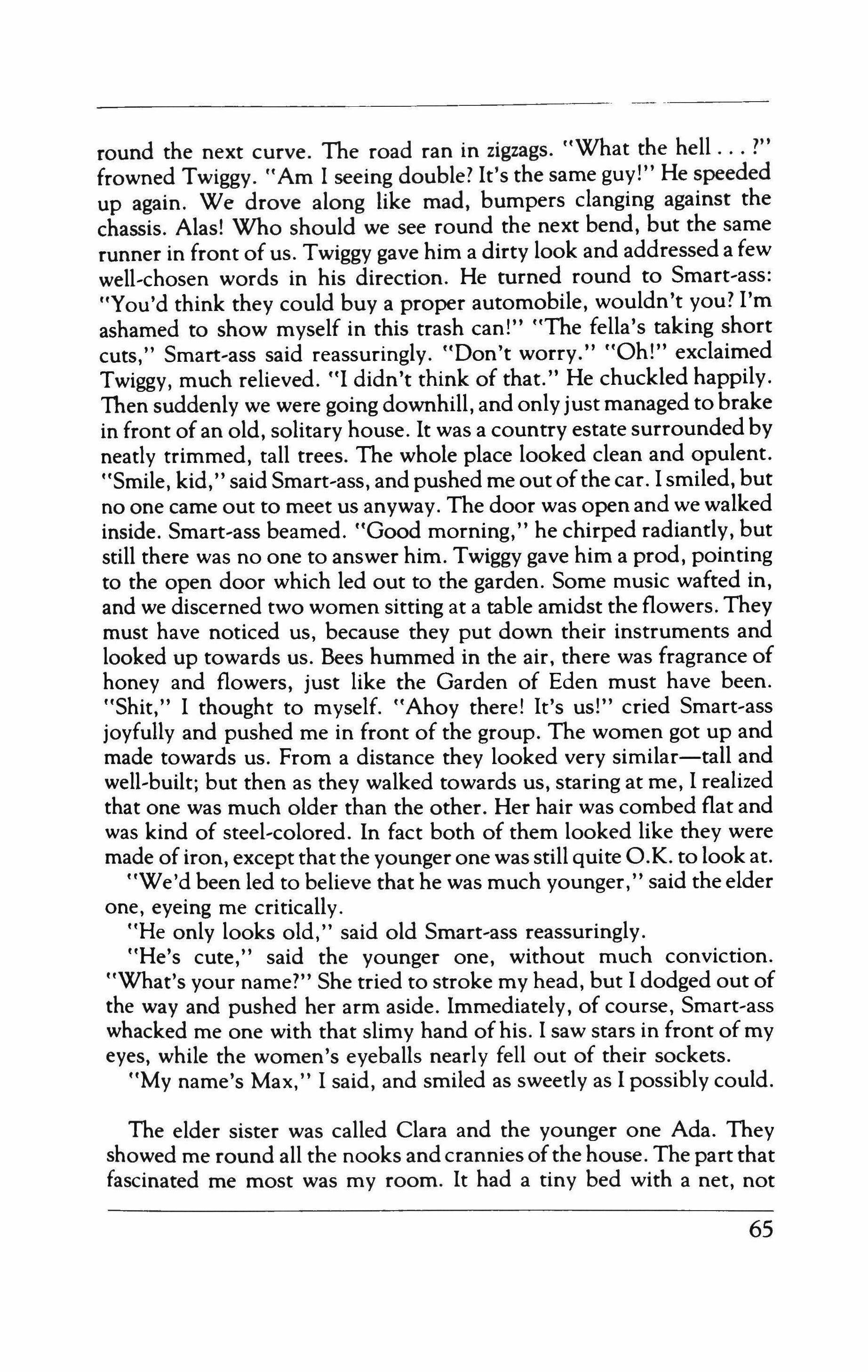
round the next curve. The road ran in zigzags. "What the hell ?" frowned Twiggy. "Am I seeing double? It's the same guy!" He speeded up again. We drove along like mad, bumpers clanging against the chassis. Alas! Who should we see round the next bend, but the same runner in front of us. Twiggy gave him a dirty look and addressed a few well-chosen words in his direction. He turned round to Smart-ass: "You'd think they could buy a proper automobile, wouldn't you? I'm ashamed to show myself in this trash can!" "The fella's taking short cuts," Smart-ass said reassuringly. "Don't worry." "Oh!" exclaimed Twiggy, much relieved. "I didn't think of that." He chuckled happily. Then suddenly we were going downhill, and onlyjust managed to brake in front of an old, solitary house. It was a country estate surrounded by neatly trimmed, tall trees. The whole place looked clean and opulent. "Smile, kid," said Smart-ass, and pushed me out ofthe car. I smiled, but no one came out to meet us anyway. The door was open and we walked inside. Smart-ass beamed. "Good morning," he chirped radiantly, but still there was no one to answer him. Twiggy gave him a prod, pointing to the open door which led out to the garden. Some music wafted in, and we discerned two women sitting at a table amidst the flowers. They must have noticed us, because they put down their instruments and looked up towards us. Bees hummed in the air, there was fragrance of honey and flowers, just like the Garden of Eden must have been. "Shit," I thought to myself. "Ahoy there! It's us!" cried Smart-ass joyfully and pushed me in front of the group. The women got up and made towards us. From a distance they looked very similar-tall and well-built: but then as they walked towards us, staring at me, I realized that one was much older than the other. Her hair was combed flat and was kind of steel-colored. In fact both of them looked like they were made of iron, except that the younger one was still quite O.K. to look at.
"We'd been led to believe that he was much younger," said the elder one, eyeing me critically.
"He only looks old," said old Smart-ass reassuringly.
"He's cute," said the younger one, without much conviction. "What's your name?" She tried to stroke my head, but I dodged out of the way and pushed her arm aside. Immediately, of course, Smart-ass whacked me one with that slimy hand ofhis. I saw stars in front of my eyes, while the women's eyeballs nearly fell out of their sockets.
"My name's Max," I said, and smiled as sweetly as I possibly could.
The elder sister was called Clara and the younger one Ada. They showed me round all the nooks and crannies ofthe house. The part that fascinated me most was my room. It had a tiny bed with a net, not
65
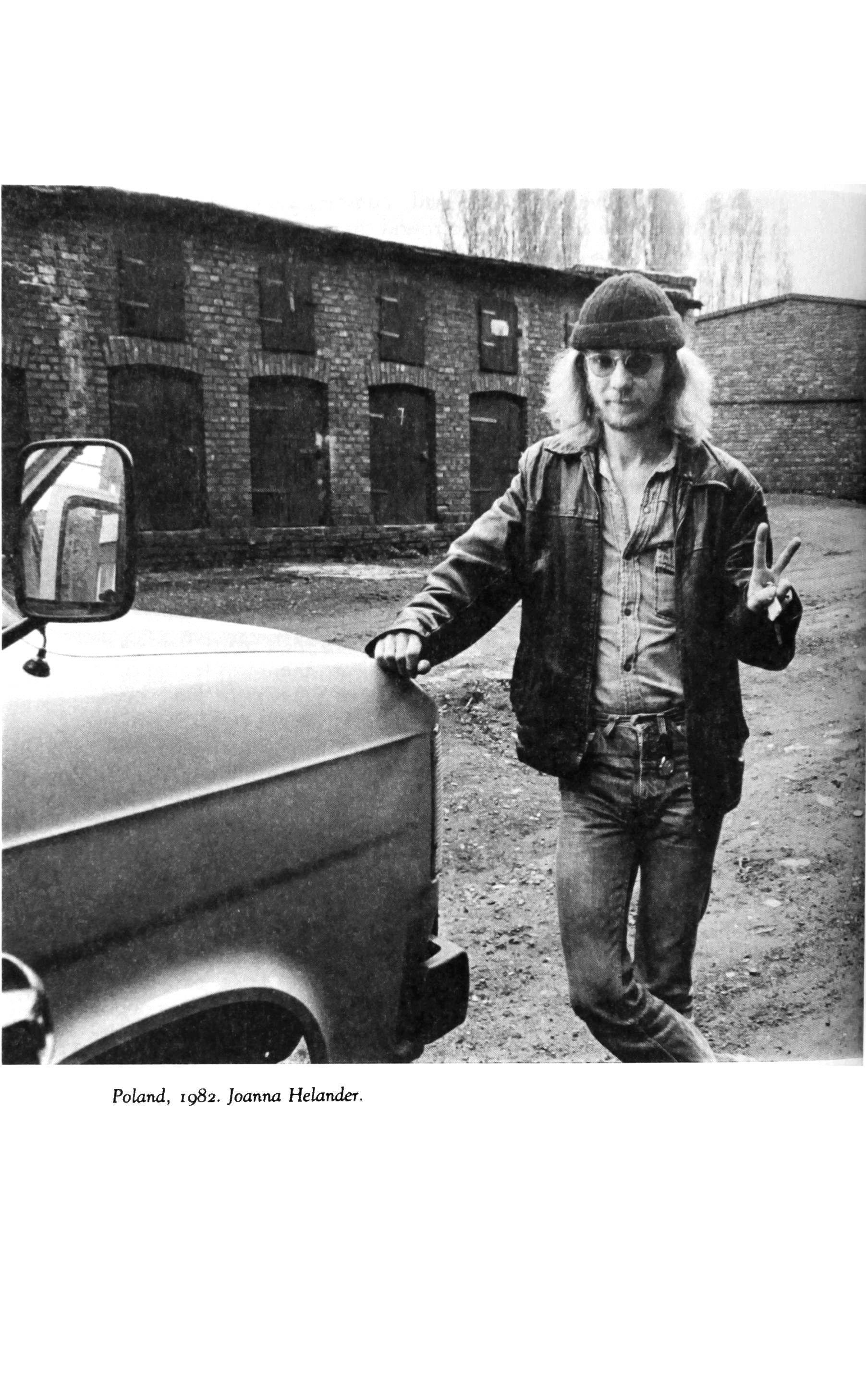 Poland, r9B2. Joanna Helander.
Poland, r9B2. Joanna Helander.
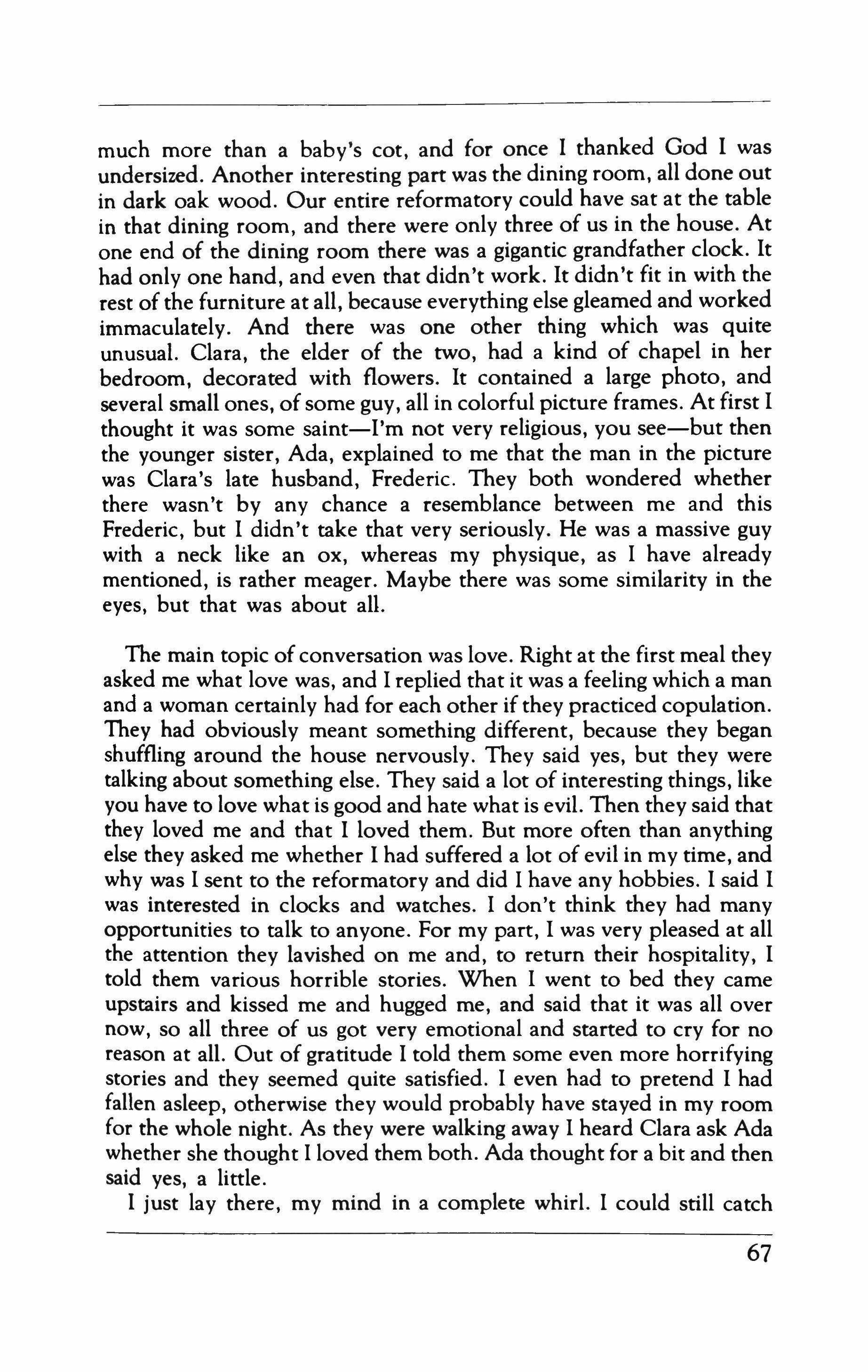
much more than a baby's cot, and for once I thanked God I was undersized. Another interesting part was the dining room, all done out in dark oak wood. Our entire reformatory could have sat at the table in that dining room, and there were only three of us in the house. At one end of the dining room there was a gigantic grandfather clock. It had only one hand, and even that didn't work. It didn't fit in with the rest of the furniture at all, because everything else gleamed and worked immaculately. And there was one other thing which was quite unusual. Clara, the elder of the two, had a kind of chapel in her bedroom, decorated with flowers. It contained a large photo, and several small ones, of some guy, all in colorful picture frames. At first I thought it was some saint-I'm not very religious, you see-but then the younger sister, Ada, explained to me that the man in the picture was Clara's late husband, Frederic. They both wondered whether there wasn't by any chance a resemblance between me and this Frederic, but I didn't take that very seriously. He was a massive guy with a neck like an ox, whereas my physique, as I have already mentioned, is rather meager. Maybe there was some similarity in the eyes, but that was about all.
The main topic of conversation was love. Right at the first meal they asked me what love was, and I replied that it was a feeling which a man and a woman certainly had for each other if they practiced copulation. They had obviously meant something different, because they began shuffling around the house nervously. They said yes, but they were talking about something else. They said a lot of interesting things, like you have to love what is good and hate what is evil. Then they said that they loved me and that I loved them. But more often than anything else they asked me whether I had suffered a lot of evil in my time, and why was I sent to the reformatory and did I have any hobbies. I said I was interested in clocks and watches. I don't think they had many opportunities to talk to anyone. For my part, I was very pleased at all the attention they lavished on me and, to return their hospitality, I told them various horrible stories. When I went to bed they came upstairs and kissed me and hugged me, and said that it was all over now, so all three of us got very emotional and started to cry for no reason at all. Out of gratitude I told them some even more horrifying stories and they seemed quite satisfied. I even had to pretend I had fallen asleep, otherwise they would probably have stayed in my room for the whole night. As they were walking away I heard Clara ask Ada whether she thought I loved them both. Ada thought for a bit and then said yes, a little.
I just lay there, my mind in a complete whirl. I could still catch
67
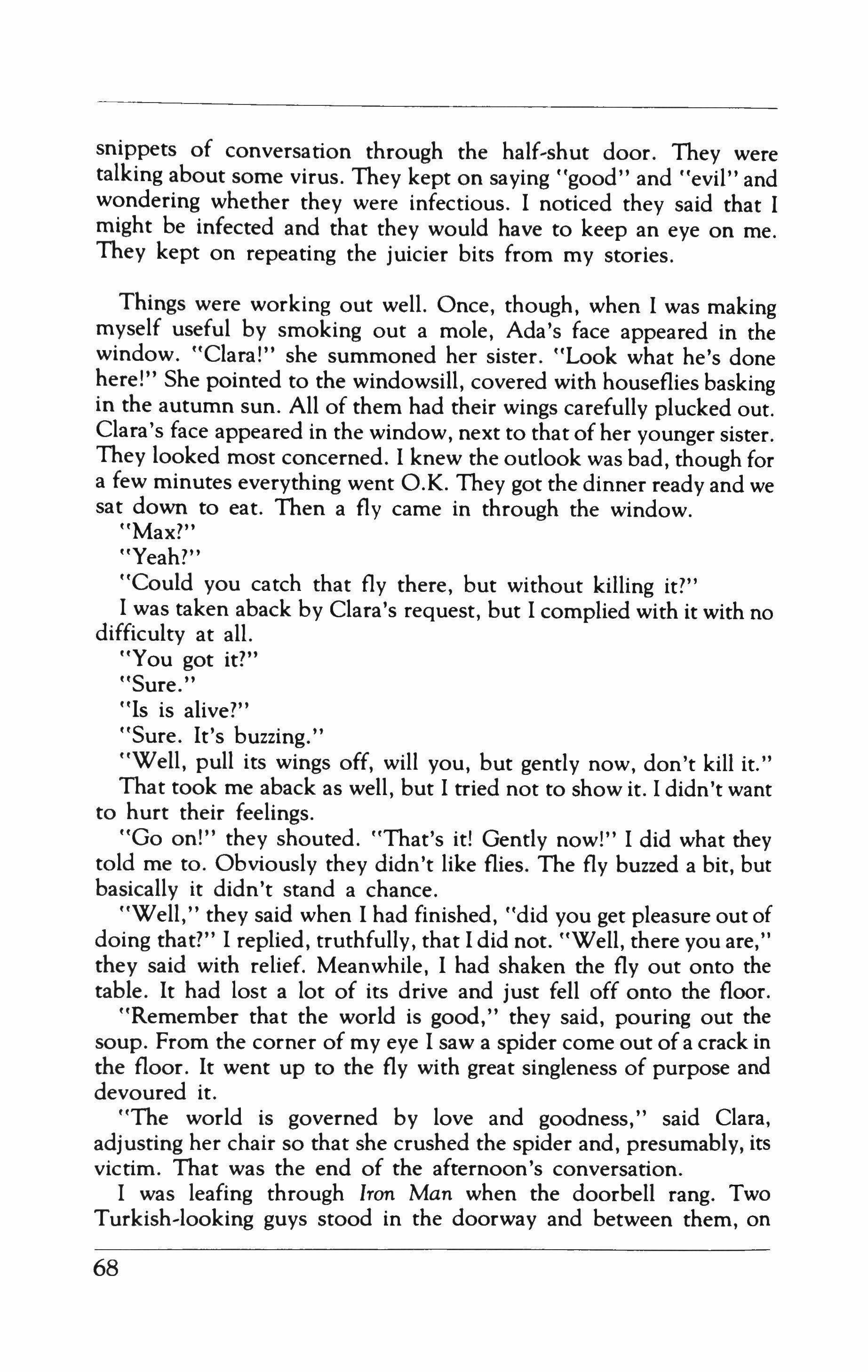
snippets of conversation through the half-shut door. They were talking about some virus. They kept on saying "good" and "evil" and wondering whether they were infectious. I noticed they said that I might be infected and that they would have to keep an eye on me. They kept on repeating the juicier bits from my stories.
Things were working out well. Once, though, when I was making myself useful by smoking out a mole, Ada's face appeared in the window. "Clara!" she summoned her sister. "Look what he's done here!" She pointed to the windowsill, covered with houseflies basking in the autumn sun. All of them had their wings carefully plucked out. Clara's face appeared in the window, next to that of her younger sister. They looked most concerned. I knew the outlook was bad, though for a few minutes everything went O.K. They got the dinner ready and we sat down to eat. Then a fly came in through the window.
"Max?"
"Yeah?"
"Could you catch that fly there, but without killing it?"
I was taken aback by Clara's request, but I complied with it with no difficulty at all.
"You got it?"
"Sure."
"Is is alive?"
"Sure. It's buzzing."
"Well, pull its wings off, will you, but gently now, don't kill it."
That took me aback as well, but I tried not to show it. I didn't want to hurt their feelings.
"Go on!" they shouted. "That's it! Gently now!" I did what they told me to. Obviously they didn't like flies. The fly buzzed a bit, but basically it didn't stand a chance.
"Well," they said when I had finished, "did you get pleasure out of doing that?" I replied, truthfully, that I did not. "Well, there you are," they said with relief. Meanwhile, I had shaken the fly out onto the table. It had lost a lot of its drive and just fell off onto the floor.
"Remember that the world is good," they said, pouring out the soup. From the corner of my eye I saw a spider come out of a crack in the floor. It went up to the fly with great singleness of purpose and devoured it.
"The world is governed by love and goodness," said Clara, adjusting her chair so that she crushed the spider and, presumably, its victim. That was the end of the afternoon's conversation.
I was leafing through Iron Man when the doorbell rang. Two Turkish-looking guys stood in the doorway and between them, on
68
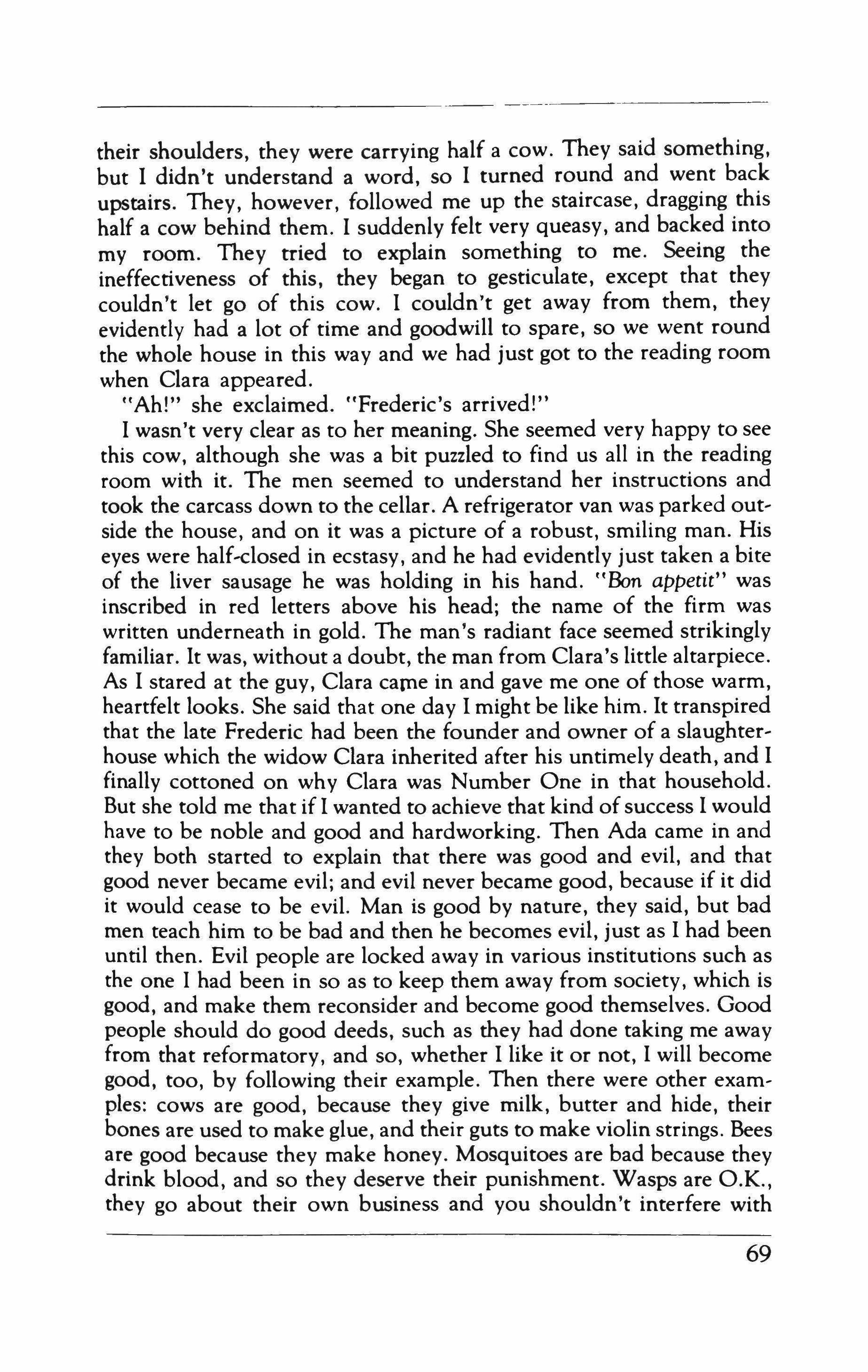
their shoulders, they were carrying half a cow. They said something, but I didn't understand a word, so I turned round and went back upstairs. They, however, followed me up the staircase, dragging this half a cow behind them. I suddenly felt very queasy, and backed into my room. They tried to explain something to me. Seeing the ineffectiveness of this, they began to gesticulate, except that they couldn't let go of this cow. I couldn't get away from them, they evidently had a lot of time and goodwill to spare, so we went round the whole house in this way and we had just got to the reading room when Clara appeared.
"Ah!" she exclaimed. "Frederic's arrived!"
I wasn't very clear as to her meaning. She seemed very happy to see this cow, although she was a bit puzzled to find us all in the reading room with it. The men seemed to understand her instructions and took the carcass down to the cellar. A refrigerator van was parked out' side the house, and on it was a picture of a robust, smiling man. His eyes were half-closed in ecstasy, and he had evidently just taken a bite of the liver sausage he was holding in his hand. "Bon appetit" was inscribed in red letters above his head; the name of the firm was written underneath in gold. The man's radiant face seemed strikingly familiar. It was, without a doubt, the man from Clara's little altarpiece. As I stared at the guy, Clara carne in and gave me one of those warm, heartfelt looks. She said that one day I might be like him. It transpired that the late Frederic had been the founder and owner of a slaughter, house which the widow Clara inherited after his untimely death, and I finally cottoned on why Clara was Number One in that household. But she told me that if I wanted to achieve that kind of success I would have to be noble and good and hardworking. Then Ada came in and they both started to explain that there was good and evil, and that good never became evil; and evil never became good, because if it did it would cease to be evil. Man is good by nature, they said, but bad men teach him to be bad and then he becomes evil, just as I had been until then. Evil people are locked away in various institutions such as the one I had been in so as to keep them away from society, which is good, and make them reconsider and become good themselves. Good people should do good deeds, such as they had done taking me away from that reformatory, and so, whether I like it or not, I will become good, too, by following their example. Then there were other examples: cows are good, because they give milk, butter and hide, their bones are used to make glue, and their guts to make violin strings. Bees are good because they make honey. Mosquitoes are bad because they drink blood, and so they deserve their punishment. Wasps are O.K., they go about their own business and you shouldn't interfere with
69
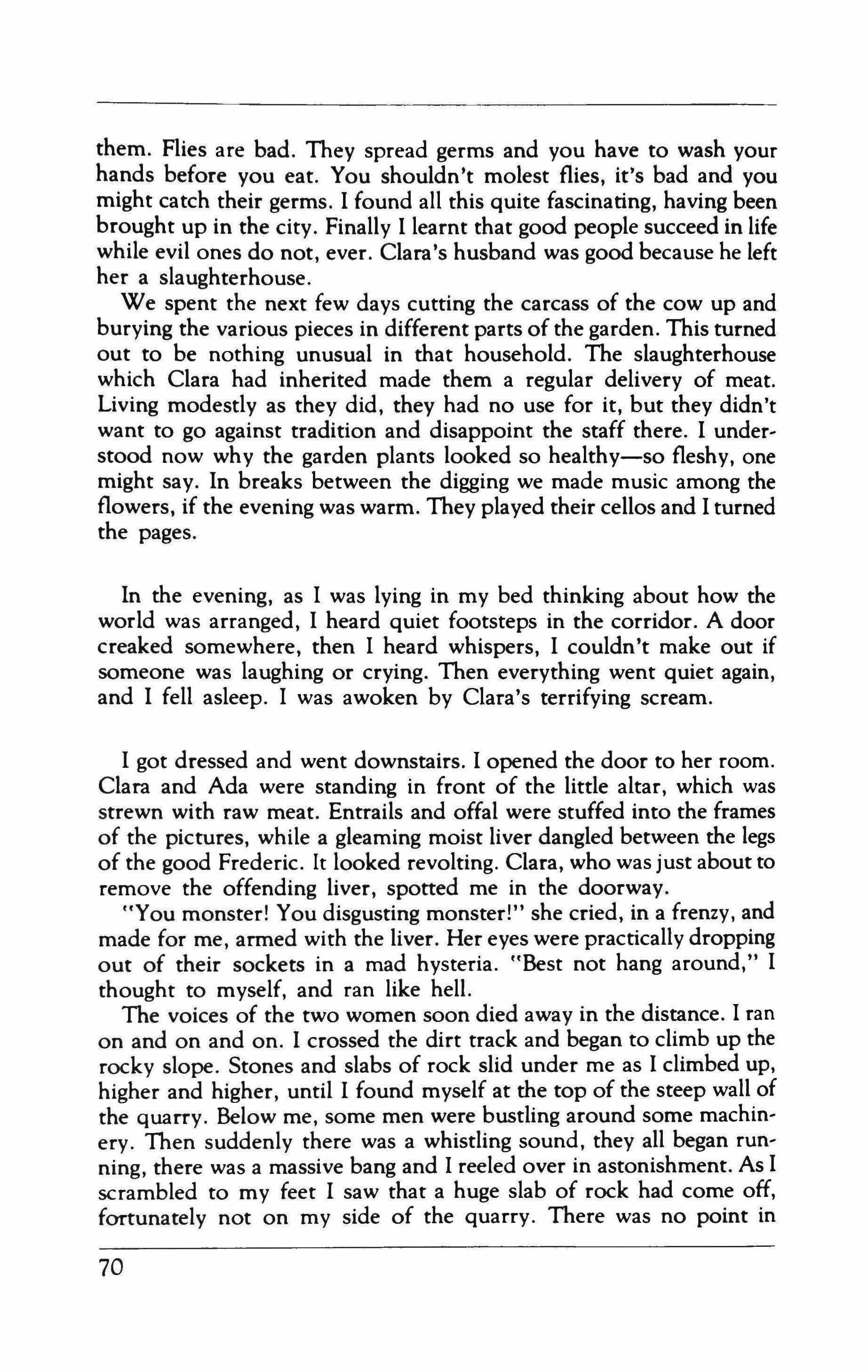
them. Flies are bad. They spread germs and you have to wash your hands before you eat. You shouldn't molest flies, it's bad and you might catch their germs. I found all this quite fascinating, having been brought up in the city. Finally I learnt that good people succeed in life while evil ones do not, ever. Clara's husband was good because he left her a slaughterhouse.
We spent the next few days cutting the carcass of the cow up and burying the various pieces in different parts of the garden. This turned out to be nothing unusual in that household. The slaughterhouse which Clara had inherited made them a regular delivery of meat. Living modestly as they did, they had no use for it, but they didn't want to go against tradition and disappoint the staff there. I understood now why the garden plants looked so healthy-so fleshy, one might say. In breaks between the digging we made music among the flowers, if the evening was warm. They played their cellos and I turned the pages.
In the evening, as I was lying in my bed thinking about how the world was arranged, I heard quiet footsteps in the corridor. A door creaked somewhere, then I heard whispers, I couldn't make out if someone was laughing or crying. Then everything went quiet again, and I fell asleep. I was awoken by Clara's terrifying scream.
I got dressed and went downstairs. I opened the door to her room. Clara and Ada were standing in front of the little altar, which was strewn with raw meat. Entrails and offal were stuffed into the frames of the pictures, while a gleaming moist liver dangled between the legs of the good Frederic. It looked revolting. Clara, who was just about to remove the offending liver, spotted me in the doorway.
"You monster! You disgusting monster!" she cried, in a frenzy, and made for me, armed with the liver. Her eyes were practically dropping out of their sockets in a mad hysteria. "Best not hang around," I thought to myself, and ran like hell.
The voices of the two women soon died away in the distance. I ran on and on and on. I crossed the dirt track and began to climb up the rocky slope. Stones and slabs of rock slid under me as I climbed up, higher and higher, until I found myself at the top of the steep wall of the quarry. Below me, some men were bustling around some machinery. Then suddenly there was a whistling sound, they all began running, there was a massive bang and I reeled over in astonishment. As I scrambled to my feet I saw that a huge slab of rock had come off, fortunately not on my side of the quarry. There was no point in
70
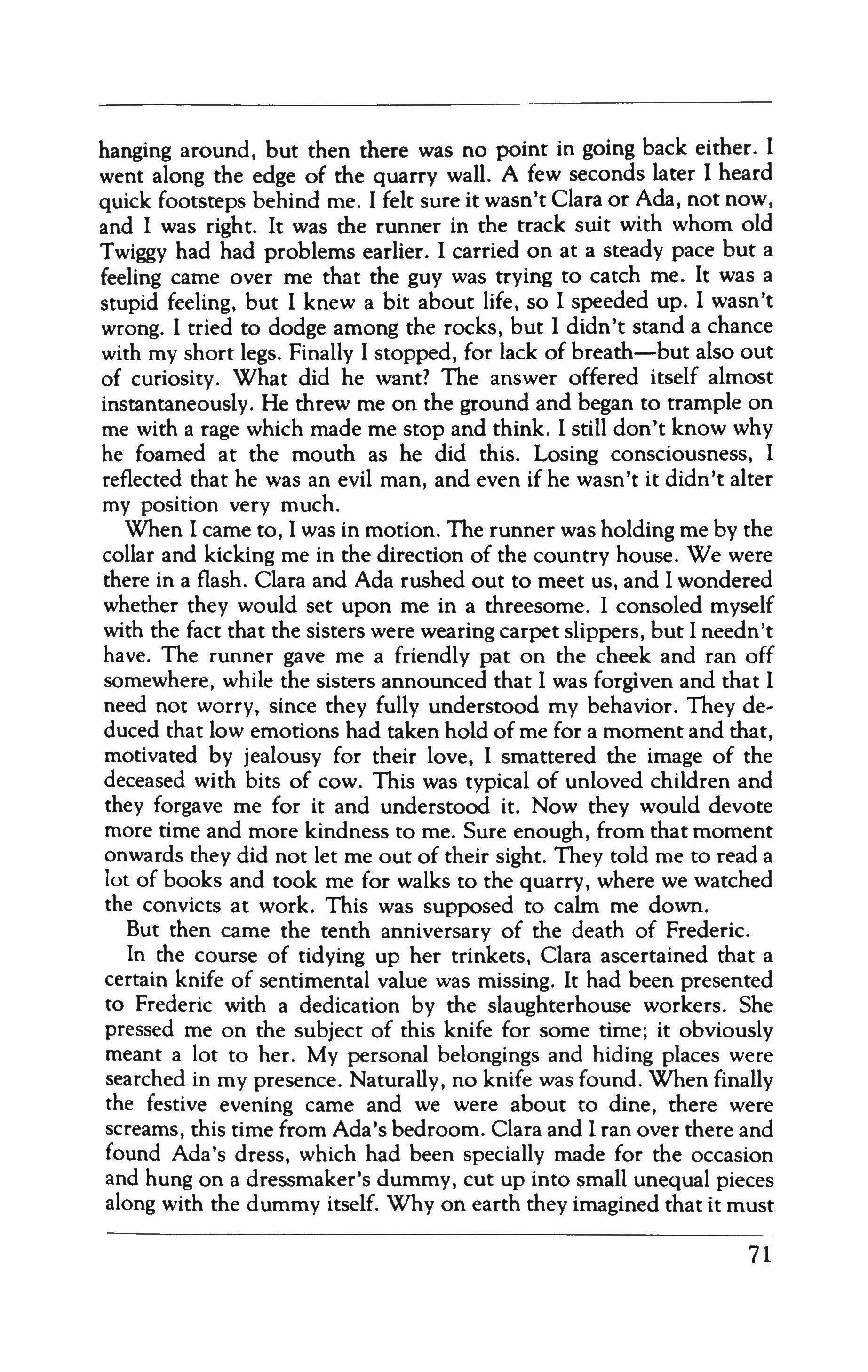
hanging around, but then there was no point in going back either. I went along the edge of the quarry wall. A few seconds later I heard quick footsteps behind me. I felt sure it wasn't Clara or Ada, not now, and I was right. It was the runner in the track suit with whom old Twiggy had had problems earlier. I carried on at a steady pace but a feeling came over me that the guy was trying to catch me. It was a stupid feeling, but I knew a bit about life, so I speeded up. I wasn't wrong. I tried to dodge among the rocks, but I didn't stand a chance with my short legs. Finally I stopped, for lack of breath-but also out of curiosity. What did he want? The answer offered itself almost instantaneously. He threw me on the ground and began to trample on me with a rage which made me stop and think. I still don't know why he foamed at the mouth as he did this. Losing consciousness, I reflected that he was an evil man, and even if he wasn't it didn't alter my position very much.
When I came to, I was in motion. The runner was holding me by the collar and kicking me in the direction of the country house. We were there in a flash. Clara and Ada rushed out to meet us, and I wondered whether they would set upon me in a threesome. I consoled myself with the fact that the sisters were wearing carpet slippers, but I needn't have. The runner gave me a friendly pat on the cheek and ran off somewhere, while the sisters announced that I was forgiven and that I need not worry, since they fully understood my behavior. They de, duced that low emotions had taken hold of me for a moment and that, motivated by jealousy for their love, I smattered the image of the deceased with bits of cow. This was typical of unloved children and they forgave me for it and understood it. Now they would devote more time and more kindness to me. Sure enough, from that moment onwards they did not let me out of their sight. They told me to read a lot of books and took me for walks to the quarry, where we watched the convicts at work. This was supposed to calm me down.
But then came the tenth anniversary of the death of Frederic.
In the course of tidying up her trinkets, Clara ascertained that a certain knife of sentimental value was missing. It had been presented to Frederic with a dedication by the slaughterhouse workers. She pressed me on the subject of this knife for some time; it obviously meant a lot to her. My personal belongings and hiding places were searched in my presence. Naturally, no knife was found. When finally the festive evening came and we were about to dine, there were screams, this time from Ada's bedroom. Clara and I ran over there and found Ada's dress, which had been specially made for the occasion and hung on a dressmaker's dummy, cut up into small unequal pieces along with the dummy itself. Why on earth they imagined that it must
71
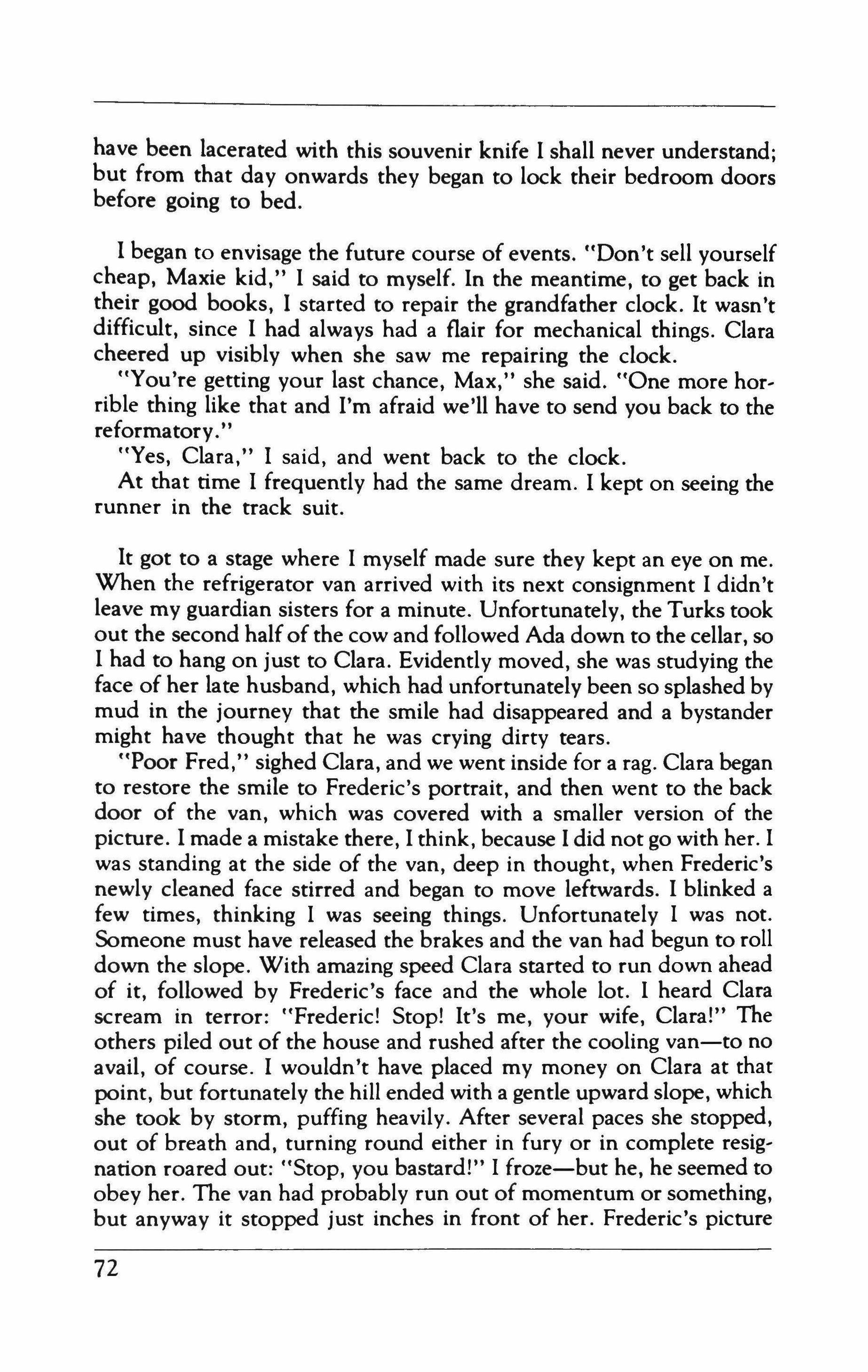
have been lacerated with this souvenir knife I shall never understand; but from that day onwards they began to lock their bedroom doors before going to bed.
I began to envisage the future course of events. "Don't sell yourself cheap, Maxie kid," I said to myself. In the meantime, to get back in their good books, I started to repair the grandfather clock. It wasn't difficult, since I had always had a flair for mechanical things. Clara cheered up visibly when she saw me repairing the clock.
"You're getting your last chance, Max," she said. "One more horribIe thing like that and I'm afraid we'll have to send you back to the reformatory. "
"Yes, Clara," I said, and went back to the clock.
At that time I frequently had the same dream. I kept on seeing the runner in the track suit.
It got to a stage where I myself made sure they kept an eye on me. When the refrigerator van arrived with its next consignment I didn't leave my guardian sisters for a minute. Unfortunately, the Turks took out the second halfof the cow and followed Ada down to the cellar, so I had to hang on just to Clara. Evidently moved, she was studying the face of her late husband, which had unfortunately been so splashed by mud in the journey that the smile had disappeared and a bystander might have thought that he was crying dirty tears.
"Poor Fred," sighed Clara, and we went inside for a rag. Clara began to restore the smile to Frederic's portrait, and then went to the back door of the van, which was covered with a smaller version of the picture. I made a mistake there, I think, because I did not go with her. I was standing at the side of the van, deep in thought, when Frederic's newly cleaned face stirred and began to move leftwards. I blinked a few times, thinking I was seeing things. Unfortunately I was not. Someone must have released the brakes and the van had begun to roll down the slope. With amazing speed Clara started to run down ahead of it, followed by Frederic's face and the whole lot. I heard Clara scream in terror: "Frederic! Stop! It's me, your wife, Clara!" The others piled out of the house and rushed after the cooling van-to no avail, of course. I wouldn't have placed my money on Clara at that point, but fortunately the hill ended with a gentle upward slope, which she took by storm, puffing heavily. After several paces she stopped, out of breath and, turning round either in fury or in complete resignation roared out: "Stop, you bastard!" I froze-but he, he seemed to obey her. The van had probably run out of momentum or something, but anyway it stopped just inches in front of her. Frederic's picture
72
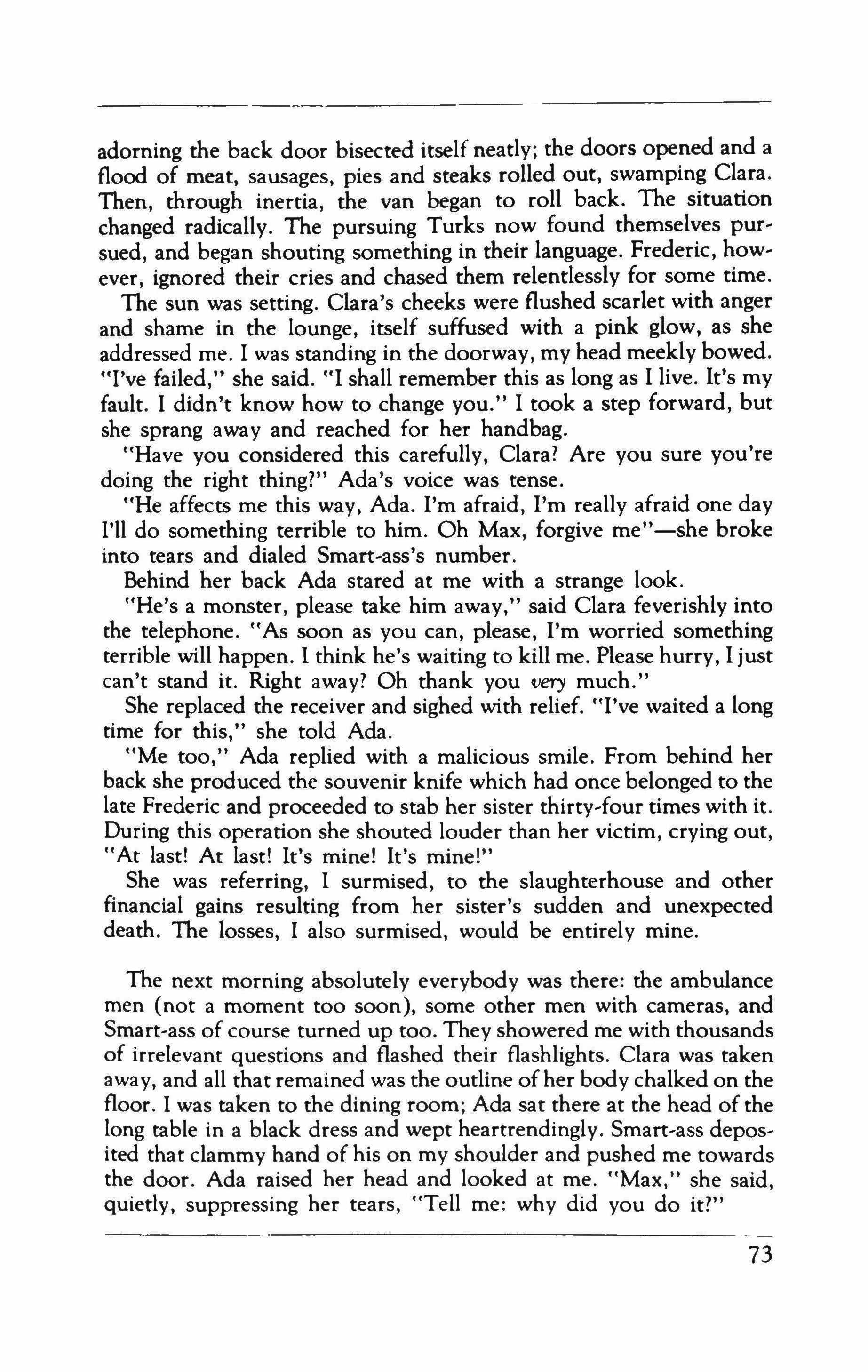
adorning the back door bisected itself neatly; the doors opened and a flood of meat, sausages, pies and steaks rolled out, swamping Clara. Then, through inertia, the van began to roll back. The situation changed radically. The pursuing Turks now found themselves pur, sued, and began shouting something in their language. Frederic, how, ever, ignored their cries and chased them relentlessly for some time.
The sun was setting. Clara's cheeks were flushed scarlet with anger and shame in the lounge, itself suffused with a pink glow, as she addressed me. I was standing in the doorway, my head meekly bowed. "I've failed," she said. "I shall remember this as long as I live. It's my fault. I didn't know how to change you." I took a step forward, but she sprang a way and reached for her handbag.
"Have you considered this carefully, Clara? Are you sure you're doing the right thing?" Ada's voice was tense.
"He affects me this way, Ada. I'm afraid, I'm really afraid one day I'll do something terrible to him. Oh Max, forgive melt-she broke into tears and dialed Smart-ass's number.
Behind her back Ada stared at me with a strange look.
"He's a monster, please take him away," said Clara feverishly into the telephone. "As soon as you can, please, I'm worried something terrible will happen. I think he's waiting to kill me. Please hurry, I just can't stand it. Right away? Oh thank you very much."
She replaced the receiver and sighed with relief. "I've waited a long time for this," she told Ada.
"Me too," Ada replied with a malicious smile. From behind her back she produced the souvenir knife which had once belonged to the late Frederic and proceeded to stab her sister thirty-four times with it. During this operation she shouted louder than her victim, crying out, "At last! At last! It's mine! It's mine!"
She was referring, I surmised, to the slaughterhouse and other financial gains resulting from her sister's sudden and unexpected death. The losses, I also surmised, would be entirely mine.
The next morning absolutely everybody was there: the ambulance men (not a moment too soon), some other men with cameras, and Smart-ass of course turned up too. They showered me with thousands of irrelevant questions and flashed their flashlights. Clara was taken away, and all that remained was the outline of her body chalked on the floor. I was taken to the dining room; Ada sat there at the head of the long table in a black dress and wept heartrendinglv. Smart-ass deposited that clammy hand of his on my shoulder and pushed me towards the door. Ada raised her head and looked at me. "Max," she said, quietly, suppressing her tears, "Tell me: why did you do it?"
73
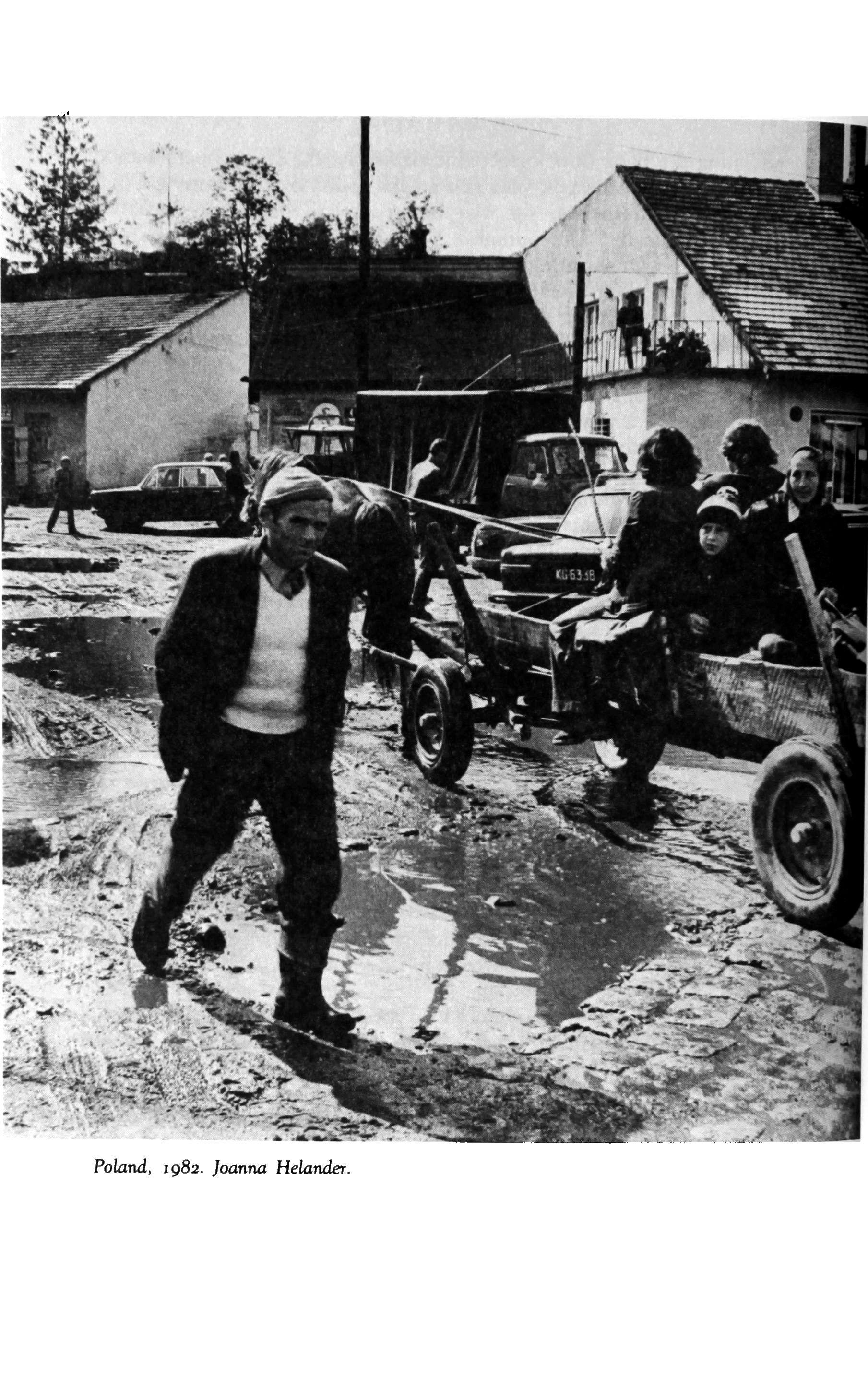 Poland, 1982. Joanna Helander.
Poland, 1982. Joanna Helander.
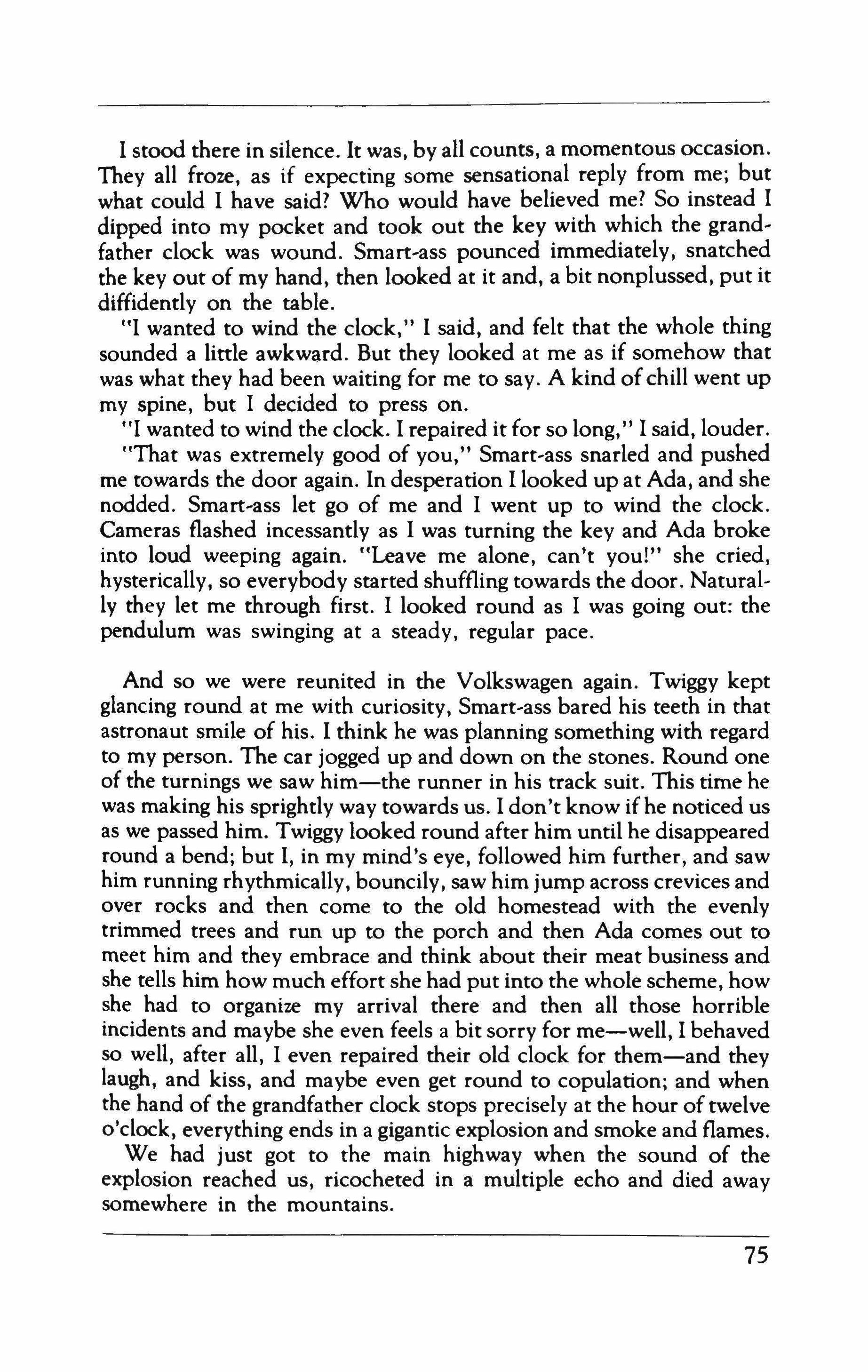
I stood there in silence. It was, by all counts, a momentous occasion. They all froze, as if expecting some sensational reply from me; but what could I have said? Who would have believed me? So instead I dipped into my pocket and took out the key with which the grand, father clock was wound. Smart-ass pounced immediately, snatched the key out of my hand, then looked at it and, a bit nonplussed, put it diffidently on the table.
"I wanted to wind the clock," I said, and felt that the whole thing sounded a little awkward. But they looked at me as if somehow that was what they had been waiting for me to say. A kind ofchill went up my spine, but I decided to press on.
"I wanted to wind the clock. I repaired it for so long," I said, louder.
"That was extremely good of you," Smart-ass snarled and pushed me towards the door again. In desperation I looked up at Ada, and she nodded. Smart-ass let go of me and I went up to wind the clock. Cameras flashed incessantly as I was turning the key and Ada broke into loud weeping again. "Leave me alone, can't you!" she cried, hysterically, so everybody started shuffling towards the door. Natural, ly they let me through first. I looked round as I was going out: the pendulum was swinging at a steady, regular pace.
And so we were reunited in the Volkswagen again. Twiggy kept glancing round at me with curiosity, Smart-ass bared his teeth in that astronaut smile of his. I think he was planning something with regard to my person. The car jogged up and down on the stones. Round one of the turnings we saw him-the runner in his track suit. This time he was making his sprightly way towards us. I don't know if he noticed us as we passed him. Twiggy looked round after him until he disappeared round a bend; but I, in my mind's eye, followed him further, and saw him running rhythmically, bouncily, saw him jump across crevices and over rocks and then come to the old homestead with the evenly trimmed trees and run up to the porch and then Ada comes out to meet him and they embrace and think about their meat business and she tells him how much effort she had put into the whole scheme, how she had to organize my arrival there and then all those horrible incidents and maybe she even feels a bit sorry for me-well, I behaved so well, after all, I even repaired their old clock for them-and they laugh, and kiss, and maybe even get round to copulation; and when the hand of the grandfather clock stops precisely at the hour of twelve o'clock, everything ends in a gigantic explosion and smoke and flames.
We had just got to the main highway when the sound of the explosion reached us, ricocheted in a multiple echo and died away somewhere in the mountains.
75

"What the hell was that?" inquired Twiggy with customary curiosity.
"Nothing," said Smart-ass, "There's a quarry just over there."
"I thought it was an explosion."
"Well, right, there's a quarry there."
"What I'm trying to say is, it sounded like an explosion."
"Exactly. There's a quarry there."
"Oh, fuck it." Twiggy got slightly unnerved. "I'd be better off talking to a brick wall. Goddam intellectuals," he added, but much more quietly.
I smiled, judging their argument to be particularly irrelevant.
Translated by Konrad Brodzinski
76
Linocut by Leszek Sobocki.
Czarnoleka
Janusz Anderman
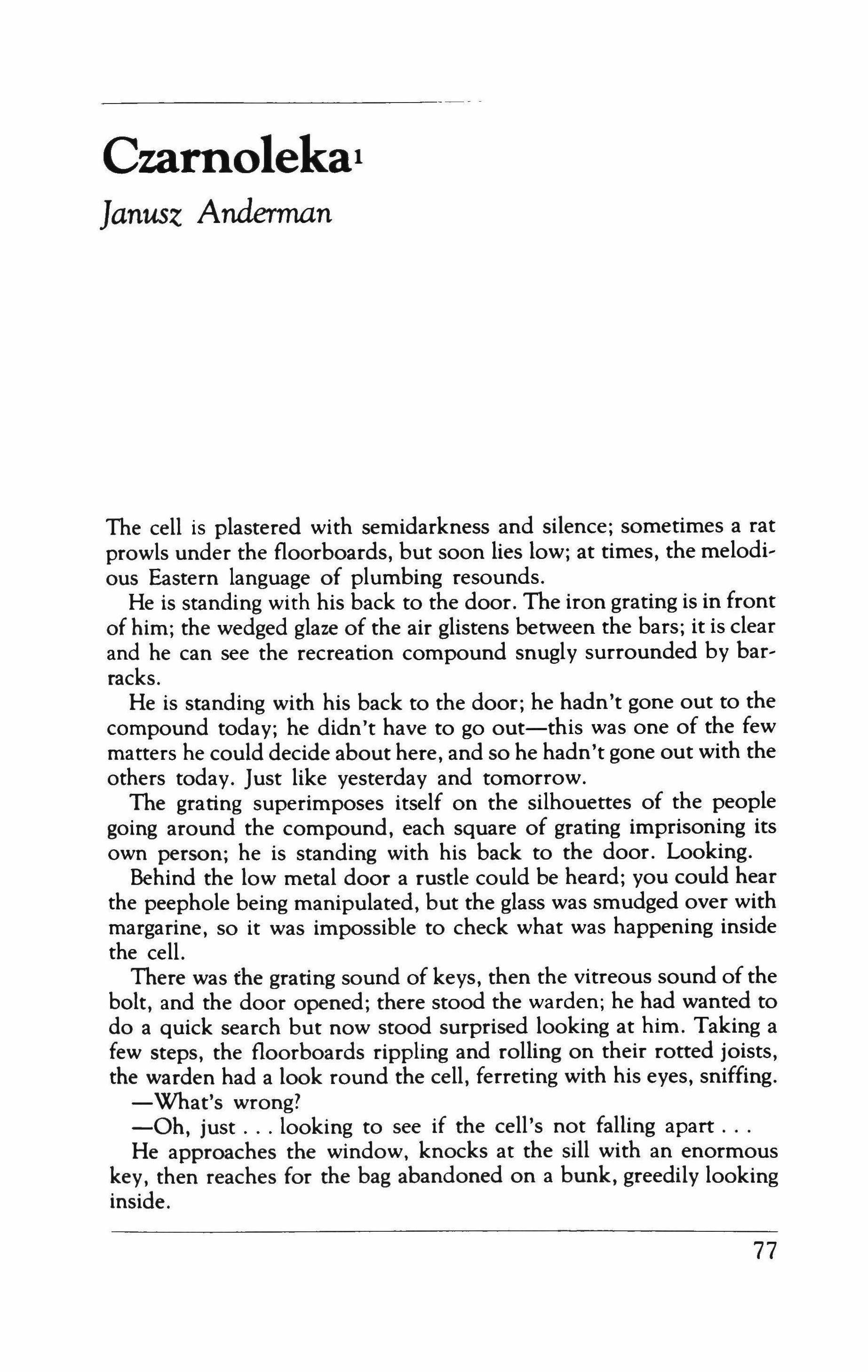
The cell is plastered with semidarkness and silence; sometimes a rat prowls under the floorboards, but soon lies low; at times, the melodious Eastern language of plumbing resounds.
He is standing with his back to the door. The iron grating is in front of him; the wedged glaze of the air glistens between the bars; it is clear and he can see the recreation compound snugly surrounded by bar' racks.
He is standing with his back to the door; he hadn't gone out to the compound today; he didn't have to go out-this was one of the few matters he could decide about here, and so he hadn't gone out with the others today. Just like yesterday and tomorrow.
The grating superimposes itself on the silhouettes of the people going around the compound, each square of grating imprisoning its own person; he is standing with his back to the door. Looking.
Behind the low metal door a rustle could be heard; you could hear the peephole being manipulated, but the glass was smudged over with margarine, so it was impossible to check what was happening inside the cell.
There was the grating sound of keys, then the vitreous sound of the bolt, and the door opened; there stood the warden; he had wanted to do a quick search but now stood surprised looking at him. Taking a few steps, the floorboards rippling and rolling on their rotted joists, the warden had a look round the cell, ferreting with his eyes, sniffing.
- What's wrong?
-Oh, just looking to see if the cell's not falling apart
He approaches the window, knocks at the sill with an enormous key, then reaches for the bag abandoned on a bunk, greedily looking inside.
77
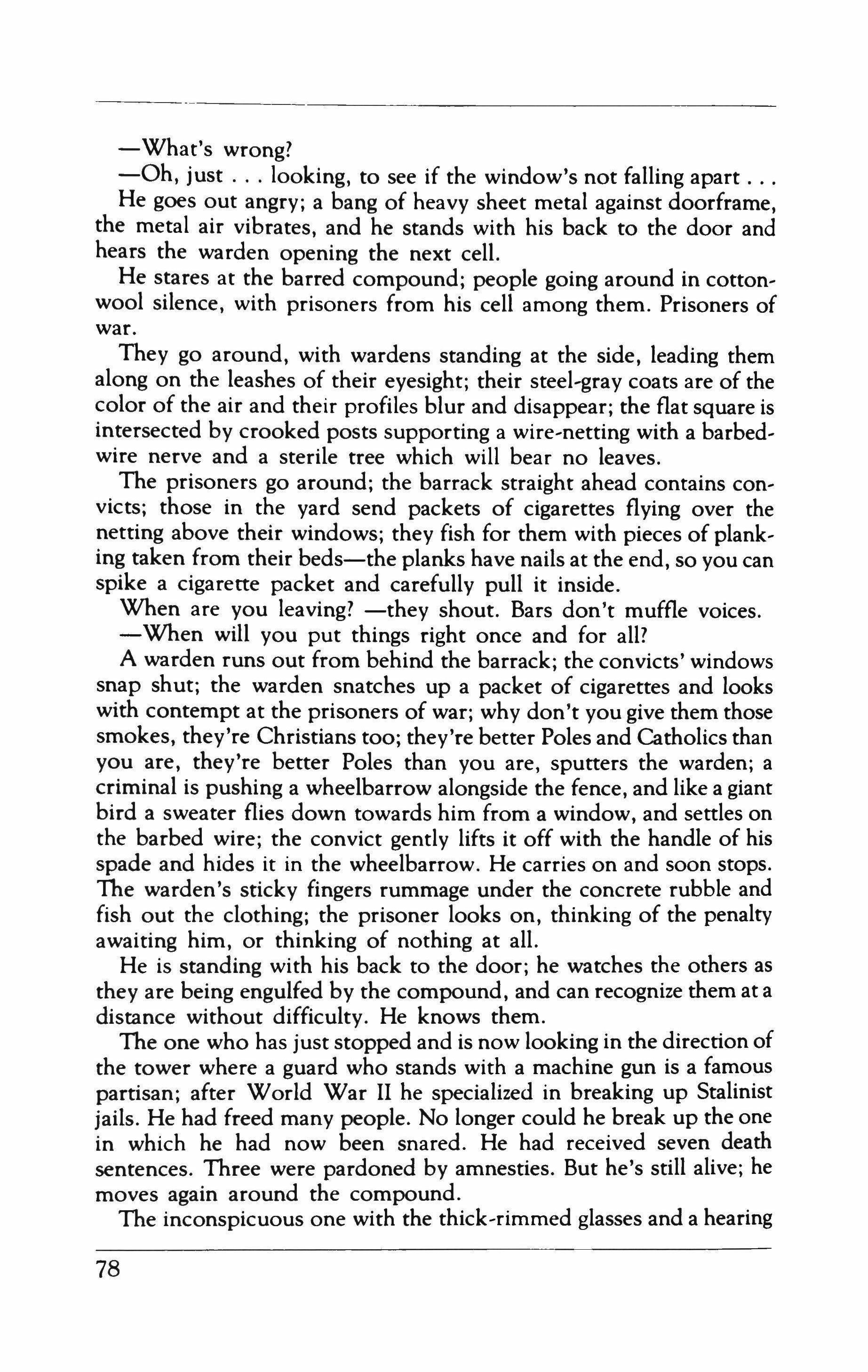
- What's wrong?
-Oh, just looking, to see if the window's not falling apart
He goes out angry; a bang of heavy sheet metal against doorframe, the metal air vibrates, and he stands with his back to the door and hears the warden opening the next cell.
He stares at the barred compound; people going around in cottonwool silence, with prisoners from his cell among them. Prisoners of war.
They go around, with wardens standing at the side, leading them along on the leashes of their eyesight; their steel-gray coats are of the color of the air and their profiles blur and disappear; the flat square is intersected by crooked posts supporting a wire-netting with a barbedwire nerve and a sterile tree which will bear no leaves.
The prisoners go around; the barrack straight ahead contains convicts; those in the yard send packets of cigarettes flying over the netting above their windows; they fish for them with pieces of planking taken from their beds-the planks have nails at the end, so you can spike a cigarette packet and carefully pull it inside.
When are you leaving? -they shout. Bars don't muffle voices.
- When will you put things right once and for all?
A warden runs out from behind the barrack; the convicts' windows snap shut; the warden snatches up a packet of cigarettes and looks with contempt at the prisoners of war; why don't you give them those smokes, they're Christians too; they're better Poles and Catholics than you are, they're better Poles than you are, sputters the warden; a criminal is pushing a wheelbarrow alongside the fence, and like a giant bird a sweater flies down towards him from a window, and settles on the barbed wire; the convict gently lifts it off with the handle of his spade and hides it in the wheelbarrow. He carries on and soon stops. The warden's sticky fingers rummage under the concrete rubble and fish out the clothing; the prisoner looks on, thinking of the penalty awaiting him, or thinking of nothing at all.
He is standing with his back to the door; he watches the others as they are being engulfed by the compound, and can recognize them at a distance without difficulty. He knows them.
The one who has just stopped and is now looking in the direction of the tower where a guard who stands with a machine gun is a famous partisan; after World War II he specialized in breaking up Stalinist jails. He had freed many people. No longer could he break up the one in which he had now been snared. He had received seven death sentences. Three were pardoned by amnesties. But he's still alive; he moves again around the compound.
The inconspicuous one with the thick-rimmed glasses and a hearing
78
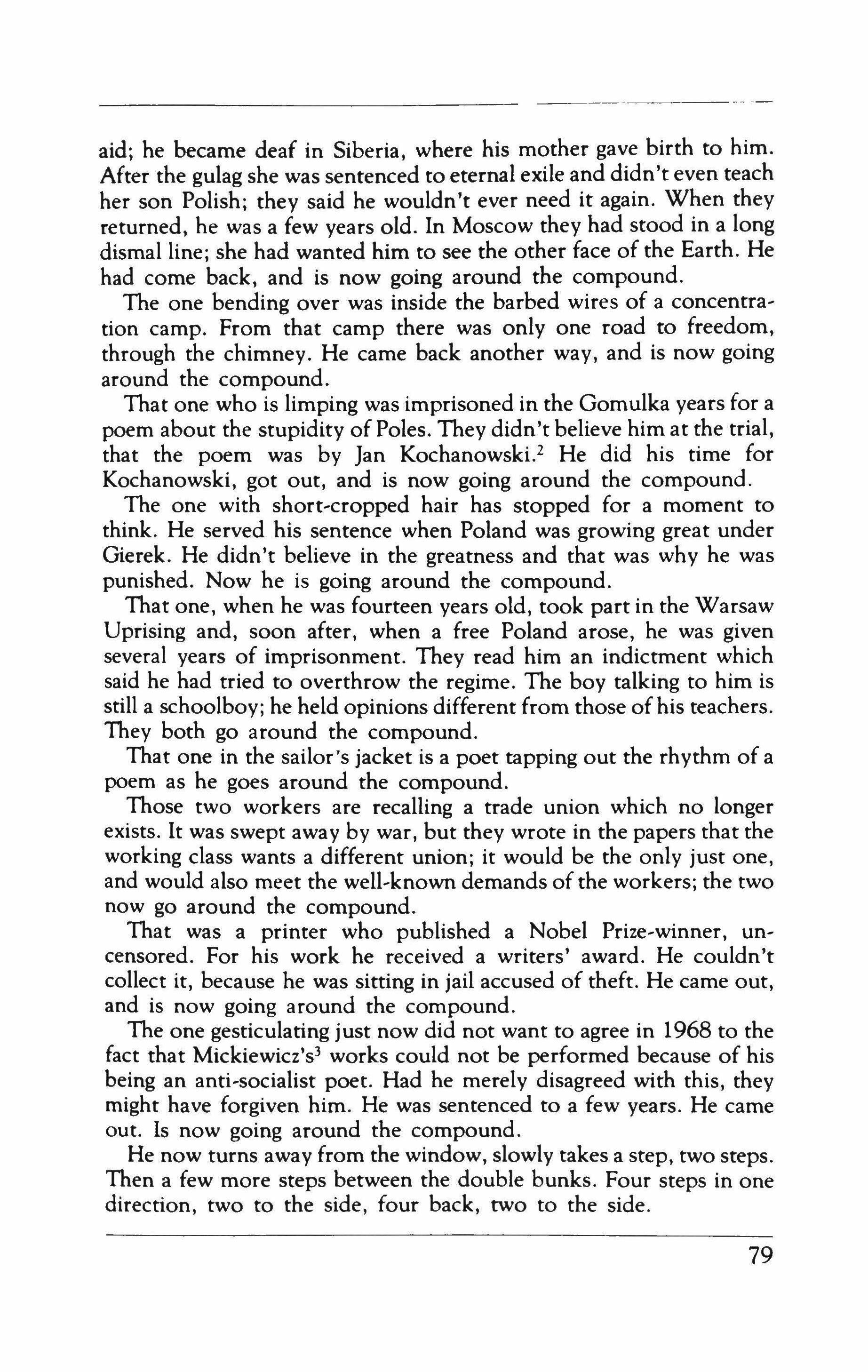
aid; he became deaf in Siberia, where his mother gave birth to him. After the gulag she was sentenced to eternal exile and didn't even teach her son Polish; they said he wouldn't ever need it again. When they returned, he was a few years old. In Moscow they had stood in a long dismal line; she had wanted him to see the other face of the Earth. He had come back, and is now going around the compound.
The one bending over was inside the barbed wires of a concentration camp. From that camp there was only one road to freedom, through the chimney. He came back another way, and is now going around the compound.
That one who is limping was imprisoned in the Gomulka years for a poem about the stupidity of Poles. They didn't believe him at the trial, that the poem was by Jan Kochanowski.? He did his time for Kochanowski, got out, and is now going around the compound.
The one with short-cropped hair has stopped for a moment to think. He served his sentence when Poland was growing great under Gierek. He didn't believe in the greatness and that was why he was punished. Now he is going around the compound.
That one, when he was fourteen years old, took part in the Warsaw Uprising and, soon after, when a free Poland arose, he was given several years of imprisonment. They read him an indictment which said he had tried to overthrow the regime. The boy talking to him is still a schoolboy; he held opinions different from those of his teachers. They both go around the compound.
That one in the sailor's jacket is a poet tapping out the rhythm of a poem as he goes around the compound.
Those two workers are recalling a trade union which no longer exists. It was swept away by war, but they wrote in the papers that the working class wants a different union; it would be the only just one, and would also meet the well-known demands of the workers; the two now go around the compound.
That was a printer who published a Nobel Prize-winner, uncensored. For his work he received a writers' award. He couldn't collect it, because he was sitting in jail accused of theft. He came out, and is now going around the compound.
The one gesticulating just now did not want to agree in 1968 to the fact that Mickiewicz's! works could not be performed because of his being an anti-socialist poet. Had he merely disagreed with this, they might have forgiven him. He was sentenced to a few years. He came out. Is now going around the compound.
He now turns away from the window, slowly takes a step, two steps. Then a few more steps between the double bunks. Four steps in one direction, two to the side, four back, two to the side.
79
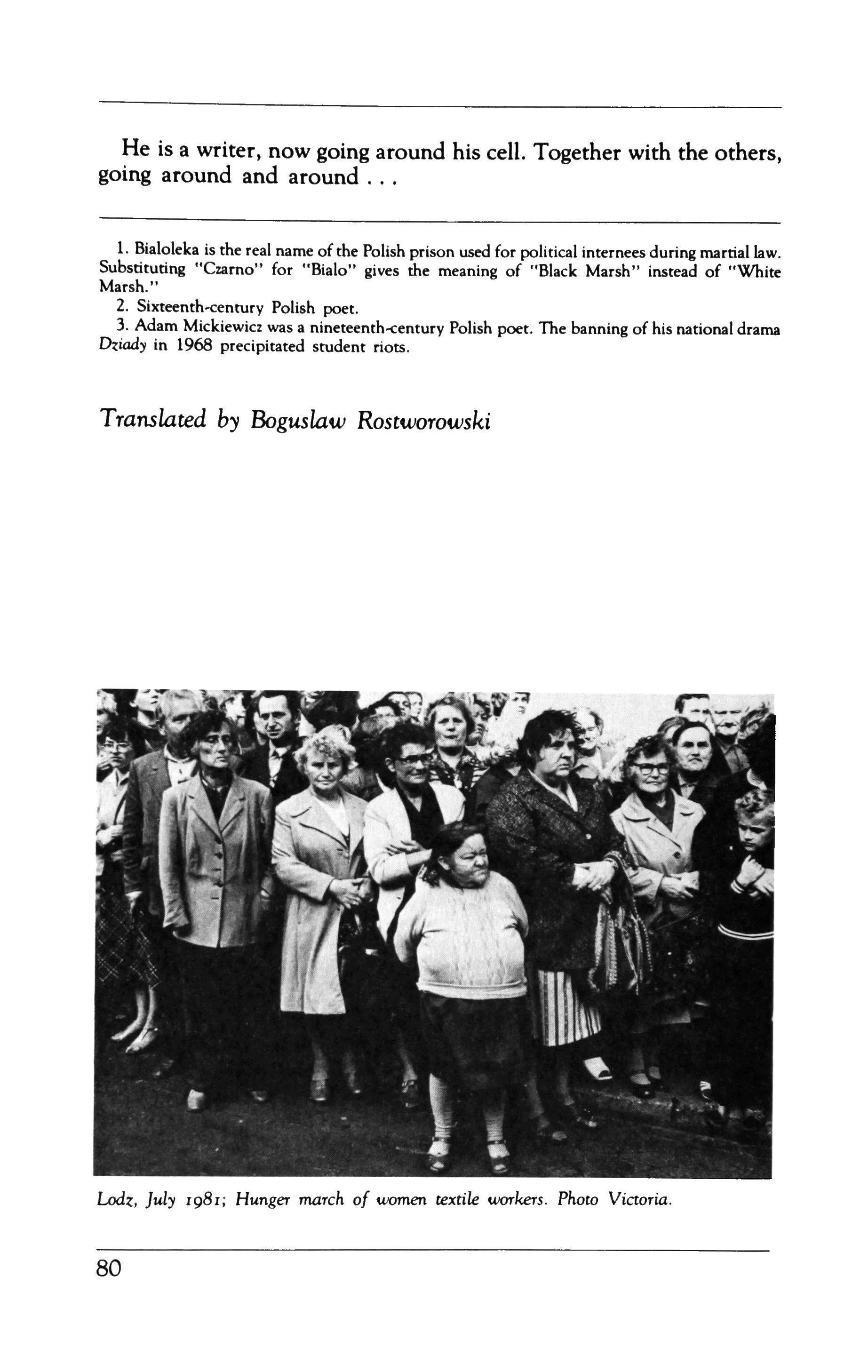
He is a writer, now going around his cell. Together with the others, going around and around
1. Bialoleka is the real name of the Polish prison used for political internees during martial law. Substituting "Czarno" for "Bialo" gives the meaning of "Black Marsh" instead of "White Marsh."
2. Sixteenth-century Polish poet.
3. Adam Mickiewicz was a nineteenth-century Polish poet. The banning of his national drama Dziady in 1968 precipitated student riots.
Translated by Boguslaw Rostworowski
80
Lodz, July 1981; Hunger march of women textile workers. Phow Victoria.
Day of cloud and fog
Janusz Anderman
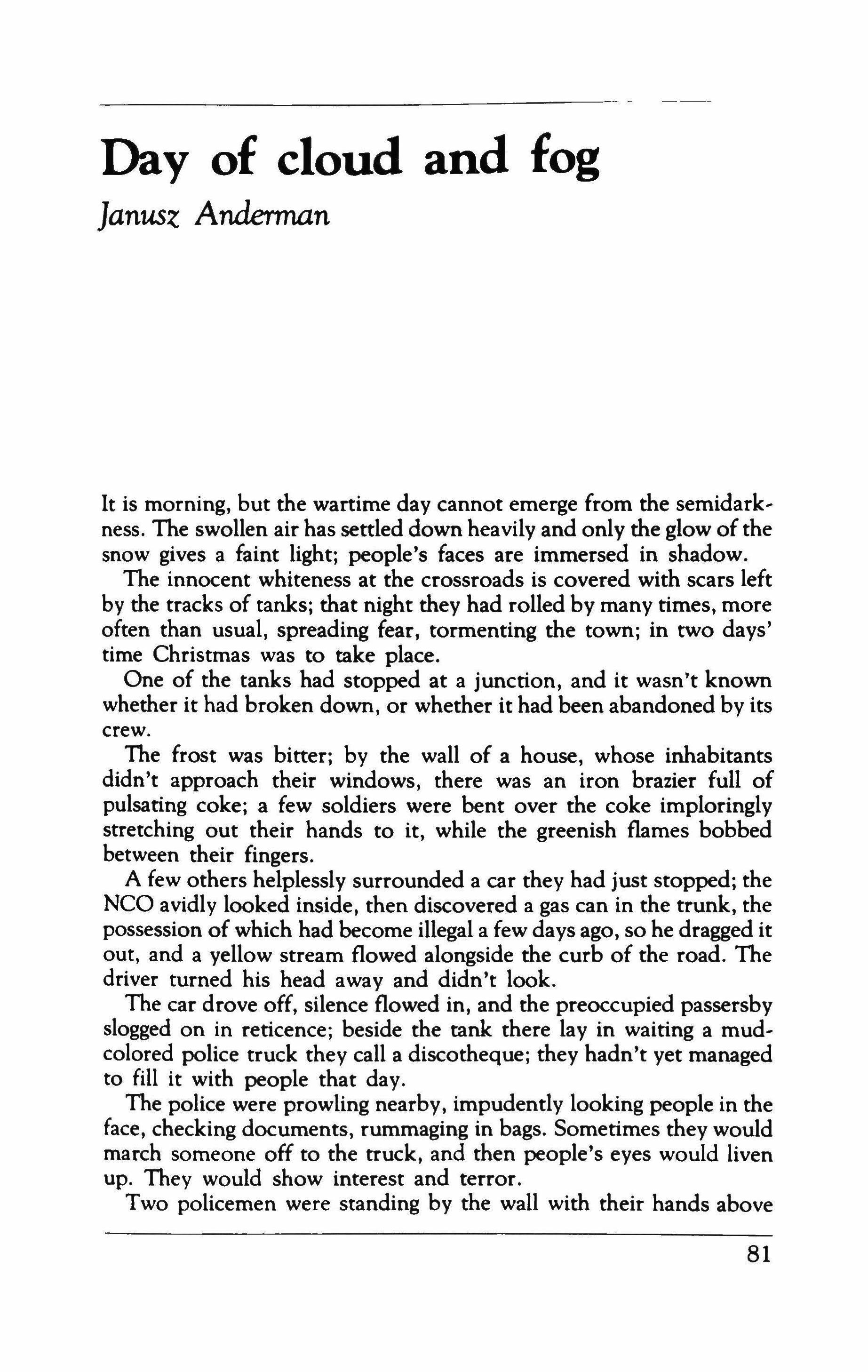
It is morning, but the wartime day cannot emerge from the semidarkness. The swollen air has settled down heavily and only the glow of the snow gives a faint light; people's faces are immersed in shadow.
The innocent whiteness at the crossroads is covered with scars left by the tracks of tanks; that night they had rolled by many times, more often than usual, spreading fear, tormenting the town; in two days' time Christmas was to take place.
One of the tanks had stopped at a junction, and it wasn't known whether it had broken down, or whether it had been abandoned by its crew.
The frost was bitter; by the wall of a house, whose inhabitants didn't approach their windows, there was an iron brazier full of pulsating coke; a few soldiers were bent over the coke imploringly stretching out their hands to it, while the greenish flames bobbed between their fingers.
A few others helplessly surrounded a car they had just stopped; the NCO avidly looked inside, then discovered a gas can in the trunk, the possession of which had become illegal a few days ago, so he dragged it out, and a yellow stream flowed alongside the curb of the road. The driver turned his head away and didn't look.
The car drove off, silence flowed in, and the preoccupied passersby slogged on in reticence; beside the tank there lay in waiting a mud, colored police truck they call a discotheque; they hadn't yet managed to fill it with people that day.
The police were prowling nearby, impudently looking people in the face, checking documents, rummaging in bags. Sometimes they would march someone off to the truck, and then people's eyes would liven up. They would show interest and terror.
Two policemen were standing by the wall with their hands above
81
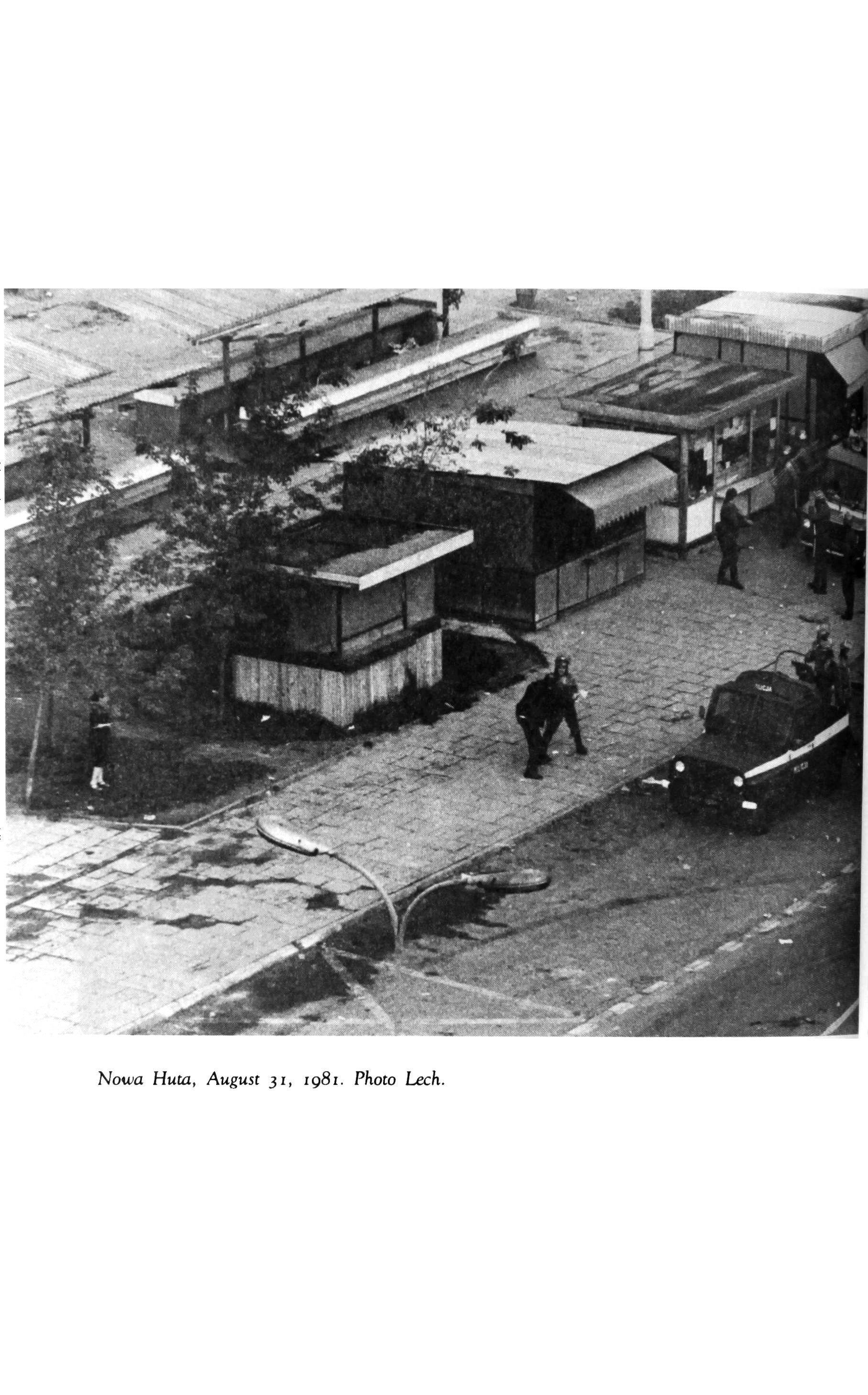 Nowa Huta, August 3 I, 198 I. Photo Lech.
Nowa Huta, August 3 I, 198 I. Photo Lech.
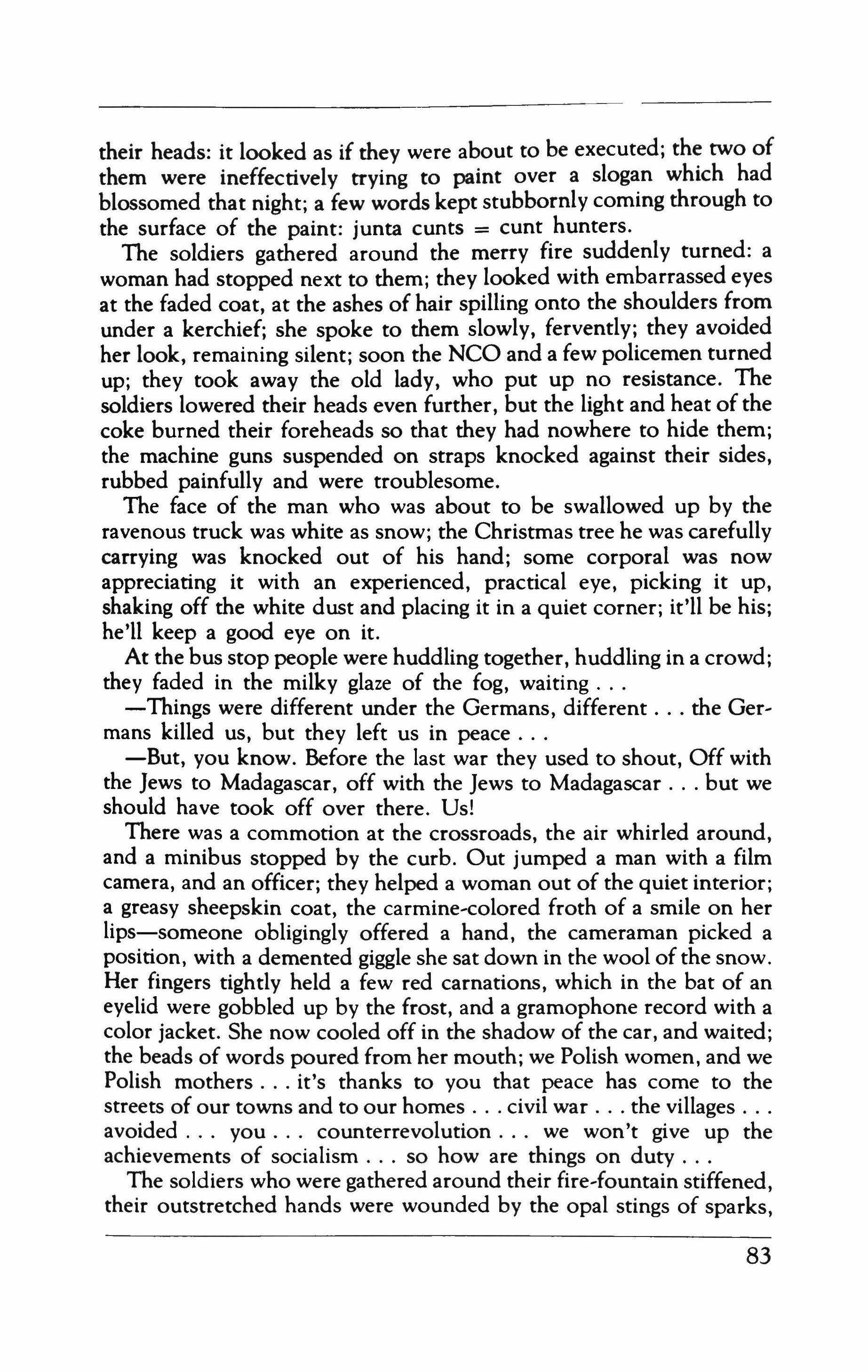
their heads: it looked as if they were about to be executed; the two of them were ineffectively trying to paint over a slogan which had blossomed that night; a few words kept stubbornly coming through to the surface of the paint: junta cunts cunt hunters.
The soldiers gathered around the merry fire suddenly turned: a woman had stopped next to them; they looked with embarrassed eyes at the faded coat, at the ashes of hair spilling onto the shoulders from under a kerchief; she spoke to them slowly, fervently; they avoided her look, remaining silent; soon the NCO and a few policemen turned up; they took away the old lady, who put up no resistance. The soldiers lowered their heads even further, but the light and heat of the coke burned their foreheads so that they had nowhere to hide them; the machine guns suspended on straps knocked against their sides, rubbed painfully and were troublesome.
The face of the man who was about to be swallowed up by the ravenous truck was white as snow; the Christmas tree he was carefully carrying was knocked out of his hand; some corporal was now appreciating it with an experienced, practical eye, picking it up, shaking off the white dust and placing it in a quiet corner; it'll be his; he'll keep a good eye on it.
At the bus stop people were huddling together, huddling in a crowd; they faded in the milky glaze of the fog, waiting
- Things were different under the Germans, different the Germans killed us, but they left us in peace
-But, you know. Before the last war they used to shout, Off with the Jews to Madagascar, off with the Jews to Madagascar but we should have took off over there. Us!
There was a commotion at the crossroads, the air whirled around, and a minibus stopped by the curb. Out jumped a man with a film camera, and an officer; they helped a woman out of the quiet interior; a greasy sheepskin coat, the carmine-colored froth of a smile on her lips-someone obligingly offered a hand, the cameraman picked a position, with a demented giggle she sat down in the wool of the snow. Her fingers tightly held a few red carnations, which in the bat of an eyelid were gobbled up by the frost, and a gramophone record with a color jacket. She now cooled off in the shadow of the car, and waited; the beads of words poured from her mouth; we Polish women, and we Polish mothers it's thanks to you that peace has come to the streets of our towns and to our homes civil war the villages avoided you counterrevolution we won't give up the achievements of socialism so how are things on duty
The soldiers who were gathered around their fire-fountain stiffened, their outstretched hands were wounded by the opal stings of sparks,
83
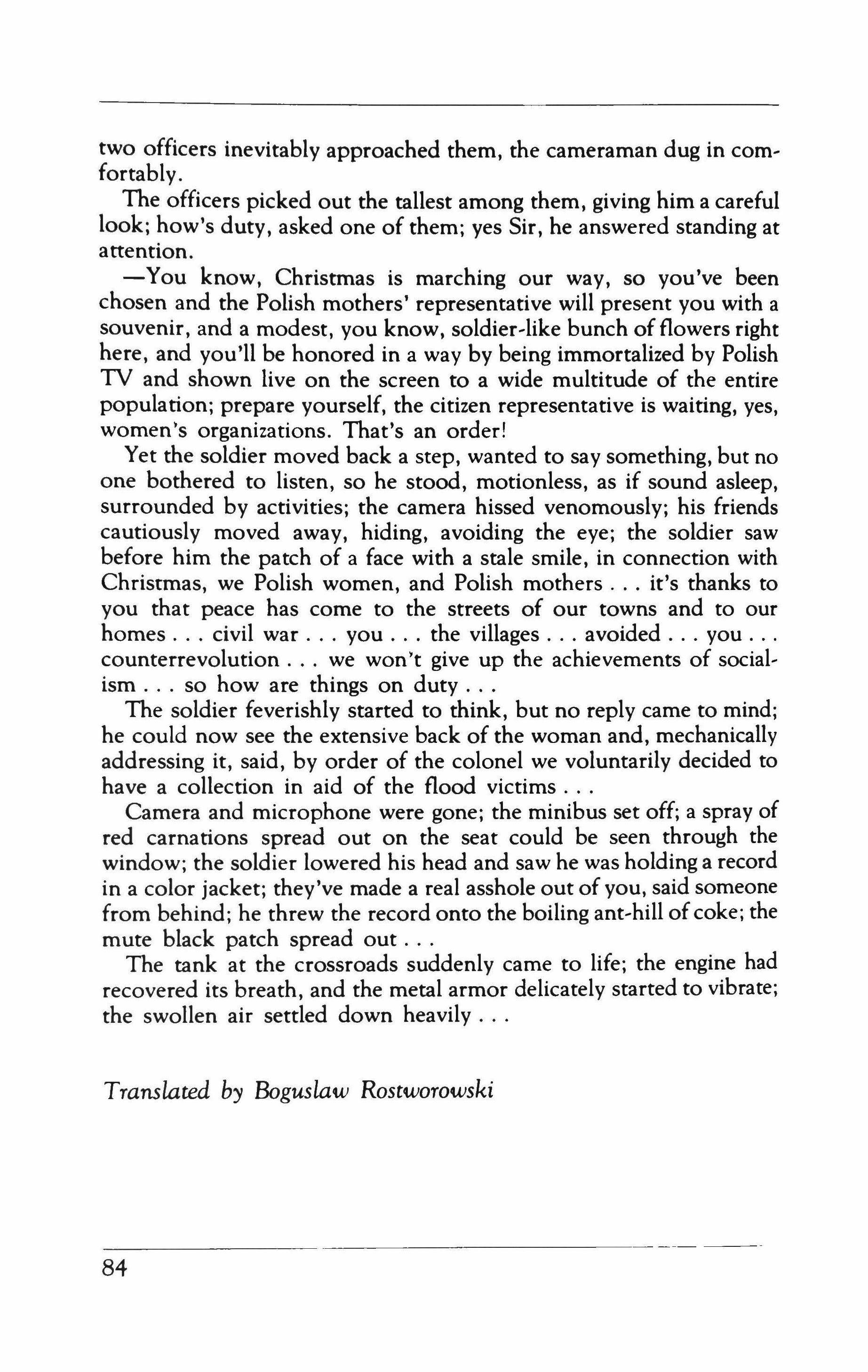
two officers inevitably approached them, the cameraman dug in cornfortably.
The officers picked out the tallest among them, giving him a careful look; how's duty, asked one of them; yes Sir, he answered standing at attention.
-You know, Christmas is marching our way, so you've been chosen and the Polish mothers' representative will present you with a souvenir, and a modest, you know, soldier-like bunch of flowers right here, and you'll be honored in a way by being immortalized by Polish TV and shown live on the screen to a wide multitude of the entire population; prepare yourself, the citizen representative is waiting, yes, women's organizations. That's an order!
Yet the soldier moved back a step, wanted to say something, but no one bothered to listen, so he stood, motionless, as if sound asleep, surrounded by activities; the camera hissed venomously; his friends cautiously moved away, hiding, avoiding the eye; the soldier saw before him the patch of a face with a stale smile, in connection with Christmas, we Polish women, and Polish mothers it's thanks to you that peace has come to the streets of our towns and to our homes civil war you the villages avoided you counterrevolution we won't give up the achievements of socialism so how are things on duty
The soldier feverishly started to think, but no reply came to mind; he could now see the extensive back of the woman and, mechanically addressing it, said, by order of the colonel we voluntarily decided to have a collection in aid of the flood victims
Camera and microphone were gone; the minibus set off; a spray of red carnations spread out on the seat could be seen through the window; the soldier lowered his head and saw he was holding a record in a color jacket; they've made a real asshole out of you, said someone from behind; he threw the record onto the boiling ant-hill ofcoke; the mute black patch spread out
The tank at the crossroads suddenly came to life; the engine had recovered its breath, and the metal armor delicately started to vibrate; the swollen air settled down heavily
Translated by Boguslaw Rostworowski
84
Three poems from Diary of internment (Darlowko, 1982)
Wiktor Woroszylski

The belly of Barbara N.
In the dark warm shelter carefully vaulted out of the body and blood of this young woman there is hiding before the grating pursuit of the padlock before the yellow sign blocking the way before the pitfall of despair before the flaming mountain of hatred the yet unborn prisoner begotten between the release of his father and the arrest of his mother not figuring in the register of internees a future citizen and soldier of this country
Translated by Boguslaw Rostworowski
85
Just till spring
The earth
a gray prisoner in a cosmic precinct has trodden round again and returned to this sadness this autumn where the days turn yellow and fall the wind tugs at the wet wash of the fog and only a flock of cranes unlocks a gap in the sky
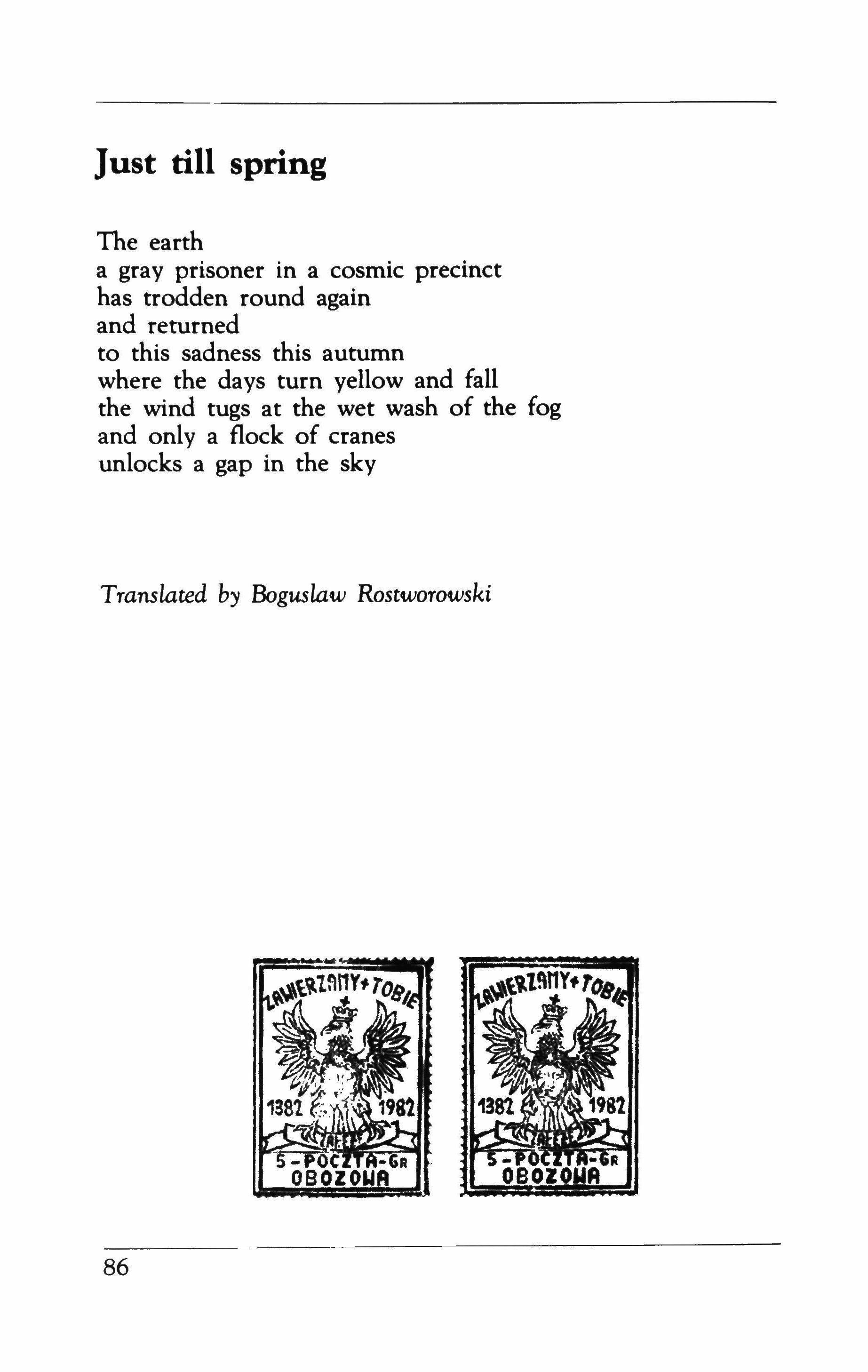 Translated by Boguslaw Rostworowski
Translated by Boguslaw Rostworowski
86
Absence
It isn't important the subsiding and the sudden galloping inside the trembling of the hands the blow on the back of the head
I rise up from this at the call of dawn
It is important the helplessness of someone faraway who every day restores his house and every day is short of that piece of wood or that old brick
The disappointment of someone who seeks support and staggers he hits upon an empty space
Someone's view from a hospital bed of swelling foliage and a bare branch
Someone's being tired with something I could bear
Someone's words stuck in the throatwell, because who for
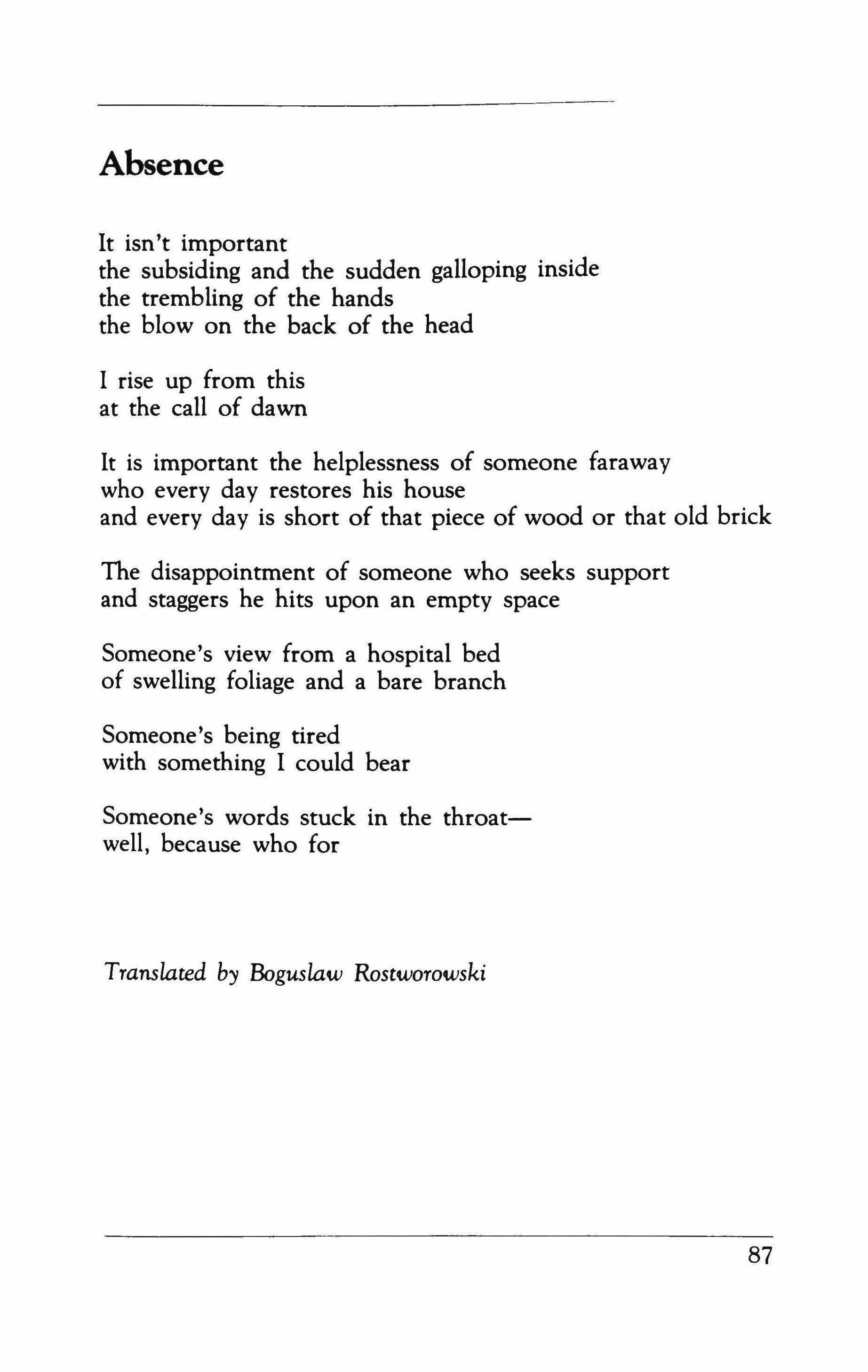 Translated
Translated
by
Boguslaw RostwOTOwski
87
Five poems
Stanislaw Baranczak
Along with the dust
Along with the dust on the books, the fingerprints on all the glass (fragiledo not drop), along with a ration coupon for sugar and a cross to bear (fragile-this side up) I'm moving along with the writing in my lap, the thousands of terms in my head (fragile-remember with care), with an extra thousand zlotys just in case (fragile-do not worry too much), along with a mask of self-confidence and a wound in my back, along with an empty promise and an ill, fitting hope (fragile-do not trust), along with maybe finally and quick hurry up, along with you can depend on it and I'm sick to death (fragile-do not die) along with let's begin at the beginning and knock on wood and what's the use, and along with this love that's all that will stay with me for better, for worse, and forever, it's fragile, you movers, and it's all a lot heavier than it looks
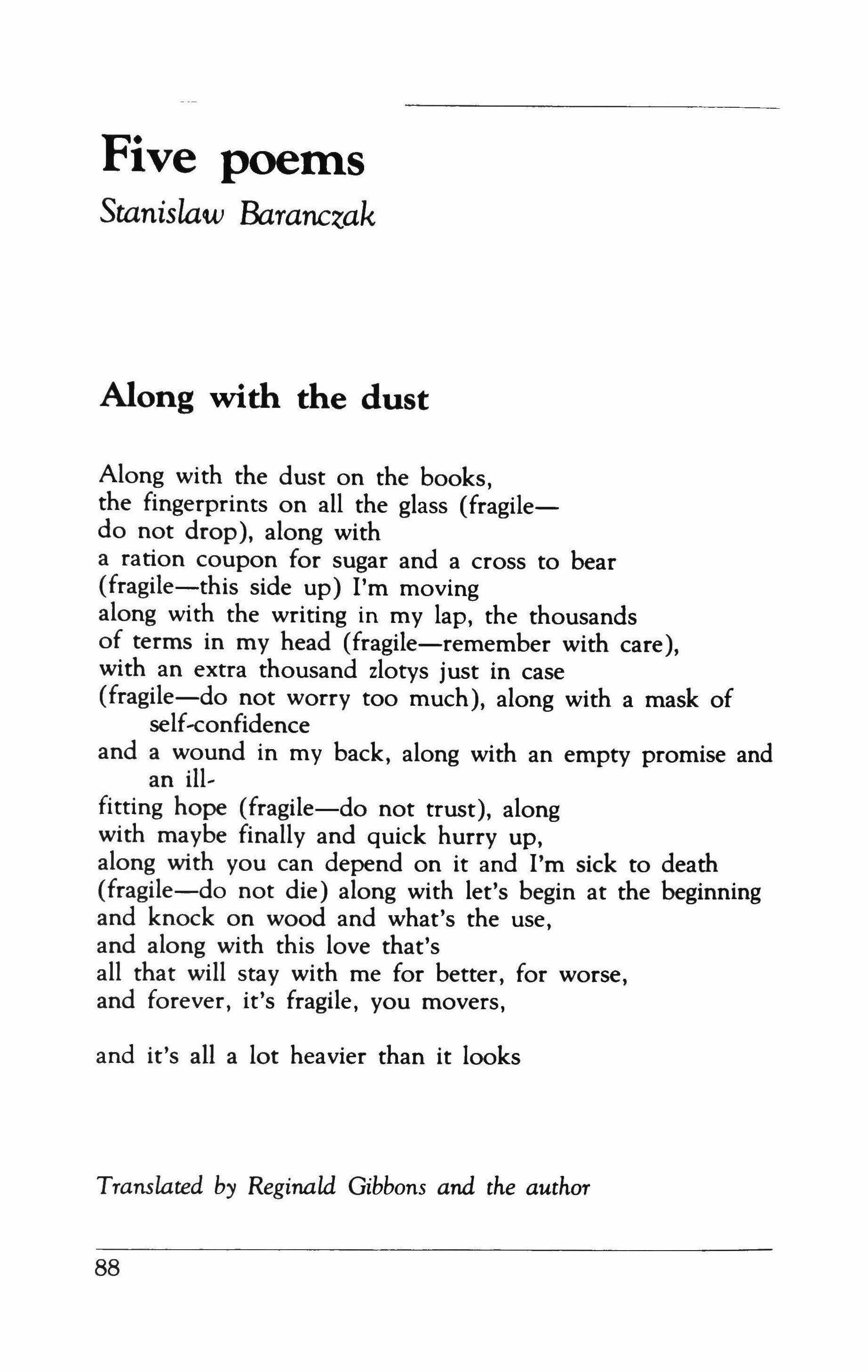 Translated by Reginald Gibbons and the author
Translated by Reginald Gibbons and the author
88
December

31, 1979: soon now
Soon now I'll get hold of myself, I'll take myself in hand, tidy up my drawer, think everything through, have my teeth filled, fill the gaps in my education, start exercising every morning, look up in the dictionary a few words whose meaning is still unclear to me, more walks with the children, a regular daily routine, answer the letters, drink milk, not spread myself too thin, work on self-improvement, in general be myself, finally be more myself, but in fact how to do this, since anyway and for a long time now I have been so very much it
Translated by Magnus ]. Krynski and Robert A. Maguire
89
January
2, 1980: Eroica
UTo seize one's fate by the throat" (Beethoven), but how to do it-neither five fingers nor five senses are enough, it can't be grasped or seized, that throat, it's not thick with muscle nor wrapped in a thin scarf, there's neither bloody roaring nor sour breath coming from it, it simply doesn't exist, that throat, and even if it did, hands are always doing something else, clapping, signing depositions, playing the accordion, carrying a net full of Christmas carp, holding a flagstaff, pushing a pram, rubbing a forehead
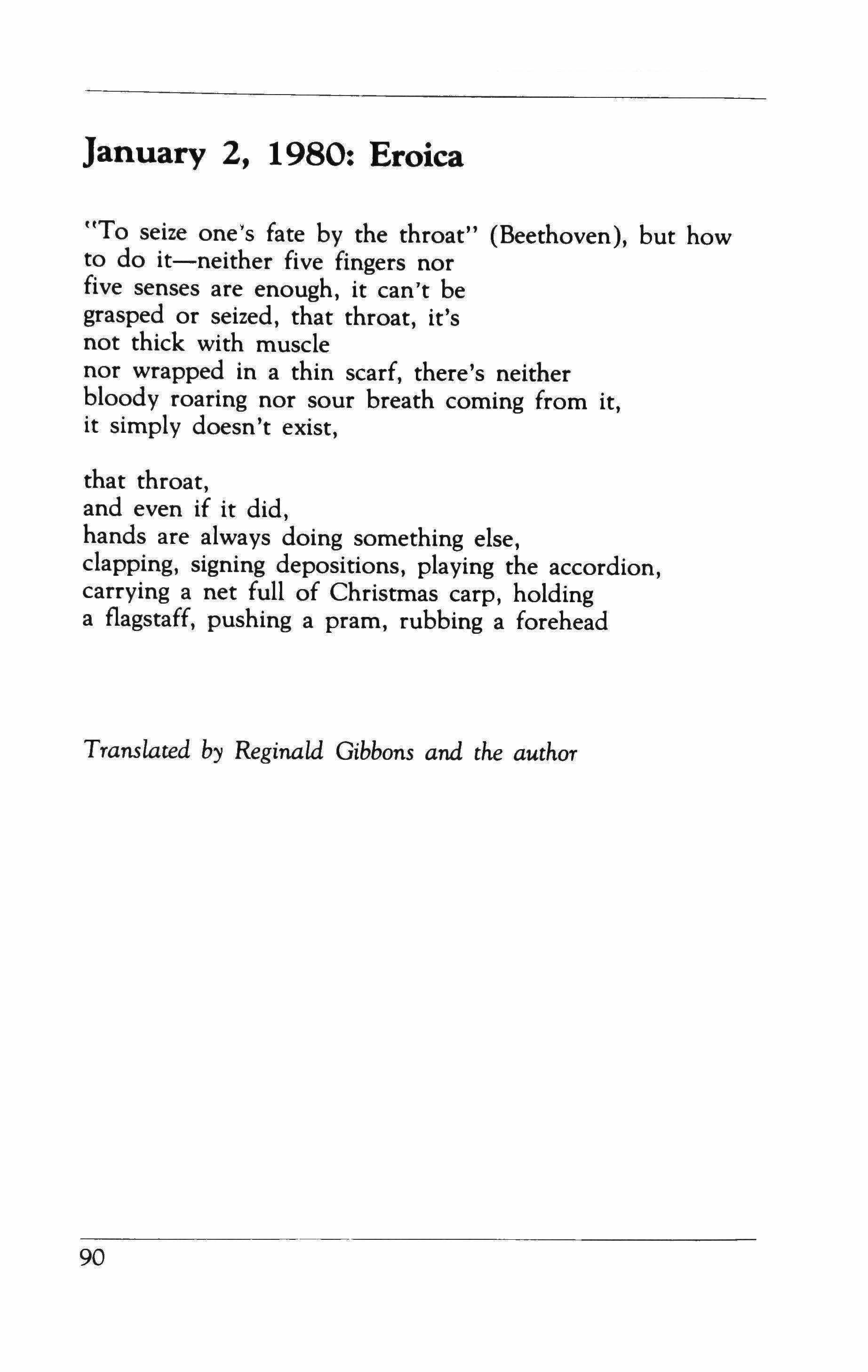
Translated by Reginald Gibbons and the author
90
March
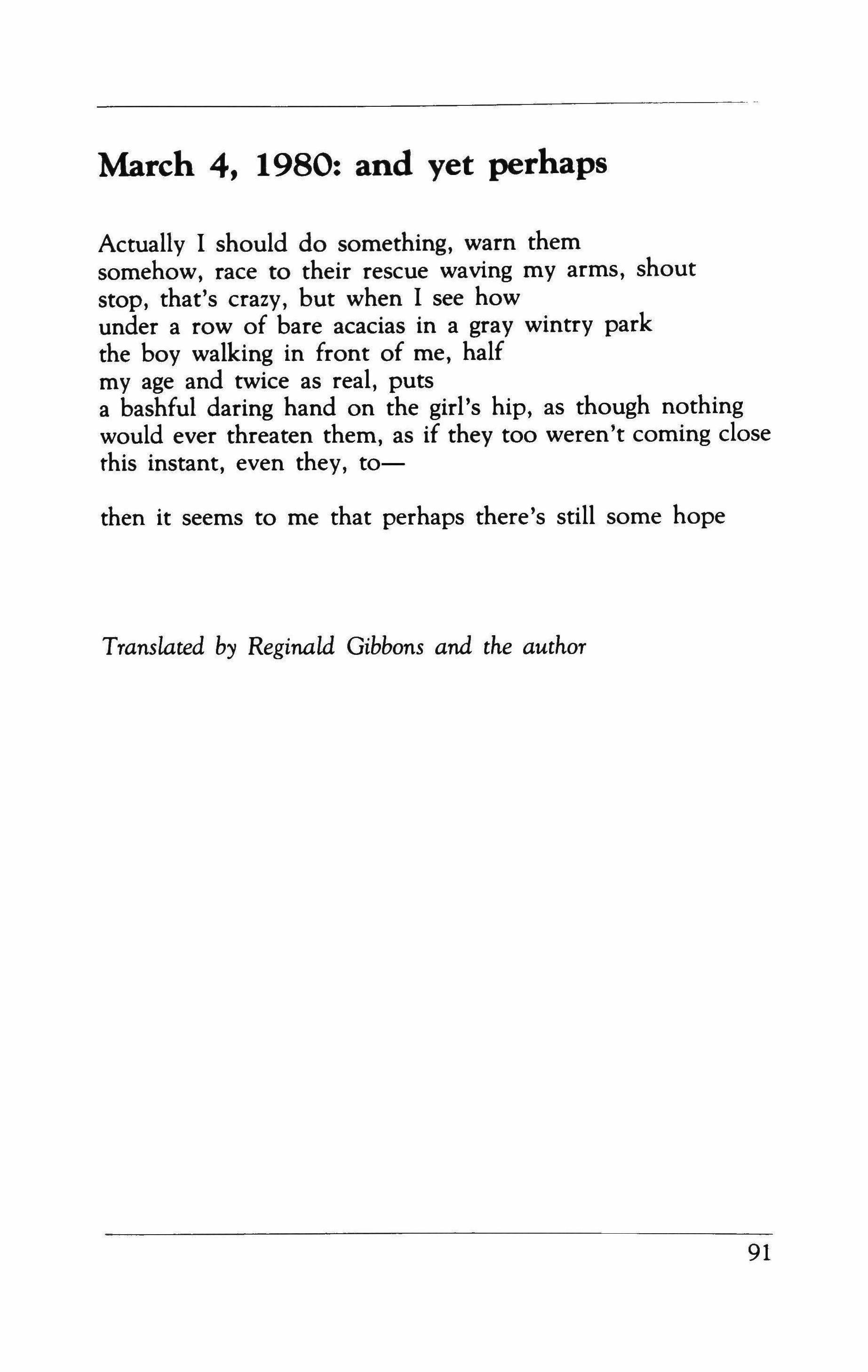
4, 1980: and yet perhaps
Actually I should do something, warn them somehow, race to their rescue waving my arms, shout stop, that's crazy, but when I see how under a row of bare acacias in a gray wintry park the boy walking in front of me, half my age and twice as real, puts a bashful daring hand on the girl's hip, as though nothing would ever threaten them, as if they too weren't corning close this instant, even they, to-
then it seems to me that perhaps there's still some hope
Translared by Reginald Gibbons and the author
91
If china
If china, then only the kind you wouldn't miss under the movers' shoes or the treads of a tank; if a chair, then one that's not too comfortable, or you'll regret getting up and leaving; if clothes, then only what will fit in one suitcase; if books, then those you know by heart; if plans, then the ones you can give up when it comes time for the next move, to another street, another continent or epoch or world: who told you you could settle in? who told you this or that would last forever? didn't anyone tell you you'll never in the world feel at home here?
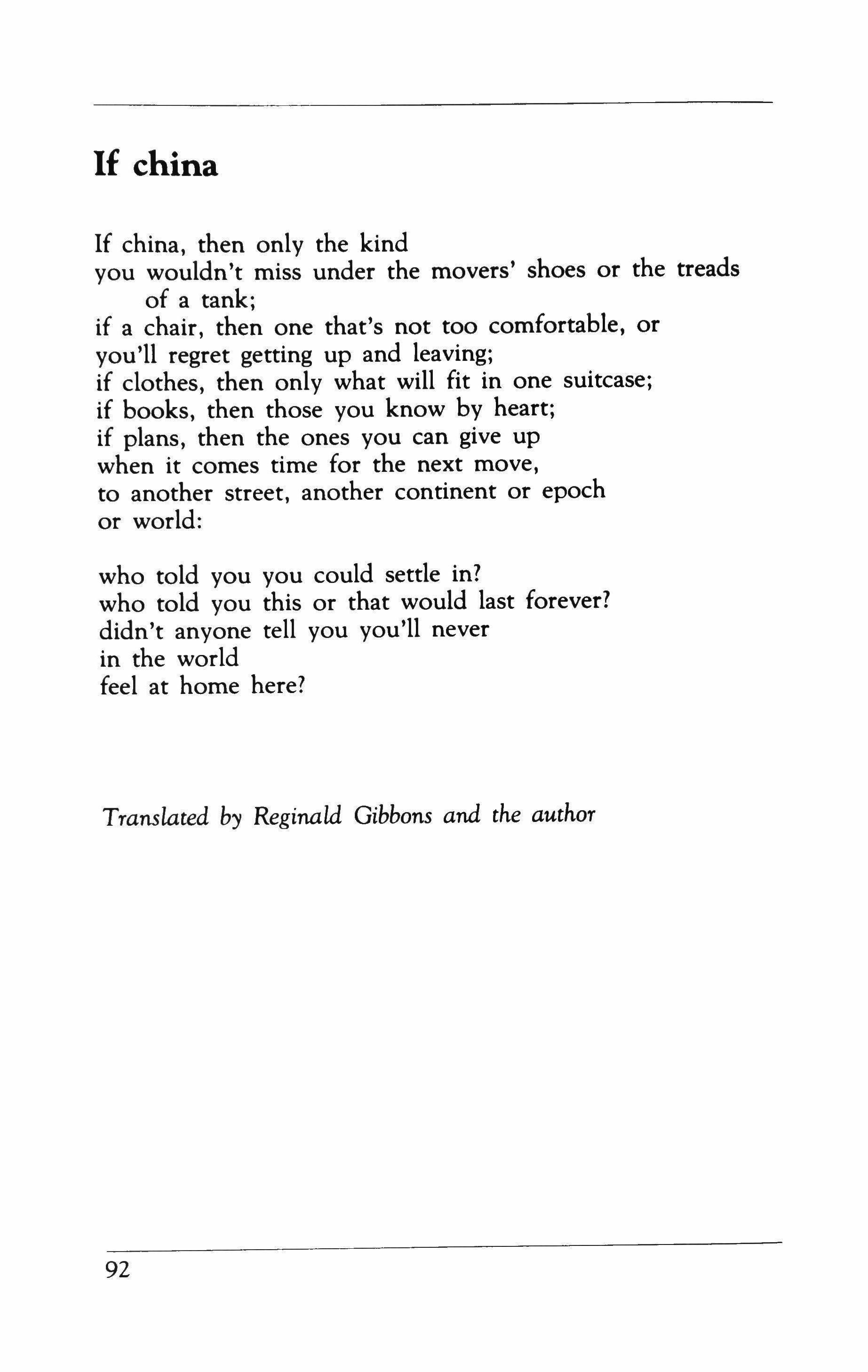 Translated by Reginald Gibbons and the author
Translated by Reginald Gibbons and the author
92
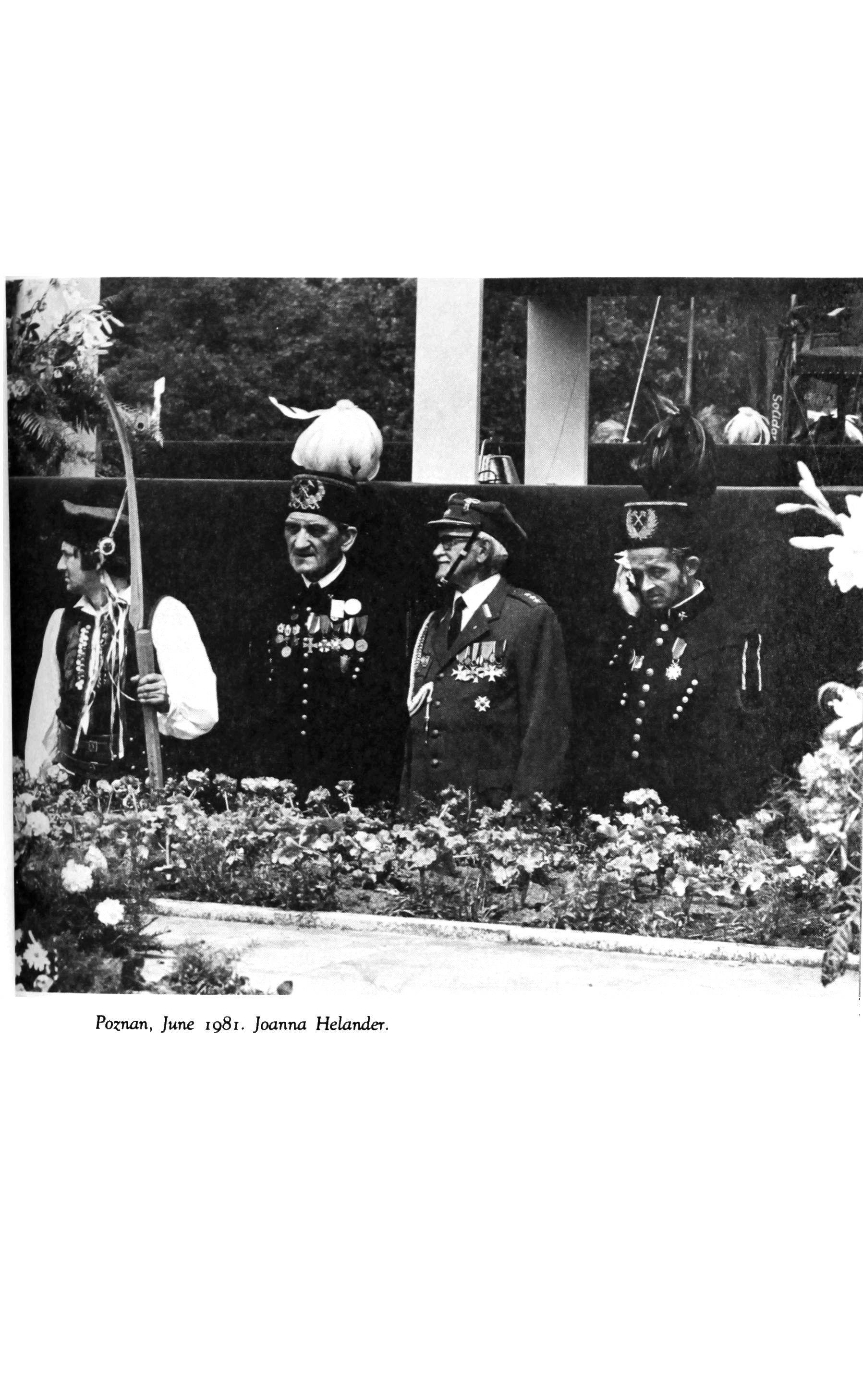 1981. Joanna Helander. Poznan, June
1981. Joanna Helander. Poznan, June
From. A Warsaw diary: 1978-1981
Kazjmierz Brandys
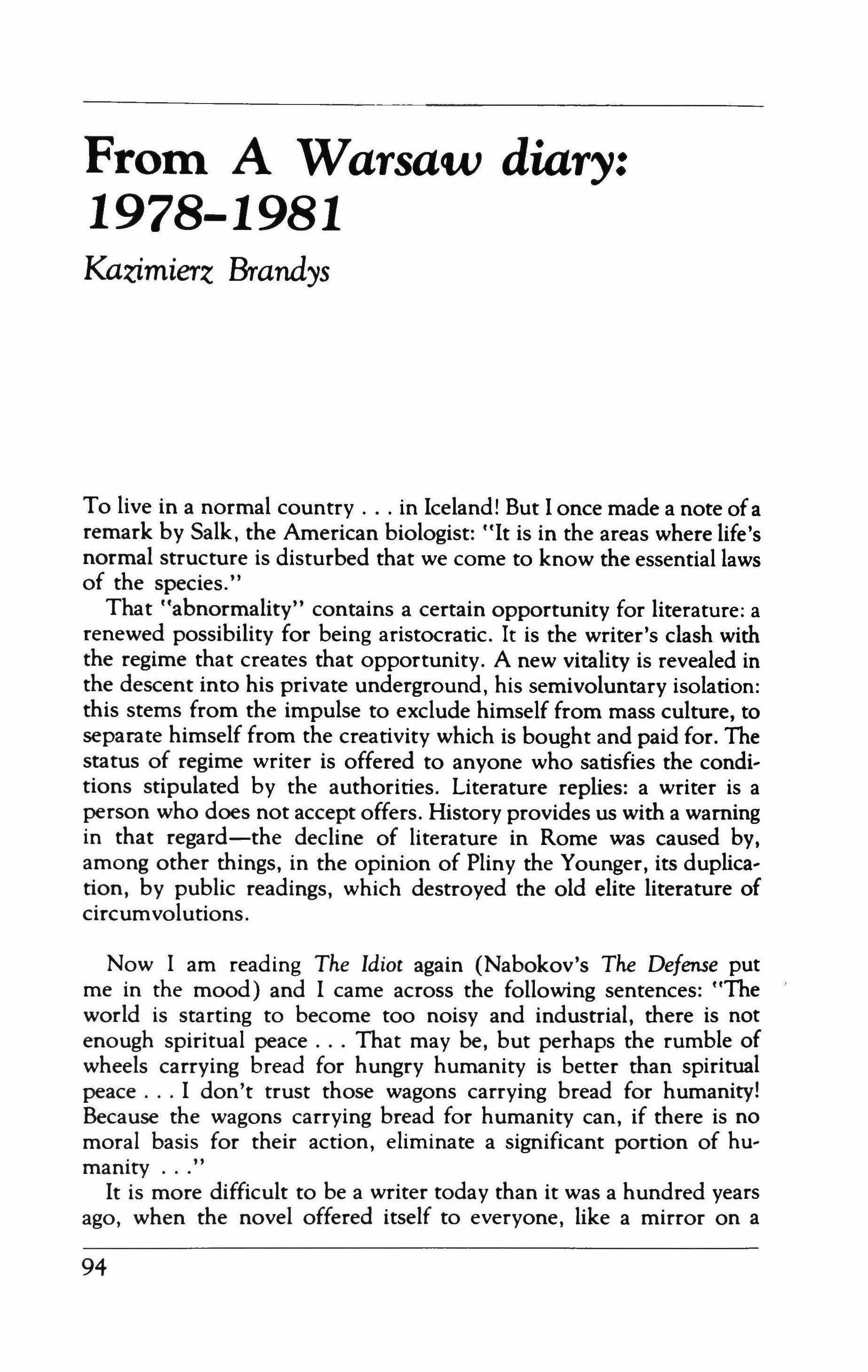
To live in a normal country in Iceland! But I once made a note of a remark by Salk. the American biologist: "It is in the areas where life's normal structure is disturbed that we come to know the essential laws of the species."
That "abnormality" contains a certain opportunity for literature: a renewed possibility for being aristocratic. It is the writer's clash with the regime that creates that opportunity. A new vitality is revealed in the descent into his private underground, his semivoluntary isolation: this stems from the impulse to exclude himself from mass culture, to separate himself from the creativity which is bought and paid for. The status of regime writer is offered to anyone who satisfies the conditions stipulated by the authorities. Literature replies: a writer is a person who does not accept offers. History provides us with a warning in that regard-the decline of literature in Rome was caused by, among other things, in the opinion of Pliny the Younger, its duplication, by public readings, which destroyed the old elite literature of circumvolutions.
Now I am reading The Idiot again (Nabokov's The Defense put me in the mood) and I came across the following sentences: "The world is starting to become too noisy and industrial, there is not enough spiritual peace That may be, but perhaps the rumble of wheels carrying bread for hungry humanity is better than spiritual peace I don't trust those wagons carrying bread for humanity! Because the wagons carrying bread for humanity can, if there is no moral basis for their action, eliminate a significant portion of humanity
It is more difficult to be a writer today than it was a hundred years ago, when the novel offered itself to everyone, like a mirror on a
94
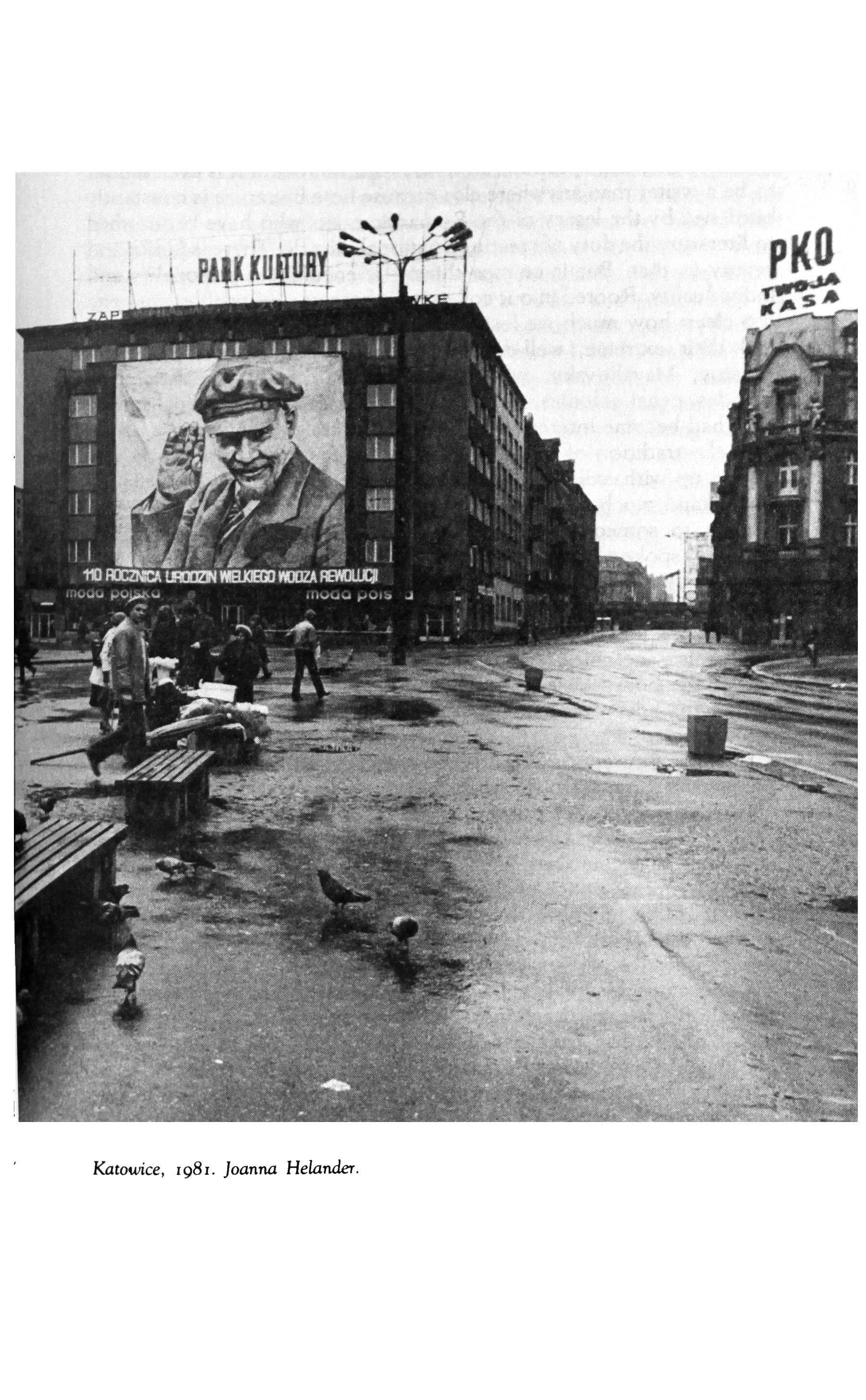 Katowice, 1981. Joanna Helander.
Katowice, 1981. Joanna Helander.
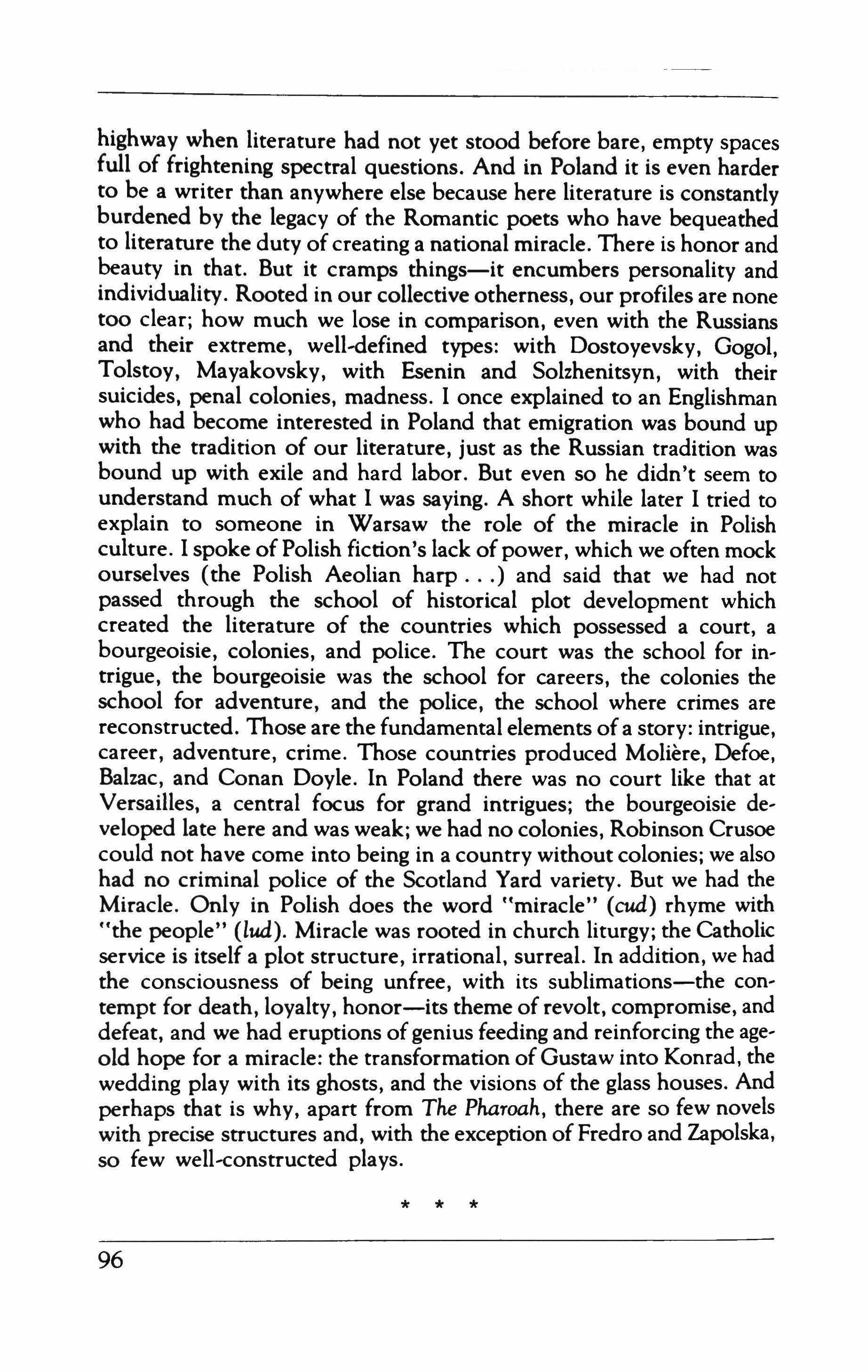
highway when literature had not yet stood before bare, empty spaces full of frightening spectral questions. And in Poland it is even harder to be a writer than anywhere else because here literature is constantly burdened by the legacy of the Romantic poets who have bequeathed to literature the duty of creating a national miracle. There is honor and beauty in that. But it cramps things-it encumbers personality and individuality. Rooted in our collective otherness, our profiles are none too clear; how much we lose in comparison, even with the Russians and their extreme, well-defined types: with Dostoyevsky, Gogol, Tolstoy, Mayakovsky, with Esenin and Solzhenitsyn, with their suicides, penal colonies, madness. I once explained to an Englishman who had become interested in Poland that emigration was bound up with the tradition of our literature, just as the Russian tradition was bound up with exile and hard labor. But even so he didn't seem to understand much of what I was saying. A short while later I tried to explain to someone in Warsaw the role of the miracle in Polish culture. I spoke of Polish fiction's lack of power, which we often mock ourselves (the Polish Aeolian harp ) and said that we had not passed through the school of historical plot development which created the literature of the countries which possessed a court, a bourgeoisie, colonies, and police. The court was the school for in, trigue, the bourgeoisie was the school for careers, the colonies the school for adventure, and the police, the school where crimes are reconstructed. Those are the fundamental elements of a story: intrigue, career, adventure, crime. Those countries produced Moliere, Defoe, Balzac, and Conan Doyle. In Poland there was no court like that at Versailles, a central focus for grand intrigues; the bourgeoisie de' veloped late here and was weak; we had no colonies, Robinson Crusoe could not have come into being in a country without colonies; we also had no criminal police of the Scotland Yard variety. But we had the Miracle. Only in Polish does the word "miracle" (cud) rhyme with "the people" (lud). Miracle was rooted in church liturgy; the Catholic service is itself a plot structure, irrational, surreal. In addition, we had the consciousness of being unfree, with its sublimations-the con' tempt for death, loyalty, honor-its theme of revolt, compromise, and defeat, and we had eruptions ofgenius feeding and reinforcing the age, old hope for a miracle: the transformation of Gustaw into Konrad, the wedding play with its ghosts, and the visions of the glass houses. And perhaps that is why, apart from The Pharoah, there are so few novels with precise structures and, with the exception of Fredro and Zapolska, so few well-consrructed plays.
* * * 96
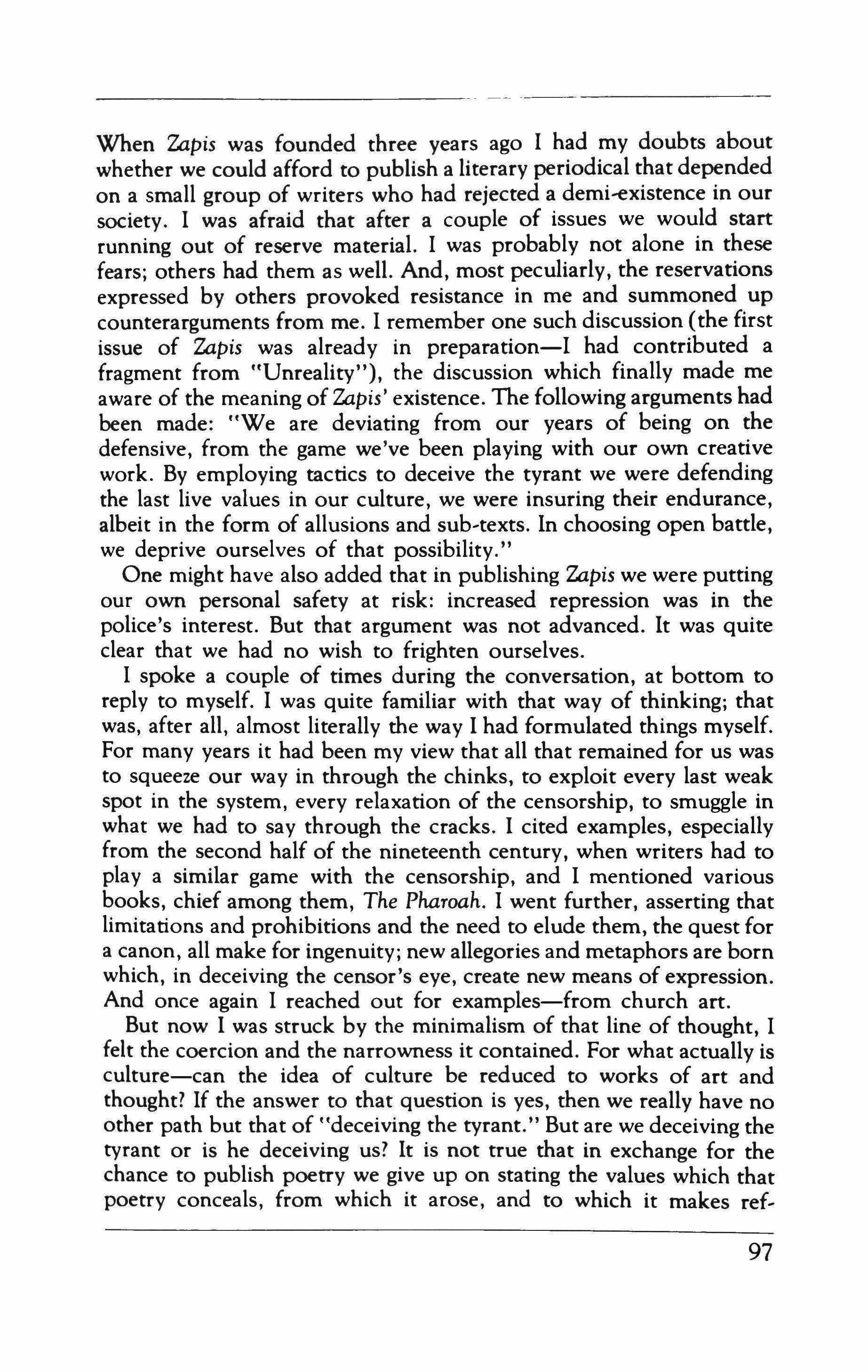
When Zapis was founded three years ago I had my doubts about whether we could afford to publish a literary periodical that depended on a small group of writers who had rejected a demi-existence in our society. I was afraid that after a couple of issues we would start running out of reserve material. I was probably not alone in these fears; others had them as well. And, most peculiarly, the reservations expressed by others provoked resistance in me and summoned up counterarguments from me. I remember one such discussion (the first issue of Zapis was already in preparation-I had contributed a fragment from "Unreality"), the discussion which finally made me aware of the meaning of Zapis' existence. The following arguments had been made: "We are deviating from our years of being on the defensive, from the game we've been playing with our own creative work. By employing tactics to deceive the tyrant we were defending the last live values in our culture, we were insuring their endurance, albeit in the form of allusions and sub-texts. In choosing open battle, we deprive ourselves of that possibility."
One might have also added that in publishing ZaPis we were putting our own personal safety at risk: increased repression was in the police's interest. But that argument was not advanced. It was quite clear that we had no wish to frighten ourselves.
I spoke a couple of times during the conversation, at bottom to reply to myself. I was quite familiar with that way of thinking; that was, after all, almost literally the way I had formulated things myself. For many years it had been my view that all that remained for us was to squeeze our way in through the chinks, to exploit every last weak spot in the system, every relaxation of the censorship, to smuggle in what we had to say through the cracks. I cited examples, especially from the second half of the nineteenth century, when writers had to playa similar game with the censorship, and I mentioned various books, chief among them, The Pharoah. I went further, asserting that limitations and prohibitions and the need to elude them, the quest for a canon, all make for ingenuity; new allegories and metaphors are born which, in deceiving the censor's eye, create new means of expression. And once again I reached out for examples-from church art.
But now I was struck by the minimalism of that line of thought, I felt the coercion and the narrowness it contained. For what actually is culture-can the idea of culture be reduced to works of art and thought? If the answer to that question is yes, then we really have no other path but that of "deceiving the tyrant." But are we deceiving the tyrant or is he deceiving us? It is not true that in exchange for the chance to publish poetry we give up on stating the values which that poetry conceals, from which it arose, and to which it makes ref-
97
erence If that is the case then one may suspect that we are paying too high a price. We are paying for the unwritten with the written. There are moments when the unwritten values create the culture. Perhaps those are only the moments of tension and crisis, a situation in which the boundaries of everyday endurance must be overstepped and the rules of the game broken. Then the majority ofexamples from the history of literature are useless and one must appeal to other ones. The unwritten ones. To acts and attitudes which have not been anthologized but are a part of the collective imagination impregnating it with their gestures, scenes, faces.
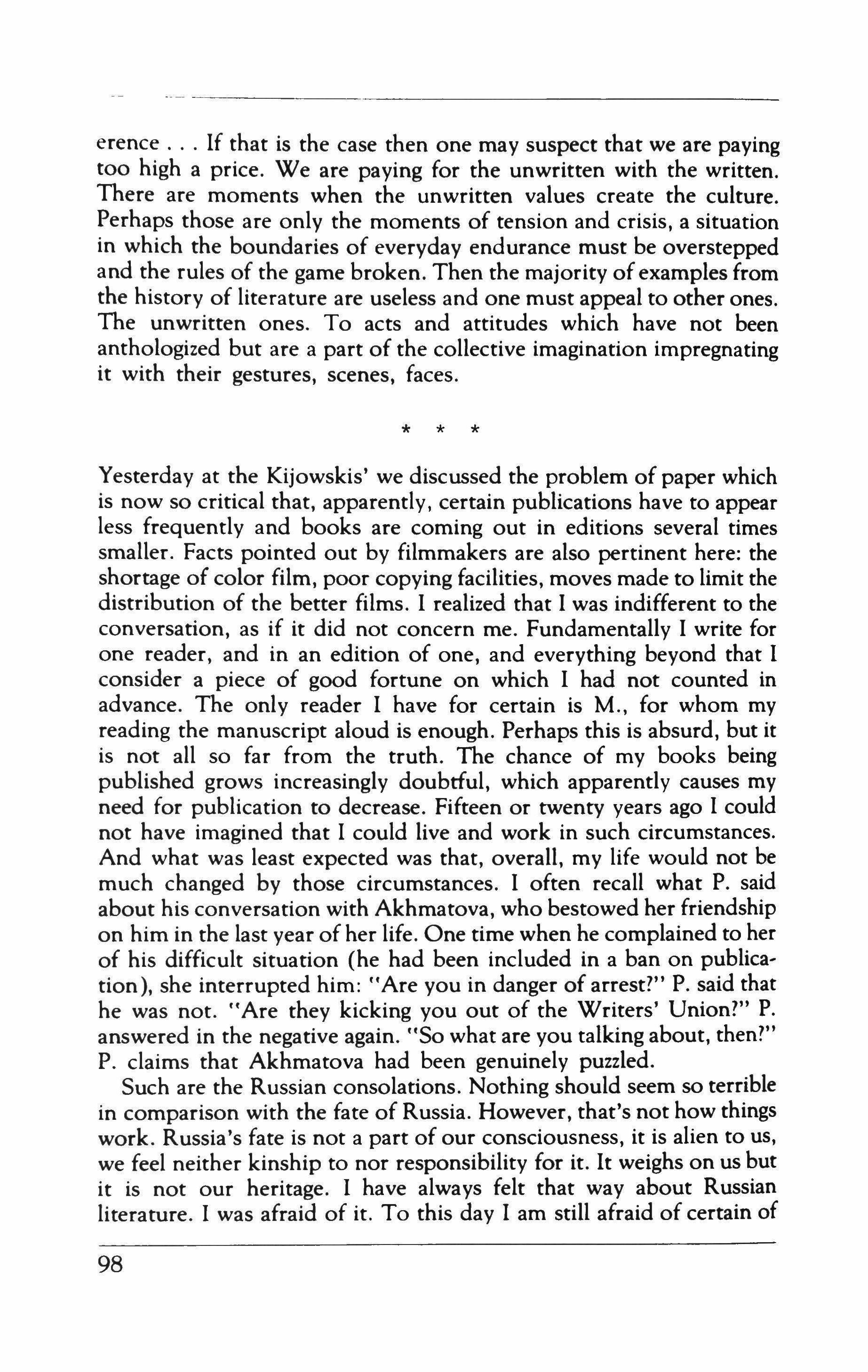
Yesterday at the Kijowskis' we discussed the problem of paper which is now so critical that, apparently, certain publications have to appear less frequently and books are coming out in editions several times smaller. Facts pointed out by filmmakers are also pertinent here: the shortage of color film, poor copying facilities, moves made to limit the distribution of the better films. I realized that I was indifferent to the conversation, as if it did not concern me. Fundamentally I write for one reader, and in an edition of one, and everything beyond that I consider a piece of good fortune on which I had not counted in advance. The only reader I have for certain is M., for whom my reading the manuscript aloud is enough. Perhaps this is absurd, but it is not all so far from the truth. The chance of my books being published grows increasingly doubtful, which apparently causes my need for publication to decrease. Fifteen or twenty years ago I could not have imagined that I could live and work in such circumstances. And what was least expected was that, overall, my life would not be much changed by those circumstances. I often recall what P. said about his conversation with Akhmatova, who bestowed her friendship on him in the last year of her life. One time when he complained to her of his difficult situation (he had been included in a ban on publication), she interrupted him: "Are you in danger of arrest?" P. said that he was not. "Are they kicking you out of the Writers' Union?" P. answered in the negative again. "So what are you talking about, then?" P. claims that Akhmatova had been genuinely puzzled. Such are the Russian consolations. Nothing should seem so terrible in comparison with the fate of Russia. However, that's not how things work. Russia's fate is not a part of our consciousness, it is alien to us, we feel neither kinship to nor responsibility for it. It weighs on us but it is not our heritage. I have always felt that way about Russian literature. I was afraid of it. To this day I am still afraid of certain of
* * *
98
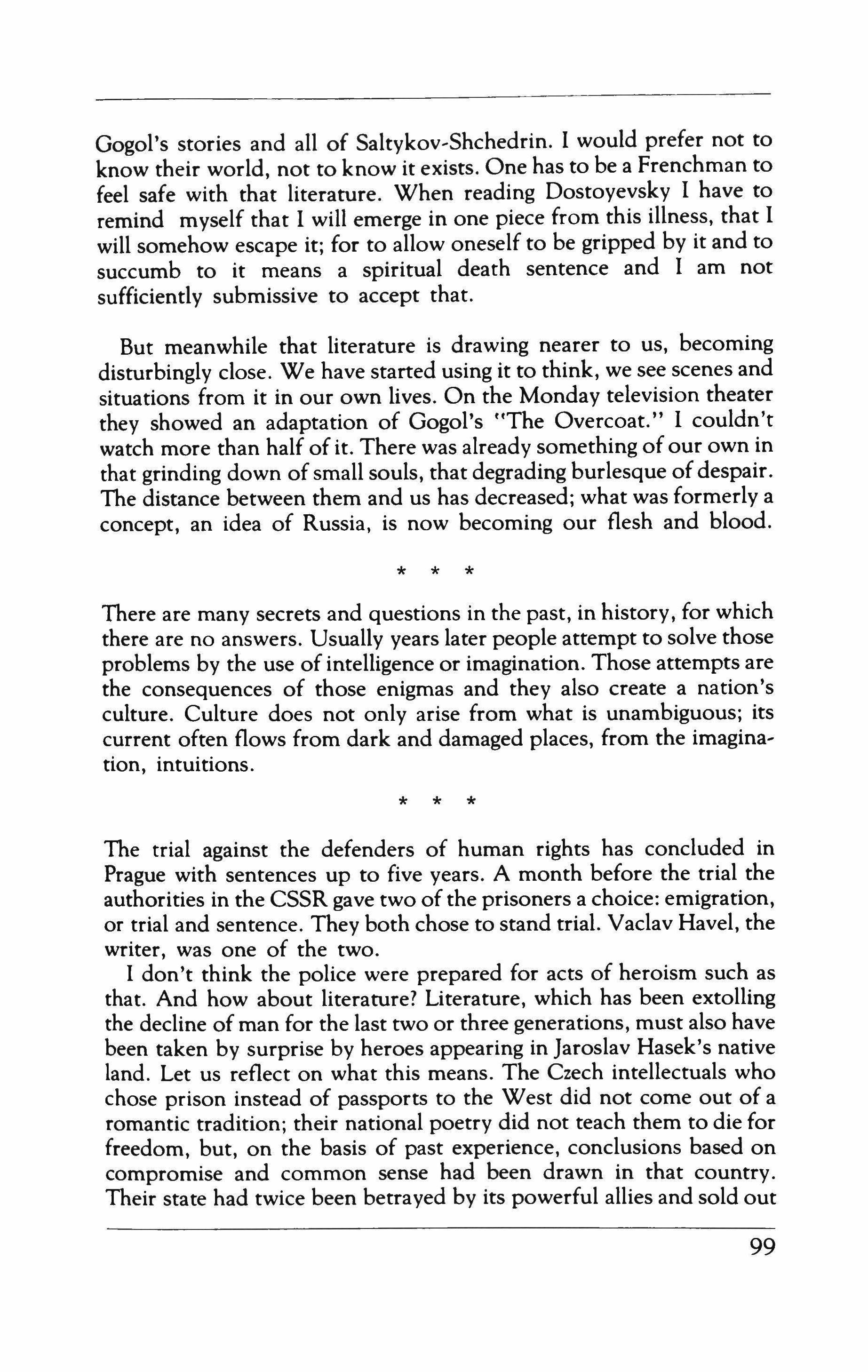
Gogel's stories and all of Saltvkov-Shchedrtn. I would prefer not to know their world, not to know it exists. One has to be a Frenchman to feel safe with that literature. When reading Dostovevskv I have to remind myself that I will emerge in one piece from this illness, that I will somehow escape it; for to allow oneself to be gripped by it and to succumb to it means a spiritual death sentence and I am not sufficiently submissive to accept that.
But meanwhile that literature is drawing nearer to us, becoming disturbingly close. We have started using it to think, we see scenes and situations from it in our own lives. On the Monday television theater they showed an adaptation of Gogel's "The Overcoat." I couldn't watch more than half of it. There was already something of our own in that grinding down of small souls, that degrading burlesque of despair. The distance between them and us has decreased; what was formerly a concept, an idea of Russia, is now becoming our flesh and blood.
There are many secrets and questions in the past, in history, for which there are no answers. Usually years later people attempt to solve those problems by the use of intelligence or imagination. Those attempts are the consequences of those enigmas and they also create a nation's culture. Culture does not only arise from what is unambiguous; its current often flows from dark and damaged places, from the imagination, intuitions.
The trial against the defenders of human rights has concluded in Prague with sentences up to five years. A month before the trial the authorities in the CSSR gave two of the prisoners a choice: emigration, or trial and sentence. They both chose to stand trial. Vaclav Havel, the writer, was one of the two.
I don't think the police were prepared for acts of heroism such as that. And how about literature? Literature, which has been extolling the decline of man for the last two or three generations, must also have been taken by surprise by heroes appearing in Jaroslav Hasek's native land. Let us reflect on what this means. The Czech intellectuals who chose prison instead of passports to the West did not come out of a romantic tradition; their national poetry did not teach them to die for freedom, but, on the basis of past experience, conclusions based on compromise and common sense had been drawn in that country. Their state had twice been betrayed by its powerful allies and sold out
* *
* * *
99
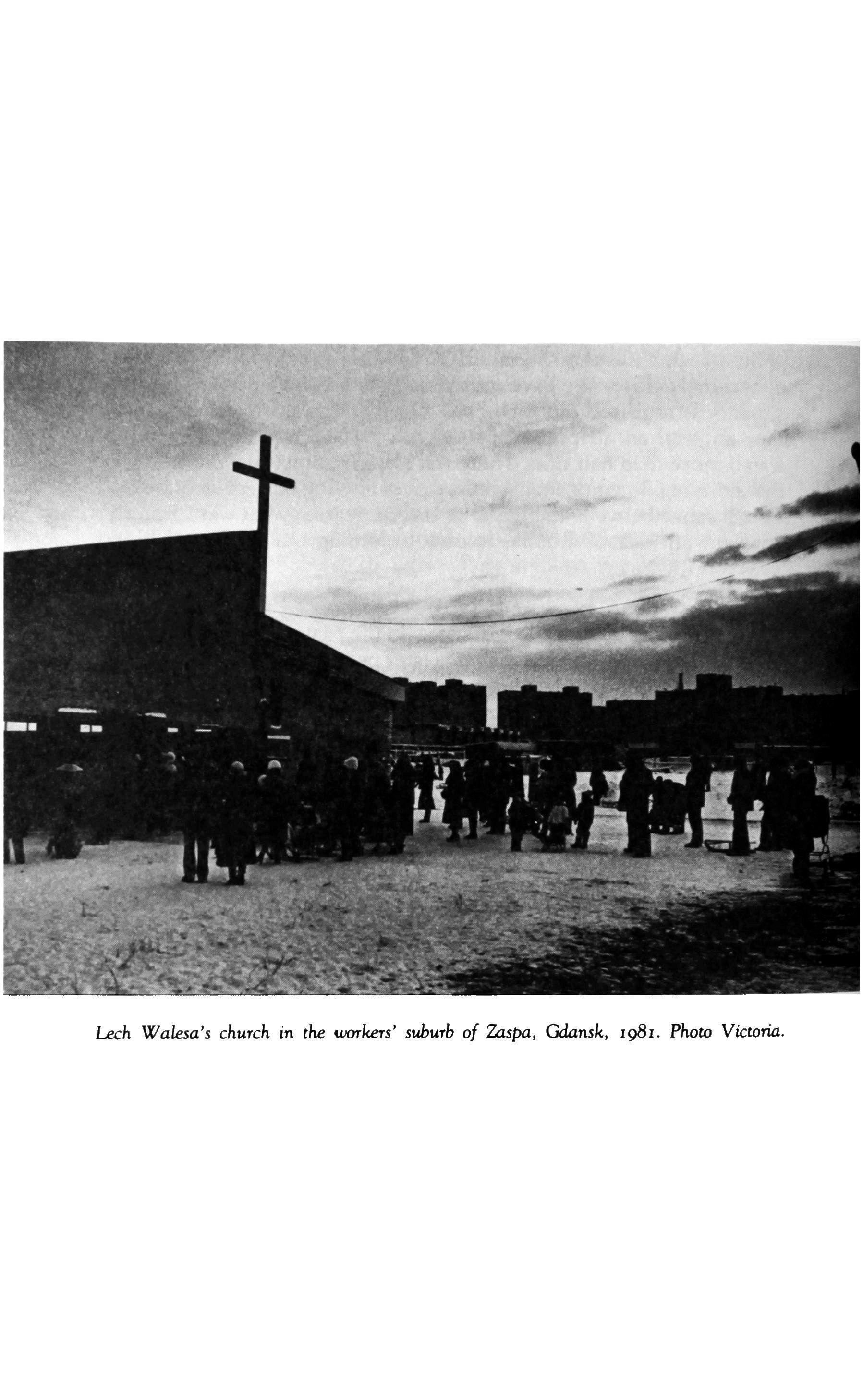 Lech Walesa's church in the workers' suburb of Zaspa, Gdansk, 1981. Photo Victoria.
Lech Walesa's church in the workers' suburb of Zaspa, Gdansk, 1981. Photo Victoria.

to two varieties of totalitarianism, one after the other. So they have no illusions. They were brought from their prison cells to the trial each day, isolated people, without defense counsel by their own choice, without support in their own society outside of a handful of people who had been hounded just as they had been (it is not even certain that they knew about the fifteen people on the hunger strike in Poland), people who, when they stood before the court, rejected the accusation against them in its entirety. I say let us reflect on what this means and on whether literature has not been too hasty in announcing the death and obsolescence of heroes.
Only the naive imagine the police as thickheaded guards with whistles. In essence, "police" is a philosophy and a view of human nature. The police are glad to note that for a long time now heroes have been reposing on the ash heap of burned-out ideas. Thus is the Bureau of Investigation's fundamental assumption confirmed, the assumption that man's spiritual value is doubtful at best, or at least is a relative thing which can be molded according to the amount or type of pressure applied. At the root of that assumption is the profoundest of certainties that people are cowardly, envious, and corruptible; the police's psychological knowledge is based on a presumption of man's evil.
I use the word "police" in the contemporary meaning of the term, in a broader sense, as a phenomenon of the totalitarian state. The ideal of all police is a society where everyone is an informer and every informer is supervised. None of the old police states ever achieved that ideal-neither Metternich's Austria nor the Second Empire in France. They lacked two elements: the elimination of the existing social structure and the development of a new language for power. In a word, they lacked ideology. Only communist totalitarianism has come anywhere near this goal. The politburos made an epochal discovery: it is not enough for a state to have its own police, the state must be transformed into the police, become the police. If the police dreamed of a society composed of supervised informers, then such a society must be created. What were the obstacles preventing the old police from realizing that idee fixe? Institutions and principles, laws and ethical concepts. So they had to be replaced. The old police, wanting to know about everything, kept silent. Ideological totalitarianism grasped the significance of words. It realized that language not only forms the way people think but also functions as a patrern which controls people's ideas and reflexes, laws and institutions. The old police had a fond dream of everyone saying the same thing; if someone said something different, paid informers would report it at once. The authorities in ideological totalitarian states have attempted to turn
101
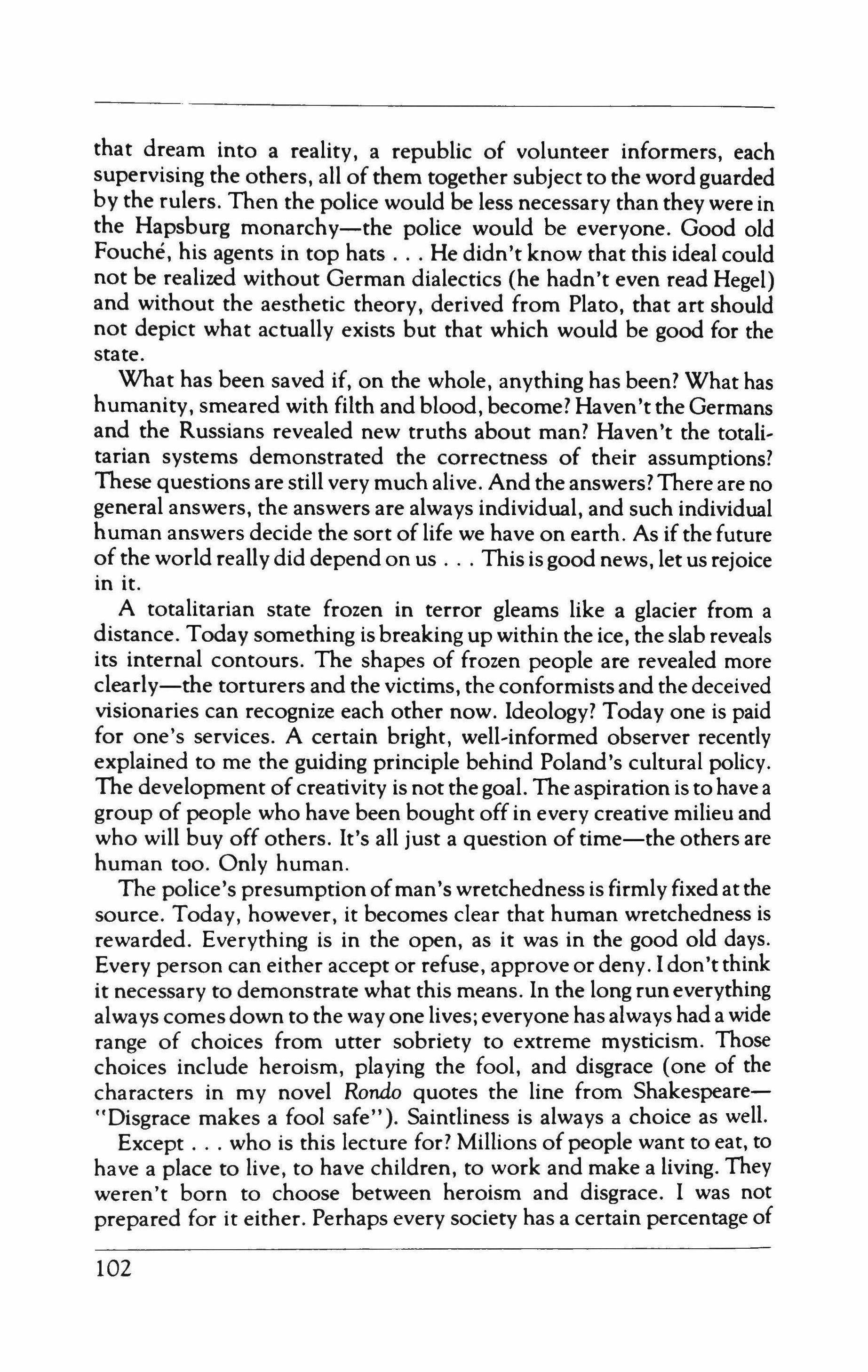
that dream into a reality, a republic of volunteer informers, each supervising the others, all of them together subject to the word guarded by the rulers. Then the police would be less necessary than they were in the Hapsburg monarchy-the police would be everyone. Good old Fouche, his agents in top hats He didn't know that this ideal could not be realized without German dialectics (he hadn't even read Hegel) and without the aesthetic theory, derived from Plato, that art should not depict what actually exists but that which would be good for the state.
What has been saved if, on the whole, anything has been? What has humanity, smeared with filth and blood, become? Haven't the Germans and the Russians revealed new truths about man? Haven't the totalitarian systems demonstrated the correctness of their assumptions? These questions are still very much alive. And the answers? There are no general answers, the answers are always individual, and such individual human answers decide the sort of life we have on earth. As if the future of the world really did depend on us This is good news, let us rejoice in it.
A totalitarian state frozen in terror gleams like a glacier from a distance. Today something is breaking up within the ice, the slab reveals its internal contours. The shapes of frozen people are revealed more clearly-the torturers and the victims, the conformists and the deceived visionaries can recognize each other now. Ideology? Today one is paid for one's services. A certain bright, well-informed observer recently explained to me the guiding principle behind Poland's cultural policy. The development ofcreativity is not the goal. The aspiration is to have a group of people who have been bought off in every creative milieu and who will buy off others. It's all just a question of time-the others are human too. Only human.
The police's presumption ofman's wretchedness is firmly fixed at the source. Today, however, it becomes clear that human wretchedness is rewarded. Everything is in the open, as it was in the good old days. Every person can either accept or refuse, approve or deny. Idon'tthink it necessary to demonstrate what this means. In the long run everything always comes down to the way one lives; everyone has always had a wide range of choices from utter sobriety to extreme mysticism. Those choices include heroism, playing the fool, and disgrace (one of the characters in my novel Rondo quotes the line from Shakespeare"Disgrace makes a fool safe"). Saintliness is always a choice as well. Except who is this lecture for? Millions of people want to eat, to have a place to live, to have children, to work and make a living. They weren't born to choose between heroism and disgrace. I was not prepared for it either. Perhaps every society has a certain percentage of
102
saints, just as it has a certain percentage of anarchists, geniuses, and homosexuals. At the same time I now find myself ready to reproach those people who dream of little houses with little gardens for not going off into the desert. For God's sake, come to your senses! For, after all, I admire those who are prisoners of their own consciences equally as much as I detest those who stand watch over other people's. And I would like to see Poland have as many family homes with little gardens as possible. I have, however, other concerns. What will grow in those little houses with the gardens?
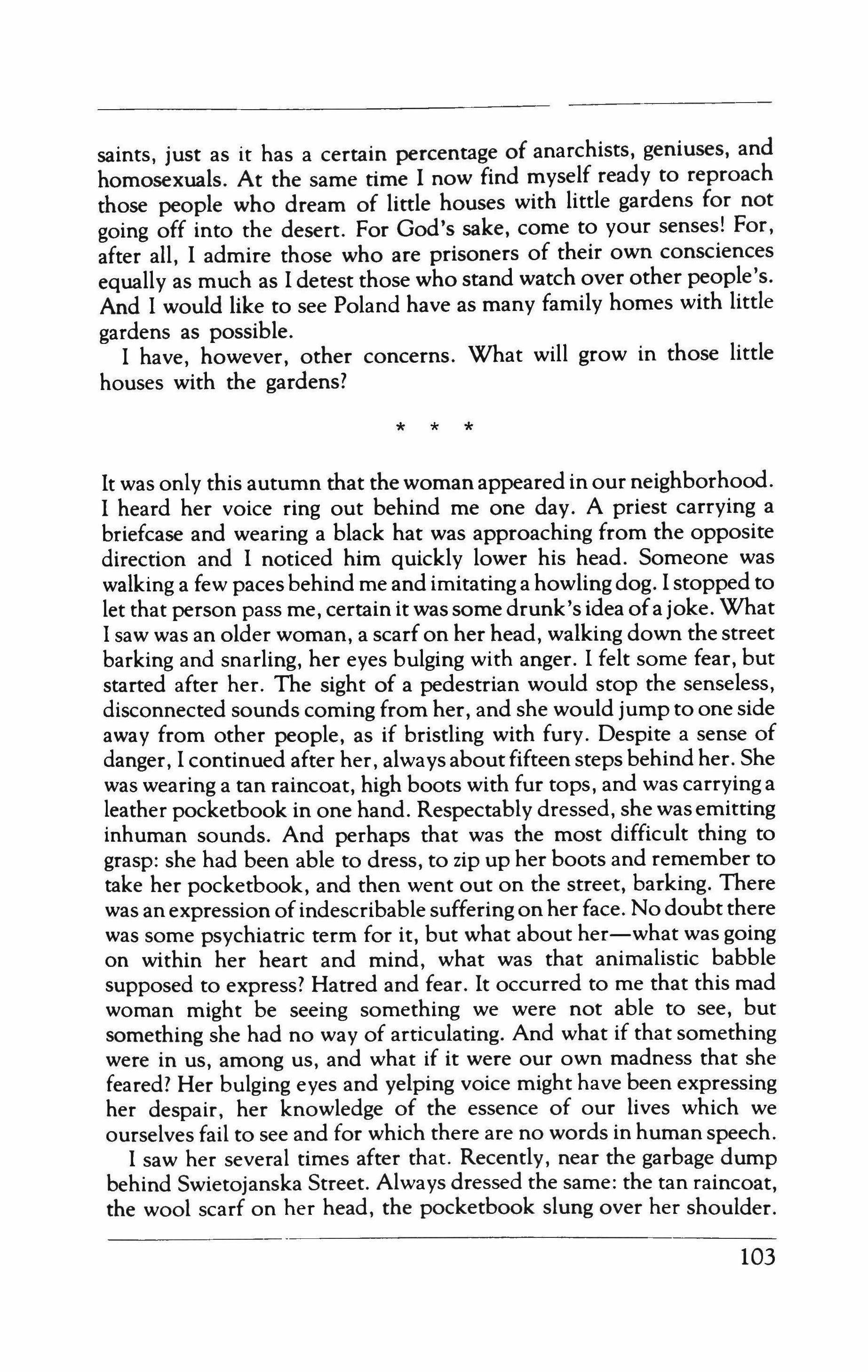
It was only this autumn that the woman appeared in our neighborhood. I heard her voice ring out behind me one day. A priest carrying a briefcase and wearing a black hat was approaching from the opposite direction and I noticed him quickly lower his head. Someone was walking a few paces behind me and imitating a howlingdog. I stopped to let that person pass me, certain it was some drunk's idea of a joke. What I saw was an older woman, a scarf on her head, walking down the street barking and snarling, her eyes bulging with anger. I felt some fear, but started after her. The sight of a pedestrian would stop the senseless, disconnected sounds coming from her, and she would jump to one side away from other people, as if bristling with fury. Despite a sense of danger, I continued after her, always about fifteen steps behind her. She was wearing a tan raincoat, high boots with fur tops, and was carrying a leather pocketbook in one hand. Respectably dressed, she was emitting inhuman sounds. And perhaps that was the most difficult thing to grasp: she had been able to dress, to zip up her boots and remember to take her pocketbook, and then went out on the street, barking. There was an expression ofindescribable suffering on her face. No doubt there was some psychiatric term for it, but what about her-what was going on within her heart and mind, what was that animalistic babble supposed to express? Hatred and fear. It occurred to me that this mad woman might be seeing something we were not able to see, but something she had no way of articulating. And what if that something were in us, among us, and what if it were our own madness that she feared? Her bulging eyes and yelping voice might have been expressing her despair, her knowledge of the essence of our lives which we ourselves fail to see and for which there are no words in human speech. I saw her several times after that. Recently, near the garbage dump behind Swietojanska Street. Always dressed the same: the tan raincoat, the wool scarf on her head, the pocketbook slung over her shoulder.
* *
103
Outwardly no different from the other women, the wives of officials and scientists, who live in our neighborhood.

On Saturday I waited for M., who was standing in a line forty people long. I looked around at the ugly, poorly plastered apartment buildings on the litter-strewn, muddy project lawns, across from a one� story shed with dirty windows where fruits and vegetables are sold, at the rear of the store. The self-service co-op with a dark and dirty interior looks like a PX in a barracks. Outside by the entrance there are cans full of empty beer bottles. Drunken men reel down the street, their heads hanging down or bent back. At the street corners stand little groups of young people wearing jackets and sneakers, waiting for something with an air of hostile boredom about them. This is new Jeziornia. Old Jeziornia begins a bit further down the asphalt highway in the direction of Warsaw.
On Saturday the little bus that brings the newspapers was a long time in coming. The line kept growing; it was drizzling. Waiting at a distance of about twenty steps, I saw M. wedged between a woman holding a bag stuffed with potatoes and a man with no legs: the film director Rvbkowski was behind him in line, having no doubt come in from Konstancin.
That day the dampness had caused me an annoying pain in my spine. Looking at the line wet with rain, I wondered why was it worth it to those people to wait for a newspaper containing information either dead or distorted; why couldn't they buy them in passing, from a newsboy, the way one does in a normal country. I told myself that these people want to read Express, they have grown used to an afternoon paper whose editing is on a higher level than the others', one not overloaded with material from Congresses or commentaries on the Sejm's resolutions (Express often prints summaries of them). They have also grown used to waiting. It does not enter their minds that waiting in front of a kiosk is an absurd thing to do; they are already used to a daily life composed of petty, tiring oppressions. But why do they have to wait; why isn't a larger edition of Express printed? Because an enormous percentage of paper goes to print material which no one reads. And why? So the country can provide as much employment as possible for obedient journalists. For who are the journalists of the unread press, of The Mazovian Tribune and Voice of the Mail-Man? They are a group of activists performing propaganda instruction in the field; they are functionaries in the provincial machine. The central press has to be smaller because more paper is needed for the local
* * *
104

propaganda cadres; and therefore lines for Express form up in front of the kiosks so people can be informed about the five young kangaroos in the Budapest Zoo.
The central and provincial press are based on the same principlebending reality into lies-and, for this task to be skillfully executed, professionals are required. And for years it's been done by the same people or younger replicas ofthem. There are no great Lucifers among them. These are little ordinary people who go with the flow. Slogans, party lines. directorships all change. but they, they are ever-present, their tongues greased and ready to serve new bosses using the latest slogans-the people, the working class, patriotism, anti-Zionism and internationalism, martyrology, jobs, and police campaigns. Always on guard-in the press, on television "He lies like TV!" Ewa R. shouted recently, upset about somebody. That already has the sound of a saying about it. Yes: they were here, are here, will be here, must be here. So we can buy newspapers.
When I realized this, the line in front of the kiosk in Jeziorna suddenly seemed desperate and humiliating to me. I ran over and began pulling M. out of the line, shouting that it was horrible, sense' less. Frightened, M. cried: "But today's paper has the TV guide for the whole week!" And I shouted back that I had to protect her from Sovietization. The line stared at me with frightened eyes as at a man bitten by a snake. It was just then that the little bus with the Express pulled up.
Oh, I had behaved stupidly!
But
The day before yesterday I broke off at the beginning of a sentence and today I can no longer reproduce my train of thought. I had begun a new paragraph, I had written "But," when someone knocked at my door with news about the unsuccessful American landing in Iran. The operation to free the fifty American prisoners in the U.S. embassy building had ended in a fiasco. The commandoes did not make it to Tehran; they flew off, leaving eight of their men dead in the desert and the wreckage of two helicopters which had collided at the beginning of the return flight. There is still no detailed explanation why the mission failed. All that is known is that three helicopters proved defective. Apparently the plan for the operation had been ready for a few months.
There was film coverage from Tehran on television. The bodies of American marines had been placed on public view. In exchange for the bodies the Iranian government is demanding the return of the Iranian money frozen in U.S. banks. They are still refusing to free the hos-
105
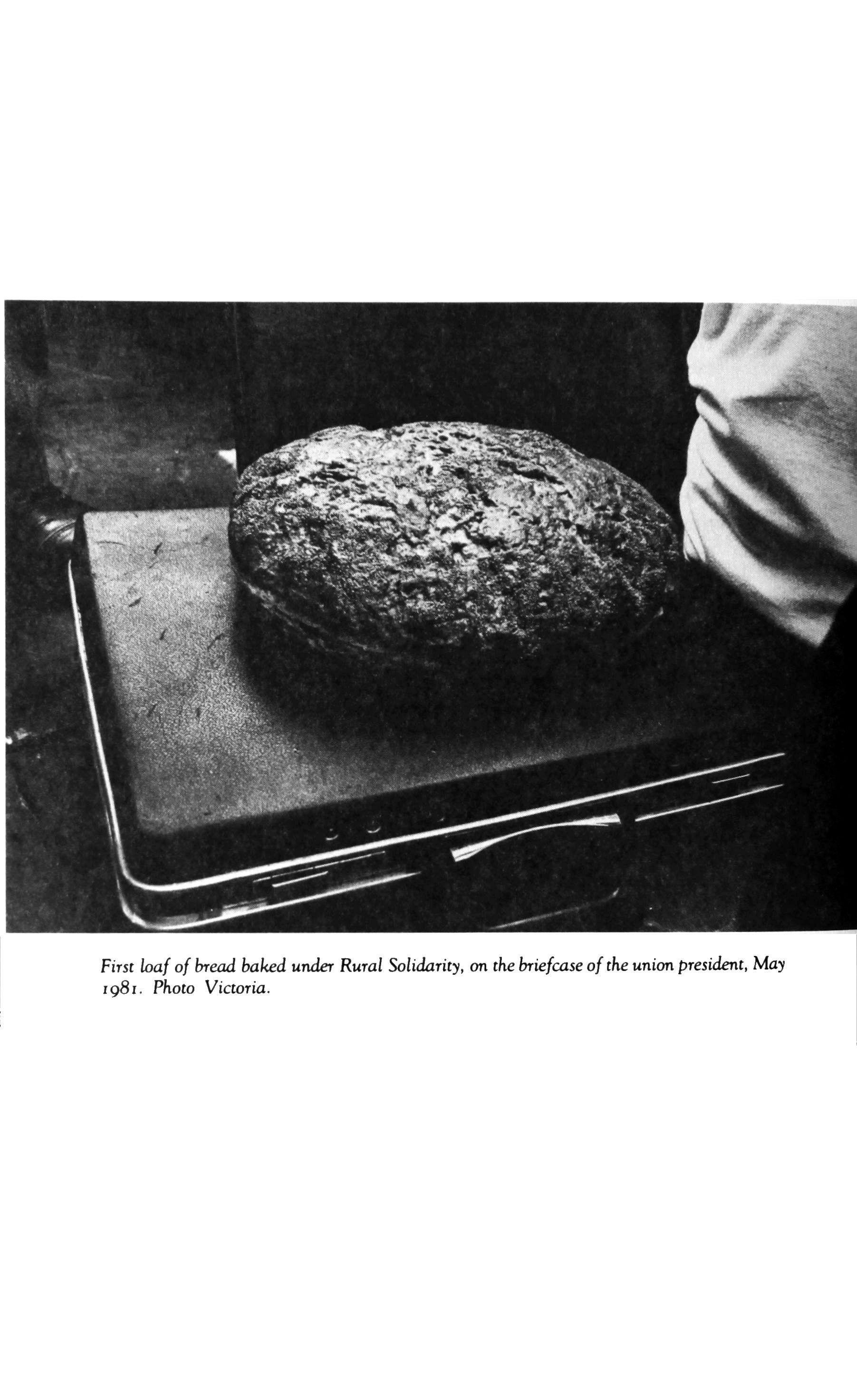 First loaf of bread baked under Rural Solidarity, on the briefcase of the union president, May 1981. Photo Vicroria.
First loaf of bread baked under Rural Solidarity, on the briefcase of the union president, May 1981. Photo Vicroria.
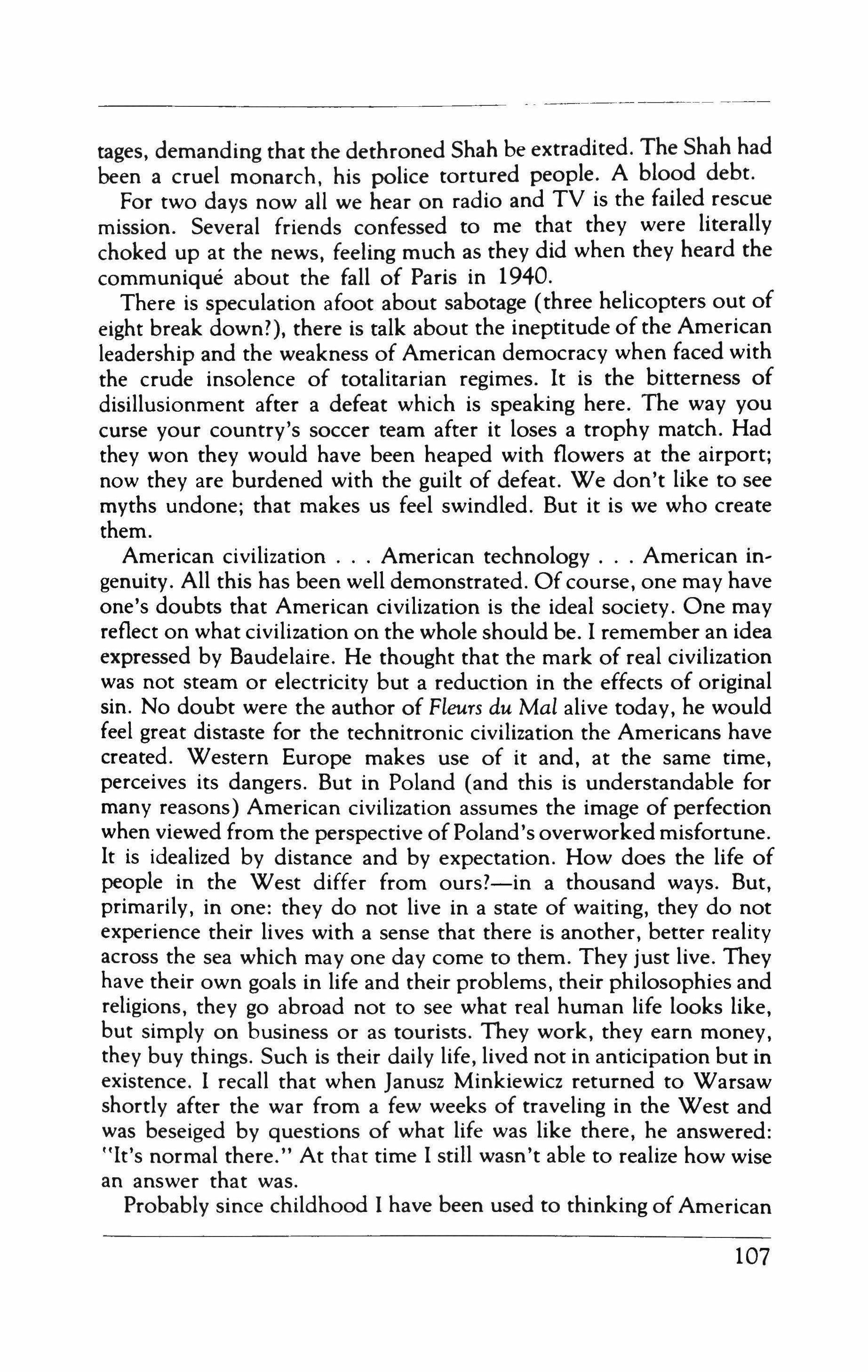
rages, demanding that the dethroned Shah be extradited. The Shah had been a cruel monarch. his police tortured people. A blood debt. For two days now all we hear on radio and TV is the failed rescue mission. Several friends confessed to me that they were literally choked up at the news, feeling much as they did when they heard the communique about the fall of Paris in 1940.
There is speculation afoot about sabotage (three helicopters out of eight break down?), there is talk about the ineptitude of the American leadership and the weakness of American democracy when faced with the crude insolence of totalitarian regimes. It is the bitterness of disillusionment after a defeat which is speaking here. The way you curse your country's soccer team after it loses a trophy match. Had they won they would have been heaped with flowers at the airport; now they are burdened with the guilt of defeat. We don't like to see myths undone; that makes us feel swindled. But it is we who create them.
American civilization American technology American in' genuity. All this has been well demonstrated. Of course, one may have one's doubts that American civilization is the ideal society. One may reflect on what civilization on the whole should be. I remember an idea expressed by Baudelaire. He thought that the mark of real civilization was not steam or electricity but a reduction in the effects of original sin. No doubt were the author of Fleurs du Mal alive today, he would feel great distaste for the technitronic civilization the Americans have created. Western Europe makes use of it and, at the same time, perceives its dangers. But in Poland (and this is understandable for many reasons) American civilization assumes the image of perfection when viewed from the perspective of Poland's overworked misfortune. It is idealized by distance and by expectation. How does the life of people in the West differ from ours?-in a thousand ways. But, primarily, in one: they do not live in a state of waiting, they do not experience their lives with a sense that there is another, better reality across the sea which may one day come to them. They just live. They have their own goals in life and their problems, their philosophies and religions, they go abroad not to see what real human life looks like, but simply on business or as tourists. They work, they earn money, they buy things. Such is their daily life, lived not in anticipation but in existence. I recall that when Janusz Minkiewicz returned to Warsaw shortly after the war from a few weeks of traveling in the West and was beseiged by questions of what life was like there, he answered: "It's normal there." At that time I still wasn't able to realize how wise an answer that was.
Probably since childhood I have been used to thinking of American
107
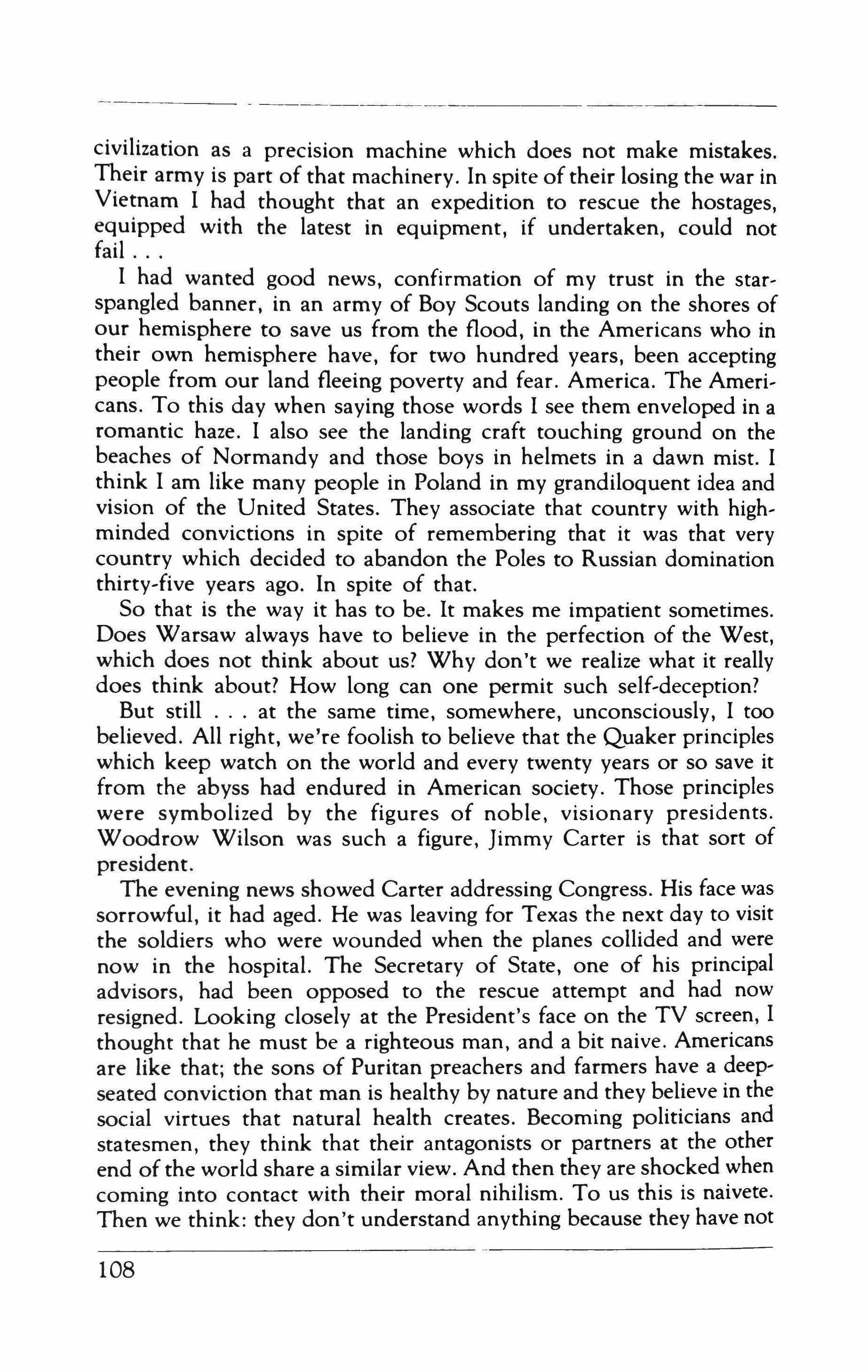
civilization as a precision machine which does not make mistakes. Their army is part of that machinery. In spite of their losing the war in Vietnam I had thought that an expedition to rescue the hostages, equipped with the latest in equipment, if undertaken, could not fail
I had wanted good news, confirmation of my trust in the starspangled banner, in an army of Boy Scouts landing on the shores of our hemisphere to save us from the flood, in the Americans who in their own hemisphere have, for two hundred years, been accepting people from our land fleeing poverty and fear. America. The Americans. To this day when saying those words I see them enveloped in a romantic haze. I also see the landing craft touching ground on the beaches of Normandy and those boys in helmets in a dawn mist. I think I am like many people in Poland in my grandiloquent idea and vision of the United States. They associate that country with highminded convictions in spite of remembering that it was that very country which decided to abandon the Poles to Russian domination thirtv-five years ago. In spite of that.
So that is the way it has to be. It makes me impatient sometimes. Does Warsaw always have to believe in the perfection of the West, which does not think about us? Why don't we realize what it really does think about? How long can one permit such self-deception]
But still at the same time, somewhere, unconsciously, I too believed. All right, we're foolish to believe that the Quaker principles which keep watch on the world and every twenty years or so save it from the abyss had endured in American society. Those principles were symbolized by the figures of noble, visionary presidents. Woodrow Wilson was such a figure, Jimmy Carter is that sort of president.
The evening news showed Carter addressing Congress. His face was sorrowful, it had aged. He was leaving for Texas the next day to visit the soldiers who were wounded when the planes collided and were now in the hospital. The Secretary of State, one of his principal advisors, had been opposed to the rescue attempt and had now resigned. Looking closely at the President's face on the TV screen, I thought that he must be a righteous man, and a bit naive. Americans are like that; the sons of Puritan preachers and farmers have a deepseated conviction that man is healthy by nature and they believe in the social virtues that natural health creates. Becoming politicians and statesmen, they think that their antagonists or partners at the other end of the world share a similar view. And then they are shocked when coming into contact with their moral nihilism. To us this is naivete. Then we think: they don't understand anything because they have not
108

had our experience; they don't know what man is because they have been spared the most severe trials to which man has been subjected. We feel superior to them in our heart of hearts and we consider them stupider than we, not realizing that we should put that unfortunate superiority of ours out of mind as quickly as possible. It is they who are superior to us precisely because they have no experience of our hells. Perhaps they are better than us because they have not known the evil to which we are subject. For them witnesses are sufficient to demonstrate a truth; here, to demonstrate a truth requires victims. They have been living in a democracy for ages. Among other things democracy means that man is spared the cruelest ordeals. Correctly assuming that people do not need those ordeals and that knowledge of them is degrading, democracy avoids the state of affairs in which man would be exposed to them. Until the cynicism of the barbarians triumphs.
Only in one sense are we somewhat superior to them. They have gained so much freedom (they don't know how much!) that they can exchange it only for bondage. For us, on the other hand, freedom is only a mirage; we thirst for it, wait for it, and therein, perhaps, lies our superiority. Neither of us realizes this-not they, not we.
There are generals in the government now-in a country of marches and demonstrations protesting reductions in food rations. After forty thousand workers marched though a suburb of Lodz, an automobile demonstration was organized in Warsaw. For two days a great cavalcade of vehicles has been blocking Marszalkowska Street between Dzierzynski Square and the traffic circle. Further strikes have been announced. It is exceedingly difficult to isolate oneself in thought or writing from all that is going on here. The events of the day become one's inner life.
At the same time I observe a certain constriction ofpeople's private lives. Everything-daily affairs, home, personal life, conversation-is absorbed by the stream of collective events. A single drama is occurring, a single story, and there is no room for individual experience. Even suicides have to be seen in a social context. A well-known doctor hanged himself from a tree in Konstancin; the reason was probably an incurable tumor. No credence is given to that explanation, however; shortly before the doctor's suicide two former ministers hanged themselves and so the predominant opinion is that the doctor was "involved in the affair." Everything, birth and death included, has been requisitioned as social and national material.
* * * 109

On Sunday, for the first time since my arrival back here, I saw a person in despair for reasons having nothing to do with the state. A ten-year-old boy. He had seen the conclusion of Buddenbrooks on television that evening and had been terror-stricken by the death of poor Hans. Standing by a bush, his fists clenched around the handlebars of his bicycle, he asked in despair: "What'H I do when I die, where'll I be?" The grown-ups smiled. "What are you crying for, everybody has to die." And that none-too-tactful consolation made him aware of the menace in its entirety. He bawled at the top of his lungs. I was on his side. At last, someone shaken to the depths by the essential injustice, the innate cruelty of life. Later I saw him walking with his head bowed, dragging his bicycle and sobbing: "Where'll I be? What'HI do?" The grown-ups were speechless. For years each of them had been putting that same question to himself and now they felt the weight of the moment; someone was asking himself that question for the first time.
Translated by Richard Lourie
110
19B1. Photo Victoria.

Poland, 1982. Joanna Helander.
Report from the state of war: Recent writing in Poland
Timothy Wiles
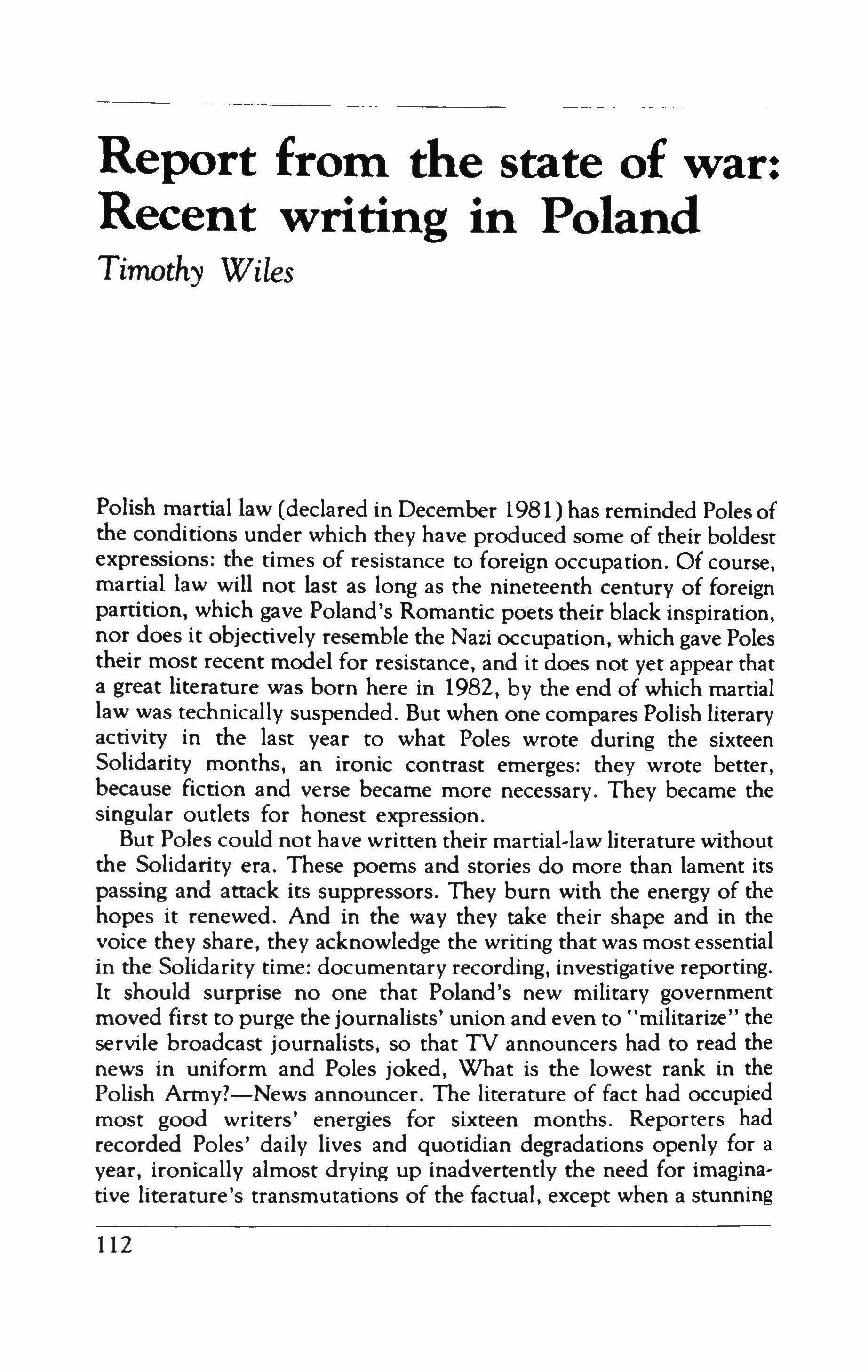
Polish martial law (declared in December 1981) has reminded Poles of the conditions under which they have produced some of their boldest expressions: the times of resistance to foreign occupation. Of course, martial law will not last as long as the nineteenth century of foreign partition, which gave Poland's Romantic poets their black inspiration, nor does it objectively resemble the Nazi occupation, which gave Poles their most recent model for resistance, and it does not yet appear that a great literature was born here in 1982, by the end of which martial law was technically suspended. But when one compares Polish literary activity in the last year to what Poles wrote during the sixteen Solidarity months, an ironic contrast emerges: they wrote better, because fiction and verse became more necessary. They became the singular outlets for honest expression.
But Poles could not have written their martial-law literature without the Solidarity era. These poems and stories do more than lament its passing and attack its suppressors. They burn with the energy of the hopes it renewed. And in the way they take their shape and in the voice they share, they acknowledge the writing that was most essential in the Solidarity time: documentary recording, investigative reporting. It should surprise no one that Poland's new military government moved first to purge the journalists' union and even to "militarize" the servile broadcast journalists, so that TV announcers had to read the news in uniform and Poles joked, What is the lowest rank in the Polish Army?-News announcer. The literature of fact had occupied most good writers' energies for sixteen months. Reporters had recorded Poles' daily lives and quotidian degradations openly for a year, ironically almost drying up inadvertently the need for imaginative literature's transmutations of the factual, except when a stunning
112
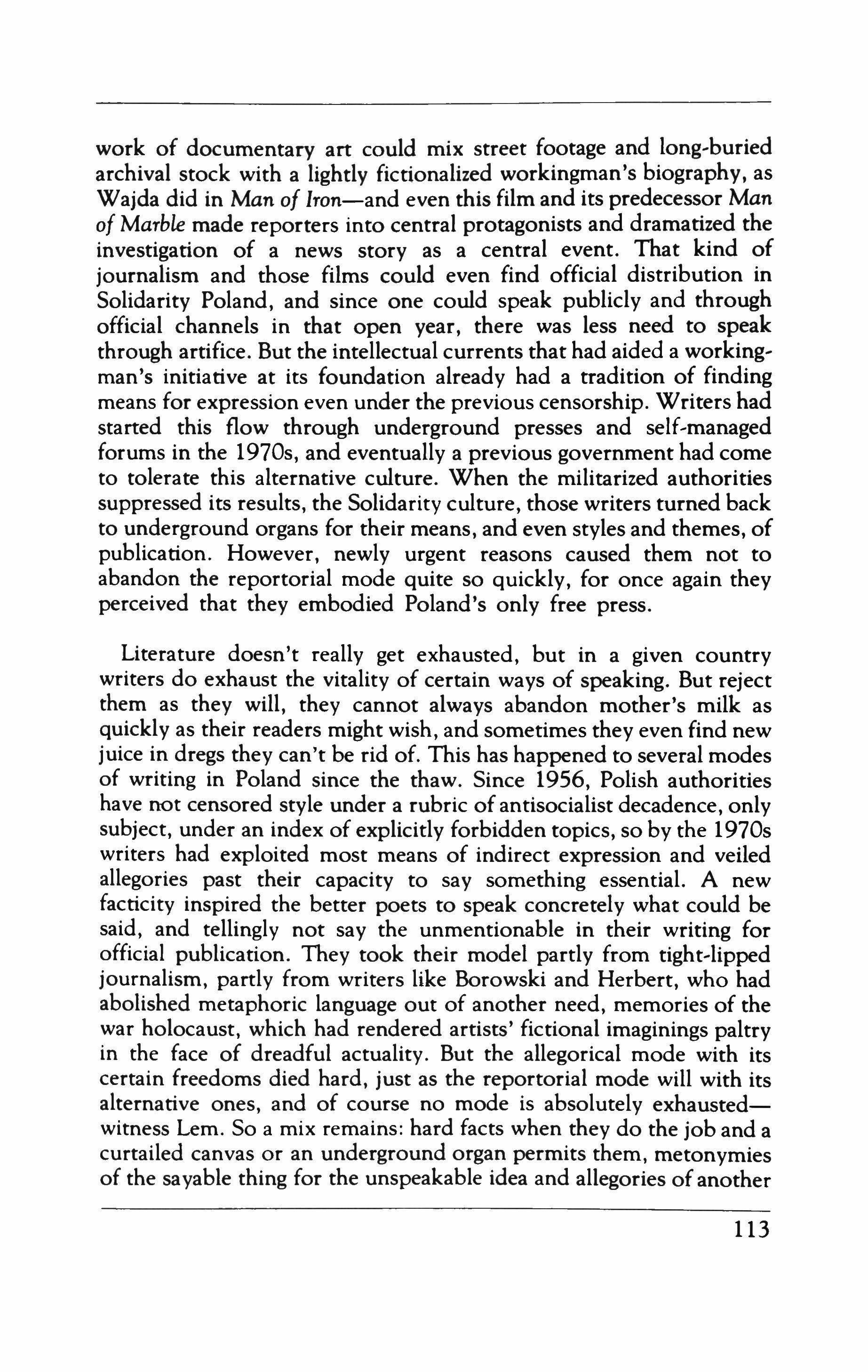
work of documentary art could mix street footage and long-buried archival stock with a lightly fictionalized workingman's biography, as Wajda did in Man of Iron-and even this film and its predecessor Man of Marble made reporters into central protagonists and dramatized the investigation of a news story as a central event. That kind of journalism and those films could even find official distribution in Solidarity Poland, and since one could speak publicly and through official channels in that open year, there was less need to speak through artifice. But the intellectual currents that had aided a workingman's initiative at its foundation already had a tradition of finding means for expression even under the previous censorship. Writers had started this flow through underground presses and self-managed forums in the 1970s, and eventually a previous government had come to tolerate this alternative culture. When the militarized authorities suppressed its results, the Solidarity culture, those writers turned back to underground organs for their means, and even styles and themes, of publication. However, newly urgent reasons caused them not to abandon the reportorial mode quite so quickly, for once again they perceived that they embodied Poland's only free press.
Literature doesn't really get exhausted, but in a given country writers do exhaust the vitality of certain ways of speaking. But reject them as they will, they cannot always abandon mother's milk as quickly as their readers might wish, and sometimes they even find new juice in dregs they can't be rid of. This has happened to several modes of writing in Poland since the thaw. Since 1956, Polish authorities have not censored style under a rubric of antisocialist decadence, only subject, under an index of explicitly forbidden topics, so by the 1970s writers had exploited most means of indirect expression and veiled allegories past their capacity to say something essential. A new facticity inspired the better poets to speak concretely what could be said, and tellinglv not say the unmentionable in their writing for official publication. They took their model partly from tight-lipped journalism, partly from writers like Borowski and Herbert, who had abolished metaphoric language out of another need, memories of the war holocaust, which had rendered artists' fictional imaginings paltry in the face of dreadful actuality. But the allegorical mode with its certain freedoms died hard, just as the reportorial mode will with its alternative ones, and of course no mode is absolutely exhaustedwitness Lem. So a mix remains: hard facts when they do the job and a curtailed canvas or an underground organ permits them, metonymies of the sayable thing for the unspeakable idea and allegories of another
113
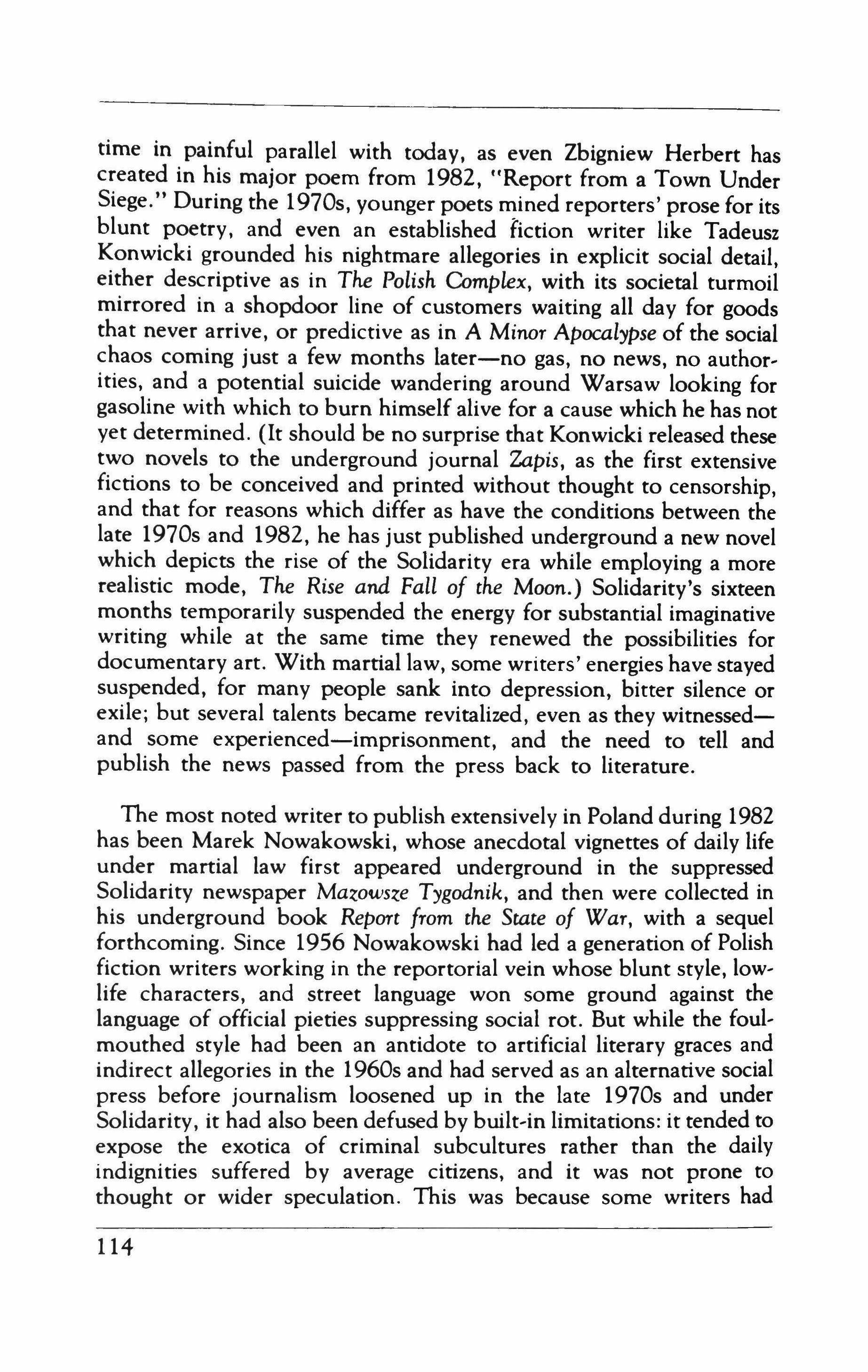
time in painful parallel with today, as even Zbigniew Herbert has created in his major poem from 1982, "Report from a Town Under Siege." During the 1970s, younger poets mined reporters' prose for its blunt poetry, and even an established fiction writer like Tadeusz Konwicki grounded his nightmare allegories in explicit social detail, either descriptive as in The Polish Complex, with its societal turmoil mirrored in a shopdoor line of customers waiting all day for goods that never arrive, or predictive as in A Minor Apocalypse of the social chaos coming just a few months later-no gas, no news, no authorities, and a potential suicide wandering around Warsaw looking for gasoline with which to burn himself alive for a cause which he has not yet determined. (It should be no surprise that Konwicki released these two novels to the underground journal ZaPis, as the first extensive fictions to be conceived and printed without thought to censorship, and that for reasons which differ as have the conditions between the late 1970s and 1982, he has just published underground a new novel which depicts the rise of the Solidarity era while employing a more realistic mode, The Rise and Fall of the Moon.) Solidarity'S sixteen months temporarily suspended the energy for substantial imaginative writing while at the same time they renewed the possibilities for documentary art. With martial law, some writers' energies have stayed suspended, for many people sank into depression, bitter silence or exile; but several talents became revitalized, even as they witnessedand some experienced-imprisonment, and the need to tell and publish the news passed from the press back to literature.
The most noted writer to publish extensively in Poland during 1982 has been Marek Nowakowski, whose anecdotal vignettes of daily life under martial law first appeared underground in the suppressed Solidarity newspaper Mazowsze Tygodnik, and then were collected in his underground book Report from the State of War, with a sequel forthcoming. Since 1956 Nowakowski had led a generation of Polish fiction writers working in the reportorial vein whose blunt style, low� life characters, and street language won some ground against the language of official pieties suppressing social rot. But while the foulmouthed style had been an antidote to artificial literary graces and indirect allegories in the 1960s and had served as an alternative social press before journalism loosened up in the late 1970s and under Solidarity, it had also been defused by built-in limitations: it tended to expose the exotica of criminal subcultures rather than the daily indignities suffered by average citizens, and it was not prone to thought or wider speculation. This was because some writers had
114
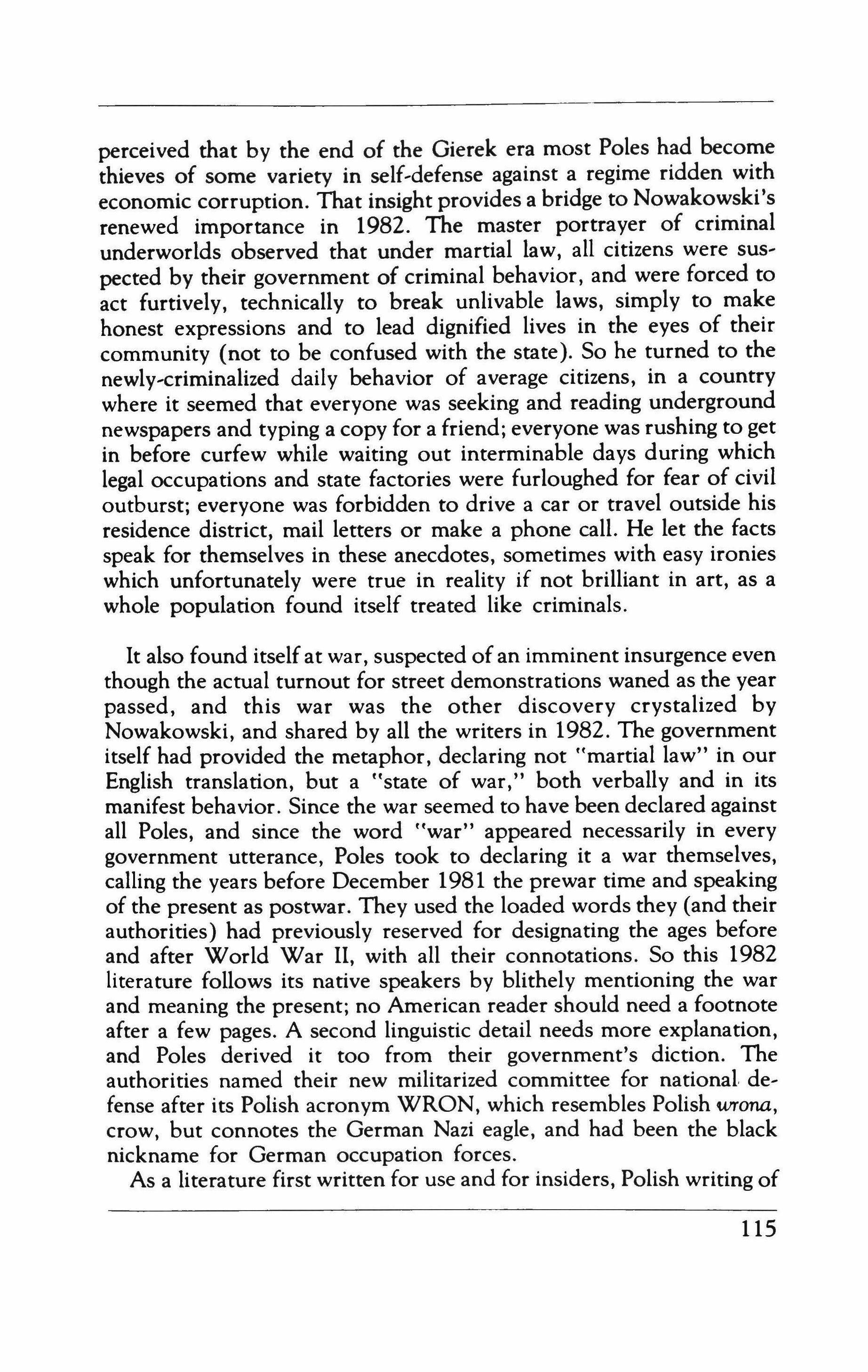
perceived that by the end of the Gierek era most Poles had become thieves of some variety in self-defense against a regime ridden with economic corruption. That insight provides a bridge to Nowakowski's renewed importance in 1982. The master portrayer of criminal underworlds observed that under martial law, all citizens were sus' pected by their government of criminal behavior, and were forced to act furtively, technically to break unlivable laws, simply to make honest expressions and to lead dignified lives in the eyes of their community (not to be confused with the state). So he turned to the newlv-criminalized daily behavior of average citizens, in a country where it seemed that everyone was seeking and reading underground newspapers and typing a copy for a friend; everyone was rushing to get in before curfew while waiting out interminable days during which legal occupations and state factories were furloughed for fear of civil outburst; everyone was forbidden to drive a car or travel outside his residence district, mail letters or make a phone call. He let the facts speak for themselves in these anecdotes, sometimes with easy ironies which unfortunately were true in reality if not brilliant in art, as a whole population found itself treated like criminals.
It also found itself at war, suspected of an imminent insurgence even though the actual turnout for street demonstrations waned as the year passed, and this war was the other discovery crystalized by Nowakowski, and shared by all the writers in 1982. The government itself had provided the metaphor, declaring not "martial law" in our English translation, but a "state of war," both verbally and in its manifest behavior. Since the war seemed to have been declared against all Poles, and since the word "war" appeared necessarily in every government utterance, Poles took to declaring it a war themselves, calling the years before December 1981 the prewar time and speaking of the present as postwar. They used the loaded words they (and their authorities) had previously reserved for designating the ages before and after World War II, with all their connotations. So this 1982 literature follows its native speakers by blithely mentioning the war and meaning the present; no American reader should need a footnote after a few pages. A second linguistic detail needs more explanation, and Poles derived it too from their government's diction. The authorities named their new militarized committee for national. de, fense after its Polish acronym WRON, which resembles Polish wrona, crow, but connotes the German Nazi eagle, and had been the black nickname for German occupation forces.
As a literature first written for use and for insiders, Polish writing of
115
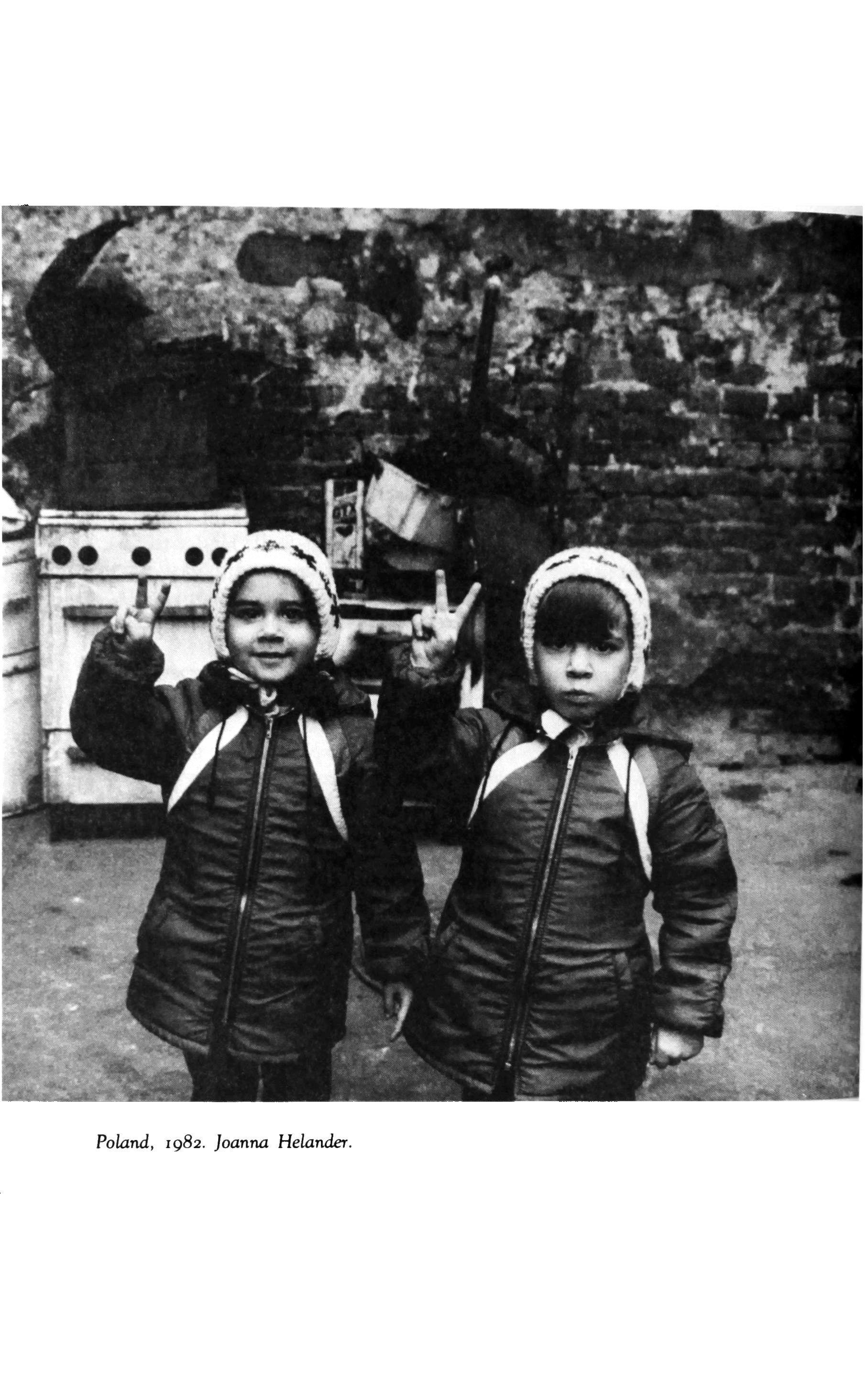
Poland. 1982. Joanna Helander.
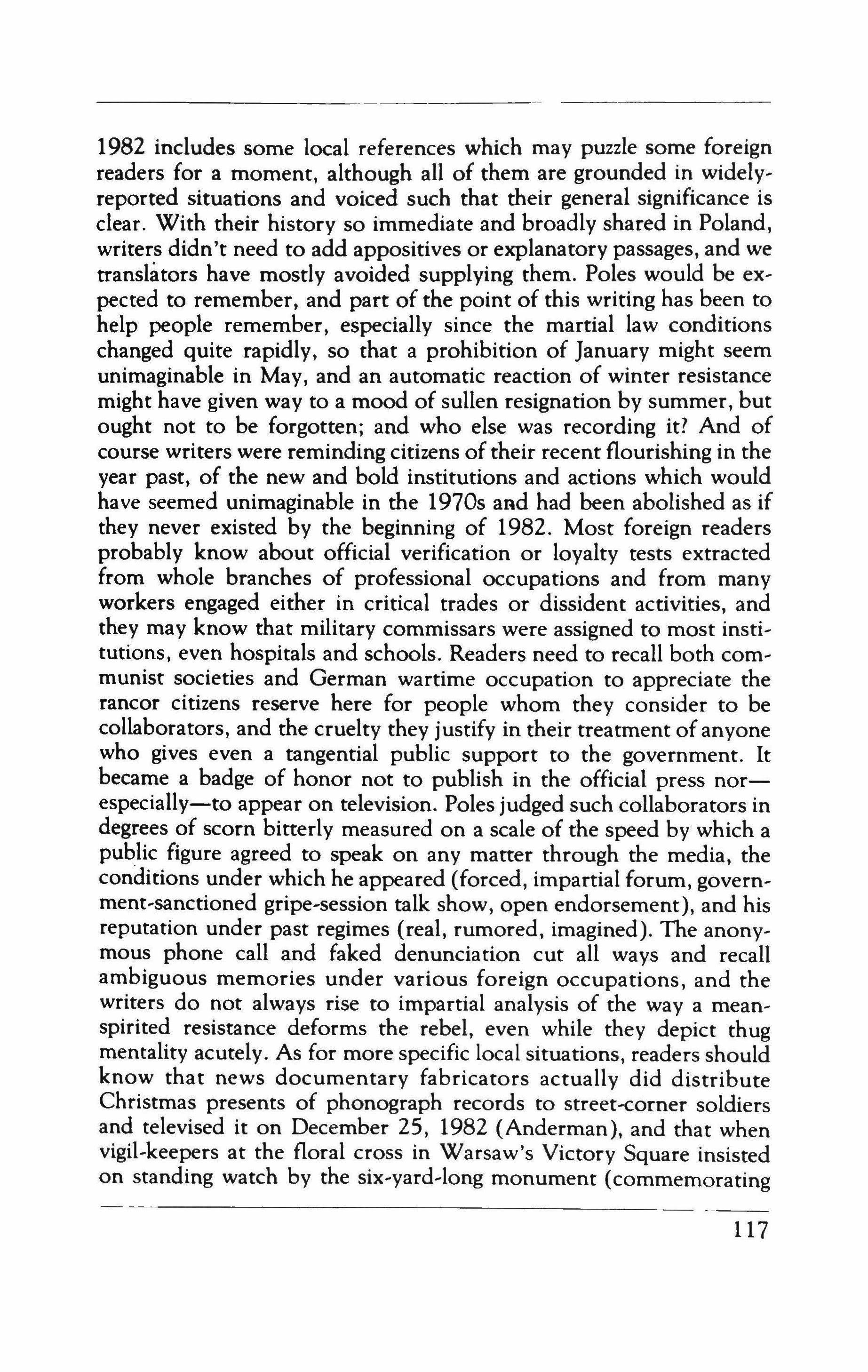
1982 includes some local references which may puzzle some foreign readers for a moment, although all of them are grounded in widelyreported situations and voiced such that their general significance is clear. With their history so immediate and broadly shared in Poland, writers didn't need to add appositives or explanatory passages, and we translators have mostly avoided supplying them. Poles would be expected to remember, and part of the point of this writing has been to help people remember, especially since the martial law conditions changed quite rapidly, so that a prohibition of January might seem unimaginable in May, and an automatic reaction of winter resistance might have given way to a mood of sullen resignation by summer, but ought not to be forgotten; and who else was recording it? And of course writers were reminding citizens of their recent flourishing in the year past, of the new and bold institutions and actions which would have seemed unimaginable in the 1970s and had been abolished as if they never existed by the beginning of 1982. Most foreign readers probably know about official verification or loyalty tests extracted from whole branches of professional occupations and from many workers engaged either in critical trades or dissident activities, and they may know that military commissars were assigned to most institutions, even hospitals and schools. Readers need to recall both communist societies and German wartime occupation to appreciate the rancor citizens reserve here for people whom they consider to be collaborators, and the cruelty they justify in their treatment of anyone who gives even a tangential public support to the government. It became a badge of honor not to publish in the official press norespecially-to appear on television. Poles judged such collaborators in degrees of scorn bitterly measured on a scale of the speed by which a public figure agreed to speak on any matter through the media, the conditions under which he appeared (forced, impartial forum, government-sanctioned gripe-session talk show, open endorsement), and his reputation under past regimes (real, rumored, imagined). The anonymous phone call and faked denunciation cut all ways and recall ambiguous memories under various foreign occupations, and the writers do not always rise to impartial analysis of the way a meanspirited resistance deforms the rebel, even while they depict thug mentality acutely. As for more specific local situations, readers should know that news documentary fabricators actually did distribute Christmas presents of phonograph records to street-corner soldiers and televised it on December 25, 1982 (Anderman), and that when vigil-keepers at the floral cross in Warsaw's Victory Square insisted on standing watch by the six-yard-long monument (commemorating
117

Cardinal Wyszynski and Solidarity in the plaza where John Paulll said mass for a million people), the authorities declared the perfectly solid cobblestones in need of repair, bulldozed them up, and fenced off the square. Readers of Nowakowski's story about the chance spotting of a black traveler in the central train station will savor it better when realizing how rare and exotic Negroes are in this culture, known mostly from American movies and jazz.
In the main, local details don't animate this writing, but the ex, perience of local reality does. In the most recent months here, litera, ture has needed to inform, to record events, and to record them quickly, partly for speedy distribution as part of the struggle, partly because some writers feared that they might be quickly silenced, or at least be detained by internment or arrest, as Jastrun and Anderman have been (each was released after a few months). The writing shows this haste, and sometimes a story or poem turns on too neat a point, the easy irony of an anecdote's expected conclusion. Still, writers in and out of jail turned that experience to advantage, partly through their defiance by creating something even from within prison, and in Janusz Anderman's case, especially when he depicts the strain and despair of a prisoner's fears, to debunk the popular local myth which held that every Solidarity internee flourished in prison (on his own psychological terms) and saw it as a duty and morale-building regimen. This literature burns with more hope than does much East European literature today, partly because its writers and readers still share memories of a recent open time, partly because the act of writing and reading it contributes to a local struggle and the will to alter by themselves the conditions which they can control. But a dark mood lies under the struggle, a fear that leaden times have set in, that a condition of stasis or even regression will prevail in material terms and in terms of rights and options. They write so that at least the spirit will not be paralyzed. Herbert concludes his "Report from a Town Under Siege" with a lament that "only our dreams have not been humiliated.
This is still Solidarity writing, even under martial-law conditions. It may eventually be seen as the literature there was no time to produce in 1980-1981, but told with a knowledge of history. One of the ironies of the Solidarity era was that it finally legitimized the socialist realist form and redeemed its aesthetic and political attributes, except that it turned them against communism. It shares that form's weak,
118
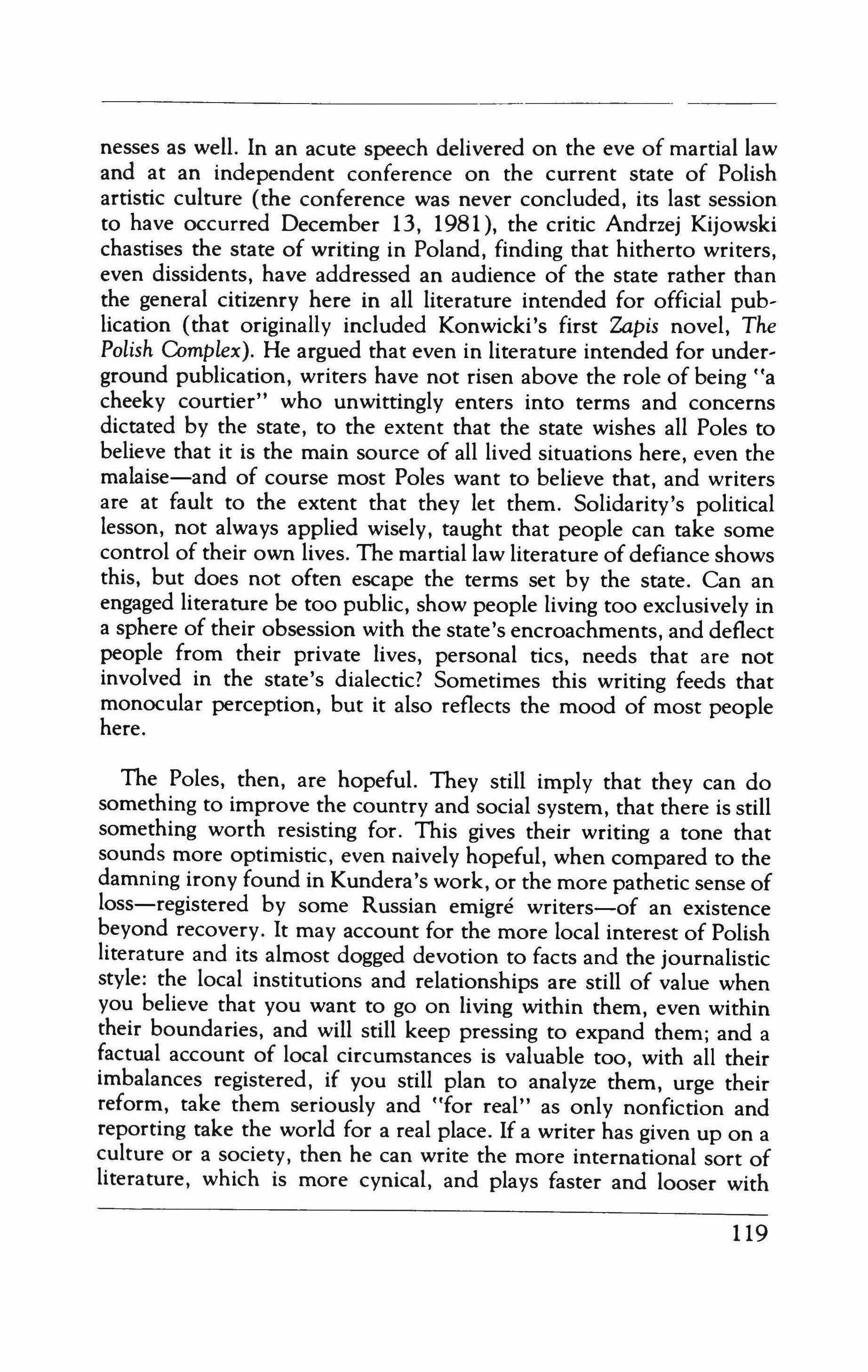
nesses as well. In an acute speech delivered on the eve of martial law and at an independent conference on the current state of Polish artistic culture (the conference was never concluded, its last session to have occurred December 13, 1981), the critic Andrzej Kijowski chastises the state of writing in Poland, finding that hitherto writers, even dissidents, have addressed an audience of the state rather than the general citizenry here in all literature intended for official publication (that originally included Konwicki's first ZaPis novel, The Polish Complex). He argued that even in literature intended for underground publication, writers have not risen above the role of being "a cheeky courtier" who unwittingly enters into terms and concerns dictated by the state, to the extent that the state wishes all Poles to believe that it is the main source of all lived situations here, even the malaise-and of course most Poles want to believe that, and writers are at fault to the extent that they let them. Solidarity'S political lesson, not always applied wisely, taught that people can take some control of their own lives. The martial law literature ofdefiance shows this, but does not often escape the terms set by the state. Can an engaged literature be too public, show people living too exclusively in a sphere of their obsession with the state's encroachments, and deflect people from their private lives, personal tics, needs that are not involved in the state's dialectic? Sometimes this writing feeds that monocular perception, but it also reflects the mood of most people here.
The Poles, then, are hopeful. They still imply that they can do something to improve the country and social system, that there is still something worth resisting for. This gives their writing a tone that sounds more optimistic, even naively hopeful, when compared to the damning irony found in Kundera's work, or the more pathetic sense of loss-registered by some Russian emigre writers-of an existence beyond recovery. It may account for the more local interest of Polish literature and its almost dogged devotion to facts and the journalistic style: the local institutions and relationships are still of value when you believe that you want to go on living within them, even within their boundaries, and will still keep pressing to expand them; and a factual account of local circumstances is valuable too, with all their imbalances registered, if you still plan to analyze them, urge their reform, take them seriously and "for real" as only nonfiction and reporting take the world for a real place. If a writer has given up on a culture or a society, then he can write the more international sort of literature, which is more cynical, and plays faster and looser with
119

factual details because it has stopped caring whether these have a real world value beyond their utility to literature. That kind of literature can be more abstract, seem more universal in implications, but its irony and satire are turned against cultures which writers have given up on. We all live in particular worlds, even emigres eventually, which take and handle us for real no matter how we respond to them. The Polish writers are holding onto that fact. In the world they report from we may not see much of our own, but we will see the act of recording one, and resisting within one.
Warsaw, January I983
120
Nowa Hura, October 3 I, 1982. Photo Lech.
Contributors and acknowledgm.ents
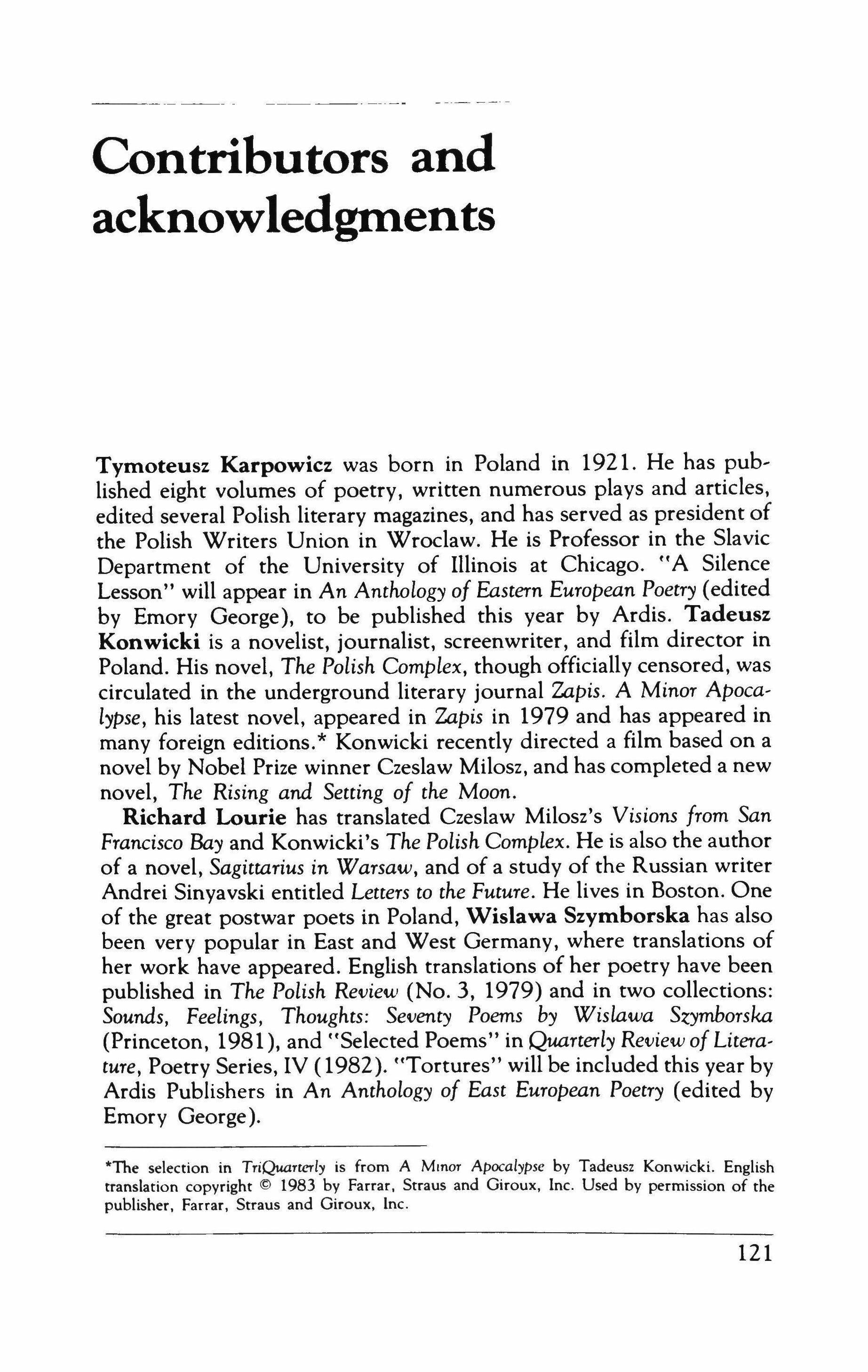
Tymoteusz Karpowicz was born in Poland in 1921. He has published eight volumes of poetry, written numerous plays and articles, edited several Polish literary magazines, and has served as president of the Polish Writers Union in Wroclaw. He is Professor in the Slavic Department of the University of Illinois at Chicago. "A Silence Lesson" will appear in An Anthology of Eastern European Poetry (edited by Emory George), to be published this year by Ardis. Tadeusz Konwicki is a novelist, journalist, screenwriter, and film director in Poland. His novel, The Polish Complex, though officially censored, was circulated in the underground literary journal Zapis. A Minor Apocalypse, his latest novel, appeared in ZaPis in 1979 and has appeared in many foreign editions. * Konwicki recently directed a film based on a novel by Nobel Prize winner Czeslaw Milosz, and has completed a new novel, The Rising and Setting of the Moon.
Richard Lourie has translated Czeslaw Milosz's Visions from San Francisco Bay and Konwicki's The Polish Complex. He is also the author of a novel, Sagittarius in Warsaw, and of a study of the Russian writer Andrei Sinyavski entitled Letters to the Future. He lives in Boston. One of the great postwar poets in Poland, Wislawa Szymborska has also been very popular in East and West Germany, where translations of her work have appeared. English translations of her poetry have been published in The Polish Review (No.3, 1979) and in two collections: Sounds, Feelings, Thoughts: Seventy Poems by Wislawa Szymborska (Princeton, 1981), and "Selected Poems" in Quarterly Review of Literature, Poetry Series, IV (1982). "Tortures" will be included this year by Ardis Publishers in An Anthology of East European Poetry (edited by Emory George).
"The selection in TriQuanerly is from A Mmor Apocalypse by Tadeusz Konwicki. English translation copyright © 1983 by Farrar. Straus and Giroux, Inc. Used by permission of the publisher, Farrar, Straus and Giroux, Inc.
121
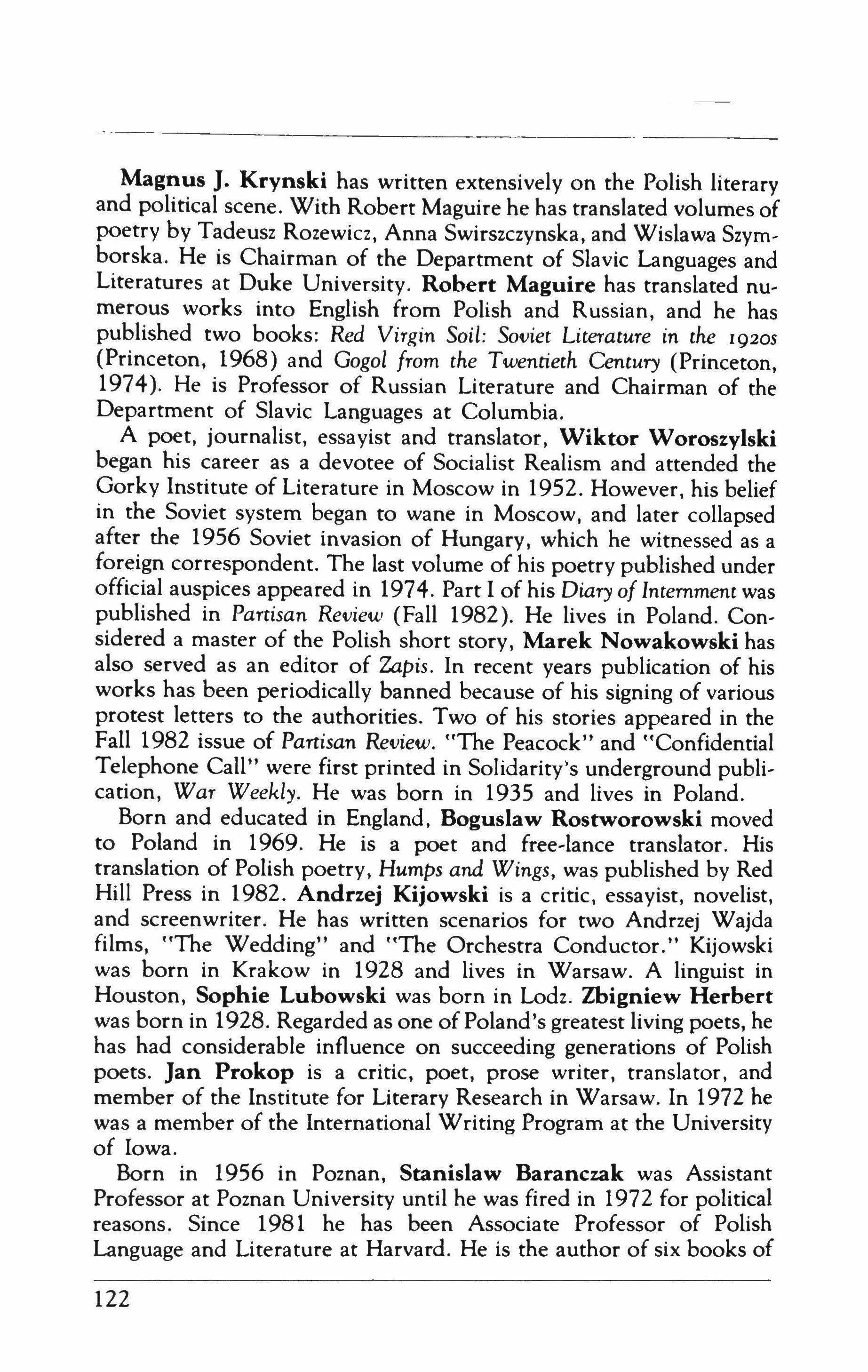
Magnus J. Krynski has written extensively on the Polish literary and political scene. With Robert Maguire he has translated volumes of poetry by Tadeusz Rozewicz, Anna Swirszczynska, and Wislawa Szvmborska. He is Chairman of the Department of Slavic Languages and Literatures at Duke University. Robert Maguire has translated numerous works into English from Polish and Russian, and he has published two books: Red Virgin Soil; Soviet Literature in the 1920S (Princeton, 1968) and Gogol from the Twentieth Century (Princeton, 1974). He is Professor of Russian Literature and Chairman of the Department of Slavic Languages at Columbia.
A poet, journalist, essayist and translator, Wiktor Woroszylski began his career as a devotee of Socialist Realism and attended the Gorky Institute of Literature in Moscow in 1952. However, his belief in the Soviet system began to wane in Moscow, and later collapsed after the 1956 Soviet invasion of Hungary, which he witnessed as a foreign correspondent. The last volume of his poetry published under official auspices appeared in 1974. Part I of his Diary of Internment was published in Partisan Review (Fall 1982). He lives in Poland. Considered a master of the Polish short story, Marek Nowakowski has also served as an editor of Zapis. In recent years publication of his works has been periodically banned because of his signing of various protest letters to the authorities. Two of his stories appeared in the Fall 1982 issue of Partisan Review. "The Peacock" and "Confidential Telephone Call" were first printed in Solidarity's underground publication, War Weekly. He was born in 1935 and lives in Poland.
Born and educated in England. Boguslaw Rostworowski moved to Poland in 1969. He is a poet and free-lance translator. His translation of Polish poetry, Humps and Wings, was published by Red Hill Press in 1982. Andrzej Kijowski is a critic, essayist, novelist, and screenwriter. He has written scenarios for two Andrzej Wajda films, "The Wedding" and "The Orchestra Conductor." Kijowski was born in Krakow in 1928 and lives in Warsaw. A linguist in Houston, Sophie Lubowski was born in Lodz. Zhigniew Herbert was born in 1928. Regarded as one of Poland's greatest living poets, he has had considerable influence on succeeding generations of Polish poets. Jan Prokop is a critic, poet, prose writer, translator, and member of the Institute for Literary Research in Warsaw. In 1972 he was a member of the International Writing Program at the University of Iowa.
Born in 1956 in Poznan, Stanislaw Baranczak was Assistant Professor at Poznan University until he was fired in 1972 for political reasons. Since 1981 he has been Associate Professor of Polish Language and Literature at Harvard. He is the author of six books of
122
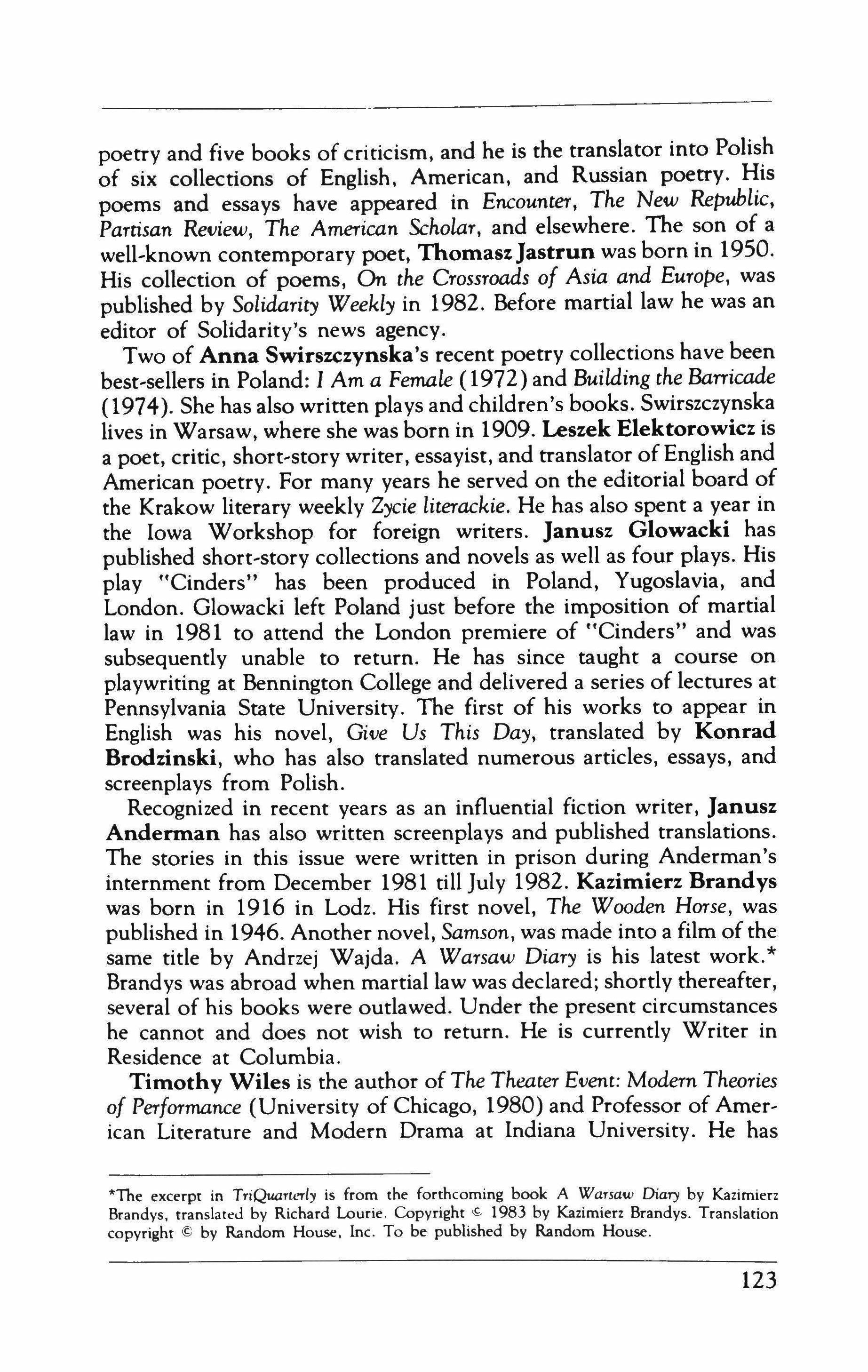
poetry and five books of criticism, and he is the translator into Polish of six collections of English. American, and Russian poetry. His poems and essays have appeared in Encounter, The New Republic, Partisan Review, The American Scholar, and elsewhere. The son of a well-known contemporary poet, ThomaszJastrun was born in 1950. His collection of poems, On the Crossroads of Asia and Europe, was published by Solidarity Weekly in 1982. Before martial law he was an editor of Solidarity's news agency.
Two of Anna Swirszczynska's recent poetry collections have been best-sellers in Poland: I Am a Female (1972) and Building the Barricade (1974). She has also written plays and children's books. Swirszczynska lives in Warsaw, where she was born in 1909. Leszek Elektorowicz is a poet, critic, short-story writer, essayist, and translator of English and American poetry. For many years he served on the editorial board of the Krakow literary weekly Zycie literackie. He has also spent a year in the Iowa Workshop for foreign writers. Janusz Glowacki has published short-story collections and novels as well as four plays. His play "Cinders" has been produced in Poland, Yugoslavia, and London. Glowacki left Poland just before the imposition of martial law in 1981 to attend the London premiere of "Cinders" and was subsequently unable to return. He has since taught a course on playwriting at Bennington College and delivered a series of lectures at Pennsylvania State University. The first of his works to appear in English was his novel, Give Us This Day, translated by Konrad Brodzinski, who has also translated numerous articles, essays, and screenplays from Polish.
Recognized in recent years as an influential fiction writer, Janusz Anderman has also written screenplays and published translations. The stories in this issue were written in prison during Anderman's internment from December 1981 till July 1982. Kazimierz Brandvs was born in 1916 in Lodz. His first novel, The Wooden Horse, was published in 1946. Another novel, Samson, was made into a film of the same title by Andrzej Wajda. A Warsaw Diary is his latest work.* Brandys was abroad when martial law was declared; shortly thereafter, several of his books were outlawed. Under the present circumstances he cannot and does not wish to return. He is currently Writer in Residence at Columbia.
Timothy Wiles is the author of The Theater Event: Modern Theories of Performance (University of Chicago, 1980) and Professor of Ameriean Literature and Modern Drama at Indiana University. He has
*The excerpt in TriQuarwrly is from the forthcoming book A Warsaw Diary by Kazimierz Brandvs, translated by Richard Lourie. Copyright � 1983 by Kazimierz Brandys. Translation copyright © by Random House. Inc. To be published by Random House.
123
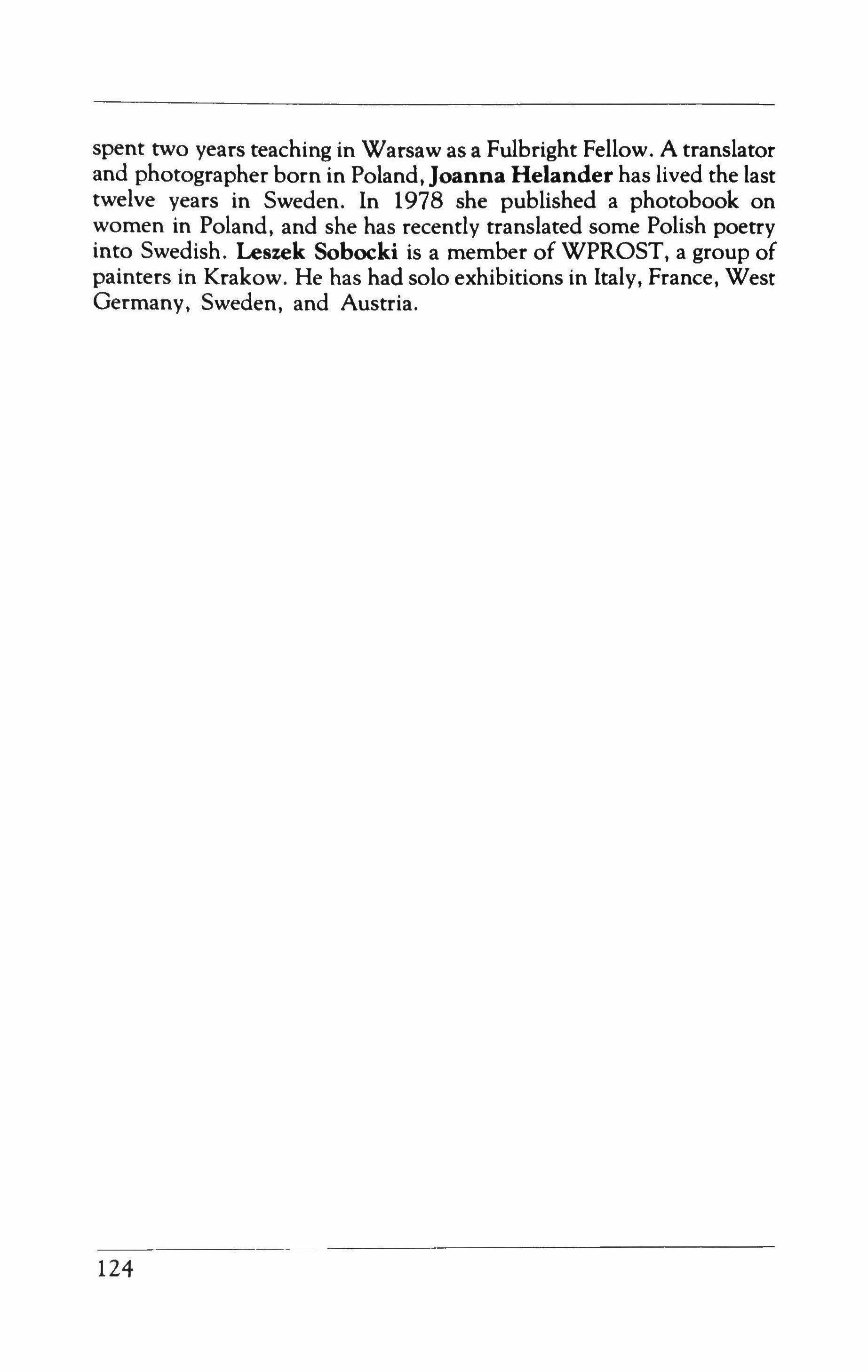
spent two years teaching in Warsaw as a Fulbright Fellow. A translator and photographer born in Poland, Joanna Helander has lived the last twelve years in Sweden. In 1978 she published a photobook on women in Poland, and she has recently translated some Polish poetry into Swedish. Leszek Sobocki is a member of WPROST, a group of painters in Krakow. He has had solo exhibitions in Italy, France, West Germany, Sweden, and Austria.
124
A recent article in the New York Times called TriQuarterly "perhaps the preeminent journal for literary fiction" in America. Founded in 1964, TO publishes three handsome issues a year of fiction, essays, poetry and graphic work, to the continuing acclaim of readers and critics. Now, as a special bonus to new subscribers, we are offering a free back-issue with each subscription. Choose from the following collector's items: #25, Prose for Borges; #26. fiction by Stanley Elkin, Thomas McGuane, Alain Robbe-Grillet, and others; #38, In the Wake of the WAKE, a special forum on the lovcean classic; #37, fiction by Robert Stone, Joyce Carol Oates, Herbert Gold and others on "Love and Hate." Or select any back-issue listed in TO #55 or 56. Join us-and choose your free bonus.
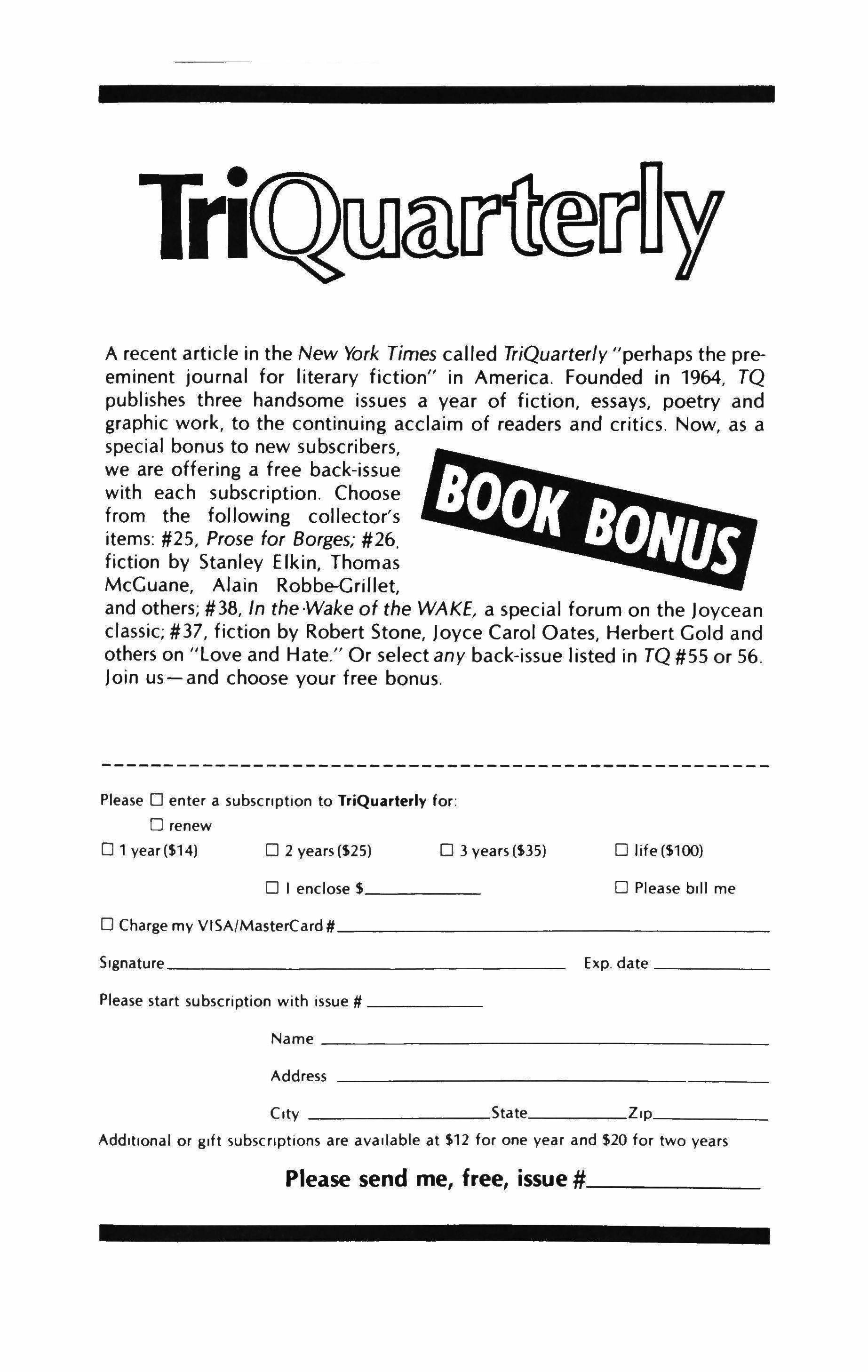
Please 0 enter a subscription to TriQuarterly for:
renew
o I enclose $, o Please bill me
o Charge my VISA/MasterCard#
Signature Exp. date
Please start subscription with issue #
Zlp
Additional or gift subscriptions are available at $12 for one year and $20 for two years
Please send me, free, issue #
o
01 year ($14)
2 years ($25)
3 years ($35)
life ($100)
o
o
o
Name Address City State
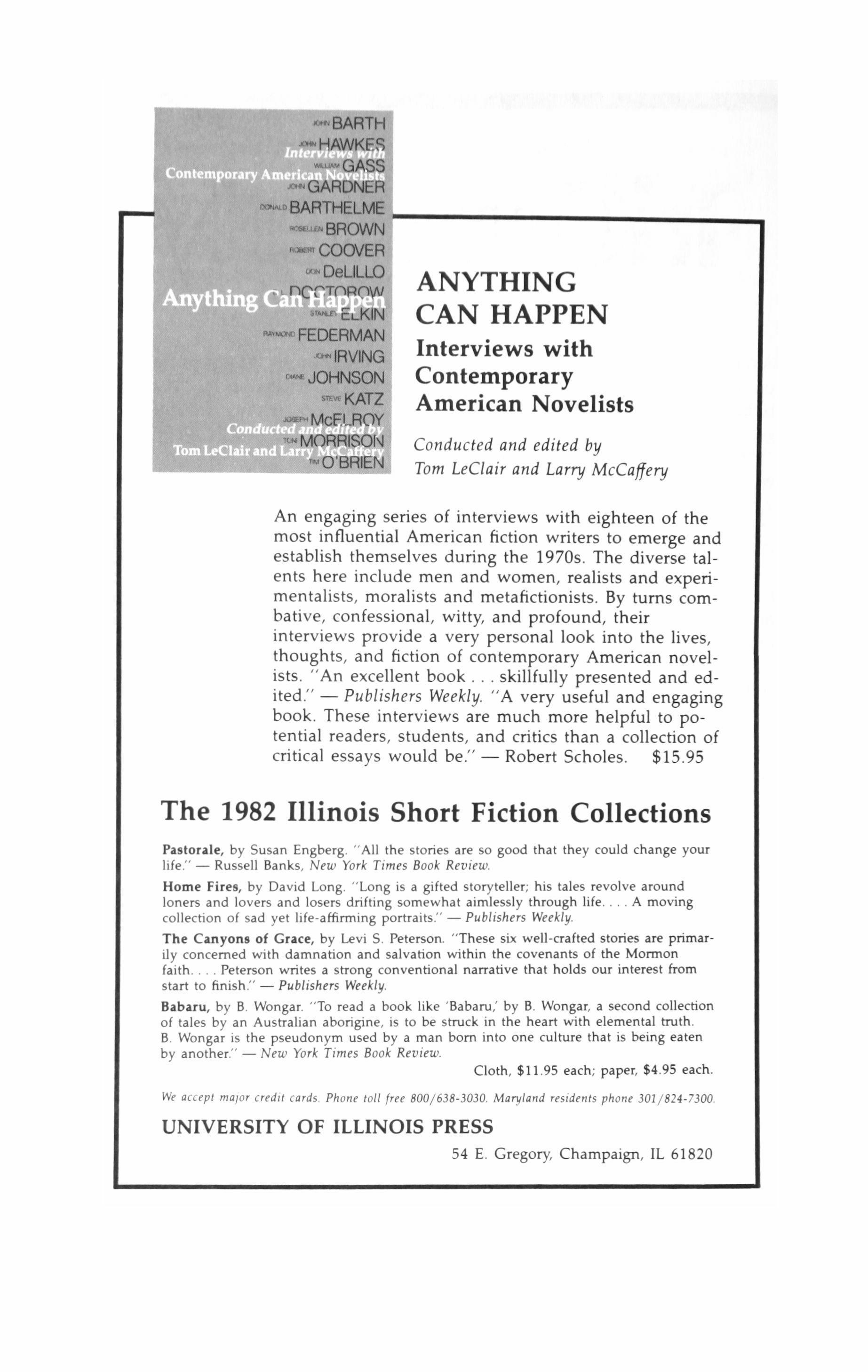
ANYTHING CAN HAPPEN
Interviews with Contemporary American Novelists
Conducted and edited by Tom
LeClair and Larry McCaffery
An engaging series of interviews with eighteen of the most influential American fiction writers to emerge and establish themselves during the 1970s. The diverse talents here include men and women, realists and experimentalists, moralists and metafictionists. By turns combative, confessional, witty, and profound, their interviews provide a very personal look into the lives, thoughts, and fiction of contemporary American novelists. "An excellent book skillfully presented and edited." - Publishers Weekly. "A very useful and engaging book. These interviews are much more helpful to potential readers, students, and critics than a collection of critical essays would be." - Robert Scholes. $15.95
The 1982 Illinois Short Fiction Collections
Pastorale, by Susan Engberg. "All the stories are so good that they could change your life." - Russell Banks, New York Times Book Review
Home Fires, by David Long. "Long is a gifted storyteller; his tales revolve around loners and lovers and losers drifting somewhat aimlessly through life A moving collection of sad yet life-affirming portraits." - Publishers Weekly.
The Canyons of Grace, by Levi S. Peterson. "These six well-crafted stories are primarily concerned with damnation and salvation within the covenants of the Mormon faith Peterson writes a strong conventional narrative that holds our interest from start to finish." - Publishers Weekly.
Babaru, by B. Wongar. "To read a book like 'Babaru,' by B. Wongar, a second collection of tales by an Australian aborigine. is to be struck in the heart with elemental truth. B. Wongar is the pseudonym used by a man born into one culture that is being eaten by another." - New York Times Book Review.
Cloth, $11.95 each; paper, $4.95 each.
We accept major credit cards. Phone tol/ free 800/638-3030. Maryland residents phone 301/824-7300.
UNIVERSITY OF ILLINOIS PRESS
54 E. Gregory, Champaign, IL 61820
''''BARTH

Phoenix�o�o(Q)[ru
The Phoenix is the classic symbol ofrenewal-particularly fittingfor a new paperback series ofnovels that definitely deserve resurrection. In May, we will bepublishing thefirst five-all books to delight those with an unquenchable thirstfor finefiction.-------------------
A USE OF RICHES
J. I. M. Stewart
The same wit and skillful plotting that Stewart brings to the detective stories he writes as Michael Innes are to be found in this novel about an art-lover whose life is thrown into turmoil by an artist of genius. "Mr. Stewart continually surprises by his invention and ingenuity, and he never fumbles, never puts a foot wrong. "-Walter Allen, New Statesman 56.95 (est.) 246 pages
THE DEPARTMENT
Gerald Warner Brace
All the foibles of an academic community are unerringly captured by the narrator, a gentle elderly English professor looking back-not in anger or bitterness-on his career and marriage to an abrasive wife. low-keyed, beautifully put together, very well written, and thoroughly engaging." -Carlos Baker, New York Times Book Review 56.95 290 pages
Three by J. B. Priestley----------who has beenjustifiably called a twentieth-century Dickens ANGEL PAVEMENT
Out of the unlikely material of a group of ordinary people in a dreary little London office, Priestley weaves a memorable, richly textured tale. "[His) power of observing and depicting the multitudinous facets of everyday life or the humours and tragedies of undistinguished English souls is remarkable." - Times Literary Supplement 58.95 498 pages
THE GOOD COMPANIONS
A romantic comedy-well-seasoned with astringent wit-about a touring concert party in the England of the Depression era. "It is a canvas glittering with character and incident. The book has the richness of wisdom and substantial laughter." - v. S. Prichett 59.95 (est.) 650 pages
BRIGHT DAY
Priestley's own favorite novel-about a successful film scriptwriter suddenly precipitated into vivid memories of his early obsession with a special family. "The seductive glamour, with the knowledge of things to come, of retrospect-traced with veracity and enchantment." -Kirkus 57.95 (est.) 370 pages
THE UNIVERSITY OF CHICAGO PRESS 5801 South Ellis Avenue Chicago,IL 60637

Lover's Credo
POEMS OF ROMANTIC LOVE
By Corliss Lamont
A book of eloquent and exuberant verse by a Humanist philosopher that prol'ides an antidote to icaau:s pervasive vulgarization and debasement oj sex relations.
"The bliss of sexual and spiritual love, the beauty of the loved one and of nature. the loneliness and ironies of lost romance are gracefully conveyed in these meticulously structured poems." - The Booklist, American Library Association
second revised edition, paperback. 72 Pages. $4.95 at your bookstore or direct from
L. BAUHAN, PUBLISHER DUBLIN,
03444 This Publication is available in Microform. University Microfilms International rorTri� Namc Imtltutlo''----StrecL___ C,ty' State Zrp 300 North Zeeb Road Dept. PR Ann Arbor. Mi, 48106
WILLIAM
NH

Tymoteusz Karpowicz
Tadeusz Konwicki
Wislawa Szymborska
Wiktor Woroszylski
Marek Nowakowski
Andrzej Kijowski
Zbigniew Herbert
Jan Prokop
Stanislaw Baranczak
Thomasz Jastrun
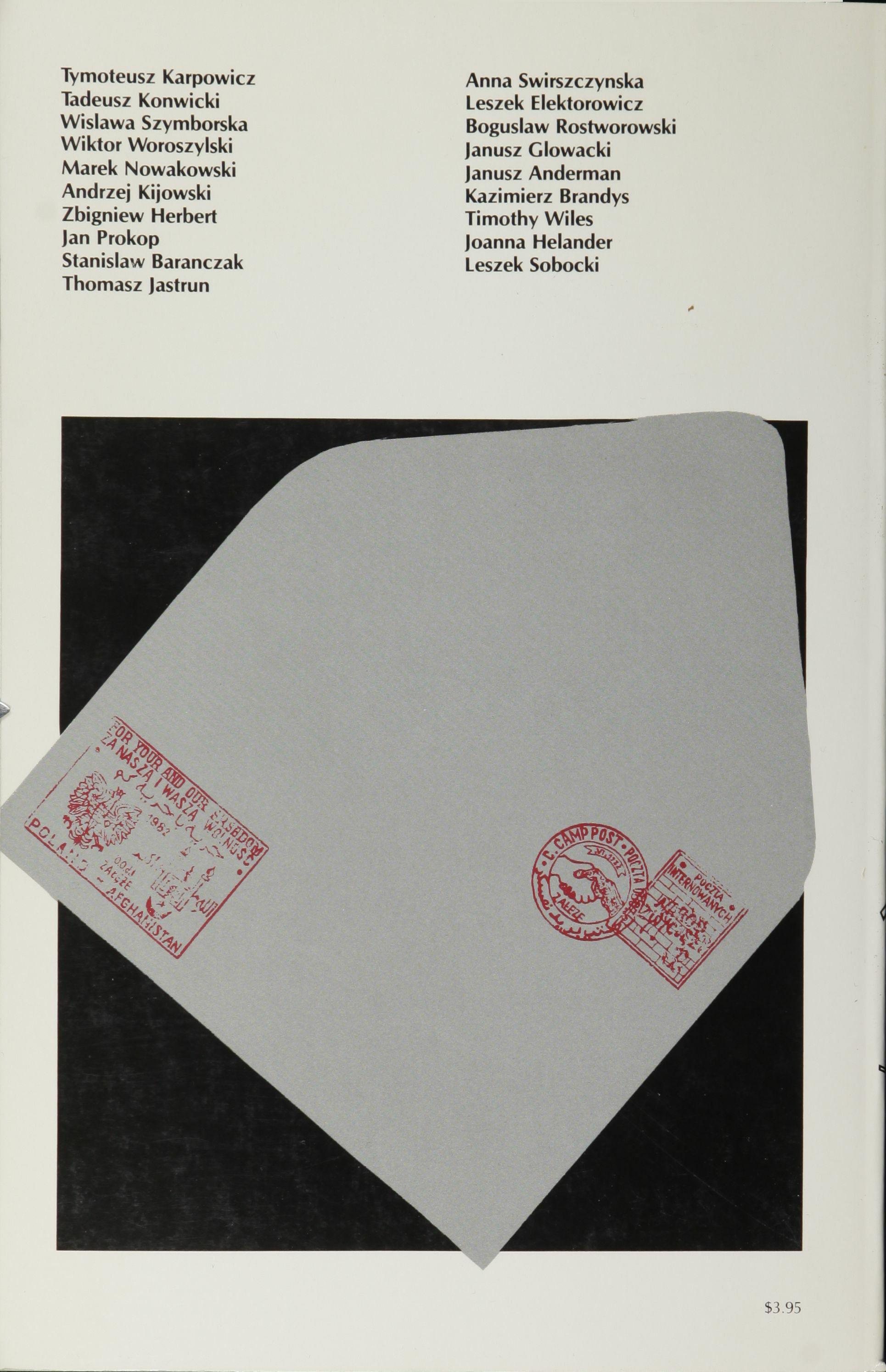
Anna Swirszczynska
leszek Elektorowicz
Boguslaw Rostworowski
Janusz Glowacki
Janusz Anderman
Kazimierz Brandys
Timothy Wiles
Joanna Helander
leszek Sobocki
$3.95






























 Translated
Translated

 Translated by Boguslaw Rostworowski
Translated by Boguslaw Rostworowski

 Parade far the Warsaw Uprising of 1944, September I, HXlI. Photo Victaria.
Parade far the Warsaw Uprising of 1944, September I, HXlI. Photo Victaria.




 RostWOTOwski
RostWOTOwski






 Nowa Huta, August 31, 1982. In Nowa Huta, a steelworks town near Cracow, there was much street fighting in 1982. Photo Lech.
Nowa Huta, August 31, 1982. In Nowa Huta, a steelworks town near Cracow, there was much street fighting in 1982. Photo Lech.



 Translated by Boguslaw Rostworowski
Translated by Boguslaw Rostworowski











 Nowa Huta, August 3 I, 1982, ZOMO riot policefiring tear gas into apartments. PhotoLech.
Nowa Huta, August 3 I, 1982, ZOMO riot policefiring tear gas into apartments. PhotoLech.





 Poland, r9B2. Joanna Helander.
Poland, r9B2. Joanna Helander.







 Poland, 1982. Joanna Helander.
Poland, 1982. Joanna Helander.







 Nowa Huta, August 3 I, 198 I. Photo Lech.
Nowa Huta, August 3 I, 198 I. Photo Lech.



 Translated by Boguslaw Rostworowski
Translated by Boguslaw Rostworowski
 Translated
Translated
 Translated by Reginald Gibbons and the author
Translated by Reginald Gibbons and the author



 Translated by Reginald Gibbons and the author
Translated by Reginald Gibbons and the author
 1981. Joanna Helander. Poznan, June
1981. Joanna Helander. Poznan, June

 Katowice, 1981. Joanna Helander.
Katowice, 1981. Joanna Helander.




 Lech Walesa's church in the workers' suburb of Zaspa, Gdansk, 1981. Photo Victoria.
Lech Walesa's church in the workers' suburb of Zaspa, Gdansk, 1981. Photo Victoria.





 First loaf of bread baked under Rural Solidarity, on the briefcase of the union president, May 1981. Photo Vicroria.
First loaf of bread baked under Rural Solidarity, on the briefcase of the union president, May 1981. Photo Vicroria.






















